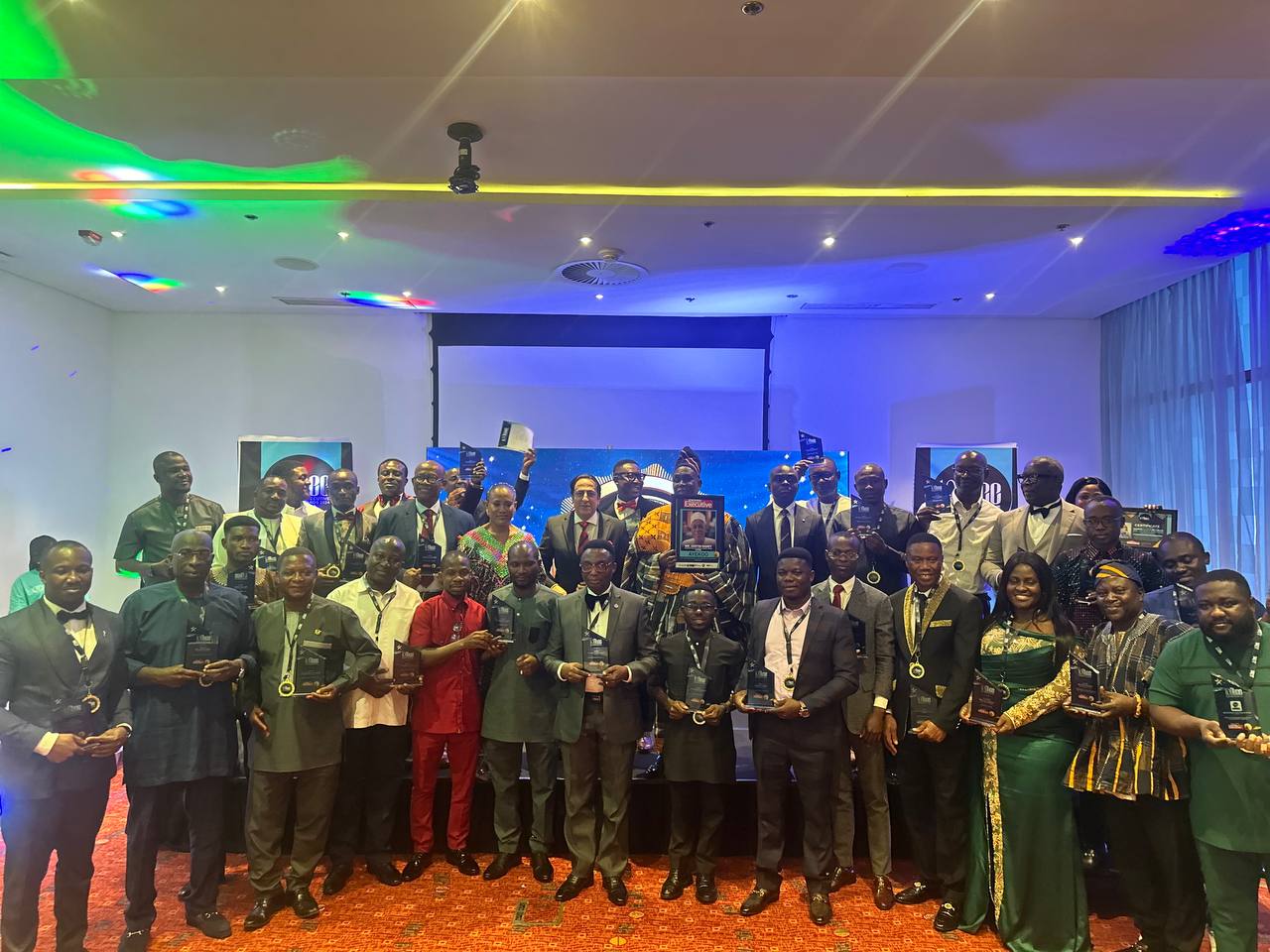Latest News
- GroConsult
- No Comments
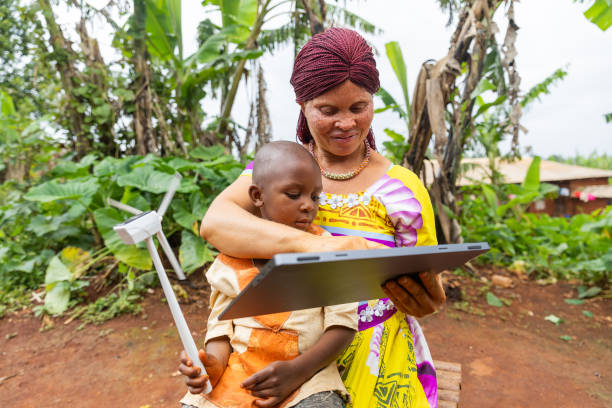
How GroConsult Powers Compliant, Scalable Talent Solutions for Renewable Energy Projects

Africa stands at a pivotal moment in the global energy transition. With abundant solar, wind, hydro, and geothermal resources, the continent is rapidly expanding its renewable energy footprint — attracting investment, scaling infrastructure, and creating demand for specialized talent. However, this transformation also exposes a key challenge: finding and deploying qualified professionals across borders in a legally compliant way.
This is where the Employer of Record (EOR) model becomes not just advantageous — but essential. Today’s guide explores how EOR companies like GroConsult play a crucial role in green energy recruitment across Africa, unpacking opportunities, challenges, and practical solutions for employers, investors, and workforce planners.
What Is an Employer of Record (EOR)?
An Employer of Record (EOR) is a third-party entity that legally employs workers on behalf of another organization, handling all statutory, legal, and administrative aspects of employment — including payroll, taxes, benefits, and compliance — while the hiring company directs daily operational work.
In essence:
- The EOR becomes the legal employer in-country.
- The client retains control over work assignments and performance.
- The EOR assumes responsibility for employment compliance and operational risk.
This model allows organizations to hire talent in jurisdictions where they don’t have a local legal entity, making it ideal for cross-border workforce expansion.
Why Green Energy Recruitment in Africa Is Unique

Africa’s renewable energy sector is booming. Nations from Ghana to Kenya, South Africa to Egypt are pursuing ambitious renewable energy goals — driving investment into solar arrays, wind farms, grid modernization, and decentralized energy solutions. Yet the pace of growth exposes recruitment challenges that traditional hiring models struggle to solve:
1. Specialized Technical Talent
Green energy projects require highly specialized workers — from solar PV engineers and wind turbine technicians to energy project managers and environmental specialists. In many African countries, this niche talent is still growing. Finding and retaining experts often requires cross-border mobility and international talent sourcing.
2. Geographic Dispersion
Renewable energy sites are often in remote locations — rural deserts, coastal plains, or national parks — far from urban labor pools. This compels employers to recruit from distant cities or even other countries.
3. Dynamic Regulatory Environments
Each African country has distinct labor laws, tax codes, and compliance frameworks. Understanding these variations — and staying updated as regulations evolve — is a real hurdle for international employers.
4. Supply and Demand Imbalance
While the drive toward net zero accelerates demand for green energy professionals, supply remains constrained. Employers must use innovative talent strategies to compete — and that’s where the EOR model offers a distinct advantage.
The EOR Advantage in Green Energy Recruitment

1. Compliance With Local Employment Laws
Different African jurisdictions have their own regulatory frameworks governing employment contracts, employee benefits, statutory contributions, tax withholdings, and termination procedures. Missteps can expose a company to fines, legal penalties, or reputational damage.
An EOR like GroConsult ensures full compliance by:
- Drafting employment contracts that meet local legal standards.
- Administering statutory payroll taxes and social contributions.
- Adhering to mandatory labor protections and reporting requirements.
- Keeping updated on labor law changes across multiple African markets.
This level of compliance is especially critical in sectors like green energy where projects often span multiple jurisdictions — and any legal oversight could disrupt operations.
2. Rapid Market Entry & Speed to Hire
Setting up a local subsidiary or legal entity in a new country can take months, often delaying project timelines. With renewable energy projects, timing is critical — delays cost money and create strategic disadvantage.
By partnering with an EOR:
- Businesses can hire local or international specialists within days or weeks.
- Deployment timelines are compressed — critical for project bidding, installation, and commissioning.
- Hiring becomes possible without the burden of entity registration, permits, and legal approvals.
In the green energy sector, where project windows are tight and competition is global, this speed is a competitive edge.
3. Streamlined Payroll & Workforce Administration
Managing payroll across countries — each with different currencies, tax structures, and social insurance systems — is complex and resource-intensive. For example:
- In Ghana, employers must manage contributions to the Social Security and National Insurance Trust (SSNIT).
- In Kenya, employers must deduct contributions for the National Hospital Insurance Fund (NHIF) and National Social Security Fund (NSSF).
- In South Africa, various payroll taxes, UIF (Unemployment Insurance Fund), and statutory benefits must be correctly handled.
GroConsult’s EOR model centralizes these functions so that:
- All payroll cycles are accurate and compliant.
- Local statutory deductions and benefits are handled automatically.
- Cross-border currency payments are managed with minimized tax risk and FX exposure.
This not only reduces administrative burden but also fortifies employer credibility with local workers.
4. Access to Local and Global Talent Pools
Green energy is a global industry. Employers often need both international experts and highly skilled local professionals. An effective EOR model gives companies access to:
- Local talent networks and recruitment channels.
- Cross-border sourcing for niche skill sets.
- Scalable workforce strategies that align with project life cycles.
By bridging the gap between local hiring ecosystems and international labor markets, EORs help employers attract and retain the talent needed for long-term success.
5. Mobility Support for Expat & Cross-Border Teams
Many green energy projects require international experts — especially in areas like high-voltage grid integration, offshore wind design, or advanced solar engineering. However, cross-border workforce mobility in Africa often involves:
- Visa and work permit approvals.
- Relocation logistics.
- Cultural integration considerations.
EOR partners can manage immigration support, documentation, and relocation assistance — enabling companies to deploy talent legally and efficiently across borders.
6. Risk Mitigation & Regulatory Adaptability
Africa’s political and regulatory landscape can shift rapidly — new labor regulations, evolving tax laws, or changes to work permit policies can emerge with limited notice. An EOR’s deep local expertise provides:
- Real-time regulatory monitoring.
- Early warning systems for compliance changes.
- Strategies to maintain business continuity when laws shift.
This proactive risk management ensures that green energy operations remain uninterrupted even in volatile regulatory environments.
The African Green Energy Landscape: Growth & Workforce Demand

Africa’s energy transition is both a challenge and an opportunity. Governments and private investors are expanding renewable initiatives at an unprecedented pace — including:
- Utility-scale solar farms in North and East Africa.
- Wind corridors in South Africa, Morocco, and Kenya.
- Off-grid solar and mini-grid solutions in rural areas.
- Hydro and geothermal investments in East Africa.
These investments are stimulating demand for diverse roles:
| Role | Responsibilities |
|---|---|
| Solar PV Engineers | Design and oversee solar installations |
| Wind Turbine Technicians | Maintain and repair wind turbines |
| Project Managers | Manage project execution and stakeholder communication |
| Renewable Energy Analysts | Forecast and optimize energy output |
| Environmental Compliance Officers | Ensure sustainability and regulatory adherence |
However, hiring for these roles involves navigating complex, region-specific employment landscapes, making EOR support an invaluable strategic advantage.
GroConsult’s Differentiated EOR Approach

At GroConsult, we take the EOR model beyond compliance — turning it into a strategic growth engine for green energy employers.
1. Compliance-First Strategy
GroConsult’s employment framework is built on rigorous legal expertise in African labor laws, tax regimes, and payroll systems. We monitor legislative changes, adjust employment policies proactively, and ensure all statutory obligations are met.
2. Talent Network Integration
We connect employers with high-quality professionals — local and international — through curated recruitment strategies that align with green energy requirements.
3. Full Lifecycle Workforce Support
From onboarding and payroll to benefits and offboarding, GroConsult manages the full employee lifecycle with accuracy and cultural nuance.
4. Mobility & Immigration Facilitation
We provide end-to-end support for visa processing, work permits, and cross-border relocations — ensuring talent mobility is compliant and seamless.
5. Strategic Data & Reporting
Our clients access real-time workforce analytics, compliance reporting, and strategic insights that empower smarter hiring decisions and workforce planning.
Key Benefits for Green Energy Employers

| Benefit | Impact |
|---|---|
| Faster Hiring | Reduce time-to-hire from months to weeks |
| Legal Compliance | Avoid fines and reputational risk |
| Payroll Accuracy | Ensure timely, compliant salary processing |
| Talent Access | Tap into local and global expert networks |
| Risk Mitigation | Stay agile amid regulatory change |
Case Scenarios: How EOR Transforms Green Energy Recruitment
Solar Project in Ghana
A European solar developer needed to staff a 50 MW solar farm in Ghana. By partnering with GroConsult:
- Local engineers and technicians were hired in weeks.
- Payroll and statutory requirements (SSNIT, tax withholdings) were managed compliantly.
- Cross-border specialists were onboarded with appropriate work permits.
Result: Project executed ahead of schedule, with local workforce integration optimized for long-term operations.
Empowering Africa’s Green Energy Future

The global energy transition presents a transformative opportunity for Africa — creating jobs, attracting investment, and driving sustainable development. However, realizing this potential requires innovative workforce solutions that conquer legal, logistical, and cultural barriers.
Employer of Record services — especially when delivered by a thoughtful, compliance-focused partner like GroConsult — empower green energy employers to:
- Hire quickly and compliantly.
- Access diverse and high-quality talent.
- Mitigate risk and operational complexity.
- Expand across multiple African markets with confidence.
Ultimately, GroConsult’s model doesn’t just support recruitment — it accelerates Africa’s journey toward a more sustainable, resilient energy future.
Share This:
- GroConsult
- No Comments
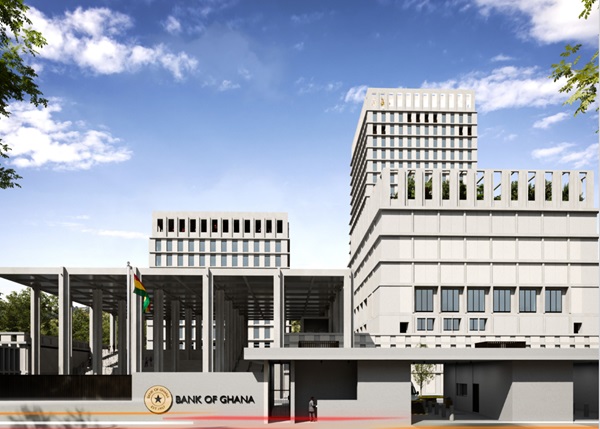
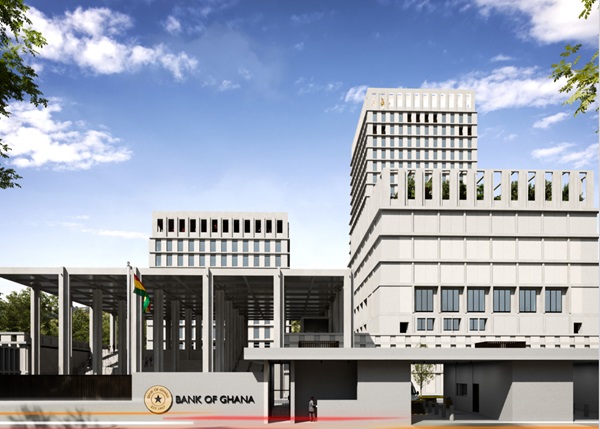
How regulatory clarity and compliance create competitive advantage for global employers and investors — and how GroConsult helps businesses navigate Ghana’s financial system.
Ghana’s financial regulatory ecosystem is anchored around the Bank of Ghana (BoG) — the nation’s central bank and financial sector regulator. For international businesses seeking to enter Ghana via Employer of Record (EOR) arrangements, joint ventures, or direct investments, a deep understanding of BoG’s frameworks, policies, and compliance requirements is a strategic necessity. This article unpacks key aspects of BoG’s mandate, regulatory functions, risk environments, and compliance obligations — and shows how GroConsult uniquely supports clients as a trusted compliance and business expansion partner.
1. Who Is the Bank of Ghana? — The Heart of Financial Regulation
The Bank of Ghana (BoG) serves as Ghana’s central bank and primary regulator of financial systems, tasked with maintaining monetary stability, supervising financial institutions, and ensuring systemic resilience. Its functions are wide-ranging and foundational to doing business in Ghana’s financial sector.
Core Functions Include:
- Formulating and implementing monetary policy to achieve price stability and support economic growth.
- Regulating and supervising banks and non-bank financial institutions to ensure sound financial practices.
- Licensing and oversight of financial institutions, including banks, rural/community banks, microfinance institutions, forex bureaus, and virtual asset service providers.
- Promoting financial stability and payment systems efficiency.
- Issuing and managing currency and acting as the Government’s banker and financial adviser.
For foreign employers, investors, and partners, recognition of BoG’s authoritative role is the first step in ensuring that any entry strategy — whether payroll outsourcing, incorporation, or investment — aligns with national financial standards and international best practices.
2. BoG’s Regulatory & Supervisory Mandate: What It Means for EOR and Compliance
The regulatory framework of Ghana’s financial system is robust, built on statutory instruments and international standards aimed at risk mitigation, consumer protection, and systemic integrity. The Bank of Ghana’s supervisory authority spans the entirety of Ghana’s banking and non-bank financial sectors.
Key Regulatory Laws Include:
- Bank of Ghana Act, 2002 (Act 612)
- Bank of Ghana (Amendment) Act, 2016 (Act 918)
- Banks & Specialised Deposit-Taking Institutions Act, 2016 (Act 930)
- Non-Bank Financial Institutions Act, 2008 (Act 774)
- Companies Act, 2019 (Act 992)
- Payment Systems and Services Act, 2019 (Act 987)
These laws define the legal foundation for licensing, operational standards, compliance requirements, remedial actions, and supervisory powers.
Why This Matters:
Business Credentials
Local compliance with BoG regulations is mandatory for financial operations, corporate accounts, currency transactions, and cross-border money movements.
Employer of Record Validity
EOR providers like GroConsult structurally aligned employment contracts, payroll, statutory deductions, and remittances with Ghanaian regulations, particularly when funds flow through licensed financial institutions.
Licensing & Ongoing Compliance
Engagements involving financial services, fintech, digital assets, and cross-border payroll require precise interpretation of BoG’s licensing criteria, reporting requirements, and supervisory expectations.
3. Financial Stability & Risk Management — Regulatory Safeguards Every Business Must Know
BoG’s regulatory activities extend into risk management — vital for protecting investors, depositors, and the broader economy. This is particularly relevant for foreign businesses handling payroll remittances or opening local bank accounts.
Enforcement & Consumer Protection
The Investigation and Consumer Reporting Office (ICRO) serves as a watchdog within the BoG, handling complaints, fraud investigations, and consumer education.
Why This Matters:
- ICRO ensures fair treatment and fraud prevention within Ghana’s financial sector.
- Companies engaging in payroll services must align with Ghana’s ethical standards and customer protection obligations.
- Effective risk management is non-negotiable for international operations and reflects positively on compliance reputation.
4. Anti-Money Laundering & Know-Your-Customer (KYC) Requirements

International businesses operating in Ghana must satisfy stringent KYC and Anti-Money Laundering (AML) provisions — core components of BoG’s compliance regime.
Know Your Customer (KYC) Policy
BoG’s KYC framework mandates comprehensive customer due diligence for banks and financial institutions, grounded in international Basel standards.
Key Requirements:
- Identification and verification of clients’ identities.
- Ongoing monitoring of accounts and transactions for suspicious activities.
- Policies to prevent criminal elements from using financial platforms.
Business Impact:
Employers must validate employee identity and compliance documents before processing payroll.
Remittance tracking — required for cross-border salary transfers — falls under AML/CFT guidelines monitored by the BoG.
Compliance with AML/CFT standards is essential for maintaining banking relationships and avoiding regulatory penalties.
GroConsult’s compliance services include end-to-end KYC support — from employee onboarding to real-time regulatory reporting — ensuring your Ghana operations stay audit-ready.
5. BoG’s Role in Payments & Remittances — A Critical Pillar for EOR Solutions
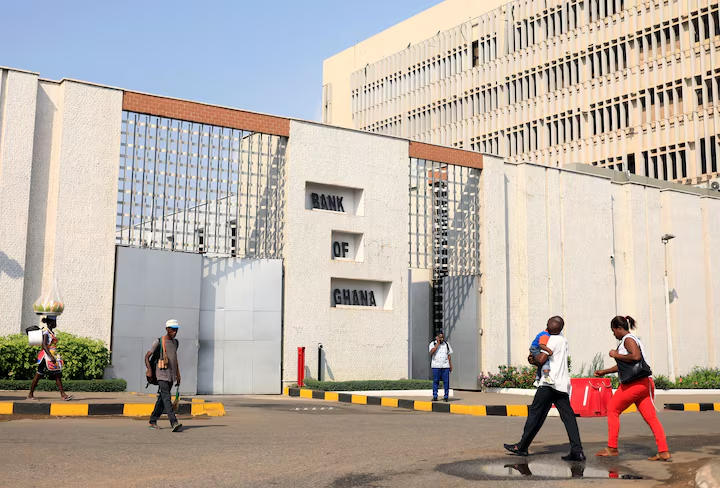
The Ghanaian regulatory framework under the Payment Systems and Services Act, 2019 (Act 987) sets out licensing and compliance requirements for payment service providers, e-money issuers, and transaction platforms.
Why This Matters for Employers:
- Payroll and salary disbursements often rely on licensed banking and payment service partners.
- Ensuring that your local bank or fintech partner complies with Act 987 shields your business from operational disruption.
- BoG audits of remittance channels ensure compliance with Foreign Exchange and AML guidelines.
GroConsult partners exclusively with licenced financial institutions and payment partners, giving businesses confidence that salary remittances and statutory contributions are compliant and secure.
6. The Emerging Virtual Assets Regulatory Environment
Ghana is at the forefront of regulating virtual assets and cryptocurrencies through a collaborative framework between the Bank of Ghana, the Securities and Exchange Commission (SEC), and the Financial Intelligence Centre (FIC).
Virtual Asset Service Providers Act, 2025 (Act 1154)
This new law introduces clear registration, licensing, compliance, and reporting requirements for entities dealing in virtual assets — including stablecoins, blockchain-based payment systems, and distributed-ledger technology platforms.
Implications for Business Expansion:
🔹 Employers considering compensation in digital assets must understand regulatory classification, reporting requirements, and operational standards.
🔹 Cross-border companies using virtual protocols must align with Ghana’s policies on cybersecurity, AML/CFT, and prudential safeguards.
GroConsult’s compliance strategy includes guidance on digital asset compliance — bridging emerging technology regulations with practical business solutions.
7. Financial Inclusion, Digital Finance & the Future of Ghana’s Financial Sector

The Bank of Ghana is actively advancing digital finance regulations to foster financial inclusion, support SMEs, and integrate innovative services like open banking and fintech payments.
Highlights include:
Regulatory frameworks for digital banking, digital credit, and fintech services.
Development of supervisory intelligence platforms to monitor digital financial activities.
Pilot initiatives for digital currencies, such as the e-Cedi.
Why It Matters for Employers:
- Digital finance regulations influence employee payroll delivery, expenses reimbursement, and mobile-based salary solutions.
- A forward-looking EOR partner should anticipate changes in digital payments and fintech governance.
GroConsult helps clients stay ahead of digital finance trends — aligning payroll protocols with upcoming regulatory expectations.
8. Corporate Governance & Board Oversight Principles
BoG’s governance structure is headed by a Board of Directors responsible for policy oversight and ensuring compliance with internal and statutory standards.
Board Responsibilities:
- Establishing corporate governance policies.
- Supervising audit, risk management, and compliance protocols.
Implications for Business Expansion:
Multinational investors and employers must adopt similarly robust governance — shaping internal controls, audit mechanisms, and risk frameworks that are in harmony with Ghanaian best practice.
GroConsult provides policy advisory services designed to align client governance frameworks with local regulatory expectations.
9. Compliance Best Practices for EOR & Business Expansion in Ghana

From the regulatory insights above, here are the core compliance pillars any international employer or investor should adopt:
🔹 Regulatory Alignment
Ensure business operations — including payroll, immigration, and banking — comply with BoG statutes, the Companies Act, and AML/CFT obligations.
🔹 Licensed Financial Partnerships
Work only with licensed banks, payment service providers, and fintech entities.
🔹 Robust KYC & AML Protocols
Implement stringent identity verification and transaction monitoring aligned with Basel standards.
🔹 Ongoing Reporting & Audit Readiness
Maintain accurate books, regulatory reporting schedules, and audit trails — essential for remittance oversight and compliance.
🔹 Digital Payment Strategy
Adapt payroll and finance operations to Ghana’s evolving digital payment and fintech ecosystems.
10. How GroConsult Enables Compliance & Growth

As an Employer of Record and compliance partner, GroConsult offers comprehensive services that bridge regulatory requirements with practical business execution:
EOR & Compliance Services
- Employment Contract Management aligned with local labor laws.
- Payroll Processing that adheres to tax and statutory remittance schedules.
- KYC & Due Diligence Support for employees and contractors.
- Banking Liaison Services to facilitate payroll and capital transactions with BoG-regulated partners.
- Regulatory Monitoring & Advisory — so your business stays ahead of compliance changes.
By combining regulatory expertise with operational excellence, GroConsult empowers organizations to launch, scale, and sustain their operations in Ghana’s dynamic financial environment.
11. Final Thoughts
Understanding Ghana’s regulatory framework — particularly the central role of the Bank of Ghana — is essential for businesses that wish to expand responsibly and compliantly. Whether you are considering establishing a local entity, onboarding remote teams, or partnering with local financial institutions, compliance is the backbone of sustainable growth.
At GroConsult, we don’t just ensure compliance — we turn regulatory clarity into competitive advantage.
Share This:
- GroConsult
- No Comments


Africa’s green economy is transforming into a global investment hotspot. In 2025, private investments in clean energy surged, with funding jumping from $17 billion in 2019 to nearly $40 billion in 2024. African startups raised $2.8 billion by August 2025, matching the entire previous year. Key sectors include renewable energy, minerals for green tech, and off-grid solutions. However, challenges like high capital costs, limited global energy investment (just 3%), and financial risks persist. Solutions like blended finance, green bonds, and public-private partnerships are helping attract more investors. Major projects, such as Mozambique’s hydroelectric plant and Zimbabwe’s lithium processing, highlight the continent’s potential to reshape global energy markets.
Renewable Energy Investment Growth
The renewable energy sector in Africa is experiencing a surge, driven by falling costs and shifting investor priorities. Solar PV has emerged as the most affordable power source in many African nations, reshaping how investors approach the market. This economic transformation has propelled private sector investments in clean energy to nearly $40 billion in 2024, marking a pivotal moment for the industry.
Investors are increasingly focusing on commercial and industrial solar projects and electric mobility, which carry lower payment risks compared to residential ventures. The electric vehicle (EV) sector has seen remarkable growth, with investments hitting nearly $70 million in 2023 – an eightfold increase since 2021. Large-scale initiatives, such as green hydrogen projects and EV battery production, are also drawing significant foreign investments. For instance, Morocco secured a $6.4 billion deal in 2023 to build an EV battery manufacturing facility. These developments underline Africa’s growing appeal to investors seeking opportunities in renewable energy.
However, challenges persist. Capital costs for utility-scale clean energy projects in Africa are 2–3 times higher than in advanced economies and China. This makes projects more expensive and financing more difficult. To meet its 2030 climate and energy targets, Africa requires $28 billion in concessional funding annually to unlock $90 billion in private investment. Blended finance, where development finance institutions help reduce project risks, has become critical. This approach is also paving the way for innovative tools like green bonds.
Green Bond Market Expansion
Green bonds are becoming a key instrument for financing Africa’s cleantech transition, though their use is evolving. Instead of funding entirely new projects, these bonds are often used to refinance existing “brownfield” projects, freeing up resources for new “greenfield” developments. This strategy, known as asset recycling, allows developers to reinvest in early-stage projects while maintaining momentum in the sector.
The building sector is a notable area of growth for green bonds, supporting energy efficiency projects through green mortgages and creative payment models like on-wage or on-bill plans. Impact platforms are also leveraging bond issuances to securitize loans, enabling local financial institutions to expand green lending. Governments are stepping in with sovereign green bond programs to set benchmarks and stimulate broader corporate bond markets. Given that energy efficiency projects currently receive less than 15% of concessional funding, the role of bond markets is becoming increasingly significant.
FDI Challenges and Capital Allocation
Despite the progress in financing models, Africa’s cleantech sector faces hurdles in attracting stable foreign direct investment (FDI). FDI in the sector fell by 3% to $53 billion in 2023, while international project finance deals dropped by 50% to $64 billion, following a 20% decline in 2022. Yet, there is a silver lining: Africa is securing a growing share of global greenfield megaprojects, particularly in green hydrogen and EV battery supply chains. In 2023, Mauritania announced a green hydrogen project with an estimated investment of $34 billion – an amount far exceeding the country’s annual GDP.
Despite representing 20% of the global population, Africa accounts for less than 2% of global clean energy spending. The financial instability of state-owned utilities, with system losses averaging 15% in 2020, creates high payment risks for private investors. Additional challenges, such as currency volatility and underdeveloped local financial systems, further complicate the investment landscape. Blended finance is becoming increasingly important as public and development funding has dropped by a third over the past decade, largely due to an 85% reduction in Chinese development finance.
“Emissions reductions provide a powerful reason to invest, but are often not the primary driver for investment in technologies that are increasingly mature and cost-competitive.” – IEA, World Energy Investment 2025
To overcome these barriers, targeted strategies are essential. Credit enhancements, local currency guarantees, and liquidity support mechanisms – such as those trialed in Gabon – are proving effective in improving project bankability. Strengthening regulatory frameworks and developing domestic capital markets will also be crucial to mitigating currency risks and external economic shocks.
Solar and Hydroelectric Power Projects

Africa is undergoing a significant shift in its renewable energy landscape, driven by ambitious hydroelectric and solar projects aimed at addressing chronic power shortages. One standout initiative is the Mphanda Nkuwa Hydroelectric Plant in Mozambique, the largest hydroelectric project in southern Africa in five decades. Backed by $6 billion in funding from the World Bank and developed by TotalEnergies, Électricité de France, and Hidroeléctrica de Cahora Bassa, this 1,500-megawatt facility is set to begin operations in 2031. Located about 37 miles downstream from the Cahora Bassa dam, it promises to help close a regional energy gap of 10,000 megawatts.
In Ethiopia, the Grand Renaissance Dam is nearing completion after a $4 billion investment. Once operational, it will generate over 5,000 megawatts of power, effectively doubling the country’s electricity output. Meanwhile, Egypt is advancing its renewable energy goals with a combined portfolio of 2,400 megawatts of hydroelectric and 1,400 megawatts of solar capacity. Across the continent, ongoing construction of 15,600 megawatts of hydroelectric dams and 8,100 megawatts of solar parks is contributing to a total of 32,700 megawatts of clean energy capacity in development.
Efforts to expand grid access are also making headway. In 2024 alone, Mozambique’s Electricidade de Moçambique (EDM) connected 563,000 homes to the electricity grid, with plans to add another 600,000 homes in 2025. These initiatives have significantly increased Mozambique’s electricity access rate from 31% in 2018 to 60% in 2024.
“Mozambique has the resources, gas, hydro, solar, and it’s already the biggest supplier of excess power to southern Africa”
In areas where extending the grid is not feasible, off-grid solar solutions are bridging the gap. In Mozambique, for instance, off-grid solar now accounts for 10% of electricity access, particularly benefiting remote rural communities. These projects are not only providing immediate solutions but are also laying the groundwork for long-term transformation, especially as Africa focuses on securing the critical minerals needed for green technology.
Critical Minerals for Green Technology
Africa is a powerhouse for essential minerals used in green technologies, contributing 76% of the world’s manganese and 69% of its cobalt supply. However, less than 5% of these minerals are refined on the continent. This is beginning to change as African nations push for policies aimed at adding value to their resources.
In Zimbabwe, a $400 million lithium sulfate processing plant, developed by China-based Huayou Cobalt, began testing in September 2025. This marks a pivotal step in the country’s efforts to establish a domestic battery value chain. Zimbabwe has also banned the export of unprocessed lithium, signaling its commitment to retaining more value locally. The Arcadia Lithium Mine, for example, has shifted its focus to exporting processed lithium instead of raw ore. Zimbabwe’s Deputy Mines Minister, Polite Kambamura, reinforced this vision:
“If we continue exporting raw lithium we will go nowhere. We want to see lithium batteries being developed in the country” – Polite Kambamura
Morocco is also emerging as a key player in the electric vehicle battery market. In June 2025, the Sino-Moroccan joint venture COBCO began producing nickel-manganese-cobalt precursor cathode materials for EV batteries. Meanwhile, the Democratic Republic of Congo (DRC) is home to the Manono deposit, believed to be the world’s largest lithium reserve, with an estimated 6.6 million tonnes. Although ownership disputes between AVZ Minerals and Zijin Mining have delayed progress, this deposit remains central to Africa’s role in the global battery metal supply chain.
With lithium demand projected to grow sixfold between 2022 and 2035, increasing Africa’s capacity to process these minerals will be crucial in meeting global climate goals. These developments underscore the continent’s growing importance in the transition to a greener future.
How Africa Attracts Global Cleantech Investors

Blended Finance Models
Africa is leveraging blended finance to tackle the challenges of high-risk perception and commercial viability in its cleantech sector. This approach mixes concessional capital – such as grants, low-interest loans, and guarantees from development finance institutions (DFIs) – with private investment to make projects more appealing to investors. The need for this is clear: utility-scale clean energy projects in Africa face capital costs that are 2 to 3 times higher than in developed countries.
To meet its clean energy goals, Africa requires significant concessional funding every year to attract private investments on a larger scale. Blended finance structures include tools like credit enhancements, currency hedging products (e.g., “The Currency Exchange” or TCX), and liquidity support to mitigate risks such as payment defaults by state-owned utilities. Local currency financing is gaining traction as it shields projects from exchange rate fluctuations and external economic shocks.
This model allows DFIs to focus on early-stage markets or untested technologies, while private investors take the lead in established areas like solar and wind energy. By reducing risk, blended finance is paving the way for governments to implement policy reforms that further boost investor confidence.
Policy and Regulatory Frameworks
Alongside innovative financial models, policy reforms are playing a crucial role in attracting global cleantech investment. For instance, competitive auction rounds in South Africa and Egypt have successfully encouraged private-led solar PV projects while driving down technology costs. Similarly, net metering policies in countries like Nigeria, South Africa, and Kenya are fueling the Commercial and Industrial (C&I) solar sector. This sector is expected to grow at an impressive 39% compound annual growth rate, reaching a market value of $1.6 billion by 2027.
Governments are also introducing national green taxonomies to guide institutional investors and expand sustainable finance initiatives. Countries like The Gambia, Zimbabwe, and Togo are piloting asset recycling programs, which free up funds for new greenfield projects. Meanwhile, nations such as Kenya, Ghana, Senegal, and Rwanda are encouraging consumer investments in energy-efficient appliances and green buildings through on-wage and on-bill payment plans.
Recognizing their potential in hydrogen energy, Namibia and Mauritania are developing common standards for low-emissions hydrogen trade. This effort aims to support long-term supply projects. These policy frameworks address a stark reality: while Africa accounts for 20% of the global population, it attracts less than 3% of global energy investment. As the International Energy Agency highlights:
“African governments also need to create the right enabling environment, ensuring stable regulation and financially reliable utilities.”
Public-Private Partnerships
Public-private partnerships (PPPs) are becoming a cornerstone in mobilizing private capital, building on the foundation of blended finance and regulatory reforms. Policy changes are breaking state monopolies, enabling Independent Power Producers (IPPs) and private buyers to engage directly with the grid. South Africa’s Renewable Energy Independent Power Producer Procurement Programme (REIPPPP) is a standout example, contributing about 17% of Africa’s total renewable energy capacity.
In 2024, the NOA Group platform, backed by African Infrastructure Investment Managers (AIIM), achieved financial close on 239 megawatts of wind capacity in South Africa. This included the 140-megawatt Ishwati wind farm, marking a significant milestone as the first major wind project where the buyer is a start-up trading company rather than a state utility. Additionally, South Africa’s state utility, Eskom, has procured around 343 megawatts of utility-scale batteries as part of a broader 500-megawatt Battery Energy Storage System (BESS) initiative to stabilize the grid.
Large-scale projects like Algeria’s Tafouk 1 Mega Solar Project, valued at $3.6 billion, aim to deliver 4 gigawatts of solar energy by 2025, showcasing how PPPs can position countries as regional leaders. Kenya has also emerged as a geothermal powerhouse, with nearly 1 gigawatt of installed capacity, making it the seventh-largest producer globally. This success stems from favorable regulations and effective use of natural resources. As Olusola Lawson, Co-Managing Director at AIIM, notes:
“Transmission is the backbone of the energy transition and scaling up renewable energy must go hand-in-hand with grid expansion.”
Africa’s Cleantech Sector Beyond 2025

Expanding Renewable Energy Capacity
Africa has set an ambitious goal: reaching 300 GW of renewable energy capacity by 2030. To achieve this, the continent will need to add 32.5 GW annually from its current baseline of 8 GW. Solar energy is expected to lead this charge, projected to make up 70% of Africa’s installed capacity by 2050 – a staggering 100-fold increase. Wind energy will also play a significant role, growing 35 times to account for 20% of the total capacity.
Hydropower is another cornerstone of Africa’s renewable energy plans. Across Ethiopia, Egypt, Angola, Nigeria, and Tanzania, 15,600 MW of hydropower projects are already under construction. By 2050, Africa’s hydropower capacity is expected to quadruple. Egypt, for example, launched a diverse energy portfolio in October 2024, which includes 2,400 MW of hydroelectric power, 1,400 MW of solar, 2,500 MW of wind, and 1,200 MW of nuclear energy.
East Africa is making waves in geothermal energy. In 2023, Kenya secured $3.2 billion to build two new geothermal plants, solidifying its status as a global leader in this sector. Meanwhile, green hydrogen is emerging as a major export opportunity. Morocco, Namibia, and Mauritania are positioning themselves as global suppliers, with Morocco’s $10.6 billion green hydrogen and ammonia project launched by Total Eren in November 2022. Production is expected to start by 2027. By 2050, Africa could export 40 megatons of hydrogen annually. However, achieving these milestones will require substantial upgrades to grid and transmission infrastructure to handle the increased capacity.
Large-Scale Infrastructure Projects
For Africa to meet its renewable energy goals, annual energy investments will need to jump from $90 billion to over $200 billion by 2030. Grid infrastructure, in particular, is a major challenge. Current investments of $10 billion annually must rise to nearly $50 billion to integrate renewables effectively. African grids currently suffer from line losses averaging 15% – double the global average.
Efforts are already underway to expand cross-border transmission networks and create regional power pools. In 2023, a 1,700-kilometer transmission line connecting Senegal, the Gambia, Guinea, and Guinea-Bissau was completed, enabling clean energy sharing. Another key project is the 500-kilometer Kenya–Tanzania Interconnector, designed to allow power-surplus nations to export electricity to their neighbors.
Morocco is also making strides. In April 2021, Vinci Energies signed a $324 million contract to construct 500 kilometers of high-voltage power lines and 1,000 kilometers of distribution networks to support renewable energy integration. Meanwhile, Nigeria is moving forward with a 4,800 MW nuclear plant, currently in the pre-construction phase. Overall, Africa’s clean power capacity is expected to increase by 278% as existing and planned projects come online.
Africa’s Economic Transformation Through Cleantech
Beyond energy production, Africa’s cleantech sector is poised to reshape its economy. Despite supplying 75% of the world’s manganese, 70% of cobalt, and 20% of copper, Africa captures less than 1% of the manufacturing value from these resources. By increasing domestic processing and manufacturing, the continent could boost the market value of its processed minerals by nearly 75%, reaching $120 billion by 2040.
The Democratic Republic of Congo is already leading the way, attracting $130.7 million in mineral exploration investment in 2024 – the highest in Africa. Additionally, Africa’s rich mineral deposits and growing renewable energy capacity make it an ideal location for producing “green” commodities. For instance, low-emissions iron, which is valued at more than four times the price of raw iron ore exports, is a promising opportunity.
Electric vehicle (EV) production is another area of growth. Africa’s EV manufacturing is expected to rise from nearly zero today to 4 million units annually by 2035, eventually reaching 5 million by 2050. Achieving these milestones will require significant investment – about $2.9 trillion in cumulative capital expenditure between 2022 and 2050. Encouragingly, clean energy investment has already tripled, growing from $17 billion in 2019 to nearly $40 billion in 2024.
As McKinsey emphasizes: “Africa has the fastest-growing population in the world… Meeting their needs with cost-efficient, sustainable energy sources will be vital to the continent’s socioeconomic development.”
These developments highlight Africa’s growing influence in the global green economy, as it continues to balance sustainable energy expansion with economic transformation.
FAQs
What challenges do investors face in Africa’s cleantech sector?
Investing in Africa’s cleantech sector presents a range of challenges that can make even the most promising opportunities feel daunting. One of the biggest hurdles is the lack of access to financing. While Africa is home to about 20% of the world’s population, it only attracts roughly 3% of global energy investments. Why? Many investors see the region as high-risk. Cleantech projects often demand significant upfront capital and take longer to yield returns compared to the typical venture capital timeline, which makes them less appealing to traditional investors.
Then there’s the issue of economic instability. Factors like currency devaluation, inflation, and financial volatility across various African markets can scare off investors. These economic shifts don’t just create uncertainty – they can also erode the value of funds already committed. On top of that, policy and market infrastructure gaps add another layer of complexity. High import duties on renewable energy components and inconsistent regulations across countries make it harder to scale clean technologies effectively.
Tackling these challenges will require a collaborative approach. Stronger partnerships between the public and private sectors, innovative financial tools like currency hedging, and thoughtful policy reforms could help lower costs and make projects more attractive to investors.
What role do green bonds play in financing Africa’s green economy?
Green bonds are playing a crucial role in financing Africa’s expanding green economy. In 2024, sustainable debt issuances, including green bonds from governments, utilities, and private developers, hit a record high of $13 billion. These funds are directed toward transformative projects such as large-scale solar and wind farms, off-grid renewable energy systems, clean transportation networks, and energy-efficiency improvements. They offer the long-term, low-cost capital essential for cleantech initiatives that require extended payback periods.
By following international green bond standards and combining public guarantees with private investment, African issuers are successfully appealing to global investors who focus on ESG-compliant assets. This growing financial support is vital for boosting renewable energy capacity, upgrading power grids, and advancing the continent’s sustainable development efforts.
Why are critical minerals important to Africa’s cleantech growth?
Africa’s cleantech sector is on the rise, and critical minerals are at the heart of this growth. These minerals power technologies like solar panels, wind turbines, batteries, and hydrogen fuel systems – tools essential for the global shift to renewable energy. With its vast reserves, Africa holds the potential to play a major role in the clean-energy supply chain worldwide.
But the real opportunity lies beyond just mining these resources. By investing in refining processes, material production, and manufacturing, Africa can capture a larger share of the economic benefits tied to renewable energy technologies. This approach not only strengthens global supply chains but also attracts investments that prioritize environmental and social responsibility. The result? Industrial growth and a more resilient economy.
Critical minerals aren’t just raw materials – they’re a foundation for Africa’s green transition and its growing influence in shaping the future of sustainable energy.
This article was originally published on: Africa-Press
Share This:
- GroConsult
- No Comments


Togo Visa: If you’re planning a trip to Togo, you’ll most likely need to secure a visa before traveling. The good news is that Togo grants visas on arrival to nationals of most countries, with the exception of travelers from visa-exempt nations. This article breaks down Togo’s visa requirements—covering who needs a visa, the application process, required documentation, and answers to frequently asked questions.
Who Is Required to Obtain a Visa for Togo?
Almost all travelers planning to visit Togo are required to obtain a visa prior to entry. The only exceptions are citizens of the following countries, who are visa-exempt:
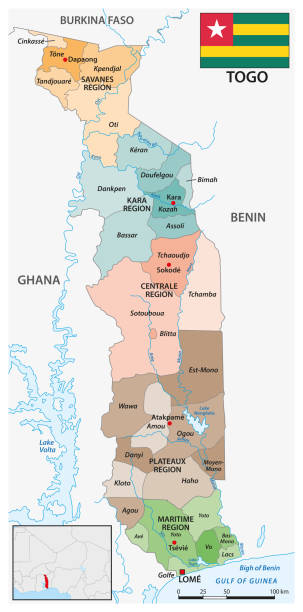
Benin
Burkina Faso
Cabo Verde
Côte d’Ivoire
Gambia
Ghana
Guinea
Guinea-Bissau
Liberia
Mali
Niger
Nigeria
Romania
Senegal
Sierra Leone
South Africa
In addition, holders of diplomatic or service passports from China and Morocco are also exempt from Togo’s visa requirements. Nationals of all other countries not listed above must obtain a valid Togo visa before they will be permitted to enter the country.
What Types of Visas Are Available for Travel to Togo?
The main types of visas issued by the Togolese government are:
Togo Immigration Visa, for foreigners intending to settle in Togo long-term
Togo Tourist Visa, issued for single and multiple entries, and for up to 90 days. You can apply for a Togo Tourist Visa if you are traveling for tourism, visit, or other non-business related purposes.
Togo Business Visa, issued to foreigners traveling to Togo for business-related purposes of up to 90 days. It can be single- or multiple-entry.
Togo Transit Visa, issued to foreigners transiting through the territory of Togo. The transit visa for Togo can be for a single or double-entry (roundtrip).
What Documents Are Required to Apply for a Togo Visa?
When applying for a Togo visa, you will be required to submit several supporting documents. These typically include:
- A valid passport, with at least six months’ validity beyond your intended stay and a minimum of two blank pages.
- Photocopies of the first two pages of your passport.
- A completed Togo visa application form.
- Two recent passport-sized photographs that meet the following criteria:
- Size: 4.5 × 3.5 cm
- White background
- Neutral facial expression
- Full visibility of the face and head (head coverings are permitted only for religious reasons, provided the face is not obscured)
- Proof of a return or onward flight booking.
- Valid travel insurance covering the entire duration of your stay, or evidence of payment of a repatriation deposit.
- Yellow Fever vaccination certificate or vaccination booklet.
Additional documents may be required depending on the type of visa you are applying for:
For a Togo Tourist Visa:
- Proof of accommodation in Togo, such as a confirmed hotel reservation.
For a Togo Business Visa:
- A letter of invitation from the host company in Togo or documents detailing the business assignment.
For a Togo Transit Visa:
- Proof of onward travel;
- A valid visa for your final destination, if applicable.
For a Togo Immigration Visa:
- Proof of income, such as recent bank statements;
- A motivation letter;
- Proof of health insurance coverage.
If the applicant is under 18 years of age, a parental consent form signed by both parents is also required.
What Is the Process for Applying for a Togo Visa?
Foreign nationals who require a visa to enter Togo can apply through one of two available options:
- Visa on Arrival, which can be obtained directly at an approved port of entry in Togo; or
- Embassy or Consulate Application, by submitting a visa request in advance at a Togolese Embassy or Consulate in your country of residence or in a neighboring country.
Each of these Togo visa application methods has its own procedures and requirements, which are explained in detail below.
Applying for a Togo Visa Upon Arrival
Nationals of all countries are eligible for a Togo Visa On Arrival. However, the Togo Visa On Arrival is only valid for seven days, with the possibility to extend it for up to 90 days once you’re already in Togo. You can get a Togo Visa On Arrival at the visa-issuing counters at the international airport in Lome or any of the major border crossings.
You need to have a Togo visa application form and two passport-size pictures with you and pay a fee [Contact for quote]. You may also have to show proof of Yellow Fever vaccination, accommodation, and a return flight ticket, as well as any other documents depending on the purpose of your travel.
If you want to stay for longer than 7 days, you can apply to extend your visa at the Foreigners and Passport Service in Toga before your current visa expires. The Togo visa extension is free of charge. However, many travelers who know they want to stay in Togo for longer than 7 days opt for applying for the visa before they travel at a Togolese Embassy or Consulate because they consider it to be less of a hassle than applying for an extension.
Applying for a Togo Visa Prior to Travel

If you want to stay in Togo for longer than 7 days, you can apply for a visa from a Togolese embassy or consulate before you travel. The exact Togo visa application process changes depending on the specific embassy/consulate in which you apply, but can be summed up as follows:
- Contact the embassy/consulate or, if possible, visit their website to learn about their opening hours, working days, and any specific requirements.
- Complete the Togo visa application form
- Gather the required documents (see the documents below)
- Pay the Togo visa fee*
- Submit the documents and application at the embassy or consulate. Some diplomatic offices allow applicants to submit their visa applications through the mail, especially if they live far away.
- Wait for the visa application to be processed. If the application is approved you will either have to go pick up your passport in person or have it mailed back to you, depending on the way through which you applied.
*The method of paying for the visa fee changes from one consulate to the other. You may have to pay in cash at the time of application or through a bank transfer beforehand.
How to complete the Togo visa application form?
You can download the Togo visa application form from one of the websites of Togo’s diplomatic representations abroad. Some embassies or consulates require you to fill it out beforehand and have it with you when you submit the application. Depending on the format of the application form file, you may be able to complete it electronically then just print it and sign it. Or, you may have to print it first and fill it out by hand. The Togo visa application form includes questions that clarify the purpose of your travel to Togo. You may also be able to pick up the visa application form at the embassy or consulate itself.
How Long Does it Take to Process a Togo Visa?
The processing time for a Togo visa depends on the specific Embassy or Consulate, but you can expect to wait at least between 5 – 10 working days starting from the time they receive your completed application. It may take longer, however, depending on the specific circumstances so you should start the application process at least about a month in advance, especially if you’re going to apply by mail.
How Long is a Togo Visa Valid For?
The duration of your Togo visa depends on the manner through which you apply. As such:
- A Togo Visa On Arrival is valid for only up to 7 days and can be extended for an additional 30 days while in Togo
- A Togo visa obtained from an embassy/consulate is issued for a maximum of 90 days, for single or multiple entries
Can I Extend a Togo Visa?
Yes, you can extend a Togo Visa On Arrival before it expires at the Togo Foreigners and Passport Service offices in Lome. If you want to extend a 30-day or 90-day visa, then you can apply for an extension at the Directorate General of National Documentation of the Togo Ministry of the Interior.
Share This:
- GroConsult
- No Comments


In today’s increasingly interconnected global economy, businesses are no longer restricted by geographical borders when sourcing talent. Digital transformation, remote work adoption, and global expansion strategies have fundamentally reshaped how organizations build and manage their workforce. Companies can now hire a software engineer in Kenya, a finance analyst in Nigeria, a project manager in Ghana, or a customer support specialist in Rwanda—all without opening physical offices.
However, while global hiring unlocks access to world-class talent, it also introduces complex legal, tax, payroll, immigration, and compliance challenges. Each country has its own labor laws, tax frameworks, social security systems, and employment regulations. Navigating these independently can be expensive, risky, and time-consuming.
This is where Employer of Record (EOR) services play a transformative role.
At the forefront of this transformation in Africa and emerging markets is GroConsult, a trusted Employer of Record and workforce solutions partner helping companies expand seamlessly, compliantly, and cost-effectively across borders.
This article explores Employer of Record (EOR) services across industries and sectors, with a strong focus on Africa, and explains how GroConsult enables organizations to hire, manage, and scale global teams with confidence.
What Is an Employer of Record (EOR)?
An Employer of Record (EOR) is a third-party organization that legally employs workers on behalf of another company. While the client company manages the employee’s day-to-day responsibilities, performance, and deliverables, the EOR assumes responsibility for all legal and administrative employment obligations.
These responsibilities typically include:
- Employment contracts compliant with local labor laws
- Payroll processing and salary disbursement
- Income tax, social security, and statutory deductions
- Benefits administration
- Employment compliance and labor law adherence
- Termination management and severance compliance
- Immigration and work permit support (where applicable)
With an EOR, companies can legally hire employees in foreign countries without establishing a local legal entity, significantly reducing cost, risk, and time to market.
Why Employer of Record Services Are Critical for Africa-Focused Expansion
Africa is one of the fastest-growing talent markets in the world. With a young population, expanding digital skills base, and increasing foreign investment, the continent presents immense opportunities for global companies.
However, Africa is not a single market—it consists of 54 countries, each with unique employment laws, tax regimes, currency regulations, and immigration frameworks. This diversity makes EOR services not just helpful, but essential.
GroConsult’s Employer of Record services are designed specifically to address the complexities of African markets while maintaining global standards of compliance, transparency, and operational excellence.
Key Industries Leveraging Employer of Record Services
1. Technology and IT
The technology sector is one of the largest adopters of Employer of Record services globally. Companies increasingly rely on distributed teams for software development, cybersecurity, data analytics, AI, product design, and IT support.
Across Africa, countries like Ghana, Nigeria, Kenya, Egypt, Rwanda, and South Africa have emerged as major tech talent hubs.
How GroConsult supports tech companies:
- Rapid onboarding of developers and engineers
- Local employment contracts compliant with labor laws
- Multi-currency payroll management
- Equity, allowances, and benefits structuring
- Contractor-to-employee conversion
For startups and scale-ups, GroConsult enables fast market entry without the legal burden of setting up subsidiaries.
2. Healthcare and Pharmaceuticals
Healthcare organizations require highly specialized professionals—doctors, nurses, laboratory technicians, researchers, and regulatory experts. Compliance is especially critical due to licensing requirements, healthcare regulations, and immigration controls.
GroConsult’s EOR solutions for healthcare include:
- Work permits and residence permits for expatriate professionals
- Compliance with healthcare labor regulations
- Payroll and statutory contributions
- Dependent permits and relocation support
- Confidential handling of sensitive employment data
This allows healthcare providers and NGOs to focus on patient care and public health outcomes rather than administrative complexity.
3. Manufacturing and Industrial Operations
Manufacturers expanding into Africa often face challenges related to labor unions, minimum wage laws, overtime regulations, and occupational safety compliance.
Employer of Record services help manufacturers hire local teams for:
- Factory operations
- Supply chain and logistics
- Quality control
- Engineering and maintenance
- Regional sales and distribution
GroConsult ensures that manufacturing companies remain compliant with local labor standards while maintaining operational efficiency and workforce stability.
4. Education, EdTech, and e-Learning
The rise of online education and remote learning has enabled institutions to recruit educators, trainers, curriculum developers, and academic administrators from across the globe.
With GroConsult as an EOR, education providers can:
- Hire educators across multiple African countries
- Ensure correct tax treatment and statutory deductions
- Pay educators in local currencies
- Comply with employment classification rules
- Offer competitive local benefits
This is especially valuable for international schools, online academies, and professional training organizations operating in Africa.
5. Non-Profit Organizations and Development Agencies
Non-profits, international NGOs, and development organizations often operate in multiple countries with limited administrative capacity. Compliance failures can lead to reputational damage and funding risks.
GroConsult supports non-profits by:
- Acting as the legal employer for local staff
- Managing payroll and compliance transparently
- Supporting donor audit requirements
- Providing immigration and mobility services
- Ensuring ethical and compliant employment practices
This enables organizations to focus on impact rather than administration.
Why Employer of Record Services Are Transformative
Simplified Global Hiring
Traditionally, hiring in a new country required:
- Registering a legal entity
- Opening bank accounts
- Hiring local accountants and lawyers
- Managing ongoing compliance
With GroConsult’s EOR services, companies can hire in days instead of months, accelerating growth and market entry.
Guaranteed Compliance Across Jurisdictions
Labor laws in Africa change frequently and vary widely across countries. GroConsult maintains in-country expertise to ensure full compliance with:
- Employment legislation
- Tax authorities
- Social security institutions
- Immigration departments
This significantly reduces legal and financial risk.
Cost-Effective Workforce Expansion
Setting up entities is expensive and often unjustified for small teams or pilot markets. EOR services eliminate:
- Entity setup costs
- Legal retainer fees
- Long-term fixed overheads
GroConsult offers a predictable, scalable cost model ideal for startups, SMEs, and multinational corporations alike.
Enhancing Business Flexibility Through EOR Services
Supporting Remote and Hybrid Work
Remote work is no longer optional—it is a strategic advantage. GroConsult enables companies to hire remote employees across Africa while maintaining full legal compliance.
Fast Market Entry and Exit
With an Employer of Record, companies can:
- Test new markets quickly
- Scale teams up or down as needed
- Exit markets without complex legal closures
This flexibility is critical in fast-changing economic environments.
Contractor and Workforce Classification Management
Misclassifying contractors as employees can lead to severe penalties. GroConsult helps businesses:
- Structure compliant contracts
- Convert contractors to employees
- Avoid permanent establishment risks
Challenges Addressed by Employer of Record Services
Navigating Complex Labor Laws
Each African country has unique employment rules around:
- Termination
- Severance
- Leave entitlements
- Union engagement
GroConsult acts as a trusted compliance partner, minimizing exposure to disputes.
Multi-Currency Payroll and Tax Management
Paying employees across borders involves currency risks, tax compliance, and banking challenges. GroConsult ensures:
- Timely salary payments
- Accurate tax deductions
- Statutory reporting compliance
Localized Benefits and Employee Experience
Competitive benefits differ across countries. GroConsult designs localized benefit packages that attract and retain top talent while remaining compliant.
The Role of Technology in Modern EOR Services
GroConsult leverages modern workforce technology to deliver efficient and transparent services, including:
- Global HRIS integration for employee data management
- Automated compliance monitoring
- Secure payroll systems
- Data protection aligned with global standards
Technology enhances accuracy, scalability, and employee experience.
Employer of Record Services in Emerging Markets
Emerging markets across Africa present immense opportunities—but also regulatory complexity. GroConsult provides:
- Local market intelligence
- Employment cost forecasting
- Cultural and regulatory guidance
- Risk mitigation strategies
This makes GroConsult a strategic partner, not just a service provider.
Choosing the Right Employer of Record Partner
When selecting an EOR, businesses should evaluate:
- Regional expertise, especially in Africa
- Proven compliance track record
- End-to-end service coverage (EOR, payroll, immigration, HR)
- Technology and reporting capabilities
- Dedicated human support
Why GroConsult Is a Leading Employer of Record Partner in Africa
GroConsult stands out as a trusted Employer of Record partner with deep expertise in Africa and emerging markets.
What Sets GroConsult Apart
- Strong presence across key African markets
- Comprehensive EOR, payroll, HR, tax, and immigration services
- Africa-first approach with global standards
- Dedicated account management and advisory support
- Proven experience supporting multinationals, startups, NGOs, and remote teams
GroConsult enables companies to hire talent across Africa without establishing legal entities, while ensuring full compliance, transparency, and efficiency.
Building the Future of Work with GroConsult
Employer of Record services are no longer a luxury—they are a strategic necessity for modern businesses expanding globally. Across technology, healthcare, manufacturing, education, and non-profit sectors, EOR solutions are reshaping how organizations build and manage distributed teams.
With its deep regional expertise, compliance-driven approach, and human-centered service model, GroConsult empowers businesses to scale confidently across Africa and beyond.
For organizations looking to expand into Africa, manage remote teams, or simplify global employment, GroConsult provides a smarter, compliant, and cost-effective pathway to building a truly global workforce.
Share This:
- GroConsult
- No Comments


Ghana stands at a decisive crossroads. After years of macroeconomic instability, escalating inflation, and weakened investor confidence, 2026 is being framed by policymakers as a year of strategic consolidation and disciplined economic reform rather than rapid expansion. At the heart of this shift is the Bank of Ghana (BoG), whose Governor, Dr. Johnson Pandit Asiama, has outlined a bold agenda that prioritises sustainability, institutional strength, monetary discipline, and long-term policy consistency.
This article explores why 2026 is a turning point for Ghana’s economic strategy, what the new focus entails, and how these reforms could reshape Ghana’s macroeconomic trajectory.
Why 2026 Matters: The End of Adjustment, Start of Consolidation
In public remarks at the Bank’s New Year media engagement in Accra, Dr. Johnson Asiama stressed that 2026 will be a transition year — moving from rapid, adjustment-driven policies towards durable frameworks anchored in institutional strength and fiscal discipline.
Rather than reacting to immediate pressures, the BoG’s 2026 strategy emphasises:
- Policy discipline instead of ad hoc interventions
- Strong, predictable monetary and financial systems
- Sustainable, long-term economic outcomes
- Quality over quantity in reforms
This marks a notable departure from earlier phases characterised by aggressive emergency measures to stabilise prices and secure balance-of-payments stability.
From Stability to Sustainable Growth: The New Economic Playbook

1. Entrenching Macroeconomic Stability
After a tumultuous period marked by high inflation and exchange-rate volatility, the Bank of Ghana has succeeded in restoring a degree of economic stability — a foundation that the BoG now aims to make permanent.
Monetary authorities are prioritising:
- Credible, predictable monetary policy
- Effective liquidity management
- Forward-looking policy signals to markets
This means moving beyond crisis management and embedding stability into the economy’s DNA, which is vital to investor confidence and long-term planning.
2. Discipline in Financial Markets and Banking
Ghana’s financial markets and banking sector are set to experience deeper systemic discipline. According to the BoG, priorities include:
- Preventive financial supervision
- Rigorous governance standards in banking
- Sound capital planning and risk detection before systemic problems emerge
These reforms are designed to ensure the financial sector supports sustainable growth without the need for turbulent interventions.
3. Anchoring Policies in Institutions, Not Individuals
A key theme of 2026’s economic strategy is institutionalisation — making policies resilient to leadership changes and political shifts. Dr. Asiama emphasised the need for a shift from personality-driven governance to rules-based, credible systems that ensure long-term stability regardless of political cycles.
Monetary Policy: Discipline, Rates, and Future Outlook

Interest Rate Reductions Reflect Confidence
Ghana’s central bank has presided over a significant easing of monetary policy, reducing the policy rate aggressively through 2025 and into 2026. This trajectory reflects sustained disinflation, improved fiscal discipline, and a return of macroeconomic confidence.
This easing cycle has helped stimulate investment and reduce borrowing costs, setting the stage for broader economic expansion.
Lending Rates Could Fall Below 10% by Year-End
In a clear signal of optimism, the BoG has projected that lending rates in Ghana could fall to around 10% by the end of 2026 — a dramatic turnaround from the double-digit costs of capital that historically stunted business growth and entrepreneurship.
Lower lending rates mean:
- More affordable business loans
- Greater access to capital for SMEs
- Boosted investment and job creation
This is a central plank in the strategy to transform raw economic stability into inclusive economic growth.
Cedi Stability: A Balanced Approach

The Ghanaian cedi’s behaviour in recent years has reflected broader structural challenges. While the currency has shown moments of strengthening, the BoG has emphasised that exchange-rate stability must be balanced and consistent with macroeconomic fundamentals — not artificial or overly anchored.
This nuanced approach is important for maintaining export competitiveness and avoiding distortions that could undermine growth.
Ongoing Reforms: From Gold Reserves to Media Engagement
Revising Strategic Programmes like Gold-for-Reserves
One area of ongoing attention is Ghana’s Gold-for-Reserves programme — a scheme designed to bolster reserves in past years. The BoG Governor has urged Parliament and stakeholders to work collaboratively on reforming this initiative, making it more efficient and effective in supporting economic stabilisation.
Strengthening Media Partnerships for Better Economic Awareness
An often-overlooked pillar of Ghana’s economic strategy involves improving how economic news and policy information are communicated. The BoG plans to deepen engagement with journalists and create training programmes aimed at elevating the quality of economic reporting.
This is vital in a digital age where accurate information can shape investor sentiment and public understanding.
The Broader Economic Context: IMF Support and Sector Priorities

Ghana’s economic strategies are not formulated in a vacuum. IMF support has been crucial in backing fiscal consolidation and structural reforms that put the economy on a more stable footing. Progress in meeting benchmarks has led to positive assessments from international partners.
Meanwhile, the government’s broader 2026 economic plan highlights priority sectors such as:
- Agribusiness and agro-processing
- Industrialisation and manufacturing
- Infrastructure and energy expansion
These initiatives are expected to diversify the economy and support value addition across key segments.
What This Means for Ghana’s Future
The BoG’s message is clear: 2026 is not just another year — it’s a turning point. Rather than focusing on short-term fixes, Ghana’s economic strategy is oriented toward building deep, resilient foundations that can withstand global shocks, support investment, and unlock sustainable growth.
Across monetary policy, financial sector reform, institutional strengthening, and communication strategies, the emphasis is on delivering long-lasting dividends for businesses, investors, and ordinary citizens alike.
As the year unfolds, the success of this strategy will hinge on disciplined implementation, continued policy coherence, and strong collaboration between government agencies, the private sector, and international partners.
Share This:
- GroConsult
- No Comments

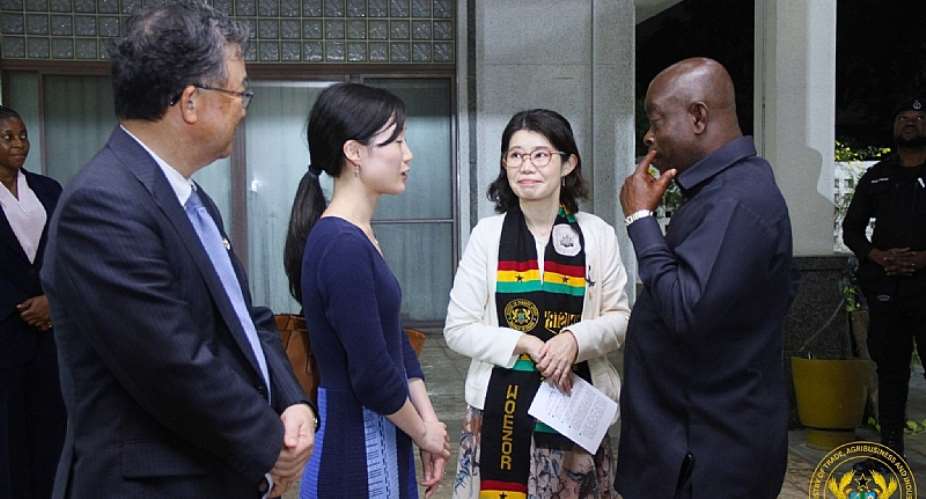
Ghana has reinforced its status as a strategic manufacturing and export hub for Japanese businesses seeking access to West Africa and the wider African Continental Free Trade Area (AfCFTA) market, as the Ghana-Japan Business Forum opened in Accra.
Deputy Minister for Trade, Agribusiness, and Industry, Sampson Ahi, said government is deliberately shifting its engagement with Japan away from raw material exports toward value-added manufacturing, logistics, and integrated industrial value chains that can serve both domestic and continental markets.
Speaking at the forum on Thursday, January 15, 2026, at the Ghana EXIM Bank, Mr. Ahi encouraged Japanese companies to leverage Ghana’s stable investment climate, expanding industrial parks, and Special Economic Zones to establish production bases capable of serving the AfCFTA market.
He reiterated Ghana’s ambition to become a gateway for export-oriented manufacturing into Africa, highlighting the country’s © political stability, entrepreneurial culture, and young, trainable workforce as strong incentives for long-term industrial investment.

“When Ghana’s stability and workforce are combined with Japan’s discipline, quality, and innovation, the outcome is not trade in raw materials but value addition, jobs, and globally competitive businesses,” he said.
Mr. Ahi outlined key priority areas for Ghana-Japan cooperation, including industrial platforms and export-oriented manufacturing, manufacturing value chains and industrial inputs, as well as logistics, trade facilitation, and standards. These sectors, he noted, present immediate opportunities for joint ventures that can create jobs and deepen skills transfer for Ghanaians.
Japan’s Ambassador to Ghana, H.E. Hiroshi Yoshimoto, described Ghana as a reliable partner for Japanese investors, citing the country’s consistent economic reforms and strong democratic governance. He reaffirmed Japan’s commitment to supporting technology transfer, infrastructure development, and industrial capacity building.
Japan’s Minister for Foreign Affairs, Dr. Kunimistu Ayano, also underscored the importance of robust public-private collaboration in translating diplomatic relations into tangible economic outcomes, noting Japan’s interest in supporting industrial development, sustainable energy, and logistics infrastructure in Ghana.
Chief Executive Officer of the Ghana Investment Promotion Centre (GIPC), Simon Madjie, assured investors of Ghana’s business-friendly regulatory environment and strong aftercare services. He added that government initiatives, including the 24-hour economy policy framework, further enhance Ghana’s competitiveness as an investment destination in the sub-region.
In a statement delivered on his behalf, the Secretary-General of the AfCFTA Secretariat encouraged Japanese businesses to view Ghana as a launchpad into the African market, noting that companies operating from Ghana can access a single market of more than 1.3 billion people under the AfCFTA.
The forum featured extensive business-to-business engagements, with discussions centred on sustainable agribusiness, manufacturing, energy solutions, transportation infrastructure, and digital communications. Several Japanese firms expressed interest in partnerships and joint ventures, signalling a growing pipeline of investments that could accelerate Ghana’s industrialisation agenda and deepen economic ties between the two countries.
This article was originally published on: CitiNewsRoom
Share This:
- GroConsult
- No Comments

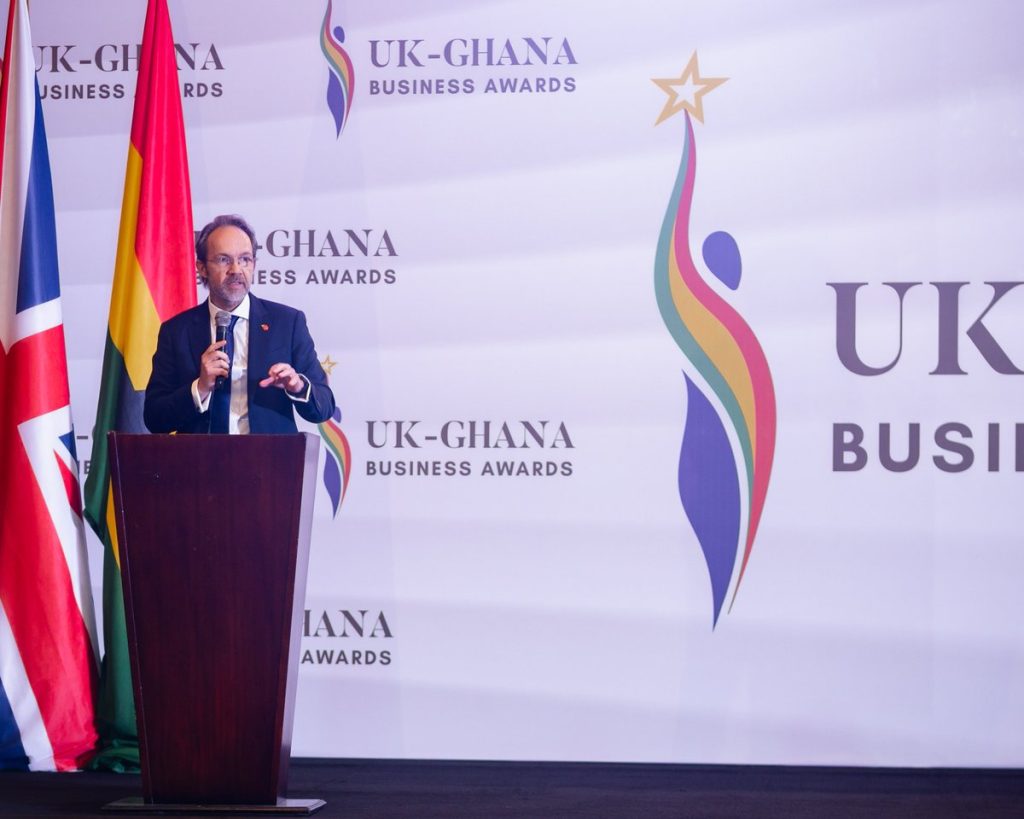
The UK-Ghana Chamber of Commerce (UKGCC) has released the seventh edition of its annual Business Environment and Competitiveness Survey (BECS) Report for the year 2025.
This year’s survey recorded a significant rise in participation, with 1,016 businesses responding — a 40% increase over 2024’s 725 participants. Respondents were drawn from 22 industries, including wholesale and retail trade, other services, accommodation and food services, healthcare, education, construction, transport, professional services, agriculture, and multiple branches of manufacturing such as food and beverages, textiles, machinery, chemicals, electronics and metals.
Overall sentiments expressed by businesses indicate a cautiously positive outlook. Many respondents observed that Ghana’s economic climate is stabilising, aided by lower inflation, a more stable currency, and declining interest rates. Businesses also acknowledged improvements in infrastructure, management skills, telecommunications and political stability.
As a result, the proportion of companies who perceive Ghana’s business environment as trailing behind regional competitors fell from 69% last year to 58%.
Key Survey Findings
The survey’s findings point to several encouraging developments. For instance, respondents noted improved access to quality infrastructure and lower telecommunication costs, reflecting ongoing investment and reforms in these areas. Businesses also reported stronger management capability across organisations, increasing adoption of advanced technology, and greater confidence in the stability and effectiveness of the political system following the 2024 general elections.
These positive changes are contributing to more predictable operating conditions and gradually improving competitiveness.
However, despite these positive indicators, respondents noted that growth continues to be constrained. 57% of businesses highlighted the high cost of land as a major impediment to expansion, while the cost of machinery (57%), and technology (56%) remain significant concerns. Locally sourced raw materials were cited as increasingly expensive, affecting production and pricing decisions, particularly in the manufacturing sector.
Although access to capital has improved generally, small and medium-sized enterprises still face difficulties securing affordable financing. Power supply reliability has strengthened, but energy remains a costly component of doing business.
On the governance front, respondents reported significant improvement in the regulatory environment compared to last year, a reflection of government’s growing commitment to strengthening transparency, predictability, and overall business efficiency.
They commended government for its reforms aimed at simplifying business registration and tax compliance, as well as the noticeable progress in curbing corruption and bureaucratic delays—issues that previously eroded investor confidence.
Priority Areas for Action

The 2025 UKGCC BECS report identifies several priority areas that require sustained collaboration between government and the private sector. These include reducing the cost of critical production inputs, expanding access to affordable financing, strengthening investment protection, and pursuing deeper regulatory and tax reforms.
Businesses surveyed also emphasised the need for further digitalisation of public services to reduce bureaucracy and called for greater support to help companies take full advantage of opportunities under the African Continental Free Trade Area (AfCFTA).
Respondents further stressed the importance of continued investment in technical and tertiary education to build a workforce capable of meeting Ghana’s future industrial needs.
Commenting on the findings, Anthony Pile, MBE, Chairman of the UKGCC’s Executive Council, remarked that “the 2025 edition of the survey is particularly significant as it reflects the sentiments of businesses during a period of transition and recovery.”
He noted that while Ghana’s economy is showing signs of stability, structural issues such as the high cost of land, technology, machinery and raw materials continue to hinder growth. He emphasised the need for targeted interventions to ensure that businesses — especially small and medium-sized enterprises — are fully able to harness emerging opportunities.
For his part, Vish Ashiagbor, Country Senior Partner at PwC Ghana, a UKGCC Platinum member company and consultants/advisors for the report, also described the results as indicative of a cautiously improving business climate.
He highlighted the importance of continued collaboration between policymakers and the private sector, noting that deeper reforms will be essential to address long-standing bottlenecks, strengthen investor confidence and sustain inclusive growth.
About the Survey
The UKGCC’s annual Business Climate and Competitiveness Survey was first launched in 2019 and has been conducted every year since then. The main purpose of the survey is to increase the understanding of opportunities and challenges that the Ghanaian market presents for UKGCC members and businesses generally, whether large or small, new or old, and across all sectors.
The survey provides a platform for businesses to provide key feedback on the health, confidence, intentions, and issues of businesses in Ghana and therefore, serves as the foundation for the UKGCC’s advocacy work.
The 2025 edition provides a comprehensive analysis of several important indications of the current business climate, as perceived by businesses, offering a data-driven look at the trends shaping the business landscape.
This article was originally published on: MyJoyOnline
Share This:
- GroConsult
- No Comments
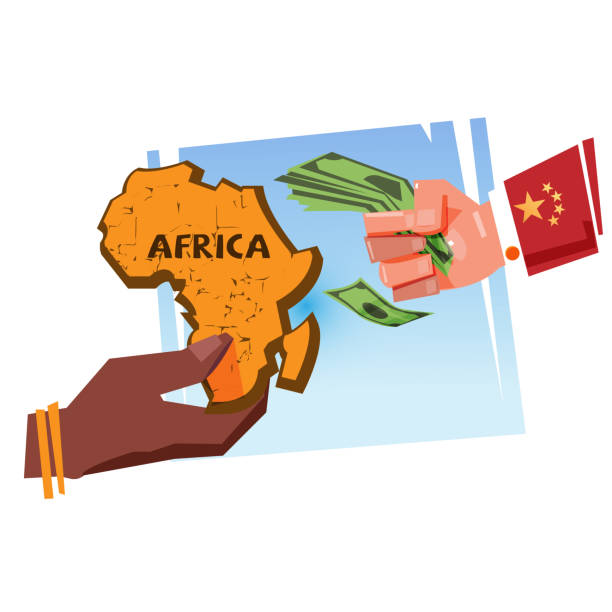

Understanding Africa’s Unique Employment Landscape
Africa is a mosaic of diverse countries—each with its own labor laws, payroll regulations, taxation systems, and cultural nuances. Global payroll platforms operating remotely can struggle to keep pace with these dynamic legal requirements. Local EOR providers possess in-depth knowledge of regional compliance, ensuring business operations avoid costly penalties, legal challenges, and workforce disruptions. This expertise is critical to seamless payroll execution and workforce management.
Simplifying Payroll Complexity and Enhancing Employee Experience
Payroll in Africa is often complicated by factors like multiple legal currencies, fluctuating exchange rates, and mandatory benefit contributions differing vastly by country. Local EOR partners not only navigate these intricacies but also offer robust payroll processing capabilities that guarantee timely and accurate salary disbursements. This reliability builds employee trust and satisfaction, a key component for retaining talent in emerging markets.
Accelerating Market Entry and Business Scalability

For global platforms, local EORs act as operational accelerators. They bring established infrastructure, local administrative capacity, recruitment networks, and legal compliance frameworks that significantly reduce the time and cost to enter new African markets. This agility allows global payroll platforms to scale client operations rapidly without the need for setting up subsidiaries or branches.
Delivering End-to-End Workforce Solutions
An effective EOR partnership extends beyond payroll. Local providers manage contracts, benefits administration, HR communication, and compliance reporting—taking the burden off global platforms so they can focus on delivering superior service and expanding their client base. Holistic workforce management empowers businesses to confidently hire and operate across various African jurisdictions with minimal risk.
The Strategic Advantage with GroConsult
GroConsult’s local presence, regulatory expertise, and extensive partnerships across Africa uniquely position us as the preferred EOR provider for global payroll platforms seeking reliable on-the-ground execution. By collaborating with GroConsult, platforms gain a trusted partner committed to ensuring compliance, simplifying payroll, and enabling seamless workforce expansion in the continent’s fastest-growing markets.
Partnering with a local EOR like GroConsult is not just a choice—it’s the foundation for success in Africa’s diverse and evolving employment landscape.
Share This:
- GroConsult
- No Comments

Ghana 2025 Economic Growth Forecast: An Overview
The Ghana 2025 Economic Growth Forecast has recently been revised upward by the World Bank, now projecting end-of-year GDP growth at approximately 4.3%. This revision underscores Ghana’s resilience in navigating regional and global economic challenges. This article breaks down the sector drivers, policy implications, and what this forecast means for businesses and citizens alike.
Historical Context and Forecast Evolution
Earlier in 2025, the World Bank had projected a more conservative 3.9% growth, citing fiscal pressures, inflation, and climate vulnerabilities, particularly in agriculture. The adjustment to 4.3% reflects stronger-than-expected performance across key sectors and signals increased investor confidence. Other institutions, such as the African Development Bank (AfDB), projected 4.5%, while Fitch Ratings estimated 4.2%, showing Ghana’s competitive trajectory among Sub-Saharan economies.
Sectoral Drivers of Growth
The services sector has been the backbone of the Ghana 2025 Economic Growth Forecast, posting a 9.9% growth in Q2 2025. Telecommunications, financial services, and tourism are leading contributors. Meanwhile, gold exports and mining have strengthened the cedi and bolstered foreign reserves, supporting macroeconomic stability. Agriculture, particularly cocoa production, has stabilized despite climate challenges. For more details, you can check the World Bank Ghana Economic Update.
Policy Implications and Structural Reforms
Sustaining the Ghana 2025 Economic Growth Forecast requires strategic structural reforms. Key areas include improving fiscal discipline, enhancing public financial management, and reforming the energy sector. These measures aim to balance debt obligations with investments in infrastructure and human capital, ensuring long-term sustainable growth.
Scenario Analysis: 2025–2027
To anticipate the implications of the Ghana 2025 Economic Growth Forecast, consider three scenarios:
- Base Case: 4.3% growth with moderate reforms and stable commodity prices.
- Upside Scenario: Growth exceeds 5% if reforms accelerate and foreign direct investment increases.
- Downside Scenario: Growth falls below 4% if inflation spikes, refinancing risks emerge, or climate shocks disrupt key sectors.
These scenarios provide businesses, policymakers, and investors with a framework for planning and risk management.
Comparative Perspective
Ghana’s growth forecast positions it competitively within West Africa. Nigeria is projected to grow at 3.8%, and Kenya at 4.0%, highlighting Ghana’s relative resilience. Lessons from peer economies emphasize fiscal reforms and investment in technology-driven sectors. For regional comparisons, refer to the AfDB’s West Africa Economic Outlook.
Impact on Businesses and Citizens
The upward revision in the Ghana 2025 Economic Growth Forecast has meaningful implications:
- SMEs could experience improved access to finance due to lower macroeconomic risk
- Exporters may benefit from a more stable cedi
- Employment opportunities in the services and mining sectors are projected to rise
Economists have welcomed the Ghana 2025 Economic Growth Forecast revision, noting it reflects both structural improvements and favourable global conditions.
These improvements enhance household income and consumption, supporting broader economic stability. For more information on local business trends, visit the Ghana Chamber of Commerce.
Conclusion
The Ghana 2025 Economic Growth Forecast of 4.3% by the World Bank demonstrates both resilience and growth potential. While challenges such as debt management and climate risks remain, effective reforms, sectoral growth, and policy alignment create a pathway to sustainable development. Businesses, investors, and citizens stand to benefit from this trajectory if reforms are implemented effectively.
GroConsult Management Consortium offers a comprehensive suite of services designed to help businesses navigate Ghana’s dynamic economic landscape and expand across Africa. Our expertise spans every stage of business growth, ensuring compliance, efficiency, and strategic advantage:
- Strategic Business Planning: Tailored strategies to optimize investments, assess market opportunities, and guide sustainable growth.
- Payroll & Global HR Outsourcing: End-to-end solutions, including payroll, employee benefits, compliance, Statutory filing, and more.
- Employer of Record (EOR) Services: Legal employment solutions for companies expanding into Ghana or Africa without establishing a local entity.
- Accounting & Audit Services: Accurate financial reporting, auditing, and assurance to maintain regulatory compliance and financial transparency.
- Project Finance & Advisory: Support with project planning, funding structures, and financial management to ensure successful implementation.
- Immigration & Expat Management: Visa, work permit, and relocation support for foreign staff and international teams.
Share This:
- GroConsult
- No Comments


As a business owner, your mind is constantly on growth, customers, and innovation. The last thing you want to worry about is whether you calculated the correct payroll tax withholding for your newest employee or if you missed a state filing deadline. This level of administrative stress can quickly become a bottleneck to your strategic goals, making the choice to use Payroll and Tax Management Services a crucial decision for efficiency.
This is where a professional Payroll and Tax Management Service can change your business life. It’s more than just a convenience; it’s a strategic partnership that ensures your people are paid accurately and your business remains in good standing with the government. By leveraging the expertise of specialists, you shift critical but tedious tasks from being a constant source of anxiety to a reliably automated function.
Here are the key benefits of handing over your payroll and tax responsibilities to the experts.
1. Achieve True Compliance and Eliminate Costly Penalties
Tax and labor laws are constantly changing at the federal, state, and local levels. Keeping up with new tax rates, reporting requirements, and labor regulations (like the Fair Labor Standards Act or evolving sick leave rules across different municipalities) is a full-time job. For a growing business operating across multiple jurisdictions, this complexity is multiplied.
- Expert Knowledge: A professional service has dedicated teams whose sole job is to monitor every regulatory change from the IRS to local government ordinances. They ensure your payroll calculations, tax withholdings, and mandatory filings are always current and accurate.
- Avoid Fines and Interest: Even small payroll errors can result in significant penalties from tax authorities. For example, the IRS imposes specific penalties for failure to deposit taxes on time. By outsourcing, you drastically reduce the risk of late or incorrect filings, protecting your cash flow from unnecessary government fines. For deeper insight into payroll regulations, you can refer to the official GRA employer guide.
2. Reclaim Your Time and Focus on Core Business
Payroll processing is tedious and time-consuming. It involves calculating hours, managing various deductions (health insurance, retirement contributions), calculating taxes, and then preparing and filing multiple forms. For a small business owner, these tasks can steal hours away from strategic activities that actually drive revenue.
- Automation is Key: Professional Payroll and Tax Management Services automate all the heavy lifting: wage and tax calculations, secure direct deposits, and quarterly/annual tax form submissions (like W-2s and 1099s). This moves payroll from a multi-day administrative chore to a few clicks of verification.
- Increased Productivity: By offloading Payroll and Tax Management Service complex administrative burdens, you and your team can dedicate your full attention to sales, customer service, product development, and the other core functions that grow your business. Time saved is, quite literally, money earned.
3. Ensuring Accuracy: The Value of Precision in Payroll
Human error is inevitable, especially when dealing with complex calculations and tight deadlines. A simple data entry mistake in a tax ID or a miscalculation of overtime can have a ripple effect, leading to frustrated employees and potential compliance issues.
- Error-Free Calculations: Automated payroll software performs complex calculations with perfect accuracy every time. This eliminates the headache of overpaying or underpaying employees and ensures tax deductions are precise.
- Guaranteed Filing: Many top payroll providers offer an accuracy guarantee, meaning they will absorb and pay any penalties incurred due to their error, giving you ultimate peace of mind. This guaranteed protection is one of the most compelling reasons to invest in Payroll and Tax Management Services.
4. Enhance Employee Satisfaction and Morale
Your employees rely on accurate and timely pay. Nothing damages morale faster than a delayed paycheck or an incorrect deduction. A professional system is the foundation of a positive employer-employee relationship.
- Reliable Pay: Payroll services ensure your team is paid on time, every time, through reliable and secure methods like direct deposit. This builds trust and goodwill within your workforce.
- Employee Self-Service: Most modern payroll platforms include employee portals where staff can securely view digital pay stubs, check accrued vacation balances, and update personal information. This drastically reduces administrative inquiries for your HR or management team, allowing them to focus on more strategic initiatives like the ones we’ve previously discussed in our [Small Business HR Best Practices Guide] $\rightarrow$ (Internal Link).
5. Enjoy World-Class Data Security with Payroll and Tax Management Services
Payroll data includes highly sensitive information: social security numbers, bank details, and personal addresses. In-house payroll systems may not have the robust security needed to protect this data from increasingly sophisticated cyber threats.
- Advanced Protection: Professional providers invest heavily in enterprise-level security measures, including data encryption, secure servers, and disaster recovery plans. They are specialists in keeping confidential employee data safe and compliant with privacy laws, such as HIPAA for benefits data. Attempting to match this level of security internally is cost-prohibitive for most small to mid-sized businesses.
Conclusion: A Smart Investment for a Growing Business
Outsourcing payroll and tax management is not an expense—it’s an investment in your business’s future. It frees up your most valuable resource (your time), protects you from regulatory risks, and contributes directly to a more efficient, accurate, and secure financial operation.
If you are currently spending hours on paperwork, stressed about tax deadlines, or worried about compliance, it’s time to explore how a professional Payroll and Tax Management Services can transform the way you do business.
Share This:
- GroConsult
- No Comments

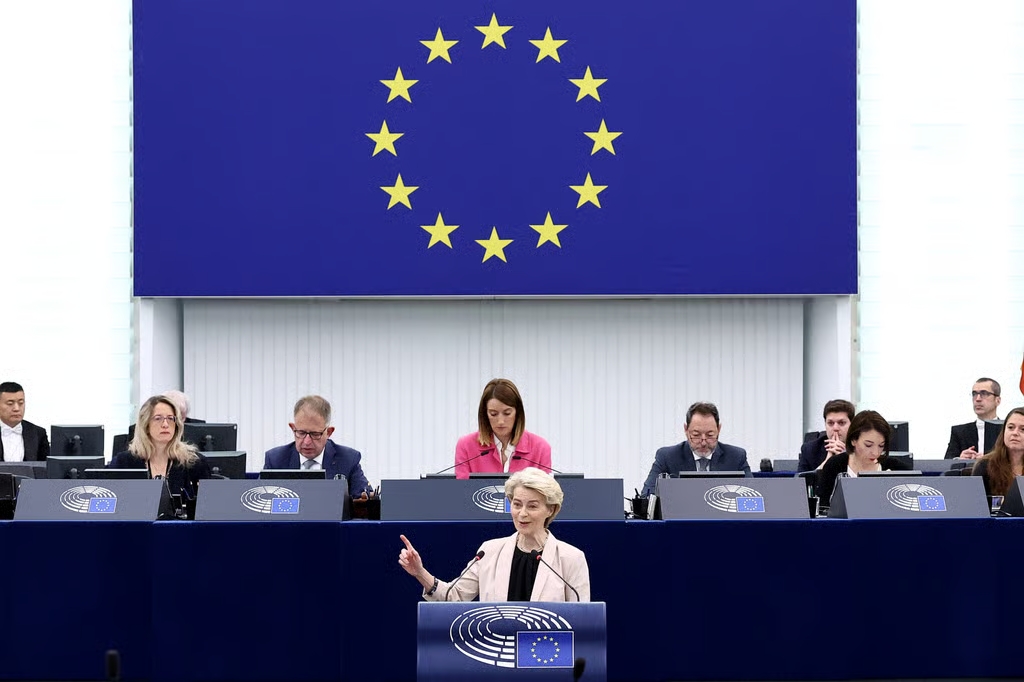
The GDPR Simplification (EU) proposal, announced by the European Commission on 21 May 2025, marks a major turning point for how businesses handle compliance across Europe.
As part of the wider Omnibus IV Simplification Package, the proposal aims to make compliance easier, especially for small and mid-sized companies, without compromising data protection.
In other words, the EU wants to cut down red tape, reduce administrative burdens, and give growing companies more breathing room while maintaining data privacy protection intact.
What’s Changing in GDPR Compliance
One of the most notable updates is the revision of Article 30(5) of the General Data Protection Regulation (GDPR).
Currently, only organisations with fewer than 250 employees are exempt from certain record-keeping requirements. The new proposal raises that threshold to 750 employees and replaces the vague “likely risk” test with a clearer “high-risk” standard.
This means fewer small and mid-sized companies will be buried in paperwork.
The proposal also introduces a new definition for Small Mid-Cap Enterprises (SMCs); businesses with fewer than 750 employees and either:
- Up to €150 million in annual turnover, or
- Up to €129 million in total assets.
SMCs will now enjoy some of the same exemptions that smaller firms already benefit from, helping to balance compliance obligations across different business sizes.
Why This Matters for Businesses Expanding Globally
For companies expanding into or out of the EU, these reforms bring both efficiency and responsibility.
Here is why it matters:
- Less complexity, lower costs: With simplified compliance for smaller firms, global companies can save time and resources when hiring teams across borders.
- Smarter, faster scaling: With fewer routine compliance tasks, HR and finance teams can focus on strategic goals such as talent growth and market expansion.
- Compliance still matters: These exemptions don’t mean companies can relax completely. Businesses handling large amounts of data or operating across jurisdictions must still meet all key GDPR requirements.
According to the UN Conference on Trade and Development (UNCTAD), regulatory complexity is one of the biggest barriers to doing business internationally, especially for growing firms. This reform directly addresses that challenge.
How It Affects HR, Payroll, and EOR Operations
The GDPR Simplification (EU) proposal has major implications for HR data, payroll systems, and Employer of Record (EOR) services:
- HR Data Management: Fewer administrative tasks for HR teams managing low-risk employee data, but compliance systems must remain strong and auditable.
- Payroll & Global Mobility: Cross-border hiring still requires proper data protection for employee records, payments, and reporting. The new rules simplify processes but don’t eliminate risk.
- EOR Partnerships: For companies using EOR or global payroll providers, the new framework reinforces the importance of choosing partners that understand both local regulations and global compliance standards.
What Businesses Should Do Now
To prepare for the new compliance environment, companies should:
- Audit data processes: Map employee data from collection to transfer, especially across borders.
- Assess risk levels: Review whether your activities might fall under “high-risk” processing.
- Update frameworks: Align HR, payroll, and immigration data workflows with the upcoming EU standards.
- Work with trusted partners: Choose EOR and compliance experts with proven multi-country experience.
The Bottom Line
The GDPR Simplification (EU) initiative is a step toward smarter, fairer compliance. It promises flexibility for smaller enterprises, but it doesn’t remove the need for diligence.
For global companies, particularly those expanding into the EU, this reform offers a chance to streamline compliance while scaling safely.
At GroConsult Management Consortium, we help businesses manage global workforce compliance from payroll and immigration to HR Outsourcing so they can expand confidently and sustainably without the stress.
Stay ahead of compliance change.
Book a consultation today to future-proof your global expansion strategy.
Share This:
- GroConsult
- No Comments


The report highlights that recent geopolitical developments at the international level and changes in the local political environment have had measurable effects on African economies. Consequently, the ranking of approximately two-thirds of the countries studied has changed compared to the previous edition.
The Seychelles and Mauritius are the best investment destinations in Africa in 2025 and 2026, ahead of the continent’s major economic powers such as South Africa, Nigeria and Egypt, according to a report published on Monday, October 27 by the South African financial services holding company Rand Merchant Bank (RMB), in collaboration with the Gordon Institute of Business Science (GIBS).
Titled “Where to Invest in Africa 2025/26”, the report analyzes the factors shaping the investment landscape in 31 countries representing 90% of the continent’s GDP, 83% of its population and 61% of its total area, based on 20 distinct indicators.
These indicators include, among others, GDP, GDP per capita, population size, urbanization rate, innovation, connectivity, exchange rate stability, levels of corruption, political stability, human development, inflation, and income inequality.
The indicators taken into consideration are grouped into four pillars: economic performance and potential; market accessibility and innovation; economic stability and investment climate; social and human development.
The Top 5 remains unchanged from the 2024/25 edition of the report. Seychelles and Mauritius retain their positions. Despite their very small populations and land areas, these two island nations remain highly attractive to investors, thanks in particular to high GDP per capita, a good level of human development, a low prevalence of corruption, and controlled inflation.
Egypt occupies the 3rd position, ahead of South Africa, Morocco, Ghana, Algeria, Ivory Coast and Tanzania, while Kenya closes the Top 10.
(See the ranking of the 31 African countries studied below).
Ivory Coast makes the strongest progress
The report focuses on fundamentals and structural elements that are expected to evolve slowly over time, so country rankings generally remain relatively stable from year to year. However, the 2025/2026 ranking clearly reflects the impact of recent international geopolitical developments and political changes on the continent. While 11 countries have maintained their position compared to last year, 13 have improved their ranking and 7 have fallen.
“Elections in several countries, episodes of unrest and political uncertainty, as well as global fragmentation and realignments, have all had measurable macroeconomic effects,” said Isaah Mhlanga, chief economist at RMB, quoted in the report. He added, “Changes in the political environment and declining foreign aid, coupled with the reorientation of global capital flows, are reshaping how African economies interact with the world.”
Côte d’Ivoire saw the most significant improvement in the rankings, rising from 16th to 8th place, thanks in particular to robust economic growth and sustained efforts in economic diversification. Other notable gains were made by Zambia (+5 places), Algeria (+3), and Tanzania (+3).
Nigeria recorded the steepest decline, falling nine places from the previous year’s ranking to 18th. This drop is largely attributed to the painful reforms implemented by President Bola Tinubu’s administration, which have led to economic hardship, including soaring inflation. Other countries also saw significant declines in the rankings compared to the previous year, notably Senegal (-6), Tunisia (-5), and Mozambique (-5).
The best African countries to invest in in 2025 and 2026:
Elaborating on investment opportunities in these African countries for 2025 and 2026 reveals a promising landscape driven by economic reforms, infrastructure development, sectoral growth, and governance improvements. Here’s an in-depth look for investors seeking strategic positioning in these markets:
Seychelles
Seychelles is positioned as a resilient economy with a focus on tourism, financial services, and green energy. The government’s commitment to economic diversification, coupled with macroeconomic stability, makes it a safe haven for offshore banking, luxury tourism, and sustainable investments, especially in eco-friendly projects. Its strong institutional frameworks provide a conducive environment for private equity and foreign direct investments.
Mauritius
Known as Africa’s financial hub, Mauritius continues to attract international investors through its stable political climate, favorable tax regime, and robust financial sector. Opportunities abound in fintech, renewable energy, and logistics, bolstered by ongoing reforms. Its strategic positioning provides access to markets across Africa, Asia, and beyond, making it ideal for regional headquarters and financial services.
Egypt
Egypt is shifting towards an export-oriented growth model with significant investments in infrastructure, energy, and manufacturing. Major reforms are underway to improve the business climate, including currency stabilization and deregulation. Sectors like renewable energy (solar and wind), construction, and agribusiness offer diverse opportunities, supported by government incentives and a large domestic market.
South Africa
Despite sluggish growth, South Africa’s well-established financial markets and diversified industrial base provide opportunities in renewable energy, mining, and technology. Its relatively stable regulatory environment and improving consumer market make it suitable for investments in green infrastructure, auto manufacturing, and technology start-ups, especially in urban centers like Cape Town and Johannesburg.
Morocco
Morocco has become a regional hub for green energy, manufacturing, and logistics, leveraging its proximity to Europe and Africa. Significant investments are underway in solar and wind power, EV supply chains, and port infrastructure, supported by comprehensive reforms and free trade agreements. The country’s strategic initiatives position it as an energy transition leader and manufacturing powerhouse.
Ghana
With rapid economic growth driven by non-oil sectors like agriculture, manufacturing, and services, Ghana offers ample opportunities in infrastructure, renewable energy, digital finance, and agribusiness. Its political stability and reforms towards fiscal consolidation strengthen investor confidence, making it a promising country for long-term growth in consumer markets and natural resources.
Algeria
Algeria’s economy is gradually diversifying away from oil dependence, with government-led reforms targeting manufacturing, agriculture, and renewable energy. Infrastructure modernization and privatization initiatives create avenues for foreign investment, particularly in energy transition projects, food security, and industrial development.
Ivory Coast
As West Africa’s emerging economic star, Ivory Coast boasts robust growth, especially in agriculture, infrastructure, and energy. Peaceful political transitions and IMF-backed reforms have improved the economic climate, attracting investments in ports, urban transit, and digital services. Its expanding middle class and regional trade position enhance its appeal.
Tanzania
Tanzania is benefiting from infrastructure upgrades, mineral exports, and agricultural development. With projects in natural gas, coffee, and textiles, it offers sector-specific investment potential, especially as government policies aim to attract foreign direct investment in energy, tourism, and manufacturing.
Kenya
Kenya’s leadership in fintech, mobile technology, and digital infrastructure drives its attractiveness. Large-scale projects in energy, transport, and agribusiness, supported by government incentives, position Kenya as East Africa’s investment hub. Its diversified economy offers opportunities in tech, logistics, and renewable energy .
Ethiopia
Ethiopia’s targeted reforms and infrastructural expansion focus heavily on industrial parks, textiles, and renewable energy, notably geothermal. While political stability remains crucial, its large labor force and government incentives make it appealing for manufacturing and export-driven industries.
Tunisia
Although facing economic challenges, Tunisia’s strategic location and improving reforms in tourism, ICT, and agribusiness present pockets of opportunity. Efforts to stabilize the economy and promote private sector-led growth remain ongoing.
Botswana
Known for political stability and prudent fiscal management, Botswana is attractive for diamond mining, eco-tourism, and financial services. Its resilient macroeconomic policies foster investor confidence in sustainable and resource-driven growth.
Senegal
Senegal’s political stability, expanding port facilities, and offshore oil and gas development make it an emerging energy and infrastructure hub in West Africa. Its proactive reforms and regional integration plans bolster prospects in digital, tourism, and logistics sectors.
Zambia
Post-debt restructuring has restored macroeconomic stability, turning Zambia into a prime candidate for investments in copper, cobalt, and green minerals. Policies encouraging exploration and sustainable mining, combined with rising global demand for battery minerals, enhance its regional significance.
Rwanda
Rwanda is a frontrunner in governance and ease of doing business within Africa, thanks to its streamlined regulations, investor-friendly policies, and transparent governance. The country is rapidly advancing in digital innovation, making it a hotspot for tech startups, especially in fintech and agritech. Investments in climate technology and smart city infrastructure are prioritized through government incentives, reflecting Rwanda’s vision to become an innovation-driven economy by 2030. Its low corruption reputation reduces operational risks, positioning Rwanda as an ideal destination for impact-focused and tech-driven investors committed to sustainable development.
Namibia
Namibia presents a compelling investment case, anchored by its stable political environment and rich natural resources, particularly uranium, diamonds, and other minerals. In 2025, the government pushed forward its nuclear energy ambitions, aiming to develop the continent’s first nuclear power plant. This is facilitated by Namibia’s uranium reserves and partnerships with international players such as Russia’s Rosatom and China.
Additionally, Namibia aggressively expands solar energy with multiple solar parks contributing to a significant grid boost expected in 2025, under the Southern African Power Pool (SAPP) program. This solar expansion supports Namibia’s ambitious target to increase renewable energy’s share to 70% of the national grid by 2030. This holistic approach presents diversified opportunities in mining, renewable energy, and infrastructure, making Namibia especially attractive for investors looking at long-term, sustainable ventures.
Nigeria
Nigeria, Africa’s largest economy, continues reforming to reduce its dependence on oil by promoting agriculture, technology, and energy sectors. It boasts a large domestic market and a rapidly growing tech ecosystem, particularly in Lagos—Africa’s tech hub. Key investment areas include fintech, agribusiness, renewables, and infrastructure. While political and security issues pose challenges, ongoing reforms and the government’s commitment to diversification enhance the country’s long-term investment appeal.
Uganda
Uganda’s economy hinges on agriculture, infrastructure development, and energy generation. Investments are particularly promising in hydropower, agro-processing, and eco-tourism due to the country’s abundant natural resources. Its young and growing population offers a dynamic consumer base, supported by government incentives aimed at fostering private sector-led growth.
Benin
Benin is strategically positioned as a gateway to West African markets, with significant investments in port infrastructure improving trade efficiency. The country’s integration within regional trade agreements expands opportunities in logistics, agribusiness, and light manufacturing. Ongoing improvements in infrastructure and regulatory frameworks boost its appeal for investors seeking entry into the West African Economic and Monetary Union (WAEMU) region.
Gabon
Gabon’s economy remains reliant on oil and timber, but recent reforms aim to diversify into mining, agriculture, and renewable energy. The government actively pursues regional integration policies and sustainable resource management to solidify economic diversification, opening up new investment lanes in green energy and artisanal mining.
Madagascar
Madagascar is endowed with rich natural resources, providing investment opportunities in mining (notably gemstones and nickel), agriculture, and eco-tourism. Its economic potential is influenced by political stability and reforms aimed at improving the business climate and attracting foreign direct investment.
Angola
Recovering from oil price volatility, Angola is focusing on diversifying its economy toward renewable energy, agribusiness, and mining. Significant reforms are underway to improve the business climate and attract foreign investment, with infrastructure projects and resource development at the forefront of growth strategies.
DR Congo
The vast mineral wealth of DR Congo, including cobalt, copper, and other critical minerals essential for global industries, forms the backbone of its investment appeal. However, political stability and security improvements are essential for unlocking full investment potential, making resource governance a key consideration for investors.
Malawi
Malawi’s economy is predominantly agricultural, offering investment avenues in agribusiness, tourism, and renewable energy. Increasing macroeconomic stability and reform efforts are slowly improving the investment climate, with growing focus on value addition in agriculture and green energy deployment.
Cameroon
Cameroon’s diversified economy provides investment opportunities across oil, agriculture, manufacturing, infrastructure, energy, and digital sectors. Government reforms aimed at liberalizing energy and telecommunications sectors enhance the investment ecosystem.
Congo-Brazzaville
With its oil sector stabilizing, recent reforms support investments in minerals, energy, and infrastructure expansion. The government’s reform agenda focuses on improving governance and business environment, creating opportunities in mining and energy infrastructure development.
Mozambique
Natural gas projects underpin Mozambique’s future growth prospects, complemented by agriculture and mining sectors. Political stabilization and international partnerships are critical to capitalizing on these sectors’ potential.
Eswatini
Eswatini’s small but stable economy offers opportunities in manufacturing, agriculture, and regional trade, leveraging proximity to South Africa. Its business environment appeals to investors targeting niche manufacturing and agro-processing markets.
Lesotho
Lesotho focuses on textiles, agriculture, and renewable energy, benefiting from regional trade agreements within the Southern African Development Community (SADC). Its geographic location near South Africa enhances cross-border trade and investment potential.
Zimbabwe
Economic stabilization efforts in Zimbabwe include currency reforms and inflation control, creating windows for investment in agriculture, mining, and tourism. Challenges persist, but ongoing reforms and untapped resource wealth present long-term growth opportunities.
For more news and analysis on Ivory Coast , follow Africa-Press
Share This:
- GroConsult
- No Comments

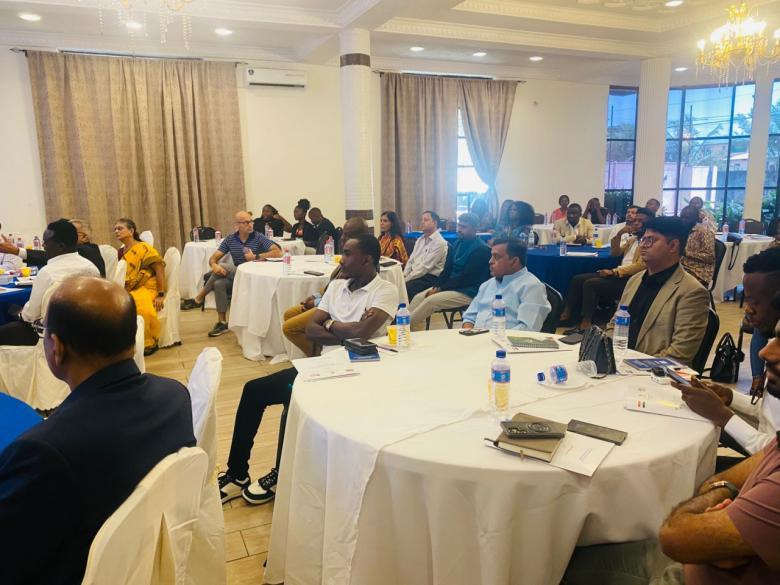
Monrovia — The Embassy of India in Liberia on Thursday, October 23, 2025 hosted a landmark one-day seminar on “India-Liberia: Indian Diaspora’s Role in Trade, Investment, and Development” at the Bella Casa Hotel Conference Hall in Monrovia.
The event, which featured two sessions “India-Liberia Bond of Culture, Peace, and Development” and “Indian Diaspora as a Driver of Trade and Investment” brought together senior government officials, diplomats, business leaders, academics, and members of the Indian and Liberian communities.
The seminar underscored the shared vision of India and Liberia to strengthen bilateral cooperation through trade, investment, education, and cultural exchange, while celebrating the significant contributions of the Indian diaspora to Liberia’s growth and development.
Expanding your business into Liberia has never been easier with GroConsult’s Employer of Record (EOR) solutions. We help international companies hire and manage employees in Liberia without the need to establish a local entity, ensuring full compliance with local labor, tax, and employment regulations.
Delivering the opening address, Manoj Bihari Verma, Ambassador of India to Liberia, welcomed participants and described the gathering as “a celebration of shared history, mutual respect, and commitment to deepening India-Liberia relations.”
He highlighted the Indian diaspora’s role as a “living bridge” connecting India to the world, with over 32 million people globally and a strong, vibrant presence in Liberia.
Ambassador Verma praised the Indian community for its five-decade-long contribution to Liberia’s economy from trade and education to healthcare and reconstruction noting that “they didn’t just do business in Liberia; they became part of Liberia.”
He reaffirmed India’s support through capacity building, professional training, scholarships, and development assistance, while announcing plans to publish a book documenting the Indian community’s contributions to Liberia’s progress.
He further noted that the seminar marked “the beginning of a sustained engagement” between the two nations, emphasizing that India’s own development journey as the world’s fourth-largest economy provides valuable models for partnership in digital inclusion, agriculture, renewable energy, and small business innovation.
Representing the Government of Liberia (GoL), Johnny S. Tarkpah, Acting Minister of Information, Cultural Affairs and Tourism, delivered the inaugural address on behalf of Minister Jerolinmek Matthew Piah.
He commended the Embassy of India for organizing the seminar and reaffirmed Liberia’s commitment to enhancing bilateral relations.
The seminar underscored the shared vision of India and Liberia to strengthen bilateral cooperation through trade, investment, education, and cultural exchange, while celebrating the significant contributions of the Indian diaspora to Liberia’s growth and development.
Delivering the opening address, Manoj Bihari Verma, Ambassador of India to Liberia, welcomed participants and described the gathering as “a celebration of shared history, mutual respect, and commitment to deepening India-Liberia relations.”
Our EOR services cover every stage of workforce management — from compliant hiring, contract drafting, and payroll administration to tax remittance, benefits management, and employee offboarding. With a deep understanding of Liberia’s employment landscape, GroConsult guarantees efficiency, transparency, and risk-free operations.
He highlighted the Indian diaspora’s role as a “living bridge” connecting India to the world, with over 32 million people globally and a strong, vibrant presence in Liberia.
Ambassador Verma praised the Indian community for its five-decade-long contribution to Liberia’s economy from trade and education to healthcare and reconstruction noting that “they didn’t just do business in Liberia; they became part of Liberia.”
He reaffirmed India’s support through capacity building, professional training, scholarships, and development assistance, while announcing plans to publish a book documenting the Indian community’s contributions to Liberia’s progress.
He further noted that the seminar marked “the beginning of a sustained engagement” between the two nations, emphasizing that India’s own development journey as the world’s fourth-largest economy provides valuable models for partnership in digital inclusion, agriculture, renewable energy, and small business innovation.
Representing the GoL, Johnny S. Tarkpah, Acting Minister of Information, delivered the inaugural address on behalf of Minister Jerolinmek Matthew Piah.
He commended the Embassy of India for organizing the seminar and reaffirmed Liberia’s commitment to enhancing bilateral relations.

Minister Tarkpah emphasized that the event aligns with President Joseph Nyuma Boakai Sr.’s REST Agenda for Inclusive Development, which focuses on economic empowerment through roads, education, sanitation, tourism, and agriculture.
He applauded India’s consistent partnership since the 1960s and acknowledged the strong presence of the Indian community estimated between 25,000 and 35,000 whose investments continue to drive Liberia’s economic growth.
Highlighting trade growth, the Acting Minister revealed that India-Liberia bilateral trade increased from USD 243 million in 2023-2024 to USD 397 million in 2024-2025, signaling deepening economic cooperation.
He also noted that 4,000 Liberian students are currently studying in India across various levels, and praised India’s duty-free tariffs on Liberian exports such as timber, vegetable oil and rubber.
Minister Tarkpah proposed transforming the seminar into a quarterly Liberia-India Trade, Investment, Development, and Education Forum, to advance dialogue and opportunities for both nations.
Whether you’re onboarding local professionals or expatriate talent, we ensure a smooth, compliant, and cost-effective process so you can focus on achieving your business objectives.
“Now is the time for action,” he urged. “Now is the time for Liberia and India to move hand in hand.”
In a separate address, Amin Modad, former Minister of Commerce and Industry, delivered an inspiring message, calling for a “new era of strategic economic partnership” between India and Liberia.
He commended the Indian community for their enduring contributions to Liberia’s economic resilience and urged the diaspora to help forge stronger business linkages.
Mr. Modad identified key areas for collaboration, including agriculture and agro-processing, mining, ICT and digital innovation, healthcare, education, energy, trade, and infrastructure development, noting that Liberia’s resources and India’s technological expertise make for a natural and mutually beneficial partnership.
Addressing global economic trends, he noted that the decline in traditional aid and shifting geopolitical alliances necessitate a new development model built on trade, investment, and private-sector partnerships.
He encouraged the formation of Indian-Liberian business councils, trade missions, and investment platforms to attract capital and promote market access.
In closing, Mr. Modad called for deeper cooperation and shared vision, emphasizing that “long-term development will not come from government alone it must be driven by partnerships and visionary entrepreneurs.”
Read the original article on FrontPageAfrica.
Share This:
- GroConsult
- No Comments


Gold is having a moment — and so is Ghana. Global prices for gold have soared past US$4,000 per ounce this year, giving Ghana, Africa’s top gold producer, its biggest export opportunity in years. The country’s gold sector has frequently made headlines in 2025, thanks to key policy reforms and record-breaking export revenues. These developments have strengthened the industry, making it a vital force behind Ghana’s growing economic resilience.
Ghana is experiencing a record-breaking year in gold export revenues. Between January and mid-October 2025, the country earned over US$8 billion from small-scale mining gold exports alone — nearly double the US$4.61 billion earned in 2024.
This surge in revenue is driven by the export of more than 81,700 kilograms of gold, marking a significant increase in both volume and value compared with previous years.
Total gold production is projected to exceed five million ounces by the end of 2025 — a rise of more than 6% year-on-year.
Several key factors are driving this remarkable performance:
- The creation of the Ghana Gold Board (GoldBod), which centralises and regulates artisanal gold trading.
- Sustained high global gold prices, which have boosted Ghana’s export earnings, strengthened foreign reserves, and helped stabilise the cedi.
- The introduction of policy reforms has brought tighter government oversight that has improved gold traceability and reduced smuggling across the supply chain.
Combined, these measures have increased transparency, boosted investor confidence, and ensured that more of the gold’s value is retained within Ghana’s economy.
The Price Surge in Gold and What It Means
The recent rise in global gold prices has been a major boost for Ghana. Higher prices mean the government is earning more from exports, while investors are showing renewed confidence in the mining sector.
Analysts expect the revenue surge to help ease Ghana’s debt pressures and strengthen its foreign exchange reserves. As of October 2025, Ghana has earned over US$8 billion from small-scale gold exports alone — almost double last year’s total. This reflects not just higher prices but also improved regulation and oversight in the sector.
While Ghana continues to export much of its gold in raw form, these strong revenues provide a solid foundation for future economic growth and stability.
The Galamsey Problem That Won’t Go Away
Despite these gains, illegal gold mining — widely known as galamsey — remains a major challenge. It continues to scar the land, pollute rivers, and drain potential revenue. Reports this year show that many communities in mining regions remain caught between survival and destruction, with little progress on enforcement.
It’s a paradox: at a time when gold is more valuable than ever, Ghana is still losing significant value through illegal and unregulated operations.
The government has shown renewed commitment to tackling the issue in 2025. The Illegal Mining Enforcement Task Force was reactivated this year, leading to the shutdown of over 150 illegal mining sites and the arrest of more than 300 offenders.
Hopefully, these measures — and others to follow — will move beyond short-term fixes and lead to lasting progress towards a safer, more transparent mining sector.
So What’s Next for Ghana?
Ghana’s gold boom is something to celebrate, but what really matters is what comes next. The real test will be how well the country manages this momentum. Can Ghana keep the industry transparent, use the revenue wisely, and invest in ways that create lasting opportunities? These are the questions that will shape the future.
Building more value at home — through refining and manufacturing — could transform gold from just an export commodity into a true engine for growth. And as the fight against illegal mining continues, the hope is that these efforts will not only address today’s problems but also help build a fairer, safer mining future for everyone.
This article was originally published on: myjoyonline
Share This:
- GroConsult
- No Comments


Planning a trip to Ghana? Whether for business, tourism, or visiting family, understanding the Ghana Visa on Arrival (VoA) process is essential for a hassle-free journey in 2025. This comprehensive guide covers everything you need to know the eligibility, documentation, new procedural changes, and tips to ensure smooth entry into Ghana. For individuals or businesses seeking trusted support with visa applications, GroConsult stands ready as the expert partner to navigate the process and help you unlock Ghana’s vibrant opportunities.
What is the Ghana Visa on Arrival?
The Ghana Visa on Arrival is a special entry permit allowing eligible foreign nationals to enter Ghana without obtaining a visa beforehand from an embassy or consulate. It primarily benefits travelers from countries lacking Ghanaian diplomatic missions or those with urgent, short-notice travel plans such as attending conferences, business meetings, or emergency assignments.
This visa typically allows a stay of up to 30 days in Ghana. However, it’s important to note that the policy has evolved. Previously, travelers could apply for a VoA upon landing, but as of 2025, pre-approval is mandatory before boarding your flight. Without confirmed visa approval before departure, airlines may deny boarding, or Ghana Immigration may refuse entry on arrival.
Who is Eligible for a Ghana Visa on Arrival?
You may qualify for Ghana VoA if you meet specific criteria:
- You are from a country where Ghana lacks an embassy or consulate.
- You have urgent travel plans and insufficient time to complete embassy visa processing.
- You are traveling for business, conferences, work emergencies, or official visits backed by recognized organizations or individuals in Ghana.
- You have a host in Ghana who can submit and facilitate your visa application with immigration authorities.
It’s crucial to understand that approval is not guaranteed. Ghana Immigration retains discretion to deny VoA applications if requirements aren’t met or if the traveler appears ineligible.
Key Documentation for Ghana Visa on Arrival Application
To ensure your Ghana Visa on Arrival process is successful, you will need to prepare the following:
- Valid Passport: Must be valid for at least six months from your travel date, with at least two blank visa pages.
- Proof of Accommodation: Hotel booking confirmation or a formal invitation letter from your Ghanaian host detailing your stay.
- Return or Onward Ticket: Demonstrates your intent to leave Ghana within the visa period.
- Evidence of Sufficient Funds: Proof that you can financially support your stay.
- Purpose of Visit: A letter explaining the reason for your visit, whether tourism, business, or attending an event.
- Formal Visa Request: Your Ghanaian host or organization must submit the visa application to Ghana Immigration on your behalf.
Business travelers require invitation letters printed on official company letterhead with full contact details and visit specifics. Tourists need valid accommodation details linked to their name and travel dates.
How and Where is the Visa Processed?
Visa on Arrival applications are processed rigidly by the Ghana Immigration Service (GIS) Headquarters or critically through Kotoka International Airport in Accra. Typically, the sponsoring company or host organization submits your application, with the GIS sending an official approval notice once processed.
This approval must be printed and presented:
- During airline check-in when departing for Ghana
- Upon arrival at Ghana’s immigration control
Notice of approval acts as your entry permit and must be carried carefully during travel.
Ghana Visa on Arrival Fees and Validity
- The standard Ghana Visa on Arrival permits entry for up to 30 days.
- Visa fees fluctuate based on currency exchange rates and inflation, so verifying exact charges before applying is advised.
- The Visa on Arrival itself cannot be extended once issued. If you intend to stay longer, you must apply in-country for a visa extension or a change of status.
- For complete fees, get a quote here
Important New Procedural Change: Pre-Approval is Mandatory
One of the most important recent updates in 2025 is the requirement for pre-approval before boarding your flight to Ghana. This new measure was implemented to enhance immigration control and improve the overall visa issuance process.
What this means for travelers:
- You can no longer “apply on arrival” directly at the airport.
- Your Visa on Arrival must be approved and documented before you travel.
- Airlines will refuse boarding passengers without verified pre-approval.
- Ghana immigration officers will deny entry to travelers lacking this approval.
To avoid complications, ensure:
- Your host or representative in Ghana submits your visa application well before departure.
- You receive the official visa approval letter before ticketing and airport check-in.
- You carry physical and electronic copies of your approval documents.
Who Can Help with Ghana Visa on Arrival Applications?
Navigating Ghana’s visa approvals can be complicated without local knowledge and expertise. GroConsult offers dedicated visa application assistance and support services, helping businesses, tourists, and diaspora professionals secure Ghana Visas on Arrival reliably and promptly.
GroConsult’s visa services include:
- Documentation review to meet all Ghana Immigration requirements
- Liaising with sponsors and immigration authorities for timely pre-approval
- Step-by-step guidance tailored for business travelers, tourists, and last-minute applicants
- Real-time updates throughout the visa application and boarding process
By partnering with GroConsult, you reduce risks of denied boarding, entry refusal, or delays linked to incomplete or incorrect applications.

Final Tips for a Smooth Ghana Visa on Arrival Journey
- Start Early: Submit your visa on arrival application at least three business days before your intended travel date.
- Complete Documentation: Double-check all documents, including passport validity, invitation letters, and proof of funds.
- Print Approvals: Carry hard copies of your visa approval letter, travel bookings, and accommodation confirmations.
- Stay Informed: Monitor Ghana Immigration Service updates as policies, fees, and procedures can change.
- Consider Vaccinations: Ghana requires a Yellow Fever vaccination certificate as part of entry protocols.
Why Ghana Visa on Arrival Matters in 2026
Ghana remains one of West Africa’s fastest-growing economies and most welcoming countries for foreign investment and tourism. The Visa on Arrival scheme reflects Ghana’s openness yet commitment to secure, streamlined border processes for the globe’s increasing travelers.
For entrepreneurs, professionals, or visitors drawn to Ghana’s rich history, culture, and business prospects, understanding and following the Visa on Arrival process is key to unlocking seamless entry.
GroConsult is your trusted ally for that journey, helping you breeze through visa formalities so you can focus on the vibrant opportunities that living or doing business in Ghana offers.
Connect With GroConsult for Visa and Workforce Solutions
Considering an upcoming trip or expansion in Ghana? Connect with GroConsult for expert assistance on visa applications and comprehensive Employer of Record (EOR) services, making your integration into the Ghanaian market faster, easier, and fully compliant.
Planning to travel soon? Don’t delay—start your Ghana Visa on Arrival process now with GroConsult!
Share This:
- GroConsult
- No Comments


Ghana is fast emerging as one of West Africa’s most attractive destinations for expatriates seeking a unique blend of rich cultural heritage, warm hospitality, and dynamic economic prospects. With a history steeped in tradition and a rapidly evolving modern economy fueled by foreign investment and natural resources, living in Ghana offers an enriching experience shaped by diversity, growth, and opportunity. Whether you are a foreign professional hunting for new job prospects or a businessperson eyeing expanding markets, Ghana’s appealing lifestyle and robust economic potential make it a top choice for expats.
This comprehensive exploration delves into what makes living in Ghana special—from its geographical and cultural diversity to its economic landscape and opportunities for expatriates. It also highlights some important considerations and best practices for anyone contemplating a move to this vibrant country.
Why Choose Living in Ghana?

Affectionately dubbed “Africa for beginners,” Ghana combines ease of access, political stability, and a welcoming social environment, making it exceptionally friendly to people relocating from abroad. The country’s accessibility is supported by well-connected transport links, and locals are known for their warmth and hospitality, which immediately places expatriates at ease.
For many, living in Ghana means experiencing a country where cultural diversity thrives harmoniously amid rapidly advancing urban centers.
The best time to enjoy living in Ghana socially and environmentally is between November and March, its dry season, when the weather is pleasant for outdoor activities and exploration.
During this time, vibrant festivals, cultural events, and tourism peak, providing expats and visitors a unique window into Ghana’s rich traditions and communal spirit.
A Tapestry of Culture and Diversity

Living in Ghana immerses you in a tapestry of diversity shaped by geography, religion, and language. The country’s landscape includes everything from the expansive Volta Lake—the world’s largest artificial lake—to lush national parks and bustling coastal cities where historical forts stand as reminders of Ghana’s storied past.
Ghana’s religious landscape is as diverse as its terrain. Christians represent about three-quarters of the population, with Islam as the second most practiced religion. Additionally, traditional African beliefs continue to significantly influence local cultural practices.
This religious plurality fosters an atmosphere of tolerance and mutual respect. The official language of Ghana is English, facilitating business, education, and governance, which makes it easier for international professionals to integrate quickly. However, a remarkable linguistic diversity exists, with over 250 languages and dialects spoken across the country’s 238,533 square kilometers.
Most of the population is concentrated in the southern half near the Atlantic coast, creating economic and cultural hubs rich with opportunity.
Economic Landscape: Challenges and Opportunities

Ghana has long been celebrated as a model for economic growth in Africa. While recent years have brought some economic challenges, including high inflation and currency depreciation caused by loose fiscal policies and rising public deficits, the country’s foundational strengths remain intact.
To stabilize its economy, Ghana has engaged with the International Monetary Fund (IMF) to secure a multi-million dollar extended credit facility. Alongside this, the government has prioritized macroeconomic reforms aimed at stimulating sustainable growth, and visible development efforts continue despite the economic headwinds.
Ghana’s rich natural resource base significantly sustains its economy. Agriculture accounts for around 20% of GDP and employs about half the workforce. The country is one of the world’s largest producers of cocoa, with gold mining and oil production contributing substantially to exports and government revenue. Notably, oil production offshore began in 2010, dramatically boosting economic growth. Though fluctuating oil prices since 2015 have reduced revenues, prospects of new discoveries and improved fiscal management raise optimism for the future.
Ghana’s economy is predominantly market-driven and comparatively open for trade and investment by regional standards. The relative lack of policy hurdles presents a fertile ground for foreign investors and expatriate professionals looking to capitalize on emerging business opportunities.
The Expat Experience: What You Need to Know

Living in Ghana as an expatriate means stepping into a culturally rich and economically evolving environment. The combination of a stable democratic system and media freedom nurtures a politically aware society, which appreciates public discourse and civic engagement. Expats often find themselves welcomed in communities where traditional values coexist with modern lifestyles.
Key industries attracting foreign professionals include technology, mining, oil and gas, finance, and agribusiness. With the country’s demand for diverse skills rising, expats can find competitive job opportunities or establish new ventures with the right networks and local insights.
However, living in Ghana also presents unique challenges—from navigating local bureaucracies to understanding cultural nuances and adjusting to infrastructural realities. Many expatriates turn to specialized service providers like GroConsult for support in workforce management and expansion. GroConsult’s Employer of Record (EOR) services, in particular, offer a seamless way for international businesses to enter the Ghanaian market and hire local employees compliantly without the immediate need to set up a full legal entity.
Practical Insights for Success Living in Ghana

- Embrace Cultural Sensitivity: Learning local customs, respecting religious diversity, and engaging with the community enhance both personal and professional life.
- Tap Into Local Networks: Connecting with business chambers, expat groups, and industry associations opens doors to collaborations and opportunities.
- Understand Market Dynamics: Keep abreast of economic reforms, trade policies, and sector-specific developments to navigate risks and capitalize on growth areas.
- Leverage Professional Services: Utilize trusted local partners for compliance, payroll management, and talent acquisition to ease the transition and drive business success.
- Stay Adaptable: Rapid developments require openness to change and a proactive approach to problem-solving.
Why Living in Ghana Offers Both Opportunity and Enrichment
Living in Ghana offers expatriates a singular opportunity to experience a nation proud of its heritage yet eager to embrace the future. The country’s political stability, evolving economy, cultural richness, and welcoming populace create an ideal environment for individuals and businesses seeking growth alongside personal enrichment.
For international companies exploring expansion or personnel deployment in Ghana, GroConsult’s tailored EOR services offer a reliable bridge to establish compliant, flexible operations with reduced overhead and enhanced local insight.
Whether you are drawn by opportunity or the allure of Ghana’s unique spirit, living in Ghana promises an environment where tradition and modernity coexist and where your professional and personal horizons can grow in vibrant harmony.
Living in Ghana is not just about relocation—it’s embarking on a rewarding journey that offers diverse experiences, meaningful connections, and promising business prospects in one of Africa’s most dynamic countries.
Share This:
- GroConsult
- No Comments


Ghana is a beautiful and thriving country in West Africa, and many foreigners are drawn to its unique culture, hospitable people, and business opportunities. If you are a foreigner looking to work or live in Ghana, it is important to obtain a work and residence permit. This guide will provide you with a complete overview of the process of applying for a work and residence permit in Ghana, the types of permits available and who qualifies to apply, the required documents, and the post-application process.
Importance of Obtaining a Work and Residence Permit in Ghana
A work and residence permit in Ghana is an essential legal document that allows foreigners to legally live and work in Ghana.
- Without a permit, you risk facing legal consequences, including deportation, fines, or even imprisonment.
- Legal Compliance
- Employment Eligibility
- Access to Benefits
- Security and Protection
- Opening Bank Account, acquiring property and investments
Challenges of Obtaining a Work and Residence Permit in Ghana
Obtaining a work and residence permit in Ghana can be a challenging process for foreigners due to various factors. One of the major challenges is the complex and ever-changing regulations and requirements for permit applications. For example, between 2019 to 2022, it was compulsory for individuals to undergo a Covid test, and all applicants had to visit the Ghana Immigration Clinic to complete the test. And then, in 2023, all applicants are now obligated to undergo medical screening at the GIS Headquarters as a mandatory prerequisite for submitting their work permit applications. Again, the fee for medical screening has been increased.
Additionally, the processes involved in the work permit application can be slow and confusing, with long waiting times and unclear communication. Language barriers and cultural differences can also be a challenge for foreigners who are not familiar with the Ghanaian way of doing things. The requirement to provide detailed documentation, including personal, academic, and professional credentials, police reports, resumes, and offer letters which can be difficult to obtain for some individuals.
At GroConsult Management Consortium, we simplify this process through our deep local expertise and strong relationships with the Ghana Immigration Service. From medical screenings and document verification to permit approvals, we handle every step efficiently—ensuring speed, compliance, and peace of mind. With GroConsult as your trusted local partner, your transition into Ghana becomes smooth, stress-free, and fully compliant.

Types of Work and Residence Permits in Ghana
There are various types of work and residence permits in Ghana, depending on your employment status and duration of stay. The main categories of permits are:
- Work Permit: This permit is for foreigners who are employed in Ghana by a company or organization locally registered or incorporated under the laws of Ghana.
- Quota Work Permit: The approval for this permit is granted by the Ghana Investment Promotion Centre (GIPC)
- Immigrant Quota Work Permit by Ministry of Interior
- Dependent Residence Permit: This permit is for foreigners who intend to legally reside in Ghana, especially for dependents or students.
- Indefinite Residence Permit: The Indefinite Residence Permit is for foreign nationals who wish to reside in Ghana permanently.
Eligibility Criteria for Work and Residence Permit in Ghana
To be eligible for a work or residence permit in Ghana, you must meet specific requirements, depending on the type of permit. For example, to be eligible for a work permit, you must have a job offer from a Ghanaian company and have the necessary qualifications and experience.
Benefits and Limitations of the various types of Work Permits
Each type of work and residence permit has its benefits and limitations, depending on your employment status and duration of stay. For example, a work permit is suitable for short-term employment, while an immigrant quota work permit is ideal for entrepreneurs and investors who want to start a business in Ghana.
An employee from a foreign country who possesses a Residence Permit can make an application for a Dependent Residence Permit for their dependents, such as a spouse, children under the age of 18, and parents who are above 60 years of age.
To know the comparison of the types of work permits options available to all foreigners, the benefits, and limitations of each type of work permit, duration and the cost involved, BOOK A CALL
Step by Step guide and procedures when applying for work and residence permit
The process of obtaining a work and residence permit in Ghana can seem complex, especially for expatriates unfamiliar with local regulations. That’s where GroConsult Management Consortium steps in — serving as your trusted local partner to ensure a seamless, compliant, and stress-free experience.
Step 1: Identifying the Right Permit Type & Gathering Documents
Before starting the application process, GroConsult assists expatriates in identifying the correct type of permit required and gathering all necessary documentation.
To qualify for a work and residence permit, the applicant must either:
- Have a job offer from a Ghana-registered company, or
- Be ready to establish a business in Ghana.
Once this requirement is met, GroConsult prepares and organizes all relevant documents needed to initiate the application.
Step 2: Completing the Application Forms
GroConsult guides applicants through completing the work and residence permit forms accurately. These forms require detailed information under three categories — Company, Employee, and Employment Contract — and must be completed carefully to ensure approval by the Ghana Immigration Service (GIS).
Before submission, GroConsult assists the applicant in obtaining:
- A Non-Citizen ID Card
- Completing the GIS Medical Screening.
Both processes are handled efficiently with GroConsult’s local support and coordination.
Step 3: Document Verification and Submission
After completing the medical screening and obtaining the Non-Citizen ID Card, GroConsult helps compile all required documents, including:
- Academic and professional certificates
- Police report from the applicant’s home country
- Medical receipt from GIS
- Copy of the Non-Citizen ID card
- Curriculum Vitae and employment letter
As part of the process, GroConsult ensures the application forms are properly signed by an authorized company representative and that proof of authority is attached.
Step 4: Payment of Statutory Fees
GroConsult assists in paying the required statutory fees at the designated GIS bank, based on nationality:
A retention slip is issued as proof of submission and payment — GroConsult ensures all receipts and submissions are properly documented for tracking.
Step 5: Permit Approval and Issuance
Once the application is submitted, GroConsult closely monitors the vetting and approval process with the Ghana Immigration Service.
Upon approval, the Work and Residence Permit is issued in the form of an official letter and later endorsed in the applicant’s passport.
Post-Application Process – What happens after submitting the work permit application
After submitting your work and residence permit application in Ghana, the application will be reviewed by the Ghana Immigration Service (GIS) to ensure that all required documents are provided and that the applicant meets the eligibility criteria for the permit.
Once a work and residence permit application is submitted to the Ghana Immigration Service (GIS), it undergoes a review and assessment to determine eligibility and compliance. If the application meets all requirements, it is typically processed within 2 to 3 weeks.
However, in practice, GroConsult leverages its strong working relationship with immigration authorities to help clients monitor and follow up on their applications using the retention slip — ensuring that no step is overlooked and the process remains on track.
When the Application Is Approved
If the application is approved, the Work and Residence Permit is issued and endorsed in the applicant’s passport. The permit is valid for the specific period requested, typically one year, and renewable thereafter.
GroConsult assists clients through this entire process, including permit collection and delivery, to ensure a seamless and timely experience.
When the Application Is Denied
In the event of a denial, GroConsult provides expert guidance in reviewing the reasons for rejection and advising on the best course of action — including assisting clients in preparing a strong appeal or reapplication. Our team ensures that all compliance gaps or documentation issues are fully addressed to improve approval outcomes in subsequent applications.
Collecting your passport from GIS when your work and residence permit is ready
Once a Work and Residence Permit application has been approved by the Ghana Immigration Service (GIS), the applicant can either collect the permit in person or authorize GroConsult (or another representative) to collect it on their behalf using a Power of Attorney.
How we Simplifies the Process
At GroConsult Management Consortium, we assist clients throughout the permit collection stage — from submitting Power of Attorney documentation to collecting and securely delivering the issued permits to the applicant or employer.
Our team ensures a hassle-free process, saving clients from unnecessary delays and repeated visits to the Ghana Immigration Service.
By engaging GroConsult, companies and expatriates can rest assured that every step — from application submission to final collection — is handled with professionalism, accuracy, and compliance.d to keep the permit with them at all times and present it to immigration officials upon request. The permit is also renewable, and the renewal process must be started before the expiration date of the current permit.
Overall, obtaining a work and residence permit in Ghana is essential for foreign nationals who wish to live and work legally. It provides opportunities for individuals to gain valuable experience, and contribute to the Ghanaian economy. Need a work and residence permit without all the hassle and professionally handled?
Share This:
- GroConsult
- No Comments


The World Bank now expects Ghana’s economy to end 2025 with a growth rate of 4.3%, up from its earlier projection of 3.9%.

This was contained in the October 2025 edition of the Africa’s Pulse Report released by the Bank in Washington, D.C., USA.
The revised projection is slightly higher than the 4.4% growth target set by the Government of Ghana in the 2025 Budget.
Ghana’s economy expanded by 6.3% in the second quarter of 2025, driven mainly by the services sector, which grew by 9.9% and contributed the largest share to GDP.
According to the World Bank, Ghana’s growth outlook remains positive, with projections of 4.6% in 2026 and 4.8% in 2027.
Sub-Saharan Africa Outlook
The report also noted that Sub-Saharan Africa’s economy remains resilient, with growth projected to reach 3.8% in 2025, up from 3.5% in 2024.
This acceleration, the Bank explained, reflects easing inflationary pressures and a modest recovery in investment despite ongoing global uncertainties.
World Bank Data on Gdp Growth Rate in Ghana from 1960 2016
It further observed that the number of African countries experiencing double-digit inflation has dropped sharply—from 23 in October 2022 to 10 in July 2025—signalling progress in price stabilisation.
However, it warned that downside risks persist, including the indirect effects of global trade policy uncertainty, declining investor appetite, and a shrinking pool of external finance and development assistance.
World Bank on Ghana’s Inflation
The World Bank projects Ghana’s inflation to end 2025 at 15.4%.
This forecast contrasts with the latest official figure of 9.4% for September 2025, down sharply from 21.5% in September 2024.
Analysts say the World Bank’s projection appears conservative, as Ghana has already achieved single-digit inflation in recent months.
Nonetheless, the report indicates optimism for further disinflation, projecting that Ghana’s inflation will drop to 9.4% in 2026.
Meanwhile, the Bank of Ghana, in its latest Monetary Policy Report, maintained that inflation is expected to remain in the single-digit range by the end of 2025.

Nonetheless, the report indicates optimism for further disinflation, projecting that Ghana’s inflation will drop to 9.4% in 2026.
Meanwhile, the Bank of Ghana, in its latest Monetary Policy Report, maintained that inflation is expected to remain in the single-digit range by the end of 2025.
Cedi’s Performance
The Ghana cedi has appreciated by over 20% year-to-date in the first eight months of 2025, after weakening by 19% in 2024.
The World Bank attributes the cedi’s strong performance to tight fiscal and monetary policies, rising export revenues—especially from cocoa and gold—and improved market confidence following the completion of Ghana’s debt restructuring process.
However, the Bank expressed concern over a 14% depreciation of the cedi between June and early September, attributed to the Bank of Ghana’s limited foreign exchange supply amid rising import demand ahead of the festive season.
The report also confirmed that Ghana has exited the “debt distress” classification, having made significant progress in restructuring obligations to bilateral and commercial creditors.
Still, the Bank warned that refinancing pressures remain a major risk, as Ghana faces a US$500 million Eurobond redemption in 2025 (0.7% of GDP), which rises to 1.2% of GDP in 2026.
These pressures, it added, are not unique to Ghana, with several Sub-Saharan African economies facing peak debt maturities in 2026, potentially heightening regional risk premiums.

Improving Business Environment
The report observed that business conditions in Ghana have improved, with the Purchasing Managers’ Index (PMI) rising from 50.2 in July to 50.8 in August 2025, supported by new orders and sustained job creation.
Although poor weather slightly affected output, business optimism remained strong as new sales and orders increased amid reduced input costs and a stronger cedi.
Inflation also continued to decline, falling for the seventh consecutive month to 12.1% in July 2025, from 23.8% in December 2024.
The report further recalled that Ghana’s “Dumsor” power crisis (2012–2016) caused a 12.3% reduction in foreign direct investments (FDI) in non-energy sectors.
It explained that firms frequently exposed to power outages exhibited lower productivity due to disrupted operations, high self-generation costs, and reduced capital efficiency.
The Bank emphasised that stable power supply and competitive energy pricing are critical to sustaining industrial productivity and attracting new investments.
Share This:
- GroConsult
- No Comments


The world of work has changed dramatically. Businesses are no longer confined to hiring talent within their local communities or even their countries. Technology, remote work, and digital collaboration tools have broken down traditional barriers, allowing companies to connect with skilled professionals anywhere in the world.
This global shift is also happening right here in Ghana. Small businesses in Accra, Kumasi, or Takoradi are beginning to see what was once possible only for large corporations: the ability to access new markets, collaborate with international partners, and hire talent across borders. A small design studio in Ghana can now work with a marketing consultant in South Africa, or an IT support team in India all without leaving their home base.
Yet, with these opportunities come significant challenges. For many Ghanaian SMEs, the problem isn’t a lack of talent in fact, Ghana is home to a young, skilled, and fast-growing workforce. The real challenge lies in navigating the complex maze of payroll, taxes, and compliance.
How do you ensure salaries are processed accurately when tax laws are constantly changing? How do you handle SSNIT deductions without errors? How do you pay employees or contractors abroad without falling foul of international regulations? These questions often create stress for small business owners who are already juggling multiple responsibilities.
That’s where payroll outsourcing steps in: to simplify the process, reduce risks, and give Ghanaian businesses the confidence to grow both locally and globally.
The Payroll Challenge for Ghanaian Small Businesses
Managing payroll is one of the most essential parts of running a business. It ensures employees are compensated fairly and on time, builds trust within the team, and keeps the business compliant with regulatory authorities. But for small businesses in Ghana, payroll management can quickly shift from a routine back-office task into one of the biggest operational headaches.
One of the biggest challenges is the constant changes in tax laws and regulations. Ghana’s tax system, while structured, can be difficult to keep up with, especially for entrepreneurs who are not tax professionals. New updates from the Ghana Revenue Authority (GRA) can easily be missed, leaving businesses exposed to fines and penalties.
Another issue is the complexity of calculating social security contributions (SSNIT). Many small businesses struggle to get the numbers right, balancing employee contributions with employer obligations, while also ensuring that the payments are submitted accurately and on time. Any mistake here not only affects compliance but can also impact employee benefits in the long run.
Small businesses also face constant pressure to stay compliant with GRA requirements. From PAYE (Pay As You Earn) deductions to filing returns, even small missteps can raise red flags and attract penalties. For larger firms with dedicated HR or finance teams, this is manageable. But for a small business owner in Ghana, who may be acting as manager, marketer, salesperson, and accountant all at once compliance becomes an overwhelming burden.
And then there’s the simple reality of limited time and resources. Unlike large companies, small businesses rarely have in-house payroll or tax specialists. Most rely on the owner or a small team member to “figure it out.” This not only increases the risk of mistakes but also takes time away from what matters most: serving customers, building the business, and pursuing growth opportunities.
For Ghanaian small businesses with big ambitions, payroll is not just an administrative task. It is a critical function and when mismanaged, it can lead to stress, reduced credibility, strained employee relations, and even legal issues. In other words, what should be a straightforward process of paying staff can quickly become a major source of stress that slows down growth.
Why Payroll Outsourcing is the Answer
For many Ghanaian small business owners, the weight of payroll management feels like carrying an extra business within the business. Every month, hours are lost to double-checking figures, ensuring PAYE is correct, calculating SSNIT contributions, and reconciling deductions. What should be a simple process of paying employees often turns into a stressful, time-consuming task filled with risks of mistakes and penalties.
This is exactly where payroll outsourcing becomes a game-changer. Instead of drowning in paperwork and regulations, small businesses can hand over payroll management to trusted experts who specialize in navigating Ghana’s tax and compliance landscape. By doing so, entrepreneurs free themselves to focus on what they do best; building their businesses, serving customers, and driving growth.
When Ghanaian SMEs embrace payroll outsourcing, they gain:
🔹 Accuracy & Compliance
Errors in payroll can cost businesses heavily, not just in penalties but also in lost trust with employees. With outsourcing, payroll is aligned with GRA and SSNIT regulations, ensuring that every calculation is correct and every deadline is met. This means no more sleepless nights worrying about compliance.
🔹 Time Savings
Every hour spent calculating payroll is an hour taken away from growing the business. By outsourcing, small business owners reclaim their time and can focus on core activities whether that’s closing more sales, improving products, or expanding to new markets.
🔹 Cost Efficiency
Hiring a full-time payroll or finance officer can be expensive for small businesses. Outsourcing transforms that fixed overhead cost into a flexible, manageable service fee, making it more affordable. Businesses only pay for the services they need, and avoid the long-term financial burden of additional staff.
🔹 Employee Confidence
Nothing builds trust between a business and its employees like being paid on time, every time. Payroll outsourcing ensures that salaries are processed promptly and accurately, giving staff confidence in their employer. In turn, this boosts morale, retention, and loyalty, all critical for small businesses aiming to grow sustainably.
In short, payroll outsourcing removes the burden of complexity and replaces it with peace of mind. For Ghanaian SMEs, it’s not just about paying salaries, it’s about protecting credibility, saving costs, empowering employees, and unlocking the freedom to focus on growth.
Connecting Local to Global
In today’s economy, location is no longer a limitation. Even small businesses in Ghana now have the ability to think and operate on a global scale. With the rise of remote work and digital collaboration tools, a shop owner in Accra or a startup founder in Kumasi can seamlessly connect with skilled professionals across Africa and beyond.
Imagine a Ghanaian clothing brand working with a digital designer in Nigeria to build an online store, or a fintech startup in Takoradi hiring a software developer in Kenya to scale their mobile app. A local consultancy in Accra could even bring on board a marketing strategist in South Africa or a financial advisor in the UK. These opportunities are real and they’re transforming how Ghanaian SMEs grow and compete.
But while the talent is accessible, the challenge lies in managing cross-border payments, compliance, and legal obligations. Paying someone in another country is not as simple as sending money; it involves navigating tax laws, ensuring regulatory compliance, and building professional trust with international contractors or employees.
This is where payroll outsourcing becomes indispensable. By partnering with experts, small businesses in Ghana can ensure that international payments are smooth, compliant, and professional whether it’s handling invoices, managing deductions, or staying in line with both local and foreign requirements.
Even more transformative is the role of Employer of Record (EOR) solutions. With EOR, Ghanaian businesses can legally hire talent in other countries without the heavy cost and complexity of setting up a foreign entity. For instance, a boutique consulting firm in Accra can expand its team with professionals from across Africa, scaling quickly and confidently while leaving the compliance and payroll details to the EOR partner.
In essence, payroll outsourcing and EOR bridge the gap between local ambition and global opportunity. They empower Ghanaian SMEs to focus on innovation and growth, while professionals no matter where they are, they receive the security, recognition, and professionalism they deserve.
The Bigger Picture
For small businesses in Ghana, payroll outsourcing goes far beyond just simplifying salaries. It touches the core of how a business operates, builds trust, and grows sustainably.
When handled effectively, outsourcing payroll helps small businesses:
- Build credibility with employees and partners: Timely, accurate payroll shows your staff and collaborators that you are reliable and professional. Employees feel valued, and partners see you as a trustworthy business.
- Strengthen compliance and regulatory trust: Staying on top of Ghana Revenue Authority (GRA) and SSNIT requirements can be complex, but outsourcing ensures your business meets these obligations consistently, reducing risks of penalties or legal issues.
- Unlock freedom to scale locally and globally: With payroll and compliance handled by experts, business owners can dedicate more time to growth, explore new markets, and even hire talent across borders without worry.
The future of business in Ghana is borderless, and small businesses now have the tools and opportunities to compete globally. But all of that potential starts with getting the basics right. Payroll is not just about numbers , it’s about building trust between your business, your employees, and your partners.
By outsourcing payroll, Ghanaian SMEs can focus on what matters most: growing their business, attracting global opportunities, and building strong, motivated teams, all without being bogged down by compliance headaches or administrative burdens.
At the end of the day, payroll outsourcing is not just about paying people; it’s about creating opportunities, empowering talent, and powering growth across Ghana and beyond.

At Groconsult Management Consortium, we help international businesses hire, manage, and scale teams across Africa quickly, compliantly, and cost-effectively. Our Employer of Record (EOR) services handle payroll, compliance, HR, and local regulations, so you can focus on growth and innovation.
Contact Groconsult Management Consortium today to discover how we can support your African expansion strategy and turn opportunities into results.
Share This:
- GroConsult
- No Comments
- GroConsult
- No Comments


Africa is rapidly emerging as one of the world’s most promising growth frontiers. With a young, tech-driven population, expanding digital infrastructure, and fast-growing economies, the continent is positioning itself as the next hub for innovation, entrepreneurship, and workforce development. By 2035, Africa will have the largest working-age population in the world, making it an attractive destination for companies seeking skilled, ambitious talent to drive global competitiveness.
Sectors such as fintech, e-commerce, renewable energy, and telecommunications are booming, while international tech giants are setting up regional hubs in cities like Lagos, Nairobi, Cape Town, and Cairo. For businesses ready to tap into Africa’s talent pool and consumer markets, the opportunities are immense.
However, entering Africa is not without its challenges. The continent comprises 54 countries, each with its own labour laws, tax regimes, regulatory frameworks, and cultural practices. What works in Ghana may not apply in Nigeria, and compliance requirements in South Africa may be vastly different from those in Egypt. For international businesses, managing direct hiring across such diverse environments can be complex, costly, and risky.
This is where an Employer of Record (EOR) becomes invaluable. An EOR enables businesses to hire employees in Africa quickly, compliantly, and efficiently without the need to establish a local legal entity in every country. Instead of being slowed down by bureaucracy, companies can focus on growth, while the EOR takes care of employment contracts, payroll, benefits, and regulatory compliance.
Here’s why your business should consider using Employer of Record (EOR) services when hiring in Africa:
Simplify Compliance Across Borders
One of the biggest challenges for international businesses expanding into Africa is the complexity and variation of labour laws across borders. Each country has its own employment regulations, tax structures, and compliance requirements and failing to adhere to them can result in penalties, reputational damage, or even restrictions on operating in that market.
For instance:
- In Nigeria, employers are required to contribute to both pension funds and health insurance schemes for their employees.
- In Kenya, payroll processing must include statutory deductions such as the National Hospital Insurance Fund (NHIF) and the National Social Security Fund (NSSF).
- In South Africa, strict labour protections under the Basic Conditions of Employment Act regulate working hours, overtime pay, and termination procedures.
For international businesses unfamiliar with these frameworks, managing compliance across multiple African countries can quickly become overwhelming. This is where Employer of Record (EOR) services play a crucial role.
By acting as the legal employer on your behalf, an EOR ensures that all employment contracts, payroll processes, statutory contributions, and employee benefits are fully compliant with local regulations from day one. Instead of navigating dozens of legal systems, your company can rely on a trusted partner to minimize risk and keep operations smooth allowing you to focus on scaling and executing projects.
Accelerate Market Entry
In Africa, time-to-market can make or break an expansion strategy. Establishing a legal entity in a new country often requires navigating multiple government agencies, obtaining permits, registering with tax authorities, and opening local bank accounts. This process can take several months or even longer in jurisdictions with more complex regulatory environments. During that time, opportunities may be lost, and competitors may gain the advantage.
With Employer of Record (EOR) services, international businesses can bypass these delays. An EOR already has the infrastructure, registrations, and compliance systems in place, allowing your company to hire local talent and begin operations within weeks rather than months. This accelerated entry enables you to test new markets, launch projects, and respond to client needs without waiting for the lengthy setup of a subsidiary.
This speed is especially critical for fast-moving industries such as:
- Technology, where companies need to quickly onboard developers, engineers, or support teams to maintain competitiveness.
- Energy and infrastructure, where project timelines are often tight and require immediate staffing across borders.
- Consulting and professional services, where firms must deploy skilled experts rapidly to meet client demands.
By leveraging Employer of Record (EOR) services, international businesses gain the agility to move faster, seize opportunities as they arise, and establish a foothold in Africa’s diverse markets without the usual administrative bottlenecks.

Streamline Payroll and Benefits
Managing payroll and employee benefits across multiple African countries can be one of the most complex aspects of international expansion. Each market has its own currency systems, tax rates, reporting standards, and social security contributions. Add in the challenge of cross-border payments, fluctuating exchange rates, and differing benefits expectations, and payroll administration quickly becomes a burden for companies unfamiliar with local systems.
For example:
- In Ghana, employers must handle contributions to the Social Security and National Insurance Trust (SSNIT).
- In Egypt, payroll must include mandatory income tax withholdings and social insurance contributions.
- In Kenya, in addition to salaries, employers are expected to make deductions for health (NHIF) and retirement savings (NSSF).
An error in payroll or benefits processing is not only costly but can also harm employee trust and morale. This is where Employer of Record (EOR) services deliver value.
An EOR manages payroll end-to-end: from salary disbursements in local currencies to tax filings, benefits administration, and compliance with statutory deductions. They also ensure that employee benefit packages (such as health coverage, pensions, or allowances) are competitive and compliant with local standards. By consolidating these processes under one partner, businesses gain efficiency, reduce risk, and ensure that their teams are paid accurately and on time—regardless of where they are based in Africa.
Ultimately, Employer of Record (EOR) services free international companies from the administrative complexities of payroll and benefits, allowing them to focus on performance, innovation, and growth.
Reduce Operational Costs and Risk
Expanding into Africa by establishing a subsidiary or legal entity in every country you want to hire in can be prohibitively expensive and resource-intensive. The process typically involves legal registration, licensing, office setup, banking arrangements, and the hiring of local compliance experts. For many businesses, especially those testing new markets or running project-based operations, the return on such a heavy upfront investment may not justify the cost.
Employer of Record (EOR) services offer a far more cost-effective alternative. By leveraging an EOR, your business can hire employees across multiple African countries without the need to establish a local entity. This means you avoid the high costs of incorporation, administrative overhead, and ongoing compliance management. Instead, you can scale your workforce flexibly, hiring only where and when needed while keeping fixed costs low.
In addition to lowering expenses, an EOR also helps minimize risk. Non-compliance with local labor laws, tax obligations, or social security contributions can lead to hefty fines, legal penalties, and reputational damage all of which can derail expansion plans. With deep expertise in local regulations, an EOR ensures your business remains compliant, protecting both your brand and your bottom line.
For international companies eyeing Africa’s growing markets, this combination of cost efficiency and risk mitigation makes Employer of Record (EOR) services a strategic enabler of sustainable expansion.
Access Africa’s Top Talent

Africa is home to one of the fastest-growing and most dynamic workforces in the world. From Lagos to Nairobi, Cape Town to Cairo, the continent’s talent pool is deep, diverse, and increasingly global in outlook. With a median age of just 19.7 years and millions entering the labor force each year, Africa offers international businesses access to a young, ambitious, and tech-savvy generation of professionals.
Whether your company needs software developers, data scientists, engineers, project managers, financial analysts, or marketing professionals, Africa is producing world-class talent across industries. Cities such as Lagos, Nairobi, and Accra are becoming hubs for technology and innovation, while Cairo and Cape Town are known for strong talent in engineering, research, and creative industries.
However, barriers like complex immigration processes, varying labor regulations, and administrative red tape often make it difficult for international companies to tap into this talent directly. This is where Employer of Record (EOR) services provide a critical advantage.
By serving as the legal employer, an EOR removes these administrative and legal barriers, enabling your business to hire the best people regardless of borders. The EOR manages employment contracts, compliance, and payroll, leaving your company free to focus on attracting, engaging, and retaining top performers who can drive your growth strategy.
In short, Employer of Record (EOR) services unlock access to Africa’s top talent—helping international businesses build high-performing teams without the delays and risks of going it alone.
Support for Employee Mobility
In Africa, employee mobility is a defining feature of many industries. Large-scale projects in technology, construction, energy, and infrastructure often require teams to move between countries or regions to deliver on client needs. From deploying engineers for cross-border energy projects to relocating IT professionals for regional system implementations, mobility is not just an option—it’s a business necessity.
However, cross-border mobility in Africa comes with its own challenges. Visa and work permit requirements differ significantly from one country to another, relocation logistics can be complex, and aligning HR practices with local cultural expectations is essential for employee satisfaction and compliance.
This is where Employer of Record (EOR) services add strategic value. An EOR can provide comprehensive mobility support, including:
- Visa and work permit processing, ensuring that employees are legally cleared to work across borders.
- Relocation and housing assistance, making transitions smoother for employees and their families.
- Adapting HR policies to local norms, ensuring that benefits, leave policies, and workplace expectations are culturally aligned.
For industries like construction, energy, and technology implementation, where project delivery depends on moving the right people to the right place at the right time, this support is invaluable. By partnering with an EOR, international businesses can ensure seamless mobility for their employees, avoid legal pitfalls, and keep projects on schedule.
In essence, Employer of Record (EOR) services act as a trusted mobility partner—removing barriers so your workforce can stay agile, compliant, and effective across Africa’s diverse markets.
Focus on Growth, Not Administration
At the end of the day, the greatest value of expanding with an Employer of Record (EOR) service is the ability to focus your energy on growth instead of administration. International expansion into Africa presents incredible opportunities, but it also comes with time-consuming responsibilities—compliance, payroll processing, HR administration, tax filings, and employee benefits management—that can distract leadership from core business objectives.
By partnering with an EOR, these operational complexities are handled seamlessly in the background. Your company gains the confidence that contracts are compliant, payroll is accurate, taxes are filed correctly, and employees are supported—all without diverting executive attention from strategy.
This shift allows your leadership team to concentrate on what truly drives value:
- Building strong partnerships with local stakeholders, clients, and governments.
- Expanding into new markets quickly and efficiently.
- Driving innovation and competitiveness, especially in fast-moving sectors like technology, energy, and consulting.
In essence, Employer of Record (EOR) services give international businesses the freedom to scale across Africa with less bureaucracy and fewer operational headaches. Instead of getting caught up in red tape, your business can keep its focus where it belongs—on growth, opportunity, and long-term success.
Conclusion
Africa’s business landscape is rich with opportunity—driven by a young workforce, rising digital adoption, and fast-growing economies. But successfully hiring and operating across the continent requires careful navigation of diverse legal frameworks, cultural contexts, and operational challenges. For international businesses, the difference between thriving in Africa and struggling often comes down to having the right partner on the ground.
This is where Employer of Record (EOR) services provide a transformative advantage. By working with an EOR, companies can:
- Enter African markets faster, without the delays of setting up local entities.
- Hire talent compliantly, ensuring every contract, tax, and benefit aligns with local laws.
- Minimize costs and risks, avoiding fines, penalties, or wasted resources.
- Focus on growth and innovation, while leaving HR, payroll, and compliance to trusted experts.
For international businesses serious about Africa, an EOR is more than just an outsourcing option—it’s a strategic enabler of sustainable expansion. It allows you to unlock Africa’s vast talent pool, seize emerging opportunities, and scale with confidence across borders.
In short, Employer of Record (EOR) services aren’t just about making hiring easier—they’re about giving your business the freedom to grow where it matters most.
At Groconsult Management Consortium, we specialize in helping international businesses hire, manage, and scale teams across Africa—quickly, compliantly, and cost-effectively. Whether you’re entering one market or multiple, our Employer of Record (EOR) services handle the complexities of payroll, compliance, and HR, so you can stay focused on growth and innovation.
Share This:
- GroConsult
- No Comments

Introduction
As global power alliances fragment and economic uncertainty deepens, Africa’s role on the world stage is shifting from marginal player to strategic actor. This transformation is the focus of the 12th FT Africa Summit in London this October, where heads of state, policymakers, CEOs, investors, and entrepreneurs will examine how African nations are navigating a more complex geopolitical and technological landscape.
Recent developments underscore this repositioning. The African Union’s admission as a permanent member of the G20 in 2023, followed by Ethiopia and Egypt joining the BRICS in 2024 alongside South Africa, signals a historic shift in the global multilateral landscape. These moves reflect Africa’s pivot from being viewed as aid-dependent to becoming an active participant in shaping international policies and institutions.
Yet the backdrop could not be more turbulent. Donald Trump’s second term has already upended decades of US foreign and trade policy, weakening multilateral frameworks and creating new risks. The threat of tariffs on smaller economies and stricter immigration policies, aided by rising nationalism in the West, shows how vulnerable some African states remain to abrupt policy shifts. Still, Trump’s emphasis on trade and investment over aid also creates opportunities for more balanced economic engagement with the US.
Strategic Alliances in a Multipolar World
As Western dominance wanes, African nations are diversifying partnerships. The AU’s G20 seat offers 1.4 billion Africans direct influence in framing debates on trade, climate finance, debt, healthcare and increases the leverage of African economies in negotiating fairer deals.
The BRICS expansion, now representing over 40% of the world’s population and 36% of global GDP, adds another layer of influence. Access to financing from the New Development Bank provides an alternative to Western-led institutions such as the IMF and World Bank.
Countries such as Kenya and Senegal are also balancing ties with the West, China, and Gulf states, while deepening intra-African trade through the African Continental Free Trade Area (AfCFTA). This flexibility allows economies to seize opportunities while avoiding overdependence on any single power.
Homegrown Innovation as a Growth Driver

Africa’s innovation surge is reshaping its global role. Once largely a consumer of imported technology, the continent is now exporting solutions to global markets.
Fintech is leading the way. Sub-Saharan Africa accounted for nearly 70% of global mobile money transactions in 2022. Kenya’s M-Pesa remains a symbol of financial inclusion, while Nigerian firms like Flutterwave and Paystack are building cross-border payment systems and SME lending platforms for the AfCFTA era.
Agritech is tackling productivity and climate risks. Start-ups such as Apollo Agriculture in Kenya and Aerobotics in South Africa use AI, satellite data, and IoT to boost yields and resilience. In Nigeria, drone-enabled monitoring is modernising a sector that employs millions.
Artificial intelligence is gathering pace. Local firms are creating tools for translation, diagnostics, and education, while global players like Google and Meta are investing in African research hubs. With over 2,000 languages across the continent, Africa is well placed to develop unique AI solutions.
Green energy is another frontier. Africa holds 60% of the world’s solar potential. Morocco, Namibia, and Egypt are developing renewables at scale, some aimed at powering domestic needs, others at exporting green hydrogen to Europe. These projects both close energy access gaps and position Africa as a strategic supplier in the clean energy transition.
Sustainability at the Core
The shift toward sustainability reflects a decisive recalibration of Africa’s development model. For decades, extractives dominated. Today, governments and businesses are diversifying economies while building resilience against climate shocks.
The African Development Bank’s Desert to Power project aims to create the world’s largest solar zone across the Sahel, while Ethiopia expands hydroelectric capacity. Oil-dependent economies such as Angola and Nigeria are investing in refining and gas processing to capture more domestic value. AfCFTA, meanwhile, is fostering regional value chains that reduce reliance on raw material exports.
Africa’s acute vulnerability to climate change, from rising seas to prolonged droughts, is accelerating adaptation that the rest of the world can follow

Africa as a Shaper, Not a Spectator
The combination of new alliances, technological innovation, and sustainability is repositioning Africa from the margins of power to a place of influence. With its population projected to reach a quarter of the world’s total by 2050, Africa’s markets, labour force, and political voice will only grow in weight.
For global investors, multilateral institutions, and geopolitical actors, engaging with Africa is no longer optional but essential. The FT Africa Summit 2025 will be a key platform for candid dialogue on how the continent can sustain momentum, ensure gains are broadly shared, and translate progress into inclusive, climate-resilient prosperity.
Source: BI Africa
Share This:
- GroConsult
- No Comments


The ‘flex economy’ is no longer just for freelancers or the creative industries. It’s becoming a serious, long-term way of structuring careers, teams — and even shaping the future of jobs in UAE.
And yet, in sectors like legal and professional services, the conversation still feels tentative.
Some of the most talented professionals I’ve met are not looking to slow down or step aside. They want a different shape to their working life — one that lets them focus deeply when they’re “on” while creating space for other priorities when they’re “off.”
Why enterprises must change
For organisations, this isn’t about compromise. It’s about opportunity: the chance to access exceptional people who might otherwise be unavailable.

I’ve seen how this kind of flexibility can open doors for the future of jobs in UAE. It helps teams respond quickly when demand spikes, fill gaps in expertise for specific projects, and bring in fresh perspectives.
It also keeps relationships and knowledge within organisations for longer. When people feel empowered to work in ways that suit them, they’re more likely to stay connected rather than walk away entirely.
Of course, it’s not always simple. Flexible models are still too often seen as less committed or harder to manage. But in my experience, the best results usually come from teams where contribution is measured by the quality of work, not the hours at a desk.
Hybrid ways of employment
The future of jobs in UAE likely won’t mean a complete shift away from permanent roles. Instead, it will be a blend: permanent employees alongside fractional specialists, interim experts, and project-based consultants — each playing a role depending on business needs.
What’s clear is that the flex economy isn’t going away. The question is whether we treat it as a temporary fix, or embrace it as a powerful toolkit for building stronger, more resilient teams.
From what I’ve seen, the organisations that lean into this shift are often the ones best prepared for whatever comes next.
Hybrid ways of employment
The future of jobs in UAE likely won’t mean a complete shift away from permanent roles. Instead, it will be a blend: permanent employees alongside fractional specialists, interim experts, and project-based consultants — each playing a role depending on business needs.
What’s clear is that the flex economy isn’t going away. The question is whether we treat it as a temporary fix, or embrace it as a powerful toolkit for building stronger, more resilient teams.
From what I’ve seen, the organisations that lean into this shift are often the ones best prepared for whatever comes next.
At Groconsult, we help businesses in the UAE and beyond adapt to these new realities of work from compliance to workforce structuring so they can attract the best talent, stay agile, and thrive in a changing jobs market.
Source: Sarah Jones
Share This:
- GroConsult
- No Comments
- GroConsult
- No Comments


Côte d’Ivoire is one of West Africa’s fastest-growing economies, attracting businesses, investors, and professionals from across the globe. With Abidjan serving as a hub for finance, trade, and international organizations, the country has become a magnet for both multinational corporations and highly skilled individuals seeking opportunities.
But for expatriates who wish to live and work in Côte d’Ivoire legally, it’s not just a matter of landing the right job. The Ivorian government has established a clear legal framework to regulate foreign employment, ensuring that international talent complements, rather than competes with the local workforce.
Since April 21, 1997, Ivorian law has required that any employment contract involving a foreign (non-Ivorian) employee be formally endorsed by the authorities. This measure was introduced to strike a balance between two priorities:
- Keeping the labour market open to foreign expertise: Many industries in Côte d’Ivoire, such as oil and gas, telecommunications, construction, and finance, rely on highly specialized skills that may not always be readily available within the local talent pool. By allowing foreigners to work, the country benefits from knowledge transfer, global best practices, and innovation.
- Prioritizing opportunities for Ivorian citizens: At the same time, the law ensures that local workers are not sidelined. Employers must demonstrate that a role genuinely requires foreign expertise and that equivalent skills cannot be sourced locally. This approach protects the local labor market and supports the government’s long-term employment strategy for Ivorian nationals.
Let’s explore How Employer of Record (EOR) Services Help Businesses in Côte d’Ivoire Thrive Without Boundaries
Flexibility to Scale Quickly
For international companies setting up or expanding in Côte d’Ivoire, one of the biggest challenges is navigating the country’s complex employment laws and administrative procedures. Recruiting, onboarding, and managing employees in a new market often requires significant time, resources, and local expertise diverting attention away from your core business objectives.
This is where Employer of Record (EOR) services become a powerful solution. Whether your company needs just a few key hires to establish a presence or plans to rapidly build a large local team, an EOR gives you the flexibility to scale at your own pace. By handling HR administration, including recruitment, onboarding, payroll, benefits, and compliance, an EOR ensures your workforce is managed seamlessly and always in line with Ivorian labour laws.
For international businesses, this means you can expand operations in Côte d’Ivoire with speed and confidence, without being slowed down by bureaucracy or legal uncertainties. Instead of grappling with complex labour regulations or the risk of non-compliance, you gain an agile framework that allows you to focus on market growth, strategic partnerships, and operational efficiency.
By leveraging EOR services, companies can respond swiftly to new opportunities in Côte d’Ivoire’s dynamic economy, scaling operations smoothly, legally, and cost-effectively.
Cost-Effective Expansion
Building a full in-house HR and compliance team in a new country can be both expensive and inefficient. Salaries, training, benefits, payroll systems, tax management, and compliance monitoring quickly add up, often stretching budgets and diverting resources away from the areas that truly drive international growth.
This is where an Employer of Record (EOR) becomes a strategic advantage. Instead of investing heavily in setting up HR and legal structures from scratch, EOR services provide the same level of expert support at just a fraction of the cost. With a dedicated local team managing your HR processes behind the scenes, your business benefits from precise payroll management, accurate tax compliance, and seamless employee administration, all without the overhead burden.
For international companies expanding into Côte d’Ivoire, these cost savings mean far more than reduced expenses. They create the freedom to reinvest resources into core areas such as market entry, product development, marketing, and strategic expansion across West Africa.
By cutting down on administrative costs and avoiding costly compliance errors, your company can scale efficiently, compete effectively, and achieve long-term sustainability in a fast-growing market.
Ultimately, EOR services are not just a cost-saving measures, they are a smarter, faster, and more secure way for international businesses to expand into Côte d’Ivoire, making growth more sustainable, efficient, and profitable.
Boost Productivity with Flexible Workforce Solutions in Cote D’Ivoire

The business environment in Côte d’Ivoire is dynamic and rapidly expanding, attracting international companies eager to tap into its growing markets. Managing a workforce in this setting can be complex, particularly when balancing the need for permanent staff, contract employees, or short-term hires for specific projects.
Employer of Record (EOR) services offer a strategic advantage by giving international companies the flexibility to build and manage a workforce that matches their exact needs. From recruitment and onboarding to compliance and payroll, EOR providers handle the complexities of HR so that your company can stay focused on business development and market expansion.
This flexibility allows businesses to scale quickly, seize new opportunities, and remain productive without being slowed down by unfamiliar local labor laws or cumbersome HR structures. By leveraging EOR services, international companies in Côte d’Ivoire can adapt faster, operate more efficiently, and gain a competitive edge in one of West Africa’s most promising economies.
Efficient Payroll & Compliance
Côte d’Ivoire’s employment landscape comes with its own complexities, from labour laws and social security obligations to tax regulations and statutory contributions. For international companies without a dedicated HR department on the ground, keeping up with these requirements can quickly become overwhelming, diverting valuable time and resources away from strategic business operations.
Employer of Record (EOR) services provide a streamlined advantage by simplifying HR administration. From employee onboarding to payroll management, compliance monitoring, and statutory reporting, EOR providers take the burden off your shoulders. This ensures that employees are properly managed and supported, while your business remains fully compliant with Ivorian labor laws and regulations.
By leveraging EOR services, companies in Côte d’Ivoire can save time, reduce costs, and improve operational efficiency. With local experts handling the complexities of HR, payroll, and compliance, you gain peace of mind and the freedom to focus on growth, innovation, and strengthening your position in Côte d’Ivoire’s dynamic market.
Simplified Payroll and Tax Management
Expanding into Côte d’Ivoire or executing a project there comes with immense opportunities but also complex challenges. For many international businesses, payroll and compliance are among the biggest hurdles. Navigating Côte d’Ivoire’s tax laws, social security contributions, and labor regulations while ensuring timely employee payments can quickly become overwhelming, especially without a local HR infrastructure.
That’s where Employer of Record (EOR) services make all the difference. An EOR acts as your trusted local partner, managing payroll, benefits, and compliance on your behalf. From accurate salary disbursement to handling all statutory obligations, EOR providers ensure your business operations run smoothly and remain compliant with Ivorian laws.
For global companies, this means no need to set up a local entity or struggle with unfamiliar regulations. Instead, you can enter the market quickly, scale operations with confidence, and focus fully on project execution, while your EOR partner takes care of payroll, taxes, and compliance seamlessly in the background.
By streamlining payroll and compliance, EOR services not only save your business time and money but also safeguard your reputation, reduce risks, and create a solid foundation for success in Côte d’Ivoire’s rapidly growing economy.
Conclusion
For international companies seeking to expand and succeed in Côte d’Ivoire, Employer of Record (EOR) services provide much more than administrative support, they act as strategic growth partners. By streamlining payroll, ensuring compliance with local labor laws, and offering workforce flexibility, EORs give businesses the strong foundation needed to operate confidently in a new market.
In today’s competitive global economy, the right EOR partner can help you turn challenges into opportunities, accelerate market entry, and build long-term success in Côte d’Ivoire.
Partner with GroConsult Management Consortium today. Our internationally focused EOR solutions are designed to keep you compliant, manage your workforce efficiently, and free up your time to concentrate on growth and strategy. Let us handle the complexities of HR and compliance while you focus on scaling your operations in Côte d’Ivoire’s dynamic and promising economy.
FAQ’s on How Employer of Record (EOR) Services Help Businesses in Côte d’Ivoire Thrive Without Boundaries
What is an Employer of Record (EOR) service, and how does it help international businesses in Côte d’Ivoire?
An EOR acts as the legal employer on your behalf, managing payroll, taxes, compliance, and HR responsibilities. For international companies expanding into Côte d’Ivoire, this means you can establish a local workforce quickly and efficiently without setting up a legal entity, all while staying compliant with Ivorian labor laws.
Why should international businesses consider EOR services instead of building an in-house HR team?
Setting up and maintaining a full HR and compliance team in a new country is both costly and time-intensive. EOR services provide the same expertise and infrastructure at a fraction of the cost, helping companies avoid overheads while ensuring compliance and accuracy from day one.
How do EOR services make it easier for businesses to scale in Côte d’Ivoire’s growing market?
EORs give companies the flexibility to hire single employees or build entire teams quickly without being delayed by legal or administrative hurdles. This agility enables international businesses to seize opportunities faster, test new markets, and expand operations with confidence.
Can EOR services help with payroll and compliance in Côte d’Ivoire?
Yes. EOR providers ensure that salaries, benefits, and taxes are processed accurately, while keeping your business aligned with Ivorian labor laws and statutory requirements. This minimizes the risk of penalties and protects your company’s reputation in the market.
What are the key benefits of partnering with an EOR in Côte d’Ivoire?
The main advantages include:
- A credible and compliant HR framework tailored to Ivorian regulations.
- Cost savings on HR, payroll, and compliance management.
- Streamlined recruitment, onboarding, and workforce administration.
- Flexibility to adapt quickly to market demands.
- More time to focus on strategy, growth, and market expansion.
Share This:
- GroConsult
- No Comments

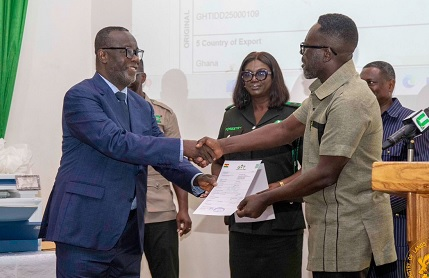
The Forestry Commission has issued the first six certificates to five Ghanaian companies to export timber and timber products to the European market under the Forest Law Enforcement, Governance, and Trade (FLEGT) licensing regime.
The certificates, which are part of the 131 timber utilisation contracts (TUCs) ratified by Parliament on June 24 this year, were presented to Samartex Timber and Plywood Co. Ltd, Logs and Lumber Ltd, JCM Company Ltd, Mere Plantations Ltd, and West Coast Wooden Products Ghana Ltd.
Context
Also known as the timber legality licence, the FLEGT licence is a document issued by timber-producing countries that have ratified a voluntary partnership agreement (VPA) with the EU.
The FLEGT confirms that shipments of timber or timber products have been legally produced under the relevant laws of the country of harvest. It also ensures that timber exported to the EU by partner countries is harvested legally, thereby promoting sustainable forest management.
The Acting Chief Justice, Paul Baffoe-Bonnie, presented the certificates to the companies at the launch of the FLEGT licensing regime on the premises of the Forestry Commission in Accra yesterday.
The event brought together policymakers, regulators, and other players in the forestry sector.
Key personalities at the event included the President of the Central Regional House of Chiefs, Odeefou Amoakwa Buadu VIII; Ghana’s Ambassador to Togo, Capt. George Kofi Nfojoh, and the Deputy Head of Delegation, EU Delegation to Ghana, Jonas Claes.
Having received the certificates, the companies have begun the process to export timber and timber products to destinations such as Italy, Germany, and Tallinn, the capital city of Estonia.
The issuance of the certificates makes Ghana the first country in Africa and second in the world, only after Indonesia, to export timber and timber products to the EU market under the FLEGT licence regime
Worthy milestone
A speech delivered by the Chief Director of the Ministry, Innocent Haligah, on behalf of the Minister, Emmanuel Armah-Kofi Buah, said the launch of the FLEGT licence was a major step towards the sustainable management of the country’s forest reserves.
He said it was refreshing that the journey to acquiring a FLEGT licence, which started in 2009 with the signing of the voluntary partnership agreement (VPA), had seen the light of day.
“This milestone has been achieved through collaborative efforts of both state and non-state institutions, including civil society organisations, who have been following keenly and putting pressure on duty bearers, and we can all be happy now for how far we have come,” he said.

Mr. Buah said the entire FLEGT licence process, which spanned many political regimes, meant that through collaboration, the country could achieve greatness.
He observed that the licence was an opportunity to expand the timber market and ensure that timber resources were sustainably harvested and managed well.
Mr. Buah cautioned persons who were engaged in illegal logging and illegal mining to move out of forest zones before the law caught up with them.
“These people should know that we are coming for them. We will come hard at them; the field day is over, and there is no hideout for them,” he stressed.
The acting Chief Executive of the Forestry Commission, Dr Hugh Brown, said the issuance of the FLEGT licensing certificates was a call on companies in the forest sector to get their act together and operate within the legal framework.
He also urged all those engaged in illegal logging, illegal mining, and other crimes in the forest ecosystem to stop.
Solidarity
While commending Ghana for chalking up a historic feat, Mr. Claes said the EU was committed to supporting the country to succeed in sustainably managing forest resources.
“Today is a big day for EU-Ghana relations and sustainability, as we go live on the FLEGT licences, which marks a significant step in Ghana’s commitment to trade in legal timber and wood products, combating illegal logging and promoting good forest governance,” he said.
Mr. Claes added that the issuance of FLEGT licences combined environmental and economic virtues, as it would facilitate and boost trade in legal timber products while also promoting sustainable forest management.
The EU envoy added that the issuance of an FLEGT licence by Ghana was not the end of the road but required the country to play according to the rules of engagement.
“The proof of the pudding is in the eating, and ultimately, we must focus on increasing trade in legal timber products while tackling deforestation and biodiversity loss,” he said.

Support
He gave an assurance that the EU would support Ghana every step of the journey.
For instance, he said the EU was in the process of procuring IT equipment worth €400,000 for the Forestry Commission and its offices.
“More support is underway. We are planning for an additional €37 million towards the improved management and conservation of natural resources—both land and forests.
“These funds will help to combine integrated landscape approaches with support for value chains (cocoa in central Ghana, cashew in northern Ghana),” he added.
Mr. Claes added that there was a need for a concerted effort to curb the devastating environmental effects of illegal gold mining, including its impact on the country’s forests.
Background
Initially, it was expected that beginning June 15, this year, all timber products that will be exported from Ghana to the EU market would conform to the Forest Law Enforcement, Governance and Trade (FLEGT) licence requirement, making the country the first African country and the second in the world to meet the requirement.
However, the delayed ratification of the timber rights by Parliament made it impossible to meet that deadline.
Finally, Parliament ratified 131 Timber Utilisation Contracts (TUCs), paving the way for Ghana to issue the FLEGT licence for the export of timber and timber products to the EU market.
The milestone, which was achieved on July 24 this year, put the country in a good position to meet the October 8, 2025, deadline set by the EU for trade in timber under the Ghana-EU voluntary partnership agreement (VPA).
The ratification of the TUCs came as an icing on the cake as the EU declared Ghana a low-risk country under the European Union Deforestation Regulation (EUDR).

DISCLAIMER: The Views, Comments, Opinions, Contributions and Statements made by Readers and Contributors on this platform do not necessarily represent the views or policy of Multimedia Group Limited.
This article was originally posted on: MyJoyOnline
Share This:
- GroConsult
- No Comments

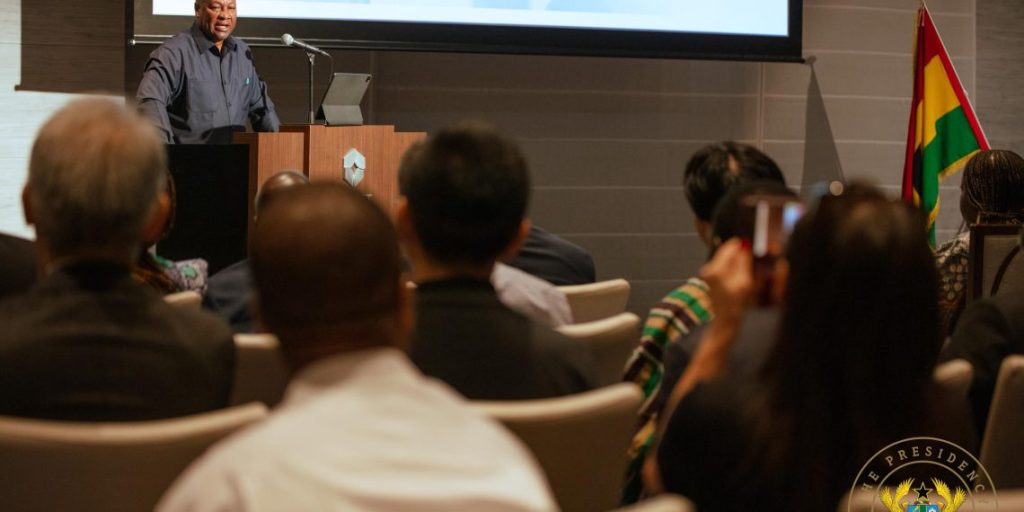
President John Mahama has urged Japanese businesses to seize Ghana’s strategic position as a gateway to Africa and take advantage of a continental market of 1.4 billion people.
He described Ghana as “a stable, democratic, business-friendly gateway to West Africa and the continent,” with a growing consumer market, improving macroeconomic fundamentals, and clear reforms to reduce the cost of doing business.
The President was speaking at the Ghana Presidential Investment Forum on the sidelines of the 9th Tokyo International Conference on African Development (TICAD IX) in Japan on Wednesday.
He pointed to Ghana’s strategic geographical location and its status as the host of the African Continental Free Trade Area (AfCFTA) Secretariat, which enables duty-free, tariff-free trade across almost 50 African countries.
“The sub-regional market, which is West Africa, is 400 million people. Ghana is 33 million people. And the continental market is 1.4 billion people. With the vehicle of the African continental free trade area, you potentially can export into 1.4 billion markets,” he said.
President Mahama underscored Ghana’s progress in restoring macroeconomic stability, noting that inflation, which peaked at almost 23 per cent in 2024, had dropped to 13.7 per cent and was projected to fall into single digits by the end of the year.

He added that the Ghanaian cedi had stabilised, describing it as “the best performing currency in the world this year,” with the country’s credit rating upgraded from junk status to B minus with a stable outlook.
On investment reforms, he announced that Ghana was revising its Investment Promotion Centre Act to remove minimum capital requirements for foreign investors, making it easier for businesses of all sizes to establish operations in the country.
“This will enable any investor, however little money you have, $100,000, $50,000, to be able to come in and set up a business in Ghana,” he explained.
The President also highlighted opportunities for Japanese businesses in sectors such as automobile assembly, agribusiness, agro-processing, energy, manufacturing, and digital innovation.
He noted that global brands like Toyota and Honda were already assembling in Ghana, with potential for expansion into both local and regional markets.
Touching on Ghana’s comparative advantage in agriculture, Mr. Mahama outlined plans for the Volta Economic Corridor, which would leverage vast arable lands and the Volta Lake to bring millions of hectares under irrigation while hosting industrial parks for agro-processing and textile manufacturing.
He also emphasised Ghana’s strength in energy production, citing hydro, thermal, and gas-to-power investments, alongside the country’s integration into the West African Power Pool, which allows surplus power exports to neighbouring countries.
On infrastructure, Mr. Mahama pointed to Ghana’s modern ports in Tema and Takoradi, particularly the recently built MPS Port in Tema, which he described as “one of the best performing ports in Africa,” capable of hosting the world’s largest cargo ships.
He further highlighted the opportunities in Ghana’s fast-growing digital economy, driven by a young, English-speaking workforce and a vibrant fintech sector.
To facilitate investment, he assured Japanese businesses of expedited processes at the Ghana Investment Promotion Centre (GIPC), promising approvals and registrations within 24 hours.
President Mahama stressed that Ghana offered a secure investment environment, with options for public-private partnerships, blended finance, and joint ventures with local businesses.

“Your business will be protected and will not be expropriated,” he assured.
Encouraging Japanese investors to look to Ghana as their hub for Africa, he said: “Africa is the next frontier for investment. Most parts of the world are saturated when it comes to investment.
“Africa is opening up, is growing, and is a place that Japan should be looking at. Let us marry Japanese precision with Ghanaian potential and create a win-win situation for ourselves.”
The President concluded by reiterating that “Ghana is open for business 24 hours a day” and outlined his $10 billion “Big Push” programme, which will focus on infrastructure, agro-processing, industrial growth, and the country’s new 24-hour economy policy aimed at boosting productivity and exports.
DISCLAIMER: The Views, Comments, Opinions, Contributions and Statements made by Readers and Contributors on this platform do not necessarily represent the views or policy of Multimedia Group Limited.
This aiticle was originally published on: MyJoyOnline
Share This:
- GroConsult
- No Comments

Taxes are compulsory financial charges imposed by governments on individuals and businesses to fund public services and infrastructure. In Ghana, these payments support essential services such as healthcare, education, transportation, and national defense.
Taxes are more than just a civic obligation—they are a cornerstone of Ghana’s economic development. For individuals and Small and Medium-sized Enterprises (SMEs), tax compliance unlocks opportunities that drive personal growth, business expansion, and societal progress.
Types of Taxes in Ghana
1. Taxes on What You Earn
Personal Income Tax (PIT): Levied on individual earnings from employment, business, or investments. Residents are taxed on their worldwide income, while non-residents are taxed only on income sourced in Ghana.
Corporate Income Tax (CIT): Imposed on company profits at a standard rate of 25%. Certain sectors, such as mining and petroleum, may be subject to different rates.
Pay As You Earn (PAYE): A system where employers deduct income tax from employees’ salaries and remit it to the GRA.
Capital Gains Tax (CGT): Applied to profits from the sale or disposal of assets like land (excluding agricultural land), buildings, and shares. The rate is typically 15%.
2. Taxes on What You Buy
Value-Added Tax (VAT): A consumption tax levied at a standard rate of 15% on goods and services. Additional levies include the National Health Insurance Levy (NHIL) at 2.5%, the Ghana Education Trust Fund Levy (GETFL) at 2.5%, and the COVID-19 Health Recovery Levy (CHRL) at 1%.
Excise Duty: Imposed on specific goods such as alcohol, tobacco, and petroleum products.
Communications Service Tax (CST): A 5% tax on charges for the use of communication services like voice calls and data.
3. Taxes on What You Own
Property Tax: Collected by local authorities on real estate properties based on their assessed value.
Gift Tax: Levied on the total value of taxable gifts received by an individual within a year. The rate is typically 5%.
Inheritance and Estate Taxes: While Ghana does not have explicit inheritance or estate taxes, gifts and inheritances may be subject to income tax under certain conditions.
Purpose of Taxes in Ghana
Taxes in Ghana are not merely financial obligations; they are pivotal instruments for national development, economic stability, and social equity. By understanding the multifaceted roles taxes play, individuals and businesses can better appreciate their contributions to Ghana’s growth.
The Role of Taxes in Ghana’s Development
Funding Public Services: Tax revenues are essential for financing public services such as education, healthcare, infrastructure, and public safety. For instance, the National Health Insurance Scheme (NHIS) in Ghana is funded through taxes, providing equitable access to healthcare services for citizens.
Economic Stabilization: Through fiscal policies, the Ghanaian government utilizes tax revenues to manage inflation, stimulate economic growth, and maintain economic stability.
Redistribution of Wealth: Progressive taxation in Ghana helps reduce economic inequalities by reallocating resources from higher-income groups to fund social programs benefiting lower-income populations.
Regulation: Taxes are used as tools to influence behavior, such as imposing higher taxes on tobacco products to discourage smoking.
Empowering Individuals Through Tax Compliance
Access to Public Services: Compliance with tax obligations ensures that individuals contribute to and benefit from essential services like healthcare, education, infrastructure, and security, directly impacting their quality of life.
Legal Compliance and Peace of Mind: Timely tax payment aligns with legal requirements, helping individuals avoid penalties and legal issues, thereby providing peace of mind.
Contribution to National Development: Taxes collected are crucial for funding government projects and initiatives aimed at driving economic growth and reducing poverty in Ghana.
Social Safety Nets: Tax revenues support programs like unemployment benefits and disability assistance, offering a safety net during challenging times.
Economic Stability: A robust tax system enables the government to maintain economic stability by funding operations and essential services.
Strengthening SMEs through Tax Incentives
Eligibility for Tax Incentives: Ghana offers various tax incentives to promote investment and economic growth. For example, agro-processing businesses and cocoa-by-product companies enjoy a 5-year tax holiday, paying a reduced rate of 1% during this period. Additionally, Free Zone Enterprises are granted a 10-year corporate income tax holiday, after which they pay a reduced rate of 15% on exports and 25% on domestic sales.
Access to Deductions: Companies can deduct expenses such as capital allowances, finance costs, and contributions to approved pension schemes, effectively reducing their taxable income.
Improved Business Reputation: Compliance with tax obligations enhances a company’s credibility, fostering better relationships with stakeholders and government agencies.
Support for Infrastructure and Services: Taxes paid by businesses contribute to the development of infrastructure and services that facilitate business operations, such as roads and utilities.
Access to Government Contracts: Tax-compliant businesses are often eligible to bid for government contracts and projects, opening up additional revenue streams.
Building Society Through a Robust Tax Ecosystem
A well-structured tax system not only benefits individuals and businesses but also fortifies Ghana’s socio-economic fabric:
Infrastructure Development: Tax revenues fund the construction and maintenance of critical infrastructure, including roads, schools, and hospitals.
Public Service Enhancement: Consistent tax collection ensures the continuous improvement of public services, enhancing the overall quality of life.
Economic Resilience: A dependable tax base allows the government to respond effectively to economic challenges and invest in long-term development projects.
Conclusion
Ghana’s tax ecosystem is a symbiotic structure where individuals, SMEs, and society mutually benefit. By fulfilling tax obligations, individuals gain access to essential services and contribute to national development. SMEs, in turn, enjoy incentives that promote growth and competitiveness. Collectively, these contributions build a resilient and prosperous society.
For professional assistance with tax filing and compliance, SMEs can rely on Groconsult. Contact us via email at lawrence@groconsult.com or call us on 0509626086.
Share This:
- GroConsult
- No Comments


A key consideration for international businesses when establishing operations outside their home countries is the impact of the prevailing political, economic, and legal systems on the benefits, risks, and costs of doing business.
In the era of globalisation, investment decisions by international businesses outside their home states are informed by factors such as deregulation, interplay of market forces, the efficient allocation of resources, non-intrusion by governments with business operations, equitable and fair tax systems, the profit incentive through privatisation of resources, transparent legal systems, protection of intellectual property rights etc.
With these conditions being guaranteed as an anchor for business efficiency, an important consideration for an international business is the understanding of “cross-cultural literacy” in business, which is a necessary tool kit to ensure the success of the international business outside its home state.
Culture as an imperative for business success
As has been affirmed by scholars on international business, an understanding of the culture of a country where an international business seeks to operate is a guarantee for its success.
It is, therefore, imperative for the international business to adapt to the culture of its host state.
In Ghana, it may not be out of place in conformity with local culture for a business to scale down its operations substantially on a particular day because the majority of the staff may be attending the funeral of a dead colleague, which may have been fixed on a weekday, as is often the case.
What is culture?
There are many definitions of culture, as there are scholars devoted to its study.
Quite an early definition of culture has been stated by Edward Tylor as “that complex whole which includes knowledge, belief, art, morals, law, custom and other capabilities acquired by man as a member of society.”
Another important restatement of culture is provided by the Dutch psychologist Geert Hofstede as the “collective programming of the mind which distinguishes the members of one human group from another.
Culture in this sense includes systems of values; and values are among the building blocks of culture.”
Profs Charles Hill and Thomas Hult, acclaimed scholars of management and international business, state their view of culture “as a system of values and norms that are shared among a group of people and that when taken together constitute a design for living.”
Cultural differences across countries
As culture is not homogenous and varies from country to country, it is important to segment the varieties across many countries for an assessment of their impact on business success.
For example, a Japanese worker is traditionally considered to be overly patronising regarding his commitments to his workplace. Thus, he may be willing to spend extra time, including his weekends and out-of-hours time in doing extra work for the business where he is employed.
In America, the business culture emphasises the delivery of time-bound assignments as a way of showing the importance of the duty to be performed.

American business culture is also deeply rooted in keeping to time schedules for business appointments and considers delays to starting meetings as offensive.
American business culture also subscribes to making business decisions quite hurriedly rather than through prolonged, drawn-out negotiation sessions.
This may be offensive in other cultures, particularly Middle Eastern cultures and may be considered as overly demanding and also as a way of piling pressure to wrap up business deals.
Some peculiar business culture in Ghana
An observation of the Ghanaian business terrain reveals that, although Ghana is gaining increased importance in business activities, business efficacy is yet to reach the level of the advanced countries.
Among the factors which do not make for a conducive business environment are the postponement or cancellation of business appointments at short notice, no reply to emails and enquiries for information, long waiting times for the start of meetings, lack of commitment to the implementation of decisions arrived at business meetings, etc.
While these practices could be offensive in certain cultures, in Ghana, the longevity of their occurrences has come to be accepted as normal and part of the prevailing business culture.
Some other peculiar practices which may occur in business operations in Ghana and elsewhere may be the lack of long-term commitment of employees’ future to their workplaces.
In this situation, employees may not consider their fortunes as tied to the fortunes of the business where they are employed and may be “journey men,” being on the lookout for alternative employment avenues and also open to being poached by other competitors of the business.
In societies which are bound by deep bonds of collectivism among different strata of society, it could be difficult for disciplinary measures to be enforced at the workplace against errant workers, particularly those in the lower rungs.

We pride ourselves on building lasting relationships grounded in trust, professionalism, and a passion for exceeding client expectations. As a solutions hub, GroConsult stands out for its adaptability, deep market knowledge, and unwavering focus on delivering value-making us the partner of choice for businesses seeking to thrive in today’s global marketplace
In such situations, employees could band together in support of an errant worker who has infringed the workplace regulations and is due to have the prescribed sanctions applied against him.
Often, the threat of collective action by employees in stopping work in support of the errant worker disables management from applying the requisite sanction against the employee.
Cultural influences on business
It has been established that the cultural practices prevalent in the respective countries of operation of an international business affect the value systems at each operational base of the business.
Consequently, the management of the business will have to tailor its business processes and practices in direct response to the prevailing values at each unit of operation.
Geert Hofstede (1928-2020), a Dutch psychologist, was commissioned by IBM to study the relationship between culture and workplace values. His findings were categorised as follows: power distance, individualism versus collectivism, uncertainty avoidance, masculinity versus femininity, long-term versus short-term orientation.
readiness to take risks.
Conclusion
It must be emphasised that Hofstede’s categorisations, though apposite in guiding an international business in navigating the cultural nuances and dilemmas in its bid to expand its operations outside its home base, the success of an international business outside its home base is not wholly dependent on its successful adaptation of the cultural values of its host state.
As the bounds of globalisation increase in the current world economic setting, it is imperative for countries which are desirous of expanding the reach of international businesses into their domains to focus more attention on such things as reform of legal systems, protection of intellectual property rights, deregulation, ensuring functional market economies, etc.
Source: Graphic Business
Share This:
- GroConsult
- No Comments


WASHINGTON, April 23, 2025 /CNW/ — For only the second time in the past 12 years, the global percentage of engaged employees fell — from 23% in 2023 to 21% in 2024, according to Gallup’s latest State of the Global Workplace report. The primary cause was a drop in manager engagement: While engagement among individual contributors remained flat at 18%, managers’ engagement fell from 30% to 27%.
The drop in global employee engagement cost the world economy US$438 billion in lost productivity in 2024.
Managers’ Engagement
No other worker category experienced as significant a decline in engagement as the world’s managers. Two types of managers were particularly affected:
- Young (under 35) manager engagement fell by five percentage points.
- Female manager engagement dropped by seven points.
“Manager engagement affects team engagement, which affects productivity. Business performance — and ultimately GDP growth — is at risk if executive leaders do not address manager breakdown,” said Jim Harter, Gallup’s chief workplace scientist.
Gallup recommends three actions leaders can take to boost manager engagement:
- Ensure all managers receive training to cut extreme manager disengagement in half. Manager development has declined globally in recent years, and most say they have not received any training. However, active disengagement is cut in half for those who receive training.
- Teach managers effective coaching techniques to boost their performance. Participants in training courses focused on management best practices experienced up to 22% higher engagement than non-participants. Teams led by those participants saw engagement rise by up to 18%.
- Increase manager thriving through ongoing development. When employers provide manager training, it improves manager thriving from 28% to 34%. However, if they have training and someone at work who actively encourages their development, manager thriving increases to 50%.

GroConsult Management Consortium continues to empower businesses across Africa by offering comprehensive payroll services designed to simplify payroll processing and ensure full compliance with local tax and labor regulations. Understanding the complexities of multi-jurisdictional payroll, GroConsult delivers accurate and timely salary payments, statutory deductions, and tax filings, allowing companies to focus on their core operations without administrative burdens.
With a dedicated team of payroll specialists and robust technology platforms, GroConsult caters to both multinational corporations and local enterprises, ensuring seamless management of employee compensation across various industries. Their payroll solutions are tailored to accommodate diverse workforce needs—from expatriates to local hires— while mitigating compliance risks and enhancing operational efficiency.
As businesses increasingly expand within African markets, GroConsult’s payroll services stand out as a trusted partner for organizations seeking to streamline their human capital management and ensure peace of mind in payroll administration.
Regional Engagement Trends
Since 2011, the U.S. and Canada region has had the highest engagement in the world. 2024 is the first time it has tied with another region — Latin America and the Caribbean, which is at a new high.
Despite a three-percentage-point drop in engagement in 2024, South Asia is still ahead of the global average. The regional decline in engagement is driven by its most populous country, India, where engagement fell three points in the latest three-year rolling average.
For the fifth year in a row, European workers’ engagement is lower than in any other world region. The Middle East and North Africa, East Asia and sub-Saharan Africa also continue to lag the global average.
Post-Soviet Eurasia recorded a new high in engagement (26%); meanwhile, Southeast Asia’s latest 26% engagement rate is more than twice as high as what Gallup recorded for the region in 2011. Employee engagement in Australia and New Zealand is also on the high end of the trend since 2012.
The Global Job Market
Over half of employees (51%) say it is a “good time” to find a job where they live, but this is down to the lowest point since 2021.
Of all world regions, employees are most optimistic about their local job markets in Australia and New Zealand, where 72% say it is a good time to find a job. New highs in job market optimism were recorded in Latin America and the Caribbean (58%), Europe (57%) and Post-Soviet Eurasia (53%).
Half of global employees (50%) are watching for or actively seeking a new job, slightly lower than figures recorded in 2022 and 2023.
Employee Wellbeing
The percentage of employees thriving in their lives (33%) dropped for a consecutive year, falling to the lowest point since 2021.
- A record-low 52% of employees in the U.S. and Canada region are thriving in their lives.
- Over half of employees in Australia and New Zealand are thriving (56%) — the highest percentage in the world. However, the latest figure marks a new low for the region, down 13 points from Gallup’s measure in 2011.
- Employees in South Asia are the least likely to be thriving in their lives across world regions.
- About one in three employees in Post-Soviet Eurasia (33%) and Southeast Asia (36%) are thriving, marking new highs for both regions.
- Most employees in Latin America and the Caribbean (54%) now rate their lives positively enough to be considered thriving — the highest level in a decade.
Global employees’ reports of stress are slightly lower than in recent years but remain elevated compared to pre-pandemic figures. Reports of experiencing daily anger are stable, while experiences of sadness are on the high end of Gallup’s trend since 2009. More than one in five employees report having experienced loneliness.
- Sub-Saharan African employees’ reports of experiencing stress the previous day (47%) are at a new high.
- European employees’ reports of experiencing anger (14%) the previous day are lower than the 15% to 19% range previously recorded.
- Fourteen percent of East Asian employees report having experienced sadness the previous day — twice as high as what Gallup recorded in 2011 (7%).

About Gallup
Gallup delivers analytics and advice to help leaders and organizations solve their most pressing problems. Combining more than 80 years of experience with its global reach, Gallup knows more about the attitudes and behaviors of employees, customers, students and citizens than any other organization in the world.
SOURCE Gallup, Inc.
Share This:
- GroConsult
- No Comments


The government of Ghana has officially prohibited foreigners from participating in the local gold trade, following the passage of the Ghana Gold Board Act, 2025 (Act 1140).
The law, passed by Parliament on March 29 and assented to by the President on April 2, introduces sweeping reforms to regulate gold trading in the country’s artisanal and small-scale mining (ASM) sector.

1. All previous gold licences nullified
Effective immediately, all licences previously issued by the Precious Minerals Marketing Company (PMMC) or the Minister responsible for Mines—except those held by large-scale mining companies—are no longer valid.
2. GoldBod now sole authority
The Ghana Gold Board (GoldBod) has become the exclusive buyer, seller, assayer, and exporter of all gold produced in the artisanal and small-scale mining (ASM) sector.
3. Only GoldBod and its partners can trade locally
No individual or entity, unless licensed by the GoldBod or acting as an authorised aggregator or service provider, is permitted to purchase, sell, or export gold within Ghana.
4. Grace period until April 30 for existing licence holders
To accommodate existing contractual obligations, the GoldBod has permitted current PMMC or ministerial licence holders to continue operations until 30th April 2025, after which such activities will be illegal without a new GoldBod licence.
5. Local transactions must be in Ghana cedis
All gold purchases within Ghana must now be made strictly in Ghanaian cedis, with prices based on the Bank of Ghana Reference Rate, accessible via www.bog.gov.gh.
6. Ghanaians encouraged to reapply
Any Ghanaian individual or fully Ghanaian-owned company whose previous licence has expired—or who wishes to enter the gold trading space—must apply for a new licence under the Ghana Gold Board Act from 22nd April 2025.
7. Application process opens soon
The GoldBod will activate an online platform for licence applications on 22nd April. Physical applications can also be submitted at its Licensing and Regulations Office in Accra.
8. Foreigners must exit by April 30
All foreign nationals currently engaged in local gold trading must exit the market by 30th April 2025. Foreigners who wish to deal in gold can only do so by applying directly to the GoldBod to purchase gold.
9. Unlicensed trading becomes a crime from May 1
Starting 1st May 2025, any person or entity found dealing in gold without a GoldBod-issued licence will be committing a criminal offence punishable under Ghanaian law.
The GoldBod has urged all stakeholders to take the necessary steps to comply with the new legal framework. For further enquiries, the public is advised to contact the GoldBod via the numbers provided in the official statement.

Implications for Foreign Investors:
These regulatory changes signify Ghana’s commitment to restructuring its gold trading framework. Foreign investors must reassess their operations and ensure compliance with the new guidelines set forth by GoldBod.
How GroConsult Can Assist:
At GroConsult, we specialize in providing comprehensive consultancy services to businesses navigating regulatory landscapes. Our expertise includes:
- Regulatory Compliance Advisory: Guiding clients through the process of obtaining necessary licenses and ensuring adherence to new regulations.
- Market Analysis: Providing insights into the evolving gold trading market in Ghana and identifying potential opportunities within the new framework.
- Strategic Planning: Assisting in the development of strategies to adapt to regulatory changes and maintain business continuity.
Source: Graphic Business
Share This:
- GroConsult
- No Comments


The International Labour Organization (ILO) has announced the successful completion of its
SCORE (Sustainable Competitive and Responsible Enterprises) training program by 10 Small and Medium-sized Enterprises (SMEs) operating within Ghana’s garment industry.
The initiative, funded by the Government of Switzerland and Norway through the Swiss State Secretariat for Economic Affairs (SECO) and the Norwegian Agency for Development Cooperation (NORAD), aims to enhance enterprise productivity while fostering decent work.
Speaking at the event, Mr. David Marcos, Programme Manager for the ILO’s Productivity Ecosystems for Decent Work project, noted that the ILO is taking a holistic approach to supporting growth in the garment sector. He emphasized that the program tackles challenges at the macro, sectoral, and enterprise levels-addressing policy reforms, sector organization, and development at the company level.
“There is a strong bond between productivity and decent work,” said Mr. Marcos. “Improving working conditions and ensuring fair labour standards are essential for businesses to thrive.
Creating a safe environment for workers enhances their skills and performance, which leads to growth and higher incomes.”
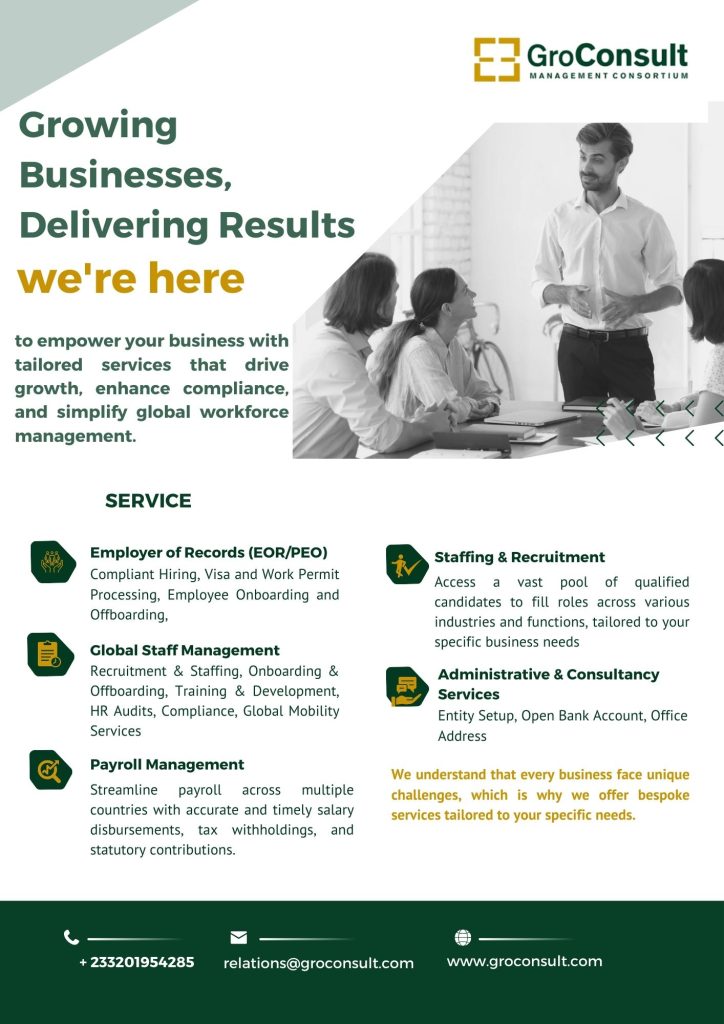
He also highlighted the role of new technologies in enhancing efficiency within the sector.
“We’re introducing innovations such as digital pattern making, which reduces waste and improves efficiency, thereby increasing competitiveness in the garment industry,” he explained.
Addressing questions on the recent 10% tariff imposed by the United States on Ghanaian goods, Mr. Marcos acknowledged the challenge but remained optimistic about Ghana’s competitive edge. “Ghana offers numerous advantages that make it an attractive destination for investors, including its strategic location, English-speaking population, and well-developed infrastructure,” he said.
Mr. Patrick Sieber, representing the Swiss Embassy in Ghana, reiterated Switzerland’s commitment to supporting Ghana’s productive ecosystem. “Trade promotion is one of the four pillars of our economic development cooperation,” he stated. “To address constraints to structural transformation and unlock productivity growth and decent job creation, we are proud to partner with the ILO and NORAD on this initiative.”
He congratulated the participating SMEs on their achievements and pledged ongoing support.
“We commend the awardees for their success so far and assure them that our commitment to their continued growth remains strong.”
One of the beneficiaries of the SCORE training, Awura Abena Agyeman, Chief Executive Officer of Wear Ghana, praised the ILO’s productivity-focused training. She reported a measurable improvement in her company’s operations, citing both financial gains and operational efficiencies.
“The training focused on efficient use of materials and improving our production floor layout,” she said. “As a result, our production workflow has improved significantly, leading to increased productivity and allowing us to respond more quickly to emergencies. This has directly contributed to increased revenue for Wear Ghana.”
Despite the progress, Awura Abena also raised concerns about the recent tariff imposed by the US government. “The 10% tariff will make Ghanaian products more expensive for US buyers, potentially leading to a decline in exports and a loss of competitiveness,” she noted.

She urged the government to take proactive steps to mitigate the impact, suggesting strategic efforts to explore new markets—especially within Africa. “We must re-strategize and take full advantage of the African Continental Free Trade Area (AfCFTA). The African ready-to-wear fashion market is worth an estimated $15 billion, and this presents an incredible opportunity.”
Awura Abena concluded by expressing confidence in Ghanaian businesses’ ability to adapt and grow. “By addressing the challenges posed by the US tariff and exploring new avenues for expansion, we can continue to thrive and make meaningful contributions to Ghana’s economic development.”
Source: Modern Ghana

Share This:
- GroConsult
- No Comments


March 27, 2025: According to new data released by the Internet Society, West African countries are making notable strides in digital development, with several countries in the region improving their Internet resilience.
This progress underscores the region’s growing commitment to enhancing digital infrastructure, security, and market readiness, ensuring more stable and accessible online services for millions.
The Internet Society’s Pulse Internet Resilience Index-which tracks key indicators such as infrastructure, performance, security, and market preparedness-reveals that West Africa’s overall Internet resilience score has climbed to 34%, marking a two-percentage-point increase between 2022 and 2023.
This upward trend translates into more reliable access to essential online services, including education, healthcare, and economic opportunities, reinforcing the Internet’s role as a key driver of development across the region.
Benin (39%) and Senegal (36%) secured impressive six- and ten-point increases between 2022 and 2023, the highest increases among African countries. This moved them into the second and fifth positions in West Africa.
“Senegal has changed remarkably over the last few years,” commented Ahmath Bamba Mbacke, President of Internet Society Senegal Chapter. “Over 60% of the population has access to the Internet, and at least 96% of Internet users have access to at least one device with 4G mobile Internet. 20% of users in Senegal can access online resources using IPv6, which is far above the average 7% for Africa. There are concerted efforts to improve upstream diversity to ensure that our in-country infrastructure can recover from unexpected events with the help of SENIX (Senegalese IXP) and keep our Internet stable and secure in the face of adversity.”
“There has been a marked effort to improve Internet infrastructure in Benin,” says Malick Alassane, Chair of Internet Society Benin Chapter. “Strong foundations have been laid to continue improving Internet access, security, performance, and market readiness across the country to ensure that more people can take advantage of the social and economic benefits that strong, resilient, and stable Internet brings to the country and West Africa as a whole. The development of this environment and trusted infrastructures in our country has led, for example, to the emergence of new e-service platforms, now accessible in just one click, making life easier for citizens and businesses.”

Côte d’Ivoire continues to have the highest IRl score in the region (42%) and the sixth highest in Africa. Although it didn’t experience any growth between 2022 and 2023, its score has increased by 12 points since 2019. Benin, Burkina Faso (38%), Nigeria (38%), Senegal (36%), and Ghana (36%) round out the top six countries in West Africa. Niger (27%) was the only country in the region to experience a decrease in its Internet Resilience Index score for the past 12 months.
As the individual Pulse Country Reports show, these changes are driven by multiple factors, including investment in Internet infrastructure and security, increased usage of IPv6, enabling policies, and growing collaboration among governments, technology providers, and local communities.
An equally contributing factor is how much popular content is accessed through in-country servers and caches. Currently, Ghana has the highest percentage of the 1,000 most popular websites that its Internet users access locally (58%), followed by Togo (46%) and Nigeria (38%).
Benin, Cabo Verde, Gambia, Guinea Bissau, Liberia, Mali, Mauritania, Niger, and Sierra Leone access between 96-100% of all their most popular content from outside the region.
The Internet Society is working with local partners in Benin, Burkina Faso, and Niger to increase this locally cached content figure to 50% by the end of 2025.
“Hosting popular content and local digital services within countries and regions is a cost-effective way to improve Internet performance and resilience,” says Michuki Mwangi, Internet Society Distinguished Technologist for Internet Growth.
“Importantly, the cost savings from not having to pay to access the content via international connections can be reinvested to improve the network or passed on to Internet users.”
Data centres and Internet Exchange Points (XPs) help in this effort as they help store content closer to end users and create shorter, more direct routes for Internet traffic instead of sending and receiving it via expensive international links.
IXPs are Internet intersections, where networks connect locally to exchange traffic and help make the Internet faster and more affordable.
About the Internet Society
Founded in 1992 by Internet pioneers, the Internet Society is a global charitable organization working to ensure that the Internet is for everyone. Through its community of members, special interest groups, and 130+ chapters around the world, the organization defends and promotes Internet policies and technologies that keep the Internet open, globally connected, and secure.
About the Internet Society Pulse
Launched in December 2020, Internet Society Pulse consolidates trusted third-party Internet measurement data from various sources into a single platform. We use the data presented here to examine Internet trends and tell data-driven stories so that policymakers, researchers, journalists, network operators, civil society groups, and others can better understand the availability, evolution, and resilience of the Internet.
Internet Society Pulse:
- Helps everyone better understand the rate of adoption of key new and enabling Internet technologies, helping to identify where more efforts are needed to drive increased adoption.
- Enables journalists to leverage data and graphics to support coverage of relevant Internet-related topics and events.
- Provides policymakers with relevant statistics, data, and context to support their positions and/or influence policy development, especially around Internet shutdowns and local infrastructure resiliency.
- Provides civil society, network operations, and Internet users insight into the availability, reliability, and resilience of local and global Internet infrastructure.
Source: Modern Ghana

As a multinational business solutions provider with over a decade of experience, GroConsult Management Consortium is dedicated to helping businesses thrive. We offer a variety of services and leverage our expertise to be a leading force in the industry.
Our comprehensive solution includes: Global HR Outsourcing: (Recruitment and Onboarding, Benefits Administration, Performance Management, Training and Development, Compliance, Workforce Planning, Talent Management);
Global EOR/PEO Solutions: (Entity Establishment (if required), Contractor/Expat Management, Payroll & Tax Compliance, Onboarding & Off boarding Support);
Immigration Support: (Relocation Services, Entry visa applications, Entry Visa Extension, Residence permit, Work permit, dependents permits, Assistance with other in-country legal immigration requirements.); HR Audit & Accounting, Strategic Business Planning & Development Supports.
Share This:
- GroConsult
- No Comments

The World Bank Group has unveiled the Business Ready (B-READY) Report in Ghana, offering a detailed assessment of the country’s business environment while highlighting critical areas that require reform to stimulate private sector growth.
The report acknowledges Ghana’s strengths in labour market regulations and utility services but identifies bureaucratic inefficiencies in business registration, property transfer, construction permitting, access to credit, and dispute resolution as major obstacles to economic progress.
Speaking at the launch, Robert Taliercio O’Brien, Division Director for Ghana, Liberia, and Sierra Leone at the World Bank, pointed out the urgency of addressing these bottlenecks to enhance Ghana’s investment appeal.
“The B-READY data highlights several areas where Ghana is doing better than peers in the Sub-Saharan Africa region… At the same time, the data reveals significant bottlenecks that, if unaddressed, will continue stifling growth and deterring investment,” he stated.
The government has reaffirmed its commitment to tackling these challenges through the Business Regulatory Reform (BRR) Programme. Hon. Elizabeth Ofosu Agyare, Minister for Trade, Industry, and Agribusiness, emphasized the importance of regulatory efficiency in driving economic transformation.

“Achieving the full impact of Ghana’s economic transformation agenda depends on establishing robust regulatory frameworks and enhancing institutional efficiency. The government is committed to removing long-standing barriers that have hindered businesses from realizing their full potential,” she said.
The methodology and benchmarking of the B-READY Report were presented by Valeria Perotti, Manager of the Business Ready (B-READY) unit at the World Bank. She explained that the initiative serves as more than just a ranking tool.
“The B-READY initiative is not just a set of rankings; it is a diagnostic tool that provides governments with a clear roadmap for reform. Our goal is to ensure a business environment that is efficient, transparent, and conducive to investment,” she noted.
A panel discussion featuring Simon Madjie (CEO, Ghana Investment Promotion Centre – GIPC), Alexander Mould (CEO, Millennium Development Authority – MiDA), Mavis Owusu Gyamfi (President & CEO, African Center for Economic Transformation – ACET), Seth Twum Akwaboah (CEO, Association of Ghana Industries – AGI), and Ashok Mohinani (Executive Director, Mohinani Group) explored practical solutions to improve Ghana’s business climate. Key recommendations included digitalizing regulatory processes, simplifying tax and trade procedures, and strengthening public-private collaboration.
The International Finance Corporation (IFC), a key member of the World Bank Group, also pledged its support for Ghana’s economic transformation efforts. Kyle Kelhofer, Senior Country Manager for Ghana, Liberia, and Sierra Leone at the IFC, reiterated the organisation’s readiness to assist the country. “The World Bank Group stands ready to assist Ghana with both financial and technical support to implement key reforms.
This includes investments in infrastructure, digital transformation of public services, and strengthening credit systems to enhance financial access for businesses,” he said.
The World Bank Group has urged policymakers and the private sector to work together to implement reforms that will enhance business competitiveness, attract investment, and drive sustainable economic growth.
Source: Graphic Business

Our expertise in global employment intricacies, combined with our seamless integration of global and local acumen, allows us to tailor services to each unique environment, harmonizing corporate goals with local realities. At GroConsult, we understand that successful global workforce management extends beyond paperwork and procedures. Our commitment to the wellbeing of employees ensures a satisfied, productive workforce that is well-integrated into their new surroundings. By partnering with us, businesses can concentrate on their core activities, secure in the knowledge that the complexities of managing an international workforce are in expert hands. Contact us today to schedule a convenient call and explore how GroConsult can simplify and streamline your global expansion efforts
Share This:
- GroConsult
- No Comments


African national oil companies (NOCs) are leveraging innovative financing strategies to advance oil and gas projects, ensuring continued investment despite shifting global energy markets.
Through various innovative strategies such as privatization and divestment, bond issuances, development finance and resource-backed loans, NOCs are not only strengthening their financial capacity but positioning themselves at the forefront of African oil and gas development.
Privatization and Divestment
Privatization and asset divestment have become crucial tools for African NOCs to streamline their operations and attract private capital. By selling stakes in non-core assets and partially-privatizing, NOCs are raising the much-needed capital to support oil and gas projects. Angola’s Sonangol, for example, has reaffirmed its plan to launch an Initial Public Offering (IPO), with 30% of the company’s shares expected to become available. The IPO falls under the broader Propiv initiative by the government – aimed at reforming the economy toward a free market. The initiative will make 11 of Sonangol’s processes public through public tenders, limited tenders and IPOs.

Bond Issuances and Capital Market Financing
With the need for long-term project financing, governments and NOCs have turned to international capital markets, issuing bonds to raise funds for large-scale projects. Bond issues originating from Africa exceeded $14.8 billion in Q1, 2024, as African business and governments tap into the international bond market. The Africa Finance Corporation acted as Global Coordinator for the issuance of a domestic dollar bond from the Nigerian government in 2024, raising $900 million. The first-of-a-kind issuance closed with 180% oversubscription, highlighting strong domestic investor confidence. Nigeria also issued a $1.7 billion Eurobond in December 2024, which was oversubscribed five-fold.
Joint Ventures
Joint ventures (JV) have proven effective strategies for NOCs to raise capital, leverage foreign technical expertise while sharing financial risk across oil and gas projects. The Ghana National Petroleum Corporation (GNPC) has committed to pursuing innovative JVs with Eni in 2025 and beyond to fast-track oil and gas projects.
The country’s biggest oilfields – Jubilee and TEN – were developed through a JV between GNPC, Kosmos Energy, Petro SA and Jubilee Oil Holdings. JVs have served as a vehicle for Libyan oil and gas development. Mellitah Oil & Gas – a JV between the NOC and Eni – produced 403,000 barrels per day (bpd) in 2024 while Akakus Oil Operations – a JV between the NOC and Repsol – achieved record production in 2025 with 306,000 bpd.
Development Finance and Resource-Backed Loans
Development finance and resource-backed loans have become vital financing mechanisms for NOCs, particularly as access to private capital for oil and gas projects becomes increasingly challenging. The Nigerian National Petroleum Corporation has leveraged oil-backed loans to increase its balance sheet over the years and is currently seeking a new $2-billion structure to support production growth. The first $1 billion tranche has already been concluded with a second tranche in the works.
Mozambique’s ENH leveraged development finance to fund its gas projects. Notably, the $20 billion Mozambique LNG project is expecting a $4.7 billion loan from the U.S.-Export-Import Bank to be re-approved. The project has already secured $3 billion in financing from the Japan Bank for International Cooperation.
Meanwhile, Uganda and Tanzania’s NOCs are seeking an additional $3 billion in debt financing from Chinese lenders, specifically the Export-Import Bank of China and China Export & Credit Insurance Corporation, to fund the East African Crude Oil Pipeline.
“African NOCs are deploying a diverse range of financing strategies to ensure continued investment in oil and gas projects. From privatization and asset sales to bond issuances, joint ventures and development finance, NOCs are adapting to evolving market conditions while securing the necessary capital to sustain exploration and production,” states Ore Onagbesan, Programming Director, African Energy Chamber.
This article was originally published on: Africa Business Communities

At GroConsult Management Consortium, we understand the complexities and opportunities that come with entering new territories, and we are here to support you every step of the way.
As a multinational business solutions provider with over a decade of experience, GroConsult is dedicated to helping businesses thrive in Africa. Our comprehensive suite of services is designed to address the unique challenges faced by companies looking to establish or expand their presence on the continent.Our Priority Services for Your ExpansionGlobal EOR/PEO Solutions: We provide Employer of Record (EOR) services, facilitating entity establishment if required, contractor and expat management, payroll and tax compliance, as well as onboarding and offboarding support. This allows you to hire talent without the need to set up a local entity.
Immigration Support: Our immigration services cover all aspects necessary for smooth relocation, including assistance with entry visa applications, work permits, residence permits, and compliance with in-country legal immigration requirements. We ensure that your team can focus on their work without delays due to immigration issues.
Global HR Outsourcing: We offer a full range of HR services including recruitment and onboarding, benefits administration, performance management, training and development, compliance, workforce planning, and talent management. This ensures that your workforce is well-managed and aligned with your business goals.
HR Audit & Accounting: Our HR audit services help you assess your current practices and ensure compliance with local regulations while our accounting services provide financial assurance and strategic insights.
Strategic Business Planning & Development Support: We assist in crafting tailored business strategies that align with your goals in Africa, ensuring that you are well-positioned for success in this dynamic market.
Share This:
- GroConsult
- No Comments


Africa’s digital payments economy is set to grow from strength to strength according to a Mastercard-commissioned report by Genesis Analytics stating that the digital payments economy is expected to reach $1.5 trillion by 2030.
As a longstanding technology partner to Africa, Mastercard continues to strengthen its commitment to the continent’s digital growth through strategic investments, public-private partnerships, and innovation initiatives that drive financial health and economic growth. By fostering collaboration with key stakeholders, Mastercard aims to enhance digital connectivity, expand economic opportunities, and enable millions of people and businesses to thrive in the digital economy.
Driving Africa’s digital growth
Mastercard’s investments will focus on three key areas to further accelerate digital adoption and financial inclusion:
Enabling Africa’s Micro, Small and Medium Businesses (MSMEs)
Empowering Africa’s fintech sector
Scaling remittances and cross-border payments
“Africa is filled with immense possibilities, and its people have the potential to shape the global economy in the decades ahead. Mastercard remains deeply committed to driving digital transformation across the continent, working closely with entrepreneurs, merchants, banks, start-ups, telcos, and governments. By increasing our investments, expanding innovation, and fostering inclusion, we are helping build a more connected and accessible digital future,” said Dimitrios Dosis, president, Eastern Europe, Middle East and Africa at Mastercard.
Africa’s digital transformation is underpinned by rapid advancements in internet penetration and financial inclusion, two of the fastest-growing enablers of digital payments across the continent. According to the report, internet penetration in Africa is projected to grow at a compound annual rate of 20%, while financial inclusion is set to expand at 6% per year.
These trends signal a strong shift towards digital transactions, with businesses and consumers increasingly embracing contactless solutions, further accelerating economic participation and financial accessibility across the region.
“For over five decades, Mastercard has worked alongside African governments, businesses, and communities to advance financial inclusion and economic development. With Africa projected to host nine of the world’s 20 fastest-growing economies, we are focused on leveraging our expertise and technologies to support the continent’s continued digital transformation. Our investments today will help build a more resilient economy for the future,” said Mark Elliott, division president, Africa, Mastercard.
Enabling Africa’s Micro, Small and Medium Businesses (MSMEs)
Recognizing that MSMEs account for over 50% of Africa’s GDP, Mastercard continues to provide digital solutions that empower small businesses and drive economic expansion.
This commitment is reinforced by the Mobilizing Access to the Digital Economy (MADE) Alliance: Africa, in partnership with the African Development Bank Group. The initiative aims to extend digital access to critical services for 100 million individuals and businesses over the next decade. As part of its broader goal to bring users onto Community Pass, Mastercard has set a target to register 15 million users in Africa within five years. Community Pass is a social enterprise initiative that digitizes and connects remote, and rural communities to governments, NGOs, and private sector services.

To further fuel the potential of Africa’s MSMEs, Mastercard will accelerate easy access to its proprietary solutions such as Tap on Phone and SME-in-a-Box. The technology company will also continue to enable access to finance through its Track Micro Credit Program, which has already benefited thousands of micro merchants. Furthermore, African entrepreneurs will continue to gain knowledge on how to thrive as business owners through free learning resources such as The Entrepreneur’s Odyssey and Mastercard Trust Center.
Empowering Africa’s fintech sector
Africa’s fintech ecosystem is a key driver of digital transformation and economic progress. Nearly half of all fintech firms on the continent have been founded in the last six years, collectively raising $6 billion in equity financing since 2000.
Mastercard is partnering with banks, telcos, and other service providers across Africa and internationally to help accelerate fintech growth and expansion in new markets. For example, Mastercard’s partnership with M-Pesa in Kenya and MTN Group Fintech has enabled millions of unbanked individuals to access digital financial services through mobile money platforms.
Similarly, Mastercard’s collaboration with digital wallet providers and e-commerce platforms has facilitated the integration of payment solutions into digital ecosystems, enabling seamless transactions for consumers and merchants alike. For example, Mastercard’s global Fintech Express program provides fintech companies with an end-to-end experience for card issuance. By combining its identity, biometric, AI and open banking capabilities, Mastercard helps protect consumers across the spectrum of internet and payments scams.
Scaling remittances and cross-border payments
Seamless cross-border transactions are essential for Africa’s economic mobility. According to the World Bank, Africa received approximately $100 billion in remittances in 2023, accounting for about 6% of the continent’s GDP.
Mastercard is playing a key role in enabling the infusion of funds into local economies. Through a single, secure point of access, Mastercard Cross-Border Services allow people and businesses to remit money securely, and with certainty.
Local partnerships such as the recent agreements with Africa’s Access Bank and Equity Bank, are enabling Mastercard to make cross-border payments more simple, convenient, and accessible. Furthermore, they are enabling customers in multiple markets to make cross-border payments globally via bank accounts, mobile wallets, cards, and cash.
Mastercard remains committed to driving Africa’s digital growth through investment, innovation, and partnerships. By enhancing financial inclusion, expanding digital transactions, and strengthening cross-border connectivity, the company is helping to build a more inclusive and resilient digital economy for the African future.
This article was originally posted on: Africa Business Communities

At GroConsult Management Consortium, we understand the complexities and opportunities that come with entering new territories, and we are here to support you every step of the way.As a multinational business solutions provider with over a decade of experience, GroConsult is dedicated to helping businesses thrive in Africa. Our comprehensive suite of services is designed to address the unique challenges faced by companies looking to establish or expand their presence on the continent.Our Priority Services for Your ExpansionGlobal EOR/PEO Solutions: We provide Employer of Record (EOR) services, facilitating entity establishment if required, contractor and expat management, payroll and tax compliance, as well as onboarding and offboarding support. This allows you to hire talent without the need to set up a local entity.
Immigration Support: Our immigration services cover all aspects necessary for smooth relocation, including assistance with entry visa applications, work permits, residence permits, and compliance with in-country legal immigration requirements. We ensure that your team can focus on their work without delays due to immigration issues.
Global HR Outsourcing: We offer a full range of HR services including recruitment and onboarding, benefits administration, performance management, training and development, compliance, workforce planning, and talent management. This ensures that your workforce is well-managed and aligned with your business goals.
HR Audit & Accounting: Our HR audit services help you assess your current practices and ensure compliance with local regulations while our accounting services provide financial assurance and strategic insights.
Strategic Business Planning & Development Support: We assist in crafting tailored business strategies that align with your goals in Africa, ensuring that you are well-positioned for success in this dynamic market.
Share This:
- GroConsult
- No Comments

Emirati companies are bringing capital and expertise to African investments, but the illegal gold trade remains a challenge.

With $60bn of investment in Africa in over a decade, the United Arab Emirates is emerging as one of Africa’s most consequential investment partners.
COP28 in Dubai in December 2023 was key in outlining a roadmap for the years ahead. There, concessions were given to Emirati companies to develop green initiatives in Angola, Uganda, the Republic of Congo, Kenya and Mozambique including solar, hydraulic and geothermal energy projects.
Between 2019 and 2023, Emirati companies announced $110bn of projects in Africa according to data provider FT Locations – $72bn of them renewable energy projects.
Elsewhere, logistics giant and UAE-based DP World is making large investments in port facilities and operations on the continent, and UAE’s International Holding Company – which has a market cap of AED892.8bn ($243bn) is pursuing projects in health, fintech and mining.
The Africa Debate event, held in October 2024 in Dubai, offered a chance for the United Arab Emirates as a whole to boast of its willingness to invest in key sectors across the continent.
“The UAE’s increasing role as Africa’s largest investor signals a shift in global economic dynamics,” Carlos Lopes, honourary professor at the University of Cape Town’s School of Public Governance, tells African Business.
“Middle powers, like the UAE, are stepping into roles traditionally held by donor countries and, more recently, China.”
A developing relationship
African-UAE cooperation has been steadily rising since the early 2000s. Artur Frantz, research fellow at the South American Institute for Policy and Strategy, says interest spiked when Dubai sought to diversify its oil-based economy by investing in hydrocarbons revenues abroad, including investments in African infrastructure, tourism, agribusiness and mining.The oil sector’s contribution to the UAE’s GDP went from 57% in 1975 to 17% in 2020.
Vera Songwe, founder of the Liquidity and Sustainability Facility – a finance mechanism aimed at improving the liquidity of African sovereign debt – tells African Business that this bid to diversify from the UAE’s resource-driven economy means that the relationship with Africa goes beyond the raw materials extraction that motivates other partners.

“The focus is on economic growth, job creation, and green development rather than short-term extraction of resources,” she adds.
Lopes agrees, adding that “their investments are motivated by long-term strategic goals, aiming to develop a diversified, sustainable economy across the continent while mitigating risks in ways that are distinct from those of traditional powers.”
Husam Mahjoub, Sudanese tech expert and ex-president of the London Business School’s Gulf Association, adds that the UAE’s technical expertise and rapid infrastructure execution distinguish it from other players.
“Unlike Western institutions like the World Bank and IMF, which impose bureaucratic conditions, the UAE delivers high-standard projects quickly.” In addition, “rather than sending large numbers of its own workers, as China does, the UAE acquires stakes in major companies, banks, and logistics firms, exerting influence without visible foreign dominance.”
Infrastructure and renewables focus
Infrastructure is one of the major areas of mutual interest underpinning the expanded relationship.
The UAE, which grew from a series of impoverished minor desert sheikhdoms into a major Middle East hub within decades, offers substantial experience in building major urban infrastructure projects, something Africa can benefit from as it seeks to move away from its own natural resources dependency and close its enormous infrastructure gap. In late 2023, the African Development Bank estimated that between $130 and $170bn was needed for infrastructure development every year to be able to solve inequalities. At the same time, the Global Competitiveness Report, issued at Davos’ World Economic Forum in 2023, ranked the UAE as fourth globally in infrastructure quality.
As the continent battles the consequences of climate change and looks to extend electricity to the 600m Africans who are reported to lack access, renewable energy is also emerging as an area of intense cooperation. The International Renewable Energy Agency says that the Middle East is the fastest-growing region outside China in terms of adding capacity to the renewable energies market.
“The UAE has built world-class expertise in renewable power, with companies like Masdar and AMEA Power leading Africa’s green electrification,” Songwe says.
Having co-chaired the Independent High Level Expert Panel on Climate Finance in Egypt during COP27, Songwe says that agreements supporting Africa’s green industrialisation, “can accelerate the deployment of clean power while ensuring energy-intensive industries transition sustainably, creating long-term socio-economic benefits.”
Infinity Power, a joint venture between UAE’s Masdar and Egypt’s Infinity, is heavily involved in the market.
The Emirati-Egyptian company has so far raised financing of over $1bn, and its goal is a continent-wide presence with 10 GW of capacity installed by 2030 through their solar, onshore wind and hydrogen energy solutions.
The venture’s deputy CEO Ahmed Mulla tells African Business that “what Masdar brings is scale, technical and procurement excellence and the financial firepower to make big projects happen.”
“We see Africa as the world’s next major renewable energy beacon and we are committed to making that vision a reality,” he says..
Infinity Power claims that 85% of their local workforce are African: “this ensures our projects drive long-term economic benefits at the community, regional, and national levels.”
Self-interest?
However, Husam Mahjoub, who has been a critical voice of UAE’s business practices in Africa, warns that other UAE-backed renewable projects “are designed to generate carbon credits, which allow corporations and governments – including the UAE itself – to offset emissions while continuing fossil fuel production elsewhere.”
A SourceMaterial investigation by Le Monde and The Telegraph in 2023, suggested that Blue Carbon —owned by Dubai’s Sheikh Ahmed al-Maktoum— had signed deals to acquire vast tracts of land across Africa for offsetting projects. Back then, Axel Michaelowa, a scientist at the University of Zurich told SourceMaterial that these could generate as many as $250m “avoided deforestation” credits a year. In addition, at an earlier SourceMaterial investigation, the Guardian and Die Zeit revealed that “as many as 94% of the forest offsets most commonly used in carbon markets do almost nothing to mitigate climate change.”
“For these projects to truly support Africa’s green transition,” which the UAE’s infrastructure, financial power and know-how can do, “they must prioritise local energy needs rather than focusing on carbon credit trading,” adds Mahjoub.
Resources push
Emirati-led environmental projects in Africa are not the only business focus 0 resource-extractive activities are also a priority for the UAE.
Copper, cobalt, nickel, graphite, lithium are some of the materials that the UAE companies help to extract from African mines to power their industry.
A recent big bet was the Emirates’ investment in Zambia’s Mopani Copper Mines, through the state-owned International Holding Company’s (IHC) acquisition of a 51% stake from Zambia’s state mining company, ZCCM. IHC will invest funds into Mopani to help with short-term working capital and finance the completion of the mine development, ZCCM said.
Vera Songwe says that “Mopani can now access financial arrangements that support integrated energy solutions, including developing clean power plants to power operations.”
She also adds that “more broadly, Emirati conglomerates are eager to develop industrial supply chains, leveraging their expertise, capital, and strong relationships to drive sustainable resource development.”
The illicit gold trade
Nonetheless, some UAE activities are reported to fuelled illicit trade and conflict, especially when it comes to gold.
“As part of its economic diversification strategy, gold serves as a highly liquid and globally valuable asset, reducing reliance on oil and gas,” Husam Mahjoub adds. “However, gold’s minimal paper trail also makes it ideal for discreet financial operations, enabling countries like Sudan and Russia to bypass international sanctions through Dubai-based networks.”
According to a report released in May by Swissaid, the UAE was by far the main destination for African smuggled gold in 2022, with some 405 tonnes of undeclared output from Africa ending up there.
From 2012-22, some 2,569 tonnes of African gold worth around $115bn reached the country.
Each year, between 321 and 474 tonnes of artisanal gold are produced in Africa without being declared, equating to a value of between $24bn and $35bn.
Moreover, in 2022, the US Treasury Department stated that “more than 90% of DRC gold is smuggled to regional states, including Uganda and Rwanda, where it is then often refined and exported to international markets, particularly the UAE”.
In November, African Business reported that Nigerian President Bola Tinubu’s administration had opened talks with the government of the UAE – identified as the prime destination of gold smuggled out of Nigeria – to help staunch the illegal flow. This formed the subject of discussion in a meeting in late October between Nigeria’s minister of solid minerals Dele Alake and the UAE ambassador to Nigeria, Salem Saeed Al Shamsi.
Elsewhere, the gold trade has also been associated with major conflicts like Sudan’s civil war. In a New York Times report by the title “the gold rush at the heart of a civil war”, they suggest that “the Emirates is a major hub for the Rapid Support Forces (RSF), which uses front companies controlled by General Hamdan [Mohamed Hamdan Dagalo, leader of the RSF] and his relatives to sell gold and buy weapons.”
The US Treasury Department has imposed sanctions on UAE-based companies for gold-purchasing which is alleged to have benefited the RSF and for aiding the paramilitary group with logistical support and weaponry. Despite the UAE having denied allegations of complicity with the RSF and pledged it will stop transferring weapons, Husam Mahjoub claims that “satellite imagery captured between December 2024 and February 2025 showed drones and newly constructed hangars at an RSF-controlled airport in Nyala, South Darfur.”
“History shows that when external actors gain significant economic leverage, they often use it to pursue political and strategic advantages, leading to imperialist or sub-imperialist behavior,” Mahjoub states.
“This is a central challenge with rising powers like China or the UAE: even when their investments are presented as partnerships, they often carry strategic motives, create hidden dependencies, or involve coercive practices.”
Cautious optimism
Still, Carlos Lopes claims there is a sense of cautious optimism among African countries regarding UAE investment.
“Many view it as a refreshing alternative to the old colonial powers, especially given the UAE’s focus on infrastructure, mining, and energy – areas that directly benefit the continent’s development,” he argues.
“However, there is also awareness that more foreign players means increased competition, and the challenge is ensuring that these investments are truly advantageous for Africa, rather than leading to exploitation or undue influence.”
Alex Vines, Africa programme director at Chatham House, says one of the major challenges for the relationship will be establishing projects that create higher value jobs for African employees.
African infrastructure projects that originate abroad -notably from China- have been notorious for employing low-skilled African labour while parachuting in senior management from abroad.
“African expectations of the UAE are rising”, Vines says, “and becoming the biggest investor in Africa carries responsibility to not just replicate extractive business practices of others – but provide true local value addition.”
If approached strategically, the UAE’s technology, logistics expertise, and investment capacity could benefit Africa, Husam Mahjoub believes. “Its port developments and transport hubs could better integrate African economies into global trade, while transparent renewable energy investments might address the continent’s energy deficit. As a global financial hub, the UAE could also help African businesses access capital and trade finance.”
But he adds that African nations must ensure transparent contracts in infrastructure and energy deals, guaranteeing that local communities benefit from these agreements; demand reinvestment and challenge wealth extraction; and should negotiate collectively to avoid dependency on UAE-controlled ports, logistics, and finance.
This article was originally published on: Africa Business
Share This:
- GroConsult
- No Comments


Understanding Business Structures in Ghana
1. Private Limited Liability Company (LLC)
A Private Limited Liability Company (LLC) is an independent legal entity registered under Ghana’s Companies Act. It can be wholly foreign-owned or a joint venture with local partners, making it a flexible and secure option for businesses looking to operate in Ghana.
Advantages of a Private Limited Liability Company (LLC)
Limited Liability Protection – Shareholders are only liable for their unpaid shares, protecting their personal and parent company assets.
Better Tax Benefits – LLCs in Ghana enjoy a corporate tax rate of 25%, lower than the 30% tax on branch offices.
Easier Licensing & Regulatory Approvals – Certain industries (e.g., pharmaceutical importation, banking, oil & gas) require businesses to be locally registered before obtaining operational licenses.
More Business Opportunities – Local businesses, government contracts, and tenders often prefer working with registered Ghanaian entities.
Operational Flexibility – Allows hiring of local employees, opening bank accounts, and conducting business without restrictions from the parent company’s home country.
Better Scalability – Can attract local and international investors, enter joint ventures, and expand operations easily.
Disadvantages of an LLC
Longer Setup Process – Registration includes obtaining a Taxpayer Identification Number (TIN), registering with the Registrar General’s Department (RGD), and applying for industry-specific licenses (e.g., FDA approval for pharmaceutical businesses).
Increased Administrative Responsibilities – LLCs must file annual tax returns, comply with local labor laws, and maintain corporate governance structures.
Initial Capital Requirements – Some industries require minimum capital investment (e.g., foreign-owned trading companies need a minimum of $1 million).
2. Registering as a Branch Office or Subsidiary
This option allows a foreign company to extend its operations into Ghana without creating a separate legal entity. A branch office is directly controlled by the parent company, while a subsidiary is partially or wholly owned but operates with some independence.
Advantages of a Branch Office or Subsidiary
Easier Market Entry – A branch office allows businesses to operate under the parent company’s existing brand, reputation, and financial resources.
Lower Initial Setup Costs – Unlike an LLC, a branch does not require a minimum capital investment unless industry regulations specify otherwise.
Direct Control by Parent Company – Allows full oversight over financial transactions, operations, and compliance.
Established Global Branding – Businesses benefit from the parent company’s reputation when entering a new market.
Disadvantages of a Branch Office or Subsidiary
Higher Tax Rate – Branch offices in Ghana are taxed at 30% corporate tax, higher than the 25% tax on LLCs.
Limited Local Business Opportunities – Some licenses and contracts require businesses to be locally registered, making a branch ineligible.
Liability Risk – A branch office is not a separate entity, meaning the parent company is fully liable for debts, lawsuits, and compliance issues in Ghana.
Regulatory Restrictions – Certain industries (such as pharmaceutical distribution) require businesses to have local representation or a registered Ghanaian entity to comply with laws and obtain necessary permits.

Which Structure is Best for Your Business?
Choose an LLC if:
You need a fully independent entity in Ghana.
Your business requires local licenses (e.g., FDA approvals for pharmaceutical importation).
You want lower tax rates (25% vs. 30% for branches).
You seek long-term business growth, partnerships, and investment opportunities in Ghana.
Choose a Branch Office if:
You want to test the market before fully committing to local registration.
You need direct oversight from the parent company.
Your industry allows operating as a foreign entity without local registration.
You plan to operate on a short-term basis.
How GroConsult Can Help You Register a Business in Ghana
At GroConsult Management Consortium, we specialize in providing end-to-end business setup solutions for international companies looking to expand into Ghana and across Africa. Whether you need to register an LLC or establish a branch office, our expert team can guide you through the entire process.
Our Services Include:
Company Registration & Licensing – Assistance with all regulatory requirements, including RGD, GRA (Tax), SSNIT, and industry-specific permits.
Employer of Record (EOR) Services – Hire employees in Ghana without setting up an entity.
Payroll & HR Solutions – Manage salaries, taxes, and compliance seamlessly.
Business Strategy & Market Entry Support – Get expert guidance on investment opportunities and business growth strategies.
Immigration Support – We handle work permits, residence permits, and visas for expatriates.
Final Thoughts
Choosing the right business structure in Ghana is a critical step in ensuring compliance, profitability, and long-term success. While both LLCs and Branch Offices have their unique benefits, a Private Limited Liability Company (LLC) is often the best choice for companies looking to scale, access government contracts, and maintain tax efficiency.
Ready to set up your business in Ghana? Contact GroConsult Management Consortium today for expert guidance on company registration, compliance, and market entry solutions.

Don’t miss out on the booming Ghanaian market! Let GroConsult handle your business expansion today!
Share This:
- GroConsult
- No Comments

Africa’s power sector has been dominated by state-owned utilities, but policymakers are finally urging the private sector to make inroads.

African presidents and ministers attending the recent Africa Energy Summit in Tanzania called on the private sector to play an expanded and more consequential role in the continent’s power sector.
The leaders expressed their support for extensive policy reforms aimed at enhancing the sector’s attractiveness to investors and delivering universal energy access, stressing that robust public-private partnerships offer the best chance of achieving the bold goals outlined in Mission 300 (M300).
Backed by the World Bank, the African Development Bank (AfDB), the Rockefeller Foundation and other development partners, M300 is the most ambitious electrification initiative ever rolled out in Africa. It aims to extend affordable, reliable and sustainable electricity to 300m people on the continent by 2030, substantially lowering the energy deficit in a region where an estimated 600m people currently live without electricity.
M300 secured the endorsement of 30 African countries at the summit in Dar es Salaam, 12 of which unveiled their detailed plans, or “energy compacts”, to implement the initiative. The focus now shifts to the initiative’s potential for success. The central question on many minds is whether M300 can succeed where other similarly ambitious initiatives have previously fallen short.
Experts remain cautiously optimistic about M300’s prospects. They argue that its realisation hinges on the success of ongoing efforts to attract private investments and launch the multitude of new energy projects envisioned in the initiative. A pipeline of 130 projects across the continent have already been mapped out.
“For the private sector, this effort represents both a challenge and an opportunity. We need your innovation, efficiency, people, creativity and capacity to scale,” Ajay Banga, World Bank president, said in his address at the gathering, which brought together African heads of state, ministers of finance and energy, international and regional organisations, and private sector players.
“To facilitate your investment, we’ve identified those regulatory policy barriers, we’re working to eliminate them…we will put our money at that point where, if these policy barriers are removed, our money is put to work. This is a pay-for-results effort,” he added.
M300 has so far drawn over $50bn in commitments from development partners. The AfDB and the World Bank plan to allocate $48bn in financing through to 2030 – an allocation which may evolve to fit implementation needs. Other partners to commit to the initiative include Agence Française de Développement (€1bn); the Asian Infrastructure Investment Bank ($1bn to $1.5bn); the Islamic Development Bank Group ($2.65bn) and the OPEC Fund ($1bn).
This financial package, which is deeply concessional, is expected to play a catalytic role in accelerating the pace of power sector reforms across the continent and crowding in new private finance.
Winning over private investors
Africa’s power sector has traditionally been dominated by state-owned utilities that have maintained tight control over all key aspects of electricity generation, transmission and distribution. However, over the past decade, the private sector has steadily made inroads into the sector as more governments recognise the benefits of joining forces with private entities to leverage their expertise and capital.
This shift is particularly apparent in electricity generation, where independent power producers (IPPs) have become an important source of new investment in the power sector in many African countries. Nigeria stands out as a leading example, with data from the Nigerian Electricity Regulatory Commission (NERC) showing that in 2022, IPPs accounted for 31.2% of the country’s total generation capacity.
“There was a time when people were saying generation should be done by the public sector because it’s a strategic sector. We have turned the corner and today a big chunk of the production of electricity is done by the private sector,” said Makhtar Diop, managing director of the International Finance Corporation (IFC), the World Bank’s private sector investment arm.
“Nigeria and other countries have shown that generation is now mainly done by the private sector,” he noted at a panel during the summit.
Diop said that the time was ripe for the private sector to expand its focus beyond power generation and make new investments in transmission and distribution projects.
“A lot of the distribution companies are undercapitalised, are not in a good financial situation, and are therefore not able to invest in operations and maintenance, which is so important,” he stated.
He blamed the chronic underinvestment in distribution networks for the notably higher number of power outages that many African countries face compared with other regions. “A lot of the power outages you have in Africa are not linked to production. They are often linked to distribution.”
Speaking on the same panel, Hussain Al Nowais, chairman of UAE energy firm AMEA Power, echoed Diop’s sentiments.
“It is time for developers to start investing in the distribution network. Production is easy, but how do you evacuate that production? How can it be done with a weak network?” he questioned.
Al Nowais praised countries such as Morocco and Egypt for significant investments in their power grids but acknowledged that the majority of African nations needed to invest “much more” in their transmission and distribution networks. He urged African leaders to intensify efforts to “open up” the grid to the private sector.

Tackling financing risks
Private sector leaders who addressed the summit indicated they are keen to invest more aggressively in Africa’s power sector. However, several key risks are hindering them from investing at the scale they would like. A major concern that the majority of them highlighted is the forbiddingly high cost of capital on the continent, which renders capital-intensive power projects unviable even before developers can break ground.
William Asiko, vice president for Africa at the Rockefeller Foundation, notes that the high cost of capital on the continent stems from structural issues in public balance sheets that may take some time to resolve.
“We have to understand why the cost of capital fluctuates so much in emerging markets. A lot of emerging markets are in situations where they have high debts. Their debt-to-GDP ratios are quite high and therefore that generally attracts a high cost of capital for the countries themselves to borrow,” he told African Business.
“This means that if a private sector investor is investing in that country, they also attract a high cost of capital generally because of the situation the country finds itself in,” he said.
However, Asiko suggests that there is a workaround to the high cost of capital. He advocates blended finance models, in which countries combine public and private funds with philanthropic capital to help mitigate some of the risks that inhibit the flow of private finance to the power sector.
“Philanthropic capital can be a big help in terms of taking a first loss position, taking risks that perhaps commercial banks may not take, and also going into sectors that commercial banks may not go into,” he explained.
He cited the example of the work the Rockefeller Foundation is doing to finance crucial studies in Africa’s power sector, including feasibility, environmental, and impact assessments.
“These are really important to these big generation projects, but private commercial capital will generally not pay for them. So I think that’s the role that philanthropic capital can play,” he said.
“There are a number of things that commercial capital will not pay for, and there are a number of things that, for the government to work on, will take an extraordinarily long time. So this is where philanthropic capital comes in. We can do things quickly and we can be very targeted in our interventions.”
Another major risk impeding the flow of private finance into Africa’s power sector is the fact that most of the financing for energy projects is done in foreign hard currencies such as the dollar or the euro. This model often proves financially unsustainable, as energy services are paid for by local populations in local currencies but corporate debts are repaid in foreign currencies. This leads to a currency mismatch that exposes investors to currency convertibility risks and volatile exchange rate fluctuations.
Asiko noted that the Foundation is addressing this risk through innovative finance.
“Some of the funding we are providing is aimed at creating models that allow these investors to access [capital in] foreign currency but pay back their debt in local currency,” he said.
“Philanthropic capital can come in and take on the exchange currency risk, so the private sector doesn’t have to face the high charge associated with foreign currency.”
Political will is crucial
Some of the reforms required to achieve M300 will be painful and demand significant political will to successfully implement. One critical reform that will particularly test the mettle of political leaders is the call to reduce and finally eliminate power sector subsidies. Experts say this will ensure that power tariffs reflect the true cost of capital, a move that will help investors make informed decisions. However, history suggests that if citizens’ power bills rise too fast, leaders could face significant political backlash over the cost of living and doing business.
“Because access to power has always been a public good, many countries have subsidised the cost of that power to their citizens, so the tariffs that their citizens pay does not reflect the true cost of capital. That’s something that countries are going to have to work on,” Asiko said.
“If you want the private sector to invest, you have to be more transparent about your tariffs, so that they can reflect the true cost of capital, and the private sector can determine whether they want to put resources in it or not,” he added.
Streamlining processes in regulatory agencies to make the process of complying with local laws and regulations more transparent, predictable, and efficient will similarly require significant political will. This is a critical area where energy investors often express concerns about high levels of political interference, which they say impedes service delivery and sustains conditions conducive to rent-seeking.
“Another challenge is permits and dealing with different local organisations. One of the suggestions I’ve made is to have a one-stop-shop where we, as developers, can handle all the required permits,” said Al Nowais. “This way the investor doesn’t waste time running around.”
AMEA Power, which is active in 20 African countries, currently produces 600 megawatts on the continent. Al Nowais highlighted that the firm has experienced the benefits of seamless regulatory processes in some markets, which has enabled it to implement major projects in these countries within the timelines it originally set out to.
“We’ve seen this, for example, in Togo, where they have done remarkably well. You go to the one-stop shop, all the issues are solved, and you move on,” he said.
Boost for renewables and clean cooking
In terms of the new projects that will be pursued under M300, one of the major areas of focus for countries will be distributed renewable energy (DRE). This refers to small-scale energy systems that generate and distribute power close to the point of consumption, rather than relying on large, centralised power plants. These systems, often using renewable energy sources like solar panels, can provide electricity to remote and underserved areas where extending the main grid is impractical or too costly.
The International Finance Corporation (IFC) announced at the summit the establishment of a new $1bn fund to invest in private companies working on DRE projects and off-grid solar solutions in Africa. Additionally, the African Guarantee Fund (AGF) launched its Mission 300 Local Currency Guarantee Facility, an initiative to mobilise $5bn to support energy access projects across Africa. This facility targets local currency financing for small and medium-sized enterprises (SMEs) in the DRE sector.
Another major focus for countries will be accelerating the shift to clean cooking technologies, such as liquefied petroleum gas (LPG) stoves. These technologies are expected to mitigate both environmental and public health concerns by eliminating the use of firewood and charcoal for cooking. These traditional energy sources not only contribute to deforestation but also pose serious health risks, particularly for women and girls who are most adversely affected by the toxic fumes produced when cooking over open fires fuelled by charcoal.
Patrick Pouyanné, CEO of TotalEnergies, argued that Africa’s abundant natural gas reserves could accelerate both the adoption of clean cooking and the continent’s energy transition.
“If you need reliable electricity 24/7, without intermittency, you have to combine it with gas. You need to advocate for this in every international forum. Gas will enable progress, drive Africa’s development, and support both economic and social growth,” Pouyanné told delegates during a panel.
“Liquefied petroleum gas is available in Africa for clean cooking. It is an affordable and clean energy source. We committed the company to invest $400m to reach 85 million Africans with LPGs,” he said.
“This is a very pragmatic way to bring this reliable and clean energy,” he added, noting that the company was exploring the use of affordable pay-as-you-use digital tools to encourage uptake without requiring customers to pay upfront for the full bottle of LPG.
This article was originally published on: African Business
Share This:
- GroConsult
- No Comments

WORLD VISA GUIDE

1. What is the typical hiring process for permanent jobs in Togo?
The typical hiring process for permanent jobs in Togo follows a structured pattern. This process usually involves the following steps:
1. Job Posting: Employers advertise job openings through various channels such as online job boards, newspapers, and company websites.
2. Application Submission: Interested candidates submit their applications, including a resume and cover letter, either online or in-person.
3. Screening: Employers review the applications to shortlist candidates who meet the job requirements.
4. Interviews: Shortlisted candidates are invited for interviews, which can be conducted in multiple rounds with different interviewers.
5. Selection: After the interviews, employers make a decision on the candidate to hire based on their qualifications, experience, and interview performance.
6. Job Offer: The selected candidate receives a formal job offer outlining the terms and conditions of employment.
7. Onboarding: Once the candidate accepts the job offer, they go through the onboarding process, which includes completing necessary paperwork and getting familiar with the company policies and procedures.
It is important for job seekers in Togo to prepare thoroughly for each stage of the hiring process, showcasing their skills and experiences effectively to increase their chances of securing a permanent job.
2. What are the most in-demand industries for permanent employment in Togo?
In Togo, several industries are in high demand for permanent employment opportunities:
1. Agriculture: Agriculture is a critical sector in Togo, providing employment to a significant portion of the population. Opportunities exist in crop production, livestock farming, and agribusiness ventures.
2. Manufacturing: The manufacturing sector in Togo is growing, with opportunities in food processing, textiles, and light industries. Skilled workers are in demand for production roles and quality control positions.
3. Information Technology: With the increasing digitalization of the economy, there is a growing demand for IT professionals in Togo. Roles in software development, cybersecurity, and IT support services are in high demand.
4. Healthcare: The healthcare sector in Togo is expanding, creating opportunities for medical professionals, nurses, pharmacists, and healthcare administrators.
5. Tourism and Hospitality: Togo’s tourism industry is growing, creating opportunities in hotels, restaurants, tour operations, and travel agencies. Hospitality professionals are in demand to cater to the needs of tourists visiting the country.
By leveraging your skills and expertise in these in-demand industries, you can increase your chances of securing a permanent job in Togo. Additionally, staying updated on industry trends and networking with professionals in your field can help you find rewarding employment opportunities.
3. How important is networking in securing a permanent job in Togo?
Networking is crucial in securing a permanent job in Togo. Here are some reasons why networking is important in this context:
1. Access to Hidden Opportunities: Networking allows you to tap into the hidden job market wherein many positions are filled through referrals and word-of-mouth rather than through formal job postings. By building relationships with professionals in your industry, you increase your chances of learning about these unadvertised job opportunities.
2. Building Credibility: When you network with individuals in your field, you have the opportunity to showcase your skills, experience, and expertise. This interaction helps build your credibility in the industry, making you a more attractive candidate to potential employers.
3. Getting Insider Information: Networking provides you with valuable insider information about companies, industries, and trends in the job market. This knowledge can give you a competitive edge during the application and interview process as you can tailor your approach based on the insights gained through your network.
In conclusion, networking plays a vital role in securing a permanent job in Togo by opening up access to hidden job opportunities, building your credibility, and providing valuable insider information that can enhance your job search strategy.

4. Are there any specific skills or qualifications that are highly sought after by employers in Togo?
In Togo, there are specific skills and qualifications that are highly sought after by employers to secure a permanent job. These include:
1. Proficiency in French: French is the official language in Togo, so having a strong command of the language is crucial for communication in the workplace.
2. Relevant work experience: Employers in Togo value candidates who have practical experience in their field. This can be gained through internships, part-time jobs, or previous full-time roles.
3. Education and qualifications: Having a relevant degree or certification in your area of expertise is often a prerequisite for many permanent job positions in Togo.
4. Technical skills: Depending on the industry, employers may seek candidates with specific technical skills such as proficiency in computer software, data analysis, project management, or other specialized tools.
By possessing these sought-after skills and qualifications, job seekers in Togo can enhance their chances of securing a permanent job in a competitive job market.
5. What is the average salary range for permanent jobs in Togo?
The average salary range for permanent jobs in Togo can vary widely depending on factors such as industry, experience level, location, and specific job role. However, as a rough estimate, the average monthly salary for permanent jobs in Togo typically ranges from 150,000 to 700,000 West African CFA francs (XOF), which is approximately equivalent to $270 to $1,260 USD. It’s important to note that certain skilled professions or managerial positions may offer higher salaries, while entry-level roles or positions in less lucrative industries may fall on the lower end of the spectrum. Additionally, the cost of living in Togo should also be taken into consideration when evaluating the competitiveness of job offers and salary ranges.
6. Are there any cultural norms or etiquette that should be observed when seeking permanent employment in Togo?
When seeking permanent employment in Togo, it is crucial to observe certain cultural norms and etiquette to increase your chances of success. Here are some key points to consider:
1. Respect for Elders: In Togolese culture, respect for elders is highly valued. When applying for a job or during an interview, make sure to show respect towards older individuals in the company or organization.
2. Formal Greetings: Greetings are essential in Togolese culture. It is common to greet people with a handshake and a smile. Addressing individuals with their proper titles, such as “Monsieur” or “Madame,” is also a sign of respect.
3. Professional Attire: Dressing professionally is important when attending interviews or meeting potential employers in Togo. Men typically wear suits or traditional attire, while women opt for modest and elegant clothing.
4. Punctuality: While flexibility is common in Togolese business culture, it is still essential to be punctual for interviews and meetings. Being on time shows respect for the other party’s time and commitments.
5. Honesty and Humility: Togolese people appreciate honesty and humility. Avoid bragging about your achievements and instead focus on showcasing your skills and experiences modestly.
6. Networking: Building relationships and networking is crucial in Togo. Engage in conversations, attend networking events, and seek referrals from contacts to increase your chances of landing a permanent job.
By observing these cultural norms and etiquette, you can demonstrate your professionalism and respect for Togolese customs, which can help you in your quest for securing permanent employment in the country.
7. What are the common challenges faced by job seekers looking for permanent jobs in Togo?
Job seekers looking for permanent jobs in Togo often face a number of challenges that can hinder their efforts in securing employment. Some common challenges include:
1. Limited job opportunities: The job market in Togo may have limited openings for permanent positions, especially in certain industries or sectors.
2. Lack of necessary qualifications: Many job seekers may struggle to meet the specific qualifications and requirements set by employers, leading to difficulties in securing a permanent job.
3. Competition: With a high number of job seekers competing for a limited number of positions, the competition can be fierce, making it challenging for individuals to stand out.
4. Nepotism and favoritism: In some cases, job opportunities may be awarded based on personal connections rather than merit, making it difficult for outsiders to secure permanent positions.
5. Low wages and benefits: Some job seekers may find it challenging to secure permanent jobs that offer competitive wages and benefits, which can be discouraging.
6. Lack of professional networks: Job seekers who do not have strong professional networks may struggle to find job opportunities and access key information about available positions.
7. Limited access to training and development: Without access to relevant training and professional development opportunities, job seekers may lack the skills and qualifications necessary to secure permanent jobs in Togo.
8. How can candidates tailor their CVs and resumes to appeal to Togolese employers?
Candidates looking to tailor their CVs and resumes to appeal to Togolese employers should consider the following strategies:
1. Highlight relevant work experience: Togolese employers often prioritize practical experience and skills gained in previous roles. Therefore, candidates should focus on showcasing their work history, emphasizing any relevant accomplishments and responsibilities that demonstrate their capabilities.
2. Include a professional summary: A well-written professional summary at the beginning of the CV can capture the attention of Togolese employers and provide a quick overview of the candidate’s qualifications and career objectives.
3. Emphasize language skills: Proficiency in French is essential for many job opportunities in Togo, so candidates should highlight their language skills on their CV. Additionally, knowledge of Ewe or other local languages spoken in Togo can be a valuable asset.
4. Customize the CV for each application: Tailoring the CV to align with the specific job requirements and company culture of Togolese employers can significantly increase the chances of being noticed. This includes using keywords from the job description and highlighting relevant skills and experiences.
5. Include education and certifications: Togolese employers often value formal education and professional certifications. Candidates should prominently display their educational background, including any degrees, diplomas, or training programs completed.
By following these strategies and customizing their CVs and resumes according to the preferences of Togolese employers, candidates can improve their chances of standing out and securing a permanent job in Togo.
9. Are there any specific job search websites or platforms that are popular in Togo?
In Togo, there are several popular job search websites and platforms that individuals can utilize to find permanent job opportunities. Some of the key platforms include:
1. Emploi.tg: This online job portal is specific to Togo and is a go-to resource for job seekers looking for positions in various industries within the country.
2. Togovisions: Another popular platform in Togo that connects job seekers with potential employers, offering a wide range of job listings across different sectors.
3. ReKrute Togo: This platform provides job listings, career advice, and resources for job seekers in Togo, helping them find permanent job opportunities that align with their skills and qualifications.
By utilizing these job search websites and platforms, individuals in Togo can enhance their job search efforts and increase their chances of securing a permanent job that suits their needs and desired career path.
10. What are the legal requirements for foreign nationals seeking permanent employment in Togo?
Foreign nationals seeking permanent employment in Togo are required to adhere to specific legal requirements. Here are the key regulations they need to be aware of:
1. Work Permit: Foreign nationals must obtain a work permit from the Togolese authorities before being employed in the country. This permit is typically obtained through the Ministry of Labor and must be renewed periodically.
2. Residence Permit: In addition to a work permit, foreign nationals also need a residence permit to legally reside in Togo while working. This permit is issued by the Directorate of Immigration and must be renewed as necessary.
3. Employment Contract: Foreign nationals must have a valid employment contract with a Togolese company or employer before obtaining a work permit. The contract should outline the terms and conditions of employment, including salary, working hours, and job responsibilities.
4. Medical Examination: Some employers may require foreign nationals to undergo a medical examination as part of the visa application process to ensure they are in good health.
5. Tax Obligations: Foreign nationals working in Togo are subject to local tax laws and are required to pay taxes on their income in accordance with Togolese tax regulations.
6. Social Security Contributions: Employers and employees are obliged to contribute to the Togolese social security system, which provides benefits such as healthcare and pensions.
It is essential for foreign nationals seeking permanent employment in Togo to comply with these legal requirements to avoid any issues with authorities and ensure a smooth transition into the workforce.

11. How can candidates best prepare for job interviews in Togo?
Candidates looking to secure a permanent job in Togo can best prepare for job interviews by following these key steps:
1. Research the Company: Candidates should thoroughly research the company they are interviewing with to understand its goals, values, and operations. This knowledge will demonstrate their interest and preparation during the interview.
2. Understand the Job Description: It is essential for candidates to have a clear understanding of the job requirements and responsibilities outlined in the job description. They should be able to articulate how their skills and experience align with the position.
3. Practice Common Interview Questions: Candidates should practice responding to common interview questions, such as discussing their strengths, weaknesses, and relevant experiences. This practice will help them feel more confident and prepared during the actual interview.
4. Dress Professionally: In Togo, it is important to dress professionally for a job interview. Candidates should choose appropriate attire that reflects the company culture and the position they are applying for.
5. Showcase Soft Skills: Employers in Togo often value soft skills such as communication, teamwork, and problem-solving abilities. Candidates should be prepared to provide examples of how they have demonstrated these skills in previous roles.
6. Highlight Cultural Awareness: Togo is a diverse country with its own cultural norms and customs. Candidates should demonstrate cultural awareness and sensitivity during the interview process to show that they can work effectively in a multicultural environment.
By following these steps and adequately preparing for job interviews, candidates can increase their chances of securing a permanent job in Togo.
12. Are there any government programs or initiatives that support job seekers in Togo?
Yes, the government of Togo has implemented several programs and initiatives to support job seekers in the country. Some of these include:
1. The National Employment Program: This program aims to address the high unemployment rate in Togo by providing job seekers with training, job placement services, and financial support to start their own businesses.
2. Youth Employment and Skills Development Project: This project, funded by the World Bank, focuses on improving the skills of young people in Togo through vocational training and apprenticeship programs, ultimately increasing their chances of finding permanent employment.
3. National Agency for Employment Promotion (ANPE): ANPE is a government agency that helps job seekers connect with potential employers, offers career guidance services, and facilitates training programs to enhance the employability of individuals.
These government programs and initiatives play a crucial role in supporting job seekers in Togo and are instrumental in addressing the issue of unemployment in the country.
13. What are the typical benefits and perks offered to employees in permanent positions in Togo?
In Togo, employees in permanent positions generally receive a range of benefits and perks as part of their employment packages. Some typical benefits and perks offered to permanent employees in Togo include:
1. Health insurance coverage: Many companies provide health insurance to their permanent employees, which may cover medical expenses and hospitalization costs.
2. Paid leave: Permanent employees often receive paid time off for vacation, sick days, and public holidays.
3. Retirement benefits: Employers may offer retirement savings plans or pension schemes to help employees save for their future.
4. Training and development opportunities: Companies may provide training programs and opportunities for career development to help employees enhance their skills and advance in their careers.
5. Transportation allowances: Some employers offer transportation allowances to assist employees with the cost of commuting to and from work.
6. Bonus schemes: Employees in permanent positions may be eligible for performance-based bonuses or incentives based on their individual or team achievements.
7. Employee discounts: Companies may offer discounts on products or services to their permanent employees as a perk of being part of the organization.
8. Flexible work arrangements: Some employers provide flexible work arrangements, such as remote work options or flexible hours, to help employees achieve a better work-life balance.
9. Social security benefits: Permanent employees may be entitled to social security benefits, such as disability insurance or unemployment benefits, to provide financial protection in case of unforeseen circumstances.
10. Wellness programs: Companies may offer wellness programs or initiatives to support the health and well-being of their employees, such as gym memberships or health screenings.
Overall, the benefits and perks offered to employees in permanent positions in Togo aim to enhance job satisfaction, improve employee retention, and promote a positive working environment within the organization.
14. Are there any professional development opportunities available for workers in Togo?
Yes, there are professional development opportunities available for workers in Togo. Employers in Togo recognize the importance of investing in their employees’ skills and knowledge to enhance productivity and growth. Some of the common professional development opportunities for workers in Togo include:
1. Training programs: Companies in Togo often organize internal training sessions or workshops to improve employees’ skills and capabilities in specific areas relevant to their roles.
2. Seminars and conferences: Workers in Togo have the opportunity to attend industry-related seminars and conferences to stay updated on the latest trends and developments in their field.
3. Mentorship programs: Many companies in Togo offer mentorship programs where experienced professionals guide and support junior employees in their career growth.
Additionally, workers in Togo can also pursue further education and certification programs to enhance their qualifications and advance their careers. Overall, professional development opportunities in Togo play a crucial role in fostering career growth and job satisfaction for workers in the country.
15. How can candidates stand out from the competition when applying for permanent jobs in Togo?
Candidates looking to stand out from the competition when applying for permanent jobs in Togo can follow these strategies:
1. Tailor your CV and cover letter to the specific job and company you are applying to. This shows that you have taken the time to understand the role and are genuinely interested in the opportunity.
2. Highlight your relevant skills and experiences that align with the job requirements. Be sure to showcase any unique qualifications or achievements that set you apart from other candidates.
3. Network with professionals in your industry through platforms like LinkedIn or by attending industry events. Making connections can help you get your foot in the door and potentially secure referrals.
4. Demonstrate your passion and enthusiasm for the role during interviews. Prepare thoughtful questions for the interviewer and showcase your knowledge of the company and its values.
5. Showcase any additional certifications, language skills, or relevant volunteer work that can demonstrate your commitment to continuous learning and personal development.
By implementing these strategies, candidates can effectively differentiate themselves from the competition and increase their chances of securing a permanent job in Togo.
16. What are the most reputable companies or organizations to work for in Togo?
When looking to secure a permanent job in Togo, there are several reputable companies and organizations that individuals may consider. Some of the top companies and organizations known for offering excellent employment opportunities in Togo include:
1. Ecobank Togo: Ecobank is one of the leading banking institutions in Togo and offers a range of career opportunities in the finance sector.
2. Togo Telecom: As the country’s major telecommunications provider, Togo Telecom provides a variety of job opportunities in the telecommunications industry.
3. Heineken Togo: Heineken is a well-known international beverage company with a presence in Togo, providing employment opportunities in the brewing and manufacturing sector.
4. Orabank Togo: Orabank is another prominent bank in Togo that offers a range of job opportunities in the financial services sector.
5. UNICEF Togo: The United Nations Children’s Fund (UNICEF) has a presence in Togo and offers opportunities for individuals interested in working in international development and humanitarian aid.
These companies and organizations are known for their strong reputation, commitment to employee development, and competitive salary and benefits packages, making them attractive options for individuals seeking permanent job opportunities in Togo.
17. How important is fluency in French in the Togolese job market?
Fluency in French is extremely important in the Togolese job market for various reasons. French is the official language of Togo, used in government administration, education, and business communication. Therefore, most job postings, especially in international organizations or larger companies, require proficiency in French for communication purposes. Additionally, having strong French language skills can demonstrate a candidate’s ability to effectively interact with clients, colleagues, and stakeholders in a professional setting. Moreover, speaking French fluently can open up more job opportunities in various sectors such as tourism, hospitality, and international trade, where bilingualism is highly valued. In essence, fluency in French is a key asset that can significantly enhance one’s chances of securing a permanent job in Togo.
18. Are there any specific job sectors experiencing rapid growth in Togo?
Yes, there are specific job sectors in Togo that are experiencing rapid growth. Some of these sectors include:
1. Information Technology (IT): The IT sector in Togo is expanding rapidly, driven by the increasing adoption of digital technologies and the growth of IT services in the country.
2. Agriculture: Agriculture is a key sector in Togo, and there has been a renewed focus on modernizing the agriculture industry through improved techniques and technology, leading to job opportunities in farming, agribusiness, and agricultural extension services.
3. Renewable Energy: With Togo’s commitment to sustainable development, the renewable energy sector is growing rapidly, creating job opportunities in solar energy, wind energy, and other renewable energy technologies.
4. Tourism: Togo’s tourism industry has been steadily growing, attracting both domestic and international tourists. This growth has created job opportunities in hospitality, tour operations, and cultural heritage preservation.
5. Manufacturing: The manufacturing sector in Togo is also experiencing growth, with a focus on value-added production and industrialization. Job opportunities in manufacturing can be found in sectors such as textiles, food processing, and light manufacturing.
Overall, these sectors are driving job creation and economic growth in Togo, providing opportunities for individuals seeking permanent employment in the country.
19. How can candidates negotiate their salary and benefits package effectively in Togo?
Negotiating salary and benefits effectively in Togo can significantly impact a candidate’s overall compensation package. To negotiate successfully, candidates should:
1. Research the market: Understand the typical salary range for the position in Togo to have a benchmark for negotiation.
2. Consider the total compensation package: Besides salary, take into account other benefits like health insurance, retirement plans, and bonuses when negotiating.
3. Showcase skills and experience: Highlight how your qualifications, experience, and skills make you a valuable asset to the organization, justifying a higher salary.
4. Express interest and enthusiasm: Demonstrate enthusiasm for the role while discussing salary, showing your commitment and dedication.
5. Stay flexible: While aiming for a higher salary, be prepared to negotiate and compromise to reach a mutually beneficial agreement.
6. Practice negotiation skills: Role-play salary negotiations or seek guidance from mentors to hone your negotiation skills.
7. Be confident but respectful: Approach negotiations with confidence, but remain respectful and professional throughout the process.
8. Seek professional advice: Consider consulting with a recruiter or career advisor to gain insights into the negotiation process in Togo’s job market.
By following these steps, candidates can negotiate their salary and benefits package effectively in Togo, ensuring a fair and competitive compensation deal.
20. What are the long-term career prospects for employees in permanent positions in Togo?
Employees in permanent positions in Togo can have promising long-term career prospects, depending on the sector and company they are working in. Here are some factors that can contribute to long-term success in a permanent job in Togo:
1. Professional Growth Opportunities: Companies that prioritize employee development and offer training programs can help employees enhance their skills and advance in their careers.
2. Job Stability: Permanent positions typically offer more job stability than temporary or contract positions, providing a sense of security for the employee.
3. Career Advancement: Employees who perform well in their roles and demonstrate leadership qualities may have opportunities for promotions and career advancement within their organizations.
4. Benefits and Security: Permanent employees often have access to benefits such as health insurance, retirement plans, and paid time off, which contribute to their overall well-being and job satisfaction.
5. Networking Opportunities: Building a strong professional network within the organization and industry can open doors to new career opportunities and potential collaborations.
6. Market Demand: Certain industries in Togo, such as agriculture, mining, and tourism, are experiencing growth and demand for skilled professionals, offering long-term career prospects for employees in these sectors.
Overall, employees in permanent positions in Togo can have promising long-term career prospects if they focus on continuous learning, professional development, and building strong relationships within their organizations and industries. It is important for individuals to stay proactive, adaptable, and committed to their career growth to seize opportunities for advancement and success in the long run.
This article was originally posted on: World Visa Guide
Share This:
- GroConsult
- No Comments


Ivory Coast’s mining industry is booming, driven by foreign investment and the discovery of new deposits, but the country now wants a bigger slice of the pie for its own businesses.
Huge deposits of natural resources – including oil, gas and gold – have pushed the economy of the world’s biggest cocoa producer in a new direction.
Three discoveries of oil and gas have been made since 2021 and gold production last year was four times higher than a decade earlier.
The West African country’s bedrock also contains iron, diamonds, nickel, manganese, bauxite, copper and newly discovered reserves of coltan – a precious ore used to make electronic devices.
Ivory Coast has offered attractive conditions to bring in foreign investors. Now, a revision of the mining code due in the coming weeks will target homegrown investment.
Current laws introduced in 2014 “facilitated the arrival of many investors” by extending permits and creating a land register for greater transparency, director general of mines Seydou Coulibaly said.
Few details about what will be in the revised mining code are known.
But it is expected to focus on local businesses and communities, Coulibaly added, in order to boost the national economy.

Mining Minister Mamadou Sangafowa Coulibaly has urged experts drawing up the text to include measures to “ensure fairness in the distribution of the wealth, once the discovery has been made”.
Ten-year boom
“The new code will be more attractive and the means are being put in place to ensure that operations also benefit Ivorians, particularly by involving national banks, without discouraging international investors,”
said specialist Cedric Sehe, who heads mining promotion firm CAMP2E.

It comes at a time when the military juntas in Mali, Burkina Faso and Niger are taking steps to reclaim mining resources from foreign companies operating in the Sahelian countries.
In Ivory Coast over the last 10 years, discoveries of hydrocarbons and minerals have multiplied, production
The number of mining permits has roughly tripled to 29, while exploration permits have increased from 140 to 189.
Gold production shot up from 13 to 51 tonnes between 2012 and 2023.

Gold production shot up from 13 to 51 tonnes between 2012 and 2023.
The mining sector now accounts for four percent of Ivory Coast’s gross domestic product, compared to just 1.5 percent a decade ago, according to the Professional Association of Miners of Ivory Coast (GPMCI).
Likewise, tax revenue from mining has ballooned to 250 billion CFA francs ($399,500, 381 million euros) — a 20-fold increase over the same period.
Total investment in Ivorian mines was estimated to be more than 500 billion CFA francs last year.
Prioritising Ivorians
Ivorian authorities already sought to “promote and develop” local extractive companies under a 2022 law.
However, it only applied to oil and gas activities.

Under the legislation, Ivorian firms should already get priority in public tenders and certain activities must be carried out only by them.
They include “slickline” operations, where a cable is used to lower tools into oil wells, said Erus Djimo from Ivorian company Hydrodrill, which operates two oil and gas sites.
Speaking at the International Extractive and Energy Resources Exhibition in the main city, Abidjan, last month, he said the technique required technology “within the reach of local companies”.
The exhibition organised by the government was a first, and brought together local businesses and foreign heavyweights such as Italian giant Eni and Canada’s Endeavour Mining.
Lack of finance
The 2022 law encouraged oil and gas industry companies “to recruit and employ Ivorian nationals as a matter of priority” and train local workers.

Sangafowa Coulibaly, the mining minister, in May also announced the creation of a digital platform dedicated to the local sector to ease administrative procedures including licence applications and renewals and provide access for hydrocarbons tenders.
Local business manager Faustin N’Dri N’Guessan welcomed the shift towards helping Ivorian companies reap bigger profits.
The new policy is an “opportunity to grow”, said N’Guessan, from the infrastructure manufacturing and maintenance company Kuyo Pipeline.
But “we do not really have financial backing”, he complained, adding that the state needed to “understand that funds must be created” as investment currently comes from abroad or private initiatives.
In a step towards addressing that need, the GPMCI professional miners’ association announced last month that it would set up an investment fund to support local businesses and training.
This article was originally published on: Modern Ghana

Our Priority Services for Your Expansion
Global EOR/PEO Solutions: We provide Employer of Record (EOR) services, facilitating entity establishment if required, contractor and expat management, payroll and tax compliance, as well as onboarding and offboarding support. This allows you to hire talent without the need to set up a local entity.
Immigration Support: Our immigration services cover all aspects necessary for smooth relocation, including assistance with entry visa applications, work permits, residence permits, and compliance with in-country legal immigration requirements. We ensure that your team can focus on their work without delays due to immigration issues.
Global HR Outsourcing: We offer a full range of HR services including recruitment and onboarding, benefits administration, performance management, training and development, compliance, workforce planning, and talent management. This ensures that your workforce is well-managed and aligned with your business goals.
HR Audit & Accounting: Our HR audit services help you assess your current practices and ensure compliance with local regulations while our accounting services provide financial assurance and strategic insights.
Strategic Business Planning & Development Support: We assist in crafting tailored business strategies that align with your goals in Africa, ensuring that you are well-positioned for success in this dynamic market.
Share This:
- GroConsult
- No Comments


As Ghana continues to evolve economically, the need for sustainable development has never been more pressing. Public-Private Partnerships (PPPs) have emerged as a critical strategy to achieve this goal, providing innovative financing solutions and fostering collaboration between the public and private sectors. This blog post will explore the opportunities available for companies looking to enter the Ghanaian market through PPPs, highlighting the role of GroConsult Management Consortium as a leading consulting firm that facilitates these partnerships.
Understanding Public-Private Partnerships (PPPs)
Public-Private Partnerships are collaborative agreements between government entities and private sector companies aimed at delivering public services or infrastructure projects. These partnerships leverage the strengths of both sectors—government’s regulatory framework and public interest focus, alongside the private sector’s efficiency, innovation, and capital investment capabilities.

Why PPPs Matter in Ghana
Ghana has recognized that traditional funding sources, such as government budgets and international aid, are often insufficient to meet the growing demands for infrastructure development. By engaging in PPPs, the government can attract private investment, ensuring that critical projects are financed and executed efficiently.
The Current Landscape of PPPs in Ghana
Recent discussions among stakeholders in Ghana have emphasized the importance of enhancing collaboration between public and private sectors. The government has implemented several policies to create an enabling environment for PPPs, including:
- The Public-Private Partnership Act (2020): This legislation provides a clear framework for the establishment and management of PPPs in Ghana. It outlines processes for project procurement, governance structures, and the roles of various stakeholders.
- National Infrastructure Plan (2018-2047): This plan aims to implement sustainable, climate-resilient infrastructure across various sectors, aligning with global Sustainable Development Goals (SDGs).

Opportunities for Companies Entering Ghana
For companies considering entry into the Ghanaian market, engaging in PPPs presents numerous opportunities:
- Infrastructure Development: The demand for infrastructure is growing rapidly due to urbanization and population growth. Companies can participate in projects related to roads, bridges, housing, and utilities.
- Affordable Housing Initiatives: The government is actively promoting affordable housing through PPPs. This initiative aims to provide housing solutions for public servants and low-income families.
- Renewable Energy Projects: With a global shift towards sustainability, there is significant potential for private investors to engage in renewable energy projects that align with national goals for energy security.
- Healthcare Facilities: The need for improved healthcare infrastructure presents opportunities for companies specializing in medical facilities and health services.
- Technology and Innovation Hubs: As digital transformation accelerates, there is an increasing demand for technology-driven solutions across various sectors.
How GroConsult Management Consortium Can Help

GroConsult Management Consortium is a premier consulting firm specializing in Employer of Record services and facilitating successful PPP engagements. Here’s how GroConsult can assist companies looking to navigate the Ghanaian market:
- Expert Guidance: With extensive experience in the construction and engineering sectors, GroConsult provides expert advice on navigating regulatory frameworks and understanding local market dynamics.
- Facilitating Partnerships: GroConsult connects businesses with government agencies and other stakeholders to foster collaborative relationships essential for successful PPP implementation.
- Compliance Assurance: Ensuring compliance with local laws and regulations is crucial when entering a new market. GroConsult helps businesses adhere to legal requirements while focusing on their core operations.
- Risk Management: Engaging in PPPs involves inherent risks; GroConsult offers strategies to identify, assess, and mitigate these risks effectively.
How to Apply Sustainable Development
Sustainable Development Investments
Promoting Investment in the Sustainable Development Goals
Oecd Private Finance for Sustainable Development
Global Investors for Sustainable Development
Actionable Tips for Companies Entering Ghana
- Conduct Market Research: Understand the local landscape by researching current projects, potential partners, and regulatory requirements.
- Engage Local Experts: Collaborate with local consultants or firms like GroConsult to gain insights into cultural nuances and operational challenges.
- Build Relationships: Establish strong relationships with key stakeholders in both public and private sectors to facilitate smoother negotiations and project execution.
- Focus on Sustainability: Align your projects with national sustainability goals to enhance your appeal as a partner in PPP initiatives.
- Leverage Technology: Utilize innovative technologies to improve efficiency in project delivery and management processes.
Visual Elements to Enhance Understanding
To further enrich this article, consider incorporating visual elements such as:
- Infographics detailing the benefits of PPPs.
- Charts or graphs illustrating investment trends in Ghana’s infrastructure.
- Images of successful projects completed through PPPs in Ghana.
Conclusion
Public-Private Partnerships present a significant opportunity for companies looking to enter the Ghanaian market while contributing to sustainable development goals. By leveraging the expertise of firms like GroConsult Management Consortium, businesses can navigate this complex landscape effectively. As Ghana continues its journey towards economic growth and sustainability, engaging in PPPs will be crucial for both private investors and public institutions alike.For more information on how GroConsult can assist your business in establishing successful partnerships in Ghana, feel free to reach out or leave your thoughts in the comments below!
Share This:
- GroConsult
- No Comments


Tullow Ghana, in collaboration with its partners, has initiated a 4D seismic survey across the Jubilee and TEN fields. This move marks a crucial step in advancing its drilling operations for 2025 and beyond.
The survey, which began earlier this month, is expected to last approximately 45 days, concluding in early March 2025. It is designed to identify optimal drilling locations, ensuring the efficient and sustainable extraction of oil and gas resources.
Leading the programme is Norwegian firm Shearwater GeoServices, a global leader in marine seismic operations. Shearwater’s state-of-the-art vessel, the SW Duchess, has been deployed for the survey, boasting cutting-edge technology and decades of expertise.
In a bid to promote local industry participation, Tullow Ghana has partnered Ghanaian company Destra Energy for the execution of the survey. This partnership aligns with Tullow Ghana’s commitment to fostering local involvement in the nation’s oil and gas sector.
Ahead of the survey, Tullow Ghana and its partners conducted extensive stakeholder consultations to ensure smooth implementation. Key stakeholders engaged included the Petroleum Commission, the Ghana Navy, the Ghana Marine Authority, the Canoe Council, local contractors, and other critical groups.
A major emphasis was placed on engaging fishing communities in affected areas to raise awareness about the survey and minimise disruptions. This proactive engagement aims to prevent conflicts with fishing activities while prioritising marine wildlife protection and environmental safety.
Speaking on the initiative, Tullow Ghana Managing Director, Jean-Medard Madama, stated:
“We are excited to embark on this programme ahead of our next drilling campaign. It will be the first 4D seismic campaign in Ghana’s waters and is expected to generate significant data information and insights that will prove crucial for planning efficient drilling operations and maximising resource recovery. We have also taken care to engage all relevant stakeholders in line with our commitment to safety and sustainability to ensure maximum success in the seismic campaign in Ghana.”
A 4D seismic survey is a sophisticated imaging technique used by energy companies to gain a deeper understanding of offshore reservoirs. It enables the capture of high-resolution images beneath the seabed, allowing for precise identification of oil and gas-rich zones, thereby enhancing drilling efficiency and operational success.
This post was originally published on: Graphic Business
Why Choose GroConsult?

As a seasoned partner in human resource management and Employer of Record (EOR) services, GroConsult offers tailored solutions that address the unique challenges faced by companies operating in Ghana’s petroleum sector. Here are some key benefits of partnering with us:
1. Seamless Compliance with Local Regulations
Navigating the complexities of local labor laws and regulations can be daunting for foreign companies. GroConsult ensures that your operations comply with all legal requirements, including employment contracts, payroll management, and benefits administration. Our expertise minimizes risks associated with non-compliance, allowing you to focus on your core business activities.
2. Streamlined Recruitment and Onboarding
The success of your operations hinges on attracting and retaining top talent. GroConsult specializes in recruitment strategies tailored to the local market, ensuring you find qualified professionals who fit your organizational culture. Our onboarding process is designed to integrate new hires smoothly, providing them with essential training and support to thrive in their roles.
3. Local Expertise and Support
Understanding local customs and business practices is crucial for successful integration into Ghana’s petroleum industry. GroConsult provides localized support that helps expatriates acclimate to their new environment, offering cultural orientation and insights into effective communication within the workplace.
4. Comprehensive Payroll and Benefits Administration

Managing payroll and employee benefits can be complex, especially when dealing with multiple currencies and regulatory requirements. GroConsult simplifies this process by handling all aspects of payroll management, ensuring timely payments while providing competitive benefits packages that meet local standards.
5. Risk Mitigation
Entering a new market always comes with inherent risks. By outsourcing your HR functions to GroConsult, you mitigate potential risks associated with employment management and compliance issues. Our dedicated team monitors changes in regulations, ensuring that your business remains compliant at all times.
Opportunities for Growth
The Ghanaian government is actively promoting investment in its petroleum sector through various initiatives aimed at enhancing local participation and infrastructure development. With plans for new oil blocks and increasing domestic refining capacity through projects like the Petroleum Hub Development Corporation (PHDC), there are ample opportunities for companies looking to invest in this sector.
Moreover, as Ghana seeks to maximize its oil and gas resources across its shoreline—from Cape Three Points in the west to Keta in the east—there is significant potential for collaboration between local firms and international players.
Ghana’s petroleum industry is ripe with opportunities for growth and expansion. As an international company looking to navigate this dynamic landscape, partnering with GroConsult will provide you with the necessary support to ensure compliance, streamline operations, and foster successful integration into the local market.
Whether you are exploring new ventures or seeking reliable EOR services for your existing operations, GroConsult is here to help you thrive in Ghana’s vibrant petroleum sector. Let us handle your HR needs so you can focus on driving your business forward in this exciting market!
Share This:
- GroConsult
- No Comments


There has been recent allegations of losses and accusations of impropriety regarding the novel gold for oil program started by the previous government with the Bank of Ghana and the Minerals Income Investment Fund (MIIF) at the centre of the accusations from some sources.
The MIlF in the past three years has grown to be arguably the most profitable state-owned organisation and perhaps the most impactful, recording over 100% in profits in 2023, increased its assets under management from US$180 Million in 2021 to circa US$1 Billion in 2024, supporting mining capacity building and increasing Ghana’s equity interests in mining.
Ghana Extractives which have been following the activities of MIlF considering its importance to the mineral sector in Ghana has researched and followed the company’s gold trade program including previous engagements with MilF at different fora such as the October 2024 stakeholder conference and subsequent press conference on the activities of the Fund.
The Objective of the MIlF Gold Trade Desk

MIIF whose investment policy guidelines allows it to trade in precious minerals as an alternative investment according to the presser in 2024, aims to use the Trade Desk to improve the integration of the gold value chain including the proposed gold backed ETF (Exchange Traded Fund), supporting the stabilisation of the cedi, build gold reserves, optimise returns for the Fund and supporting the formalisation of the small scale mining sector.
USD$1.02 billion Dollars Revenue
MIIF gold trade through a revolving trade line of the cedi equivalent of US$30m to its approved aggregator was able to attract circa US$600 million dollars into the Ghanaian economy between October 2023 and September 2024 with other trade lines leading to revenue in excess of US$ 1.0 Billion.
The MIlF Trade Model
Our research reveals that MIlF through licenced aggregators and under an insured program provides cedis to a licenced aggregator to purchase gold from licenced small-scale miners which is then exported to accredited LBMA (London Bullion Market Association) refineries.
According to same research, MIlF has two models covering its trade program – the Gold for Forex and Gold for Oil.
The MIlF Gold for Forex Program
The objective of this model was for MIlF to make margins on the USD with the added impact of supporting the cedi against volatility. Contrary to allegations of missing US$90 Million cash, our investigations reveal that MIlF in 2023 disbursed the cedi equivalent of $30m in 3 tranches of $10m each to its first aggregator Goldridge, which according to sources remains the only MIlF owned capital outlay. This monthly revolving outlay returned a monthly average of circa $60
Million over a period of eleven months.
Based on the success of the program, banks such as Fidelity approached MilF with its own capital under a pre-settlement arrangement. With this arrangement, the bank provides its own capital to plug into the MIlF trade with the objective of off taking dollars derived from the trade.
According to sources, there was a return of circa US$156 Million between June to September 2024.
The Gold for Oil

MIIF participation in Government of Ghana’s Gold for Oil did not involve any capital outlay from
MIIF. This second model of the MIIF Trade involved oil bulk distribution companies (BDCs) providing cedis to MIlF’s Trade Desk through the Chamber of Bulk Oil Distributor (CBOD).
This generated forex of circa US$650 Million to support the payment of fuel supplies on behalf of BDCs between February 2024 to September 2024. The forex delivered to the oil import market was however sub-Bloomberg mid-rate, thereby bringing stability to the cedi and supporting the purchase of oil prices at the pump as confirmed by the Chamber of Bulk Oil Distributors.
Forex Variance in September 2024
According to the MIlF press conference last year which has been much amplified recently, these fiscal gains however caused forex variances which affected MIlF’s trade portfolio as local gold prices soared against lower Bank of Ghana prescribed rates for trading and the prevailing USD commercial rates at the time.
This created a forex variance of US$19.5m out of circa US$156m trade volume of Fidelity Bank’s capital with MIIF, and US$42m out of the $650m trade volume with the BDCs under the Gold for Oil Program. According to reports, the US$19.5m Fidelity variance has been fully remedied and circa US$29 million out of the BDC reported variance of US$42 million remedied through trade receipts.
According to reports, MIlF’s revolving initial capital of $30m provided to Goldridge in cedis was suspended in September 2024 due to the reported forex variance borne out of the prevailing commercial forex rate and the prescribed sub Bloomberg rate from Bank of Ghana.
It is estimated that, a further trading by Goldridge under the revolver can generate more than US$500 million per year. It is instructive to note that, the MIlF gold trade is still ongoing with an expanded number of aggregators and with a projected foreign exchange inflow of US$ 3 Billion dollars in the next two years.
Trade, the future and proposed Ghana Gold Board
MIIF’s Trade has been hugely successful despite the forex variance in September 2024. It is however estimated that, following the turnover of US$30 million to generate over US$600
million, the trade structure provides an opportunity for Ghana to utilise such for the much-needed forex, the attendant formalisation impact on the small-scale mining sector and the
economy as a whole.
The MlIF Trade Desk provides a blueprint for future trading programs whether gold for oil or trading by the Government under Ghana’s proposed gold board. The risk of foreign exchange variances are commonplace with commodity trading but with the right monitoring, technology and hedging mechanisms a precious minerals trade program can be Ghana’s game changer and MIlF has shown the way.
Source: Modern Ghana
Share This:
- GroConsult
- No Comments

MON, 06 JAN 2025: TECHNOLOGY

Ghana’s cybersecurity landscape looked impressive in 2024. The commitment from the Cyber Security Authority of Ghana (CSA)
to bolster cyber resilience in the country was a key factor.
According to the International Telecommunication Union (ITU), Africa losses over $ 3.5 billion dollars as a result of cyberattacks.
This necessitates a strong cybersecurity implementation across the region to safeguard critical infrastructures and also mitigate risks of cyber threats.
This article will highlight the key cybersecurity happenings in Ghana you missed in 2024.
Ghana Recognized Among the Best-Performing Countries
Ghana was honored by ITU, in their Global Cybersecurity Index (GCI) report, as among the best-performing cybersecurity countries in the world serving as a role model to other countries, especially Africa.
In the report, Ghana was placed in tier 1 together with Kenya, Mauritius, Rwanda, and Tanzania in Africa and other 41 countries globally.
This remarkable achievement demonstrates the country’s desire and collaborative effort to combat cybercrime.

Groconsult Management Consortium, a trusted partner in talent acquisition and Employer of Record services, specializing in payroll compliance, and contractor management across diverse industries in Africa. We specialize in connecting top-tier professionals with reputable organizations seeking exceptional talent to drive their projects to success.
National Cybersecurity Policy and Strategy (NCPS) Launch
To strengthen Ghana’s cybersecurity even more, the country launched a national policy to address cyber threats and other cybersecurity-related stuff for the next five years.
The policy aligns with the ITU’s Global Cybersecurity Agenda guideline for cybersecurity development for the purpose of building a resilient digital ecosystem, securing digital infrastructure, developing national capacity, deterring cybercrime, and strengthening cooperation.
Child Online Protection (COP) Framework Launch
Ghana launched an online protection framework to fight the increasing threats children face while navigating the digital space.
Threats such as cyberbullying, harassment, exposure to inappropriate content, and child sexual exploitation are crucial to children’s emotional and psychological health.The framework is here to correct and guide such practices and to safeguard children.
Stringent Regulations
Government regulations are what ensure industries are doing what is expected of them when it comes to the collective effort to safeguard the country’s digital space.
To ensure cybersecurity ecosystem compliance, the CSA inaugurated 13-member independent assessors to keep organizations in check with their cybersecurity.
Also, the Authority continued to issue accredited licenses to Cybersecurity Service Providers (CSPs), Cybersecurity Establishments (CEs), and Cybersecurity Professionals (CPs). The Authority values this exercise and maintains an entrenched decision that no CSPs and other establishments offering cybersecurity services can continue without being licensed or accredited.
Some Notable Cybersecurity Statistics of Ghana in 2024
Below are some notable cybersecurity statistics from various reports in 2024 that featured Ghana.
Surge in Data Breaches
Surfshark, a cybersecurity company that offers a variety of online privacy and security solutions, released a spreadsheet of countries and their corresponding data breaches suffered.
Ghana was ranked ninth among the ten African countries with the most data breaches in the first quarter of 2024.
A data breach is when an unauthorized person gains access to confidential, sensitive information.
According to them, the country recorded a 997% breach increase in the first quarter of 2024 compared to the fourth quarter of 2023, resulting in a total of 1.2 million breaches.

Most DDoS Attacks in West Africa
NETSCOUT, a cybersecurity firm, also revealed Ghana recorded the most Distributed Denial of Service attack in West Africa in their DDOS Threat Intelligence Report.
A DDos attack is when threat actors flood a targeted system with multiple requests to overload the amount of bandwidth it can allow. This creates congestion and leads to the unavailability of a service or resource for legitimate users.
According to the report, Ghana experienced 4,753 Distributed Denial of Service (DDoS) attacks where cybercriminals overwhelmed systems to make them unavailable.

Ghana Among the Countries Least Protected From Fraud
According to the Sumsub Global Fraud Index 2024, Ghana is among the countries least protected from fraud globally alongside Algeria and Ethiopia in Africa.
For online shopping scams alone, the CSA recorded over 210 cases of online shopping scams from January to October 2024 leading to a loss of over Ghc 410,000.
According to the Bank of Ghana’s 2023 fraud report, fraud cases increased from 15,164 in 2022 to 15,865 in 2023, resulting in a total loss of approximately Gh$88 million in 2023 as compared to GH$82 million in 2022.
Fraud is becoming sophisticated these days with Al-powered techniques like deepfake technology which necessitates more security awareness.
Conclusion
Ghana made significant strides in safeguarding the digital space for its citizens. The efforts of the CSA, coupled with robust policies, frameworks, and strict regulations, highlight the country’s commitment to safeguarding its digital infrastructure.
However, as cyber threats grow more sophisticated, it is crucial for all stakeholders— government, organizations, and individuals-to maintain a united front to ensure a secure and resilient digital ecosystem for all.
This article was originally published on: Modern Ghana

We handle payroll processing and tax compliance for your international workforce, ensuring timely payments and adherence to local tax regulations.
Share This:
- GroConsult
- No Comments


The Employer of Record (EOR) market in Africa is rapidly evolving, driven by the continent’s unique economic landscape and the increasing demand for flexible employment solutions. As businesses seek to expand into African markets, EOR services have emerged as a vital tool for navigating complex regulatory environments, ensuring compliance, and accessing local talent. This blog post explores the intricacies of the EOR market in Africa, its benefits, challenges, and how companies like GroConsult Management Consortium are positioned to provide exceptional solutions for businesses looking to enter this dynamic region.
Understanding Employer of Record Services
An Employer of Record is an organization that legally employs individuals on behalf of another company. This arrangement allows businesses to hire employees in foreign countries without needing to establish a local entity. EORs take on the legal responsibilities associated with employment, including payroll, compliance with local labor laws, and benefits administration. This model is especially advantageous in Africa, where navigating diverse regulatory frameworks can be complex and time-consuming.
Key Benefits of EOR Services
- Compliance with Local Laws: EORs ensure that companies adhere to the myriad labor laws and regulations that vary from country to country within Africa. This mitigates legal risks and penalties associated with non-compliance.
- Cost Efficiency: Establishing a legal entity in a foreign country can be both expensive and time-consuming. EORs eliminate this need, allowing companies to enter new markets quickly and cost-effectively.
- Access to Local Talent: EORs provide businesses with access to a vast pool of local talent, enabling them to hire skilled professionals who understand the regional market dynamics.
- Streamlined Operations: By outsourcing employment-related tasks to an EOR, companies can focus on their core business operations rather than getting bogged down by administrative burdens.
The Growth of the EOR Market in Africa
The EOR market in Africa is experiencing significant growth due to several factors:
- Increasing Foreign Direct Investment (FDI): As more international companies look to invest in African markets, the demand for EOR services has surged. These services facilitate smoother market entry and operational efficiency.
- Regulatory Complexity: Each African country has its own set of labor laws and regulations. The complexity of these regulations often deters companies from entering new markets. EORs simplify this process by providing local expertise.
- Remote Work Trends: The rise of remote work has transformed how businesses operate globally. Companies are increasingly looking for flexible employment solutions that allow them to hire talent from anywhere without establishing a physical presence.
- Economic Growth: Many African nations are experiencing robust economic growth, leading to increased demand for skilled labor across various sectors, including technology, healthcare, and finance.
Challenges in the EOR Market
While the opportunities are abundant, there are also challenges that businesses must navigate when utilizing EOR services in Africa:
- Cultural Differences: Understanding cultural nuances is crucial for successful employee engagement and retention. Companies must ensure that their HR practices align with local customs and expectations.
- Quality Control: Maintaining consistent quality across different regions can be challenging when relying on third-party providers for employment services.
- Data Privacy Regulations: With varying data protection laws across African countries, companies must ensure that their EOR partners comply with local data privacy regulations.
GroConsult Management Consortium: A Leading Solutions Provider
GroConsult Management Consortium stands out as a premier provider of Employer of Record services in Africa. With over a decade of experience, GroConsult offers tailored solutions that address the unique needs of businesses entering the African market.
Value Propositions of GroConsult
- Expertise in Local Markets: GroConsult possesses deep knowledge of local labor laws and regulations across various African countries, ensuring compliance and reducing operational risks for clients.
- Comprehensive Service Offerings: Beyond EOR services, GroConsult provides a wide range of management solutions, including human resource management, payroll processing, immigration support, and strategic business planning.
- Focus on Client Success: The company prioritizes building strong relationships with clients, understanding their specific needs, and delivering customized solutions that drive growth and operational efficiency.
- Commitment to Integrity and Excellence: GroConsult’s core values emphasize integrity and excellence in service delivery. This commitment ensures that clients receive high-quality support throughout their engagement.
The Impact of EOR Services on Local Economies
EOR services not only benefit international companies but also have a positive impact on local economies in Africa:
- Job Creation: By enabling foreign companies to hire locally without establishing a legal entity, EORs contribute to job creation in various sectors.
- Skill Development: EORs facilitate knowledge transfer between international firms and local employees, enhancing skill sets and fostering innovation within local industries.
- Economic Growth: Increased employment leads to higher consumer spending, which stimulates economic growth within communities.
The EOR market in Africa presents immense opportunities for businesses looking to expand into this vibrant region. By partnering with established providers like GroConsult Management Consortium, companies can navigate the complexities of hiring and managing employees across diverse African markets while ensuring compliance with local regulations. As the demand for flexible employment solutions continues to rise, the role of EORs will become increasingly vital in shaping the future of work in Africa.

Share This:
- GroConsult
- No Comments


The Africa Prosperity Dialogues (APD) 2025 is set to convene at the Accra International Conference Centre from 30th January to 1st February 2025, under the theme: “Delivering Africa’s Single Market through Infrastructure: Invest. Connect. Integrate.”
The annual summit, organised by the Africa Prosperity Network in collaboration with the African Continental Free Trade Area (AfCFTA) Secretariat and under the patronage of the Office of the President of Ghana, aims to propel Africa closer to becoming the world’s largest single market in terms of member states.
This year’s event will draw nearly 3,000 participants, including African heads of state, industry titans, CEOs, ministers, policymakers, thought leaders, and development partners. Discussions will focus on infrastructure as a catalyst for unifying Africa’s market of 1.4 billion consumers, alongside innovation to drive integrated economic growth and shared prosperity.
Event Highlights
Day One: January 30, 2025
The summit will begin with the opening of the *Projet Afrique* Exhibition, side events, and an official ceremony featuring international dignitaries. Discussions will explore infrastructure funding, transport, and logistics for free movement across the continent. The day will conclude with a Welcome Reception at the Kempinski Hotel Gold Coast City, Accra.
Day Two: January 31, 2025
Focus will shift to critical topics, including sustainable energy solutions, digital infrastructure, manufacturing capacity, STEM education, healthcare systems, and sustainable urban development. An open forum will allow participants to contribute insights on the theme, forming the foundation for the summit’s outcome document with actionable recommendations.
Day Three: February 1, 2025
The final day will feature a High-Level Dialogue between heads of state and business leaders, culminating in a Presidential Roundtable discussion on policy frameworks to enhance private sector participation in building Africa’s single market.
Notably, at least six heads of state have confirmed attendance, and the day will feature fireside conversations on BADEA’s US$50 billion Investment Fund and a dialogue with one of Africa’s renowned industrialists.
The event will close with the Africa Prosperity Champions Awards and Presidential Gala Dinner at Kempinski Hotel, Accra. The black-tie event will honour individuals and organisations for their distinguished contributions to Africa’s integration and prosperity, celebrating milestones toward the continent’s 2063 vision of “The Africa We Want.”
This article was originally published on: Graphic Business
Do you need any Immigration or Hospitality Support?

As Africa continues to emerge as a vibrant hub for business and innovation, the demand for efficient immigration and hospitality support services has never been greater. At GroConsult, we understand the complexities that come with navigating immigration laws and the hospitality sector in this diverse continent. Our mission is to provide tailored solutions that not only simplify these processes but also enhance your operational efficiency.
The Importance of Immigration Support in Africa
Africa is home to a multitude of countries, each with its own set of immigration regulations and requirements. For businesses operating across borders, understanding these regulations is crucial. Whether you are a multinational corporation or a local enterprise looking to expand, having a reliable immigration support system in place can make all the difference.
Key Immigration Services We Offer:
- Visa Applications: We assist with all types of visa applications, including work permits, business visas, and residency permits. Our team ensures that all documentation is completed accurately and submitted on time.
- Compliance Management: Keeping up with ever-changing immigration laws can be daunting. GroConsult provides ongoing compliance management to ensure your business adheres to local regulations, minimizing the risk of penalties.
- Tailored Solutions: We recognize that every business has unique needs. Our team works closely with you to develop customized immigration strategies that align with your operational goals.
- Support for Foreign Employees: From pre-arrival assistance to post-arrival integration, we offer comprehensive support for foreign employees, ensuring a smooth transition into their new roles.
In addition to immigration services, GroConsult also specializes in providing hospitality support tailored to the African market. The hospitality industry is rapidly evolving, and businesses must adapt to meet the expectations of both local and international clients.
- Staff Recruitment and Training: We help you find the right talent for your hospitality needs and provide training programs that ensure your staff delivers exceptional service.
- Operational Consulting: Our experts offer insights into best practices for managing hospitality operations, helping you improve efficiency and customer satisfaction.
- Customer Experience Enhancement: We assist in developing strategies that enhance the overall customer experience, ensuring your business stands out in a competitive market.
Why Choose GroConsult?
Partnering with GroConsult means gaining access to a wealth of expertise in both immigration and hospitality support services. Our dedicated team is committed to providing exceptional service that meets the unique demands of your business in Africa.As we step into 2025, we are excited about the opportunities this year holds for our partners. If you require any immigration or hospitality support, please do not hesitate to reach out. Together, we can navigate the complexities of these sectors and drive your business towards success.
Let GroConsult be your trusted partner in achieving seamless immigration processes and exceptional hospitality operations. Reach out to us today to discuss how we can support your specific needs! By focusing on Africa’s unique challenges and opportunities within the realms of immigration and hospitality support, this blog post aims to engage potential clients while highlighting GroConsult’s expertise and commitment to facilitating their success.
Share This:
- GroConsult
- No Comments


The Social Security and National Insurance Trust (SSNIT) has announced a 12 percent increase in pensions for the year 2025, bringing much-needed relief to pensioners nationwide.
The increment, which takes effect immediately, was announced in a press release issued on Monday, January 6, 2025, following consultations with the National Pensions Regulatory Authority (NPRA).

Related Articles
SSNIT pledges sustainable pension management
SSNIT aims for continued growth in financials
SSNIT launches 2024 Mobile Service Week
Over 100,000 self-employed join SSNIT scheme in 18 months
How the increase will be applied
According to SSNIT, the increase comprises a fixed rate of 8 percent and a flat amount of GH¢72.58, redistributed to benefit low-earning pensioners. This approach ensures an effective increment ranging from **32.19%** for low-income pensioners to 8.04 percent for the highest earners.
The redistribution mechanism aligns with the solidarity principle of social security, cushioning those at the lower end of the pension scale.
Pension earnings breakdown
1. Minimum Pension:
– Increased from GH¢300.00 in 2024 to GH¢396.58 in 2025.
– Represents an effective increase of 32.19 percent.
2. Highest-earning pensioners:
– Under PNDC Law 247: GH¢201,792.37 per month.
– Under Act 766: GH¢28,703.01 per month.
3. Average Monthly Pension:
– Will increase from GH¢1,776.81 in 2024 to GH¢1,990.03 in 2025.

SSNIT’s commitment to pensioners
SSNIT explained that the annual indexation process is designed to maintain the purchasing power of pensioners, ensuring their earnings align with economic realities.
“The Trust shall annually review the pension payment, which shall be indexed to wage inflation rates of active contributors or another rate determined by the Trust in consultation with the Board of the Authority,” the statement noted.
Why Indexation Matters
Indexation considers various factors, including:
– Average salary of active contributors.
– Annual Consumer Price Index (CPI).
– Affordability and the long-term sustainability of the Scheme.
Impact of the 2025 Indexation
Approximately 63 percent of pensioners, receiving GH¢1,814.50 or less, will benefit from an effective increase between 12 percent and 32.19 percent, significantly helping them maintain their standard of living.
Implementation
The 12 percent pension increase takes effect this month, with payments scheduled for the third Thursday of every month.
This announcement brings hope and financial relief to Ghanaian pensioners as they adjust to the rising cost of living while benefitting from SSNIT’s commitment to securing retirement income.
Share This:
- GroConsult
- No Comments


Current discoveries of new minerals across Ghana present enormous opportunities for youth development in the country, Chief Executive Officer of the Minerals Income Investment Fund (MIIF), Edward Nana Yaw Koranteng, has said.
He consequently, underscored the need to build a strong human capital base to drive growth in the mining sector.
“We are looking at new mines coming on board, new minerals such as lithium, baryte, more manganese, salt, graphite, sodium and gold. So there is the need for us to have the human capital base to support the growth of the sector,” he said.
Mr Koranteng who was speaking at a media briefing on the MIIF Women from Mining Communities (WoMCoM) Scholarship Scheme in Accra, announced that 41 female students from some mining communities across the country have been selected as first batch of beneficiaries of the scholarship scheme this year.
The beneficiaries who are all female students from the University of Mines and Technology (UMaT) include 39 undergraduate students and two postgraduate students.
The initiative in partnership with UMaT and designed to support 1,000 women from mining communities over the next 10 years aims to boost female participation in the predominantly male-dominated mining industry.
Transition
The CEO said there are “conveyor belt of opportunities” awaiting scholarship beneficiaries as they transition from academia to their careers.
He explained that MIIF’s focus extends beyond the Ghanaian mining sector to the broader subregion.
“We are currently exporting talent, which is why we believe Ghana has the potential to become the continent’s hub for mining excellence.
We are developing the sector from a 360-degree perspective by focusing on every element that drives the industry—streamlining value delivery processes, enhancing human capital, supporting contractors across the value chain, and shaping government policies around local content,” Mr Koranteng said.
He expressed confidence in the sector’s positive outlook, saying “with the work we are doing and the support these scholarships provide, the future of Ghana’s mining industry looks increasingly promising.”

Equipped workforce
The Vice Chancellor of UMaT, Professor Richard Kwasi Amankwah, expressed gratitude for the support received from MIIF in building a technical training center on UMaT’s campus and the financial support for its needy students.
Encouraging students to take full advantage of the opportunities available to them, he emphasised the importance of identifying problems and creating solutions to contribute to Ghana’s development.
He said Ghana was blessed with an abundance of minerals, including gold, manganese, bauxite, salt, graphite, and clay, however, the country has traditionally relied on exporting raw minerals with minimal processing.
This approach, he said, has limited the potential economic benefits that could be derived from its mineral wealth.
He said there was the need for more robust efforts in training and equipping the workforce with the necessary skills to add value to these minerals locally.
For instance, he pointed to the value addition potential of industrial salt adding that while exporting raw salt yields a certain income, producing caustic soda from it would generate five times more revenue.
Prof. Amankwah said there were some ongoing collaborations with international companies and other institutions expected to bring high-tech solutions to Ghana’s mining sector, ensuring that the country can leverage its mineral resources more effectively.
To support these efforts, he said UMaT has introduced courses and training programmes aimed at developing skilled professionals to help Ghana position itself for long-term economic growth and job creation, making its mineral resources a key driver of sustainable development.
This article was originally published on: Graphic Business
Share This:
- GroConsult
- One Comment


- Africa is brimming with opportunities for international businesses that are ready to adapt and to innovate.
- But simply transplanting a model from another region won’t help companies doing business in Africa’s highly varied and complex economic environment.
- As the continent’s population becomes the heart of the global workforce, companies that don’t adapt to fit Africa’s markets risk missing out on significant opportunities.
For the last decade, Africa has tempted businesses with the promise of immense opportunity. The continent’s rapidly growing youthful population, vibrant cultural scenes and wealth of natural resources have drawn significant interest from businesses from around the world. So, with all signs pointing to growth for those entering this market, why are many big corporations now leaving the continent?
Unilever closed its manufacturing operations in Nigeria in March 2023 in an attempt to maintain profitability. Nestlé also halted production of one of its brands, Nesquik, in South Africa last year due to falling demand. Diageo is selling its majority stake in Guinness Nigeria – once heralded as a success story in that market – due to worsening economic conditions and a weakening currency.
The recent exit of these companies, and others, from African markets repeats a familiar pattern; foreign companies doing business in Africa often struggle to navigate local conditions and idiosyncrasies – from corporate oversight to foreign policy and domestic infrastructure. Aside from creating domestic job losses, such departures can affect investor confidence. This leads to more tentative local and foreign investment, which in turn can perpetuate a cycle of economic stagnation and foreign dependency.
With the continent projected to be home to a quarter of the world’s population by 2050, multinationals must rethink current business approaches and operations in Africa to help the region’s economic growth match its potential.
Western model misfit
Policy, infrastructure, or lack of demand are commonly cited as the reasons for corporations leaving Africa, but this also suggests a failure to account for local market conditions.
Africa’s nations vary significantly, with differing customs, languages, currencies and market philosophies. Even regions within countries can be polar opposites – both Ghana and Nigeria have north-south divides, with disparities across religion, ethnicity, political and economic lines. The continent’s markets are not formalised or regulated in the same way Western markets are, and they are dominated by SMEs. Its workforce is largely informal and skewed heavily to early-stage talent.
And so, blindly importing successful strategies from other regions is unlikely to be effective in Africa. Western models of talent identification, development and compensation are unlikely to suit an environment where 83% of Africans work in the informal sector, for example. Indeed, many business leaders cite navigating talent complexities as the biggest challenge (but also opportunity) in African markets.
Further, the large informal economies and stratified markets of Africa cater to a region where 429 million people live on less than $2.15 a day. This is a very different business and investment environment from high-spending consumer regions like Europe. Even so, global investors continue to direct funds into startups targeting high-income customer profiles.
Such strategies overlook sectors that are more ripe for innovation such as healthcare and education – fundamental pillars of societal development with wide-ranging applications across the region. By prioritising short-term gains over long-term investment in these foundational areas, investors and businesses risk stifling sustainable growth and transformative impact across Africa.
Charting a different course for growth
These challenges shouldn’t deter companies from doing business in Africa; rather, they should compel a strategic rethink.
Western business models typically emphasise large-scale manufacturing and centralised operations. Asian models tend to focus on export-driven growth. But Africa’s limited formal transport networks, cash-dependent economies and language variations point to the potential for innovation around localisation and fragmentation at scale.
Also, simply assessing end-consumer numbers and potential demand isn’t enough. Businesses must ensure viability across an entire industry’s value chain. They must see themselves as market-makers that enable and empower suppliers to supply and consumers to consume, so everyone can benefit from a growing economy. Specifically, the likes of Unilever, Diageo and GSK should consider rotating their Africa playbooks to become strategic investment firms and enablers of consolidation of fragmented locally optimised ventures at scale – think Avon versus L’Oreal.
Western multinationals are already being replaced in Nigeria by Asian companies that have succeeded by localising costs and adapting to the country’s unique challenges. Similarly, Movemeback has worked with Uber to help it expand across Africa since 2015. In Africa’s cash-reliant economies, Uber had to pivot, accepting cash payments and partnering with local vehicle providers to bridge the affordability gap for taxi drivers.
Finding the right people for doing business in Africa
Talent is central to success, particularly for corporations that are doing business in Africa. Western companies shouldn’t employ disconnected expatriate leaders who manage from afar and are incentivised to adopt centralised and aggregate means of management across sub-regions. The absence of robust middle management exacerbates this challenge. Companies must employ integrated learning and development solutions and embrace local talent who are aware of market nuances.
Policy-makers also have a duty to support these Africa-focussed business models – both for the greater good of people and to influence multinationals to accept medium-term pain in order to reap long-term benefits for shareholders as the market matures.
Rwanda’s private sector partnership-friendly approach under its Rwanda Vision 2020 plan has set clear expectations for private firms in exchange for creating enabling environments for experimentation and pursuing regional scale. Investment in ICT infrastructure has transformed it into a regional tech hub, attracting significant foreign investment by aligning infrastructure with local needs.
Have you read?
- A new era for global business and investment in Africa
- How smaller businesses can help Africa thrive
- Why Africa could provide the next semiconductor ecosystem for the chip business
Africa has long since shed the false narrative that it needs “saving” – it is a region with ample opportunities where businesses can yield profit and contribute to growth. But there is still untapped potential.
The recent retreat of some major companies from Africa should serve as a wake-up call for multinationals – a reminder to meet Africa where it stands today. Those that wish to succeed will abandon the notion of simply transplanting Western models, thinking local instead: local talent and leadership, local governments, local investment and local value chains. To loosely reference Darwinian evolutionary theory, the directive is clear for companies wishing to prosper in Africa: adapt or fail.
This article is originally published from: WEF

Share This:
- GroConsult
- No Comments


I’ve said for years that African energy is a vital investment. Backers clearly agree — to the tune of USD47 billion. That’s how much capital expenditure (capex) 2024 saw in African oil and gas, showing a 23% increase from last year. Better yet, we expect growth to continue through the end of the decade.
This capex activity is a welcome sign that energy majors are deepening their long-term interests in Africa. And as our 2025 State of African Energy report details, their momentum has created unique opportunities for local communities, indigenous companies, and national oil companies (NOCs) from other continents.
Emerging Players
While the majority of 2024’s capex was driven by established producers like Angola and Nigeria, emerging players are making noise in the industry. Take Senegal, which saw its first offshore oil production this year. Ghana, following a five-year slump, increased oil output during 2024 by 10% and gas output by 7%.
Exploration hotspot Namibia also deserves a special mention: The Southern African nation aims todrill over 12 offshore wells next year, begin production by 2029, and become one of the top-five African producers by the 2030s. Good work for a nation that only discovered its enormous reserves in 2022! I frequently cite Namibia because it proves that a complete newcomer can attract serious foreign investment with smart, swift policy changes — and poise itself to shake up the energy industry.
Increased Exploration
An exciting question remains: Just where will we find the next Namibia? Thanks to a resurgence in exploration, another hotspot may be around the corner. There were 1,060 wells drilled in Africa this year — more than any time since 2015. Africa has also become a global leader in drilling high-impact wells, which have the potential to significantly increase overall reserves. That strategy is already paying off: Notable 2024 finds include Namibia’s Mopane complex, which holds approximately 10 billion barrel of oil equivalent (boe) – “one of the world’s largest offshore finds,” according to Offshore Magazine. Even while global exploration as a whole remains stagnant, Africa is stepping up to meet growing energy demands.
When exploration is successful, new fields follow. We also expect to see African greenfield spending exceed brownfield by 10% by 2030. These capex trends all demonstrate that investors won’t limit themselves to mature fields: Eyes are on fresh locations, fresh facilities, and fresh opportunities in Africa.
A Gas Future
As we highlight in our 2025 report, one of those opportunities is natural gas. Africa holds nearly 18 trillion cubic meters of reserves, which will prove essential for a just energy transition as natural gas can provide significant near-term emissions reductions while fostering energy security and economic development. Global demand for this clean-burning resource is also growing, particularly in Asia. That’s why I’m glad to see a greater emphasis on developing natural gas resources. In 2023, capex spending on natural gas was about 30%, but this is projected to grow 10% by 2030. It’s another sign that more investors are thinking in the long term about Africa, and interested in being part of a just energy transition.
Take Senegal, where the Greater Tortue Ahmeyim gas field will begin production next year. A Final Investment Decision is also expected in 2024 on Yakaar-Teranga. The West African nation is another fantastic example of how operator-friendly policies, political stability, and vast reserves can attract significant foreign investment: I’m excited to see Senegal transform itself from an oil importer to a gas exporter.
M&A Opportunity
The past year saw a huge increase in divestment by O&G majors: Large IOCs are aggressively streamlining their African portfolios. As a rule, they’re selling mature, high-emission, and high-cost assets. While large divestments often signal trouble, they’re actually creating some promising changes for African O&G.
For one, Asian and Middle Eastern nations are purchasing more assets: Dubai, Qatar, the U.A.E., Malaysia, and Chinese NOCs acquired stakes in Egypt, Mozambique, Namibia, Kenya, and South Africa this year. As global demand for energy grows, particularly in Asia, I’m glad to see these nations looking to Africa for long-term solutions.
Foreign divestment also matters because it’s creating opportunities for indigenous companies. Thanks to a recent Shell acquisition, Aradel Holdings became Nigeria’s most valuable oil company. In Angola, IOC Afentra has acquired Azule (a joint BP and Eni venture) assets and plans to dramatically increase the nation’s overall output.
“Having the big players sell to independents is the future,” oil trader Trafigura said in a statement.
It’s a promising pattern: Majors sell off mature assets and use the capital to invest in fresh fields and facilities. Independent foreign or indigenous companies use their acquired assets to expand but are spared the expense of building facilities from the ground up. These smaller companies are also strongly motivated to further develop and reduce emissions from these existing fields — an environmental and financial win for everyone.
The Angolan government clearly agrees, encouraging regional players with tax incentives and reduced government profit shares. It will be truly fascinating to watch this industry shakeup in Nigeria and Angola, which have been dominated for decades by majors.
It’s no secret that Africa needs O&G majors to stay: They drill over half of our exploration wells and hold a quarter of the continent’s equity production. However, I’m thrilled to see indigenous companies growing and harnessing these assets to their fullest extent.
Conclusion
Just what prompted this surge in African capex? A great deal of credit goes to common sense policy changes in nations such as Namibia, Senegal, Mauritania, Egypt, and Angola. We can also point out that the COVID-19 pandemic artificially slowed capex for several years, so an uptick was inevitable once the world opened up again.
However, I believe a lot of it comes down to economic reality: Global energy needs are rising. Africa has vast, untapped resources. I urge all parties to continue building a thriving energy industry that takes Africa – and the world – into the next century.
For further insights, check out our 2025 State of African Energy report here.
Source: Africa Energy Chamber

Share This:
- GroConsult
- No Comments


As the world looks to 2025, Africa and the Middle East are stepping into the spotlight as premier travel destinations.
With a mix of affordable luxury, diverse cultural experiences and breathtaking landscapes, this dynamic region is preparing to welcome a surge of international travellers.
Tony Romer-Lee, Co-founder and Managing Partner of Valor Hospitality AMEA, offers an insider’s perspective on how the hospitality industry in Africa is evolving to meet this growing demand.
From innovative accommodations to forward-thinking visa policies, here’s how Africa is positioning itself as a travel powerhouse and what it means for visitors in the coming years.
Africa’s unbeatable value for travellers

One of Africa’s biggest incentives is that its value for money, particularly when it comes to hospitality. According to Romer-Lee, Africa is outshining other global destinations on the Average Daily Rate (ADR) scale.
In simpler terms, travellers can enjoy luxury accommodations and experiences in Africa for a fraction of the price they’d pay in Europe or North America.
This affordability is especially appealing as over-tourism continues to plague popular European destinations like Venice, Amsterdam and Barcelona.
With their charm diminished by overcrowded streets and sky-rocketing prices, more Europeans are setting their sights on Africa’s lesser-travelled gems.
Destinations like Cape Town, Zanzibar and Mauritius are leading the charge. These locations are not only beautiful but also cater to a wide range of travellers, including families seeking multi-generational holiday experiences.
From pristine beaches to adventure-packed safaris, there’s something for everyone.
“Loyalty programmes and points redemption plans will further fuel demand for these destinations,” says Romer-Lee.
Travellers are increasingly looking to stretch their hotel rewards and airline miles in high-end, yet affordable, African hotspots — a trend that’s only expected to grow in 2025.

Branded residence
Another game-changer for Africa’s hospitality industry is the rise of branded residences.
These are properties that combine the comforts of home with the perks of luxury hotel services — perfect for travellers seeking longer stays or a “home away from home” experience.
This trend is particularly attractive to digital nomads, as remote work continues to shape the way people travel.
“Developers are subdividing properties, selling individual apartments to investors who can have the units managed by hospitality companies,” Romer-Lee explains.
Not only does this make financing easier for developers but it also gives travellers more flexibility.
Cape Town and Nairobi are already seeing a boom in branded residences, offering remote workers and long-term travellers fully serviced, comfortable accommodations.
Visa innovation
Visa policies are proving to be a critical factor in boosting Africa’s tourism appeal. Some countries, like South Africa and Tanzania, are leading the way with travel-friendly policies.
South Africa’s digital nomad visa, for example, allows remote workers to live and work in the country without taking jobs from locals. This simple yet effective policy is drawing foreign dollars into the local economy.

Similarly, Tanzania, including Zanzibar, has embraced a more open approach to visas, making it easier for travellers to visit and contribute to its flourishing tourism industry.
“The results of this tourism-friendly approach are evident in the numbers,” says Romer-Lee.
However, not all nations are following suit. Namibia recently announced it would revoke visa exemptions for 31 countries in 2025, citing a lack of reciprocity for its own nationals.
This decision highlights the delicate balance between encouraging inbound tourism and managing immigration concerns.
To thrive in the global travel market, Romer-Lee highlights the need for African countries to adopt visa policies that prioritize accessibility while avoiding the pitfalls of over-tourism—a challenge Europe is already struggling to manage.
As demand for travel increases, so does the need for a skilled and passionate hospitality workforce — a challenge Africa is tackling head-on.
Destinations like Mauritius are facing staffing shortages as skilled workers leave for higher-paying jobs abroad. To combat this, major hospitality brands are doubling down on training and development.
Romer-Lee flags the Drostdy Hotel in Graaff Reinet, South Africa, as a prime example. Owned by the South African College of Tourism, this hotel serves as a training ground for students, equipping them with hands-on experience and a comprehensive education in hospitality.
“By investing in their workforce and fostering a pipeline of skilled professionals, Africa’s hospitality industry is positioning itself for long-term success,” Romer-Lee explains.

This commitment to human capital ensures that travellers receive world-class service while also creating sustainable employment opportunities for locals.
For those seeking adventure, relaxation, and cultural immersion in 2025, Africa offers it all — minus the crowds and inflated prices of other hotspots.
As Romer-Lee aptly put it, the success of Africa’s hospitality sector lies in striking a balance between accessibility, responsible growth, and investment in people.
Whether you’re dreaming of a family getaway to Mauritius, a remote work stint in Cape Town or a cultural escape in Zanzibar, there’s never been a better time to explore Africa’s endless possibilities.
Source: IOL
Share This:
- GroConsult
- No Comments


Ivory Coast is emerging as a powerhouse in West Africa’s oil and gas industry, driven by a solid regulatory framework, attractive fiscal terms and innovative partnerships. Home to significant hydrocarbon reserves and progressive policies, the country has drawn investments from leading energy companies, cementing its status as a regional hub for energy production and exploration. The African Energy Chamber (AEC) (www.EnergyChamber.org) applauds Ivory Coast’s efforts in creating an environment where oil companies can thrive.
This week, the AEC is participating at the SIREXE 2024 conference in Abidjan. Led by Executive Chairman NJ Ayuk, the chamber engaged with global service companies such as Halliburton, Africa Global Logistics, Sahara Group and SLB, encouraging them to prioritize expansion and innovation. The AEC is committed to supporting Ivory Coast’s initiatives to reduce energy poverty, promote local content, and foster economic development.
As the country continues to expand its role in the regional oil and gas sector, the AEC emphasizes the importance of ensuring that the energy transition includes oil. It is essential that industry stakeholders advocate for a just transition that recognizes the ongoing importance of oil in Africa’s energy future while transitioning to more sustainable energy sources.
Ivory Coast’s strong policies have laid the foundation for oil companies to drive large-scale projects. Notably, the Baleine field, spearheaded by Eni and the nation’s national oil company Petroci, is a prime example of what is possible when innovation meets efficient governance. The field currently produces over 22,000 barrels per day (bpd) and is set to scale significantly.
As Africa’s first net-zero (Scope 1 and 2) hydrocarbon project, the project is advancing with the arrival of critical infrastructure – the Petrojarl Kong FPSO and Yamoussoukro FSO – set to boost production to 60,000 bpd and add 70 million cubic feet of gas by the end of 2024. The project features the continent’s first-ever net-zero FPSO. This sustainable approach is what the continent needs. Companies such as Eni are using low-carbon solutions to not only operate but prioritize decarbonization. This is what sets them apart. Petroci’s partnership in this project underscores its pivotal role in driving Ivory Coast’s energy ambitions.
In addition to the Baleine field, Eni made a significant discovery in March 2024 in Block C1-205 – known as the Calao find – which is estimated to hold up to 1.5 billion barrels of oil. This discovery is expected to generate substantial revenues and create over 8,000 jobs. Ivory Coast plans to begin exploiting the Calao field by 2026, strengthening the country’s energy security and economic growth.
Amid project advancements, Ivory Coast is also strengthening its local content policies. The government has recently approved in principle the National Upstream Local Content Policy, which seeks to reduce dependency on foreign expertise by building domestic capacity. The policy is currently undergoing consultations across all regions, reflecting the country’s commitment to fostering economic sovereignty and strengthening its energy sector. As the voice of the African energy sector, the AEC commends the efforts by the government to advance local content policy, emphasizing the need for oil operators to increase local hiring, training and contracting.
The country is also strengthening its position through international partnerships. In August 2024, Ivory Coast’s Ministry of Mines, Petroleum and Energy signed production sharing agreements (PSAs) with Eni for four offshore blocks, promising an $80 million investment in exploration over three years. Similarly, onshore exploration has seen a boost with PSAs signed between the Ministry and Elephant Oil for three blocks, further diversifying Ivory Coast’s energy portfolio and unlocking onshore hydrocarbon potential.
Exploration campaigns have revealed substantial deposits across the country and key international partnerships continue to advance Ivory Coast’s oil and gas sector. In March 2024, Vaalco Energy acquired a 27.39% stake in the Baobab field through its purchase of Svenska Petroleum Exploration, valued at $66.5 million. The Baobab field, located offshore Ivory Coast, is expected to add substantial capacity to Vaalco’s operations.
Similarly, in November 2023, Ice Oil&Gas signed a PSA with Petroci for offshore block CI-705, furthering exploration in the Grand Lahou area with a commitment to invest $40 million in the next seven years. Further strengthening its energy footprint, Murphy Oil signed production-sharing contracts for five blocks in Ivory Coast in June 2023, spanning both shallow and deepwater areas. The company’s activities include developing the Paon deep-water gas and light oil field in block CI-103 and evaluating potential from previous drilling in blocks CI-531 and CI-709.
Ivory Coast’s efforts to position itself as a regional oil and gas hub extend beyond production. The Ministry has identified 26 blocks available for leasing and is accelerating certification of reserves in existing blocks. Downstream opportunities also abound, with Petroci spearheading projects in refining and petrochemicals. Notably, Société Ivoirienne de Raffinage (SIR), Ivory Coast’s national refining company, is playing a central role in meeting the country’s growing energy demands, underlining the importance of downstream development in supporting long-term energy stability and economic growth.
“Ivory Coast is not just a key player in West Africa’s energy sector; it is a model for what the future of African oil and gas development should look like. With its progressive policies, commitment to local content and willingness to embrace innovation, Ivory Coast is positioning itself as a beacon of sustainable and inclusive growth,” said Ayuk. “It is crucial to continue building on these partnerships, invest in infrastructure and ensure that growth benefits the country and the broader African continent.”
Distributed by APO Group on behalf of African Energy Chamber.
Source: Africa.com

Discover how GroConsult can streamline your operations, ensure compliance, and drive growth for your multinational company or SME. Our comprehensive services, including Employer of Record, Global HR Outsourcing, and Payroll Management, are tailored to meet your unique challenges. Partner with us to navigate the complexities of global business and unlock new opportunities for success!
Share This:
- GroConsult
- No Comments


Back in 2007, the then government led by President John Agyekum Kufuor established the off-shore banking concept in Ghana with the sole purpose of making Ghana the financial hub in the sub-region and to attract badly needed capital into the country.
Within a few months of establishing the off-shore banking concept, the economy attracted huge financial resources which the country could have leveraged for capital investments.

With fully operational branches in Ghana, Nigeria, Ivory Coast, Liberia, Cameroon, and Sierra Leone, and a network of partner offices across Africa, we ensure seamless service delivery. Additionally, we maintain operational presence in the UK, Canada, and the UAE, supported by experienced and passionate team.
However, the idea died immediately after a new government took office in 2009.
Fast-forward, after 17 years, we have come full circle.
The inauguration of the Bank of Ghana’s ultra-modern edifice, therefore, marks a significant milestone in Ghana’s journey to become a financial hub in the sub-region.
The vision, first conceived in 2007, aimed to transform Accra into a financial gateway, attracting much-needed capital into the country.
Governor Addison’s remarks at the inauguration ceremony underscored the rapid growth and development of Ghana’s financial sector, driven by the national drive to make Accra a financial hub.
“This vision led to bold investments to transform this enclave of Accra into a financial hub,” he said.
That, Ghana continues to be the attraction in the sub-region for businesses has never been doubted. Continued economic and political stability has been to our advantage in the midst of troubling region of political upheavals.
The Central Bank has also been at the forefront of innovations, pioneering interoperability and other initiatives to enhance financial services delivery.
The global financial architecture is evolving rapidly and regulators must keep pace. Ghana’s experience has shown that effective regulation and supervision are crucial to preventing financial instability. The Central Bank’s decision to salvage the economy by supporting failing banks is a testament to its commitment to financial stability.
The inauguration of the new edifice is a huge step towards making Ghana a financial hub. It demonstrates the country’s commitment to providing a conducive environment for financial services to thrive.
The financial space has broadened to include fintech companies and it is essential to have skilled personnel to provide supervision and ensure conformity with the laws. The Graphic Business commends the Central Bank for undertaking this project on its balance sheet.
The cost of not completing the project on schedule would have been more burdensome in the long run. Ghana has always been a leader among its peers and it is essential to take advantage of the financial services hub to attract capital for economic growth.
Every investment counts and we must prioritise development.
The new edifice is a valuable investment in Ghana’s future and we must recognise its significance. Others have questioned the wisdom of undertaking this project at the time of financial difficulties the economy is going through.
While we have every right to question the use of public funds, we must also be fair to the facts and open to listening and engaging when the opportunity exists.
The cost to the nation on account of suspending the construction would be a bigger financial burden on the public purse into the future.
As President Kufuor once said, “Some people know the cost of everything but the value of nothing.”
Source: Business Graphic

We specialize in helping businesses thrive through a comprehensive suite of services, including:
1. Global HR Outsourcing: Recruitment, onboarding, benefits administration, performance management, training, and workforce planning.
2. Global EOR/PEO Solutions: Entity establishment, contractor/expat management, payroll, tax compliance, and employee lifecycle support.
3. Immigration Support: Relocation services, visa processing, permits, and in-country legal compliance.
4. HR Audit & Accounting: Expert analysis and support to streamline operations.
5. Strategic Business Planning: Tailored development solutions for sustainable growth.
Share This:
- GroConsult
- No Comments


South Africa’s telecommunications landscape is rapidly evolving, becoming a crucial component of the economy and connecting an increasingly diverse population. As the country adapts to a growing demand for connectivity, mobile and fixed-line broadband services are expanding at an unprecedented rate. This article explores the current trends, challenges, and opportunities within the South African telecommunications sector, while also highlighting how GroConsult can assist businesses looking to navigate this dynamic environment.
Commercial 5G networks have been launched, and fibre networks are extending to more homes, businesses, and rural areas, driving digital inclusion and enhancing access to essential services like education, finance, and healthcare. Despite challenges such as power disruptions, vandalism, and infrastructure theft, the sector remains resilient and continues to see significant investments, especially in next-generation technologies.
Creamer Media’s ‘Telecommunications 2024: SA’s telecoms landscape expanding and evolving’ report examines South Africa’s telecommunications sector in respect of its connectivity profile, the trends in the sector, the challenges it faces, policy and regulatory developments, as well as the companies that are driving the sector forward.
This report is a summary of information published in Engineering News and Mining Weekly, as well as of information available in the public domain over the past 12 months. The report does not purport to provide analysis of market trends.
The Surge in Connectivity Demand
The demand for connectivity in South Africa has surged, driven by the need for reliable internet access in both urban and rural areas. The rollout of commercial 5G networks has marked a significant milestone, enabling faster data speeds and supporting a plethora of applications from smart cities to IoT devices.
Furthermore, fibre-optic networks are extending their reach to more homes and businesses, enhancing digital inclusion and providing access to essential services such as education, finance, and healthcare.According to recent reports, mobile data usage continues to skyrocket, with millions of new connections added annually.
This growth necessitates substantial investments in network infrastructure as providers strive to meet consumer expectations for faster and more reliable services. Major players like Vodacom and MTN are leading the charge, investing heavily in next-generation technologies to enhance their offerings.
Key Trends Shaping the Industry
- Expansion of 5G Networks: The introduction of 5G technology is set to revolutionize connectivity in South Africa. With its ability to support IoT devices and smart city initiatives, 5G offers unprecedented opportunities for businesses across various sectors.
- Fibre Infrastructure Growth: The shift towards fibre-optic broadband is gaining traction as consumers demand faster internet speeds. This transition is vital for businesses seeking to enhance their digital capabilities.
- Emergence of New Players: The entry of mobile virtual network operators (MVNOs) is reshaping the competitive landscape. These new players offer innovative products at competitive prices, challenging established telecom giants.
- Digital Transformation: As companies increasingly rely on digital solutions, there is a growing emphasis on integrating advanced technologies such as AI and big data analytics into telecommunications services.
Challenges Facing the Telecom Sector
Despite the positive momentum, South Africa’s telecommunications industry faces several challenges. Issues such as power disruptions, vandalism, and infrastructure theft continue to hinder progress. These challenges not only affect service delivery but also deter potential investments in the sector.
Moreover, regulatory hurdles and market saturation pose additional obstacles for telecom operators. As competition intensifies, companies must innovate continually to retain their market share while navigating complex compliance requirements.
How GroConsult Can Support Your Business
For companies looking to explore opportunities within South Africa’s telecommunications sector, GroConsult offers a comprehensive suite of services designed to facilitate market entry and operational success:
- Employer of Record (EOR): We provide EOR services that allow businesses to hire employees in South Africa without establishing a local entity. This service includes payroll management, tax compliance, and HR functions.
- Global HR Outsourcing: Our global HR outsourcing solutions help businesses manage their workforce effectively across borders while ensuring compliance with local labor laws.
- Immigration Support Services: We assist companies with immigration processes for expatriates moving to South Africa, including visa applications and work permits.
- Payroll Management & Compliance: GroConsult offers end-to-end payroll management services that ensure accurate processing and adherence to local tax regulations.
- Strategic Business Planning: Our team provides insights into market trends and consumer behavior, helping you make informed decisions about your business strategy in the telecommunications sector.
South Africa’s telecommunications sector is poised for significant growth driven by technological advancements and an increasing demand for connectivity. While challenges exist, they also present opportunities for innovation and investment. By partnering with GroConsult, you can navigate this evolving landscape effectively, ensuring your business remains competitive in a rapidly changing environment.
For more insights or assistance with your telecommunications strategy in South Africa, feel free to reach out to us at GroConsult. Together, we can unlock new avenues for growth in this vibrant market!

Share This:
- GroConsult
- No Comments


At a time when the domestic revenue from the traditional tax sources is fast dwindling, governments in the last two decades have made some attempts to focus on what many have described as ‘low hanging fruit’, property taxes, to shore up domestic revenue.
At a time when the domestic revenue from the traditional tax sources is fast dwindling, governments in the last two decades have made some attempts to focus on what many have described as ‘low hanging fruit’, property taxes, to shore up domestic revenue.
There have been many projections made and experts believe that considering the number and nature of properties littered across the country, particularly those in prime areas such as East Legon, Cantonments, Ridge, Adentan, Airport residential, all in Accra, and other parts in the Ashanti, Western and Northern regions, there is the need for the government to seriously up its game to collect more property taxes, at least, from the affluent.
There have been many projections made and experts believe that considering the number and nature of properties littered across the country, particularly those in prime areas such as East Legon, Cantonments, Ridge, Adentan, Airport residential, all in Accra, and other parts in the Ashanti, Western and Northern regions, there is the need for the government to seriously up its game to collect more property taxes, at least, from the affluent.
Some estimate that property tax collections can contribute between 10 and 15 per cent of the total domestic revenue raised per annum and this is enough to shore up overall domestic revenue.
In Ghana, property taxes are governed by the Local Government Act, of 1993 and collected by MMDAs. All property owners are required to pay property tax, with some exceptions.
While Ghana’s property tax system aims to be progressive, gaps in administration constrain full effectiveness. Meanwhile, there is a strong belief that by streamlining collection processes, revenue from that source will improve.
An opinion piece shared on the International Monetary Fund (IMF) blog, titled, ‘How property taxes can help low-income countries develop’, painted a picture of what countries such as Ghana, an emerging market, can do to turn around their financial fortunes.
The report said the world’s governments must raise an additional $3 trillion to achieve sustainable and inclusive economic growth goals this decade.
The cost in emerging markets equals four per cent of gross domestic product—and 16 per cent for low-income countries.
As to how countries can finance such staggering price tags, it said large cities such as Delhi and Lagos had shown the way forward.
It was observed that taxing property more efficiently could play a meaningful role in raising revenue at the local level, allowing countries to invest more in their people, a new IMF analysis shows.
Previous IMF research has shown that countries have ample potential to raise more domestic tax revenue if they need it—up to five percentage points of gross domestic product (GDP) over two decades.
Of course, the political challenges of such reforms are far from trivial, as recent events in several countries suggest that raising taxes can create social unrest.
It was clear from the report that, more efficient real estate taxes have an advantage in this regard: by being locally collected and spent, they may be politically less challenging than increases in broad-base national taxes.

Recurrent taxes on immovable property could help local governments capture the wealth generated through construction-intensive urbanisation.
Generating such revenue fairly is especially important given the difficulty in developing countries of taxing income and wealth, which can be highly mobile.
The appeal of property taxes is clear when compared to revenue raised in advanced economies: more than one per cent of GDP on average in OECD countries, and nearly three per cent in some advanced economies.
By contrast, they raise only around 0.1 per cent of GDP in emerging Asia and Africa.
Achieving such a large growth requires improving property-tax coverage and addressing the capacity challenges in valuing real estate as ways to reverse the current revenue underperformance.
New property identification technologies and simplified valuation methods have become widely available.
With policy reforms and better technology, recurrent property tax revenues in developing countries should be at least 10 times higher than current levels.
Local revenue and spending
When well-designed, property taxes become a reliable and progressive form of municipal financing.
They enhance the accountability of local governments since proceeds can be used to fund better local public services and tax the increase in wealth of those who own real estate that has been appreciated due to urbanisation and associated public infrastructure development.
The tight link at the local level between revenue and spending shields property taxes from national politics and imposes higher accountability standards on local councils for the effective use of the resources.
National legislation should regulate how much property taxes can differ across a country, limiting divergences in the level of local public services funded by this source.
Municipalities should limit exemptions to a narrow range of public organisations, and forgone revenues should be regularly reported.
The impact on “asset-rich but cash-poor” households such as pensioners can be softened by deferring taxes until the property is sold, at which point full payment is due.
Satellites and drones
It’s best to take a gradual approach to property tax reforms, using modern technology to broaden the coverage of area-based taxes (expressed as a fixed rate per square metre).
The goal should be to transition to full value-based property taxes in coming years as countries gain experience in implementation and market price information is meticulously recorded for periodic property valuation.
Modern mapping technology, such as satellite imagery and aerial photography by drones, can be used to fast-track the expansion and coverage of property taxes to all parcels that ought to be included in the fiscal register.
Indian officials in Delhi and the greater Bangalore metropolitan area have started using satellite imagery to map properties in a geographic information system. In Africa, several municipalities have made impressive strides. Lagos increased tax collection fivefold to more than $1 billion in 2011 by broadening the base of its property tax, coupled with better enforcement.
The increased precision of satellite images enables the accurate measuring of surface areas and the development of fiscal register maps that depict buildings and their alterations. This allows the fast roll-out of an area-based property tax until valuation capacity has advanced to migrate toward a market value-based property-tax system that can raise more revenue.
Demand for capacity development from the IMF in this area indicates that many countries are seeing the benefits from this combination of the right policies and technology enablers. It makes property tax reform effective and politically appealing, especially when its objectives are communicated properly to the public.
Way forward
It is also imperative to note that, for the assemblies to collect property taxes more effectively, the appointment of a Chief Executive Officer must not just be based on political popularity and favours, but purely on grounds of competence in all aspects.
The MMDEC must be capable of bringing innovative ideas and must also be well-versed in financial management.
Governments must do away with nuisance taxes in the country’s tax structure to pave the way for residents and property owners to have the edge in paying property taxes.
Based on international practice, Ghana also needs to allow the monies collected by the assemblies to be used directly on development projects such as proper access roads, and security among other things within their respective metropolitan, municipality and districts. Only a small percentage should be allowed into the consolidated fund.
To say that satellites, drones, and the right policies can help countries increase revenue by up to 10 times at the local level, cannot be over-emphasised.
Property taxes can be a game changer. The potential is there but it will take more positive actions to make it work in the best interest of the country.
Source: Graphic Business

Our expertise simplifies managing your international workforce, allowing you to focus on core business activities. We handle local employment complexities, enabling you to operate in new markets without establishing a physical presence. We invite you to explore a potential partnership and discover how GroConsult can: Navigate the legalities and regulations of new markets, Serve as your legal employer, handling payroll, taxes, all immigration services and employee benefits administration. Contact us today to schedule a convenient call and explore how GroConsult can be your partner in global expansion.
Share This:
- GroConsult
- No Comments


JOHANNESBURG (miningweekly.com) – Why is it that gold equities are continuing to underperform the gold price? That is a question Mining Weekly put to Barrick president and CEO Dr Mark Bristow after he noted the lag of gold equities during the presentation of the third-quarter results of his New York- and Toronto-listed gold and copper mining company.
The gold equity underperformance comes amid demand for physical gold putting upward pressure on the gold price as de-dollarisation within the central bank reserve balances takes place.
“So, you’re effectively seeing a switching of dollars for gold in the central banks, particularly the emerging market central banks,” Bristow outlined in an interview with Mining Weekly.
The two biggest owners of treasury bonds are China and Japan. Then, again, even retail physical gold sales at Costco have been evident. Interestingly, the Western world playing in the gold space was not that apparent until two months ago.
“Over the last two months we’ve seen an increased inflow of ETF gold, and that’s Western investors investing in gold. When you look at it, one can interpret that investment in physical gold is the ultimate hedge against risk.
“As the gold price has moved up, one would expect that there would be more and more interest in gearing that gold movement, and the best way to do that is with equities. But at the same time, there’s been a redemption within most of the gold specialist funds, as people take profits, and people are trying to position themselves, I guess, for the next phase in investment opportunities. It sounds contrary, but we were a bunch of investors and there’s a logic to the fact that at a high gold price, you start seeing people taking their money out of gold funds.
“So, it’s a complex situation. It’s people wrestling with risk and to complicate it, you’ve seen the equities reach. You know, more and more eyes, although the gold price itself has outperformed the S&P, and I think the gold industry and the mining industry in general is at a place where there’s a shortage of optionality. The mining industry, apart from Barrick, hasn’t invested in exploration, which brings optionality into the stock.
“That’s the traditional driver of premiums in the gold industry, we haven’t seen that. What we’ve seen rather is fund managers and investors demanding short-term gratification, instant gratification, from equity, and as you know, the mining business is a long game with long-term capital. So, it’s a complicated situation, and, that’s what I’m managing in Barrick. I’ve always created value over the long term. It’s my driver. It’s the very foundation of our Randgold DNA, which is now Barrick’s DNA and that doesn’t always fit neatly with short-termism.
“Physical gold investment is a long-term hedge against global risk. But everyone has become very short term on equity, and that’s driving most of the equities. But gold has not performed as well as some of the other equities, and that’s where the generalists are right now. They’re in IT stocks and the big global innovation stocks; that makes sense,” Bristow pointed out.
What is Barrick planning to do to increase gold equity demand, or increase demand for Barrick equity?
We don’t need to raise money in the market. We’re effectively independent of the market and so what we need is patient, long-term investors. You would have seen that our net earnings were up 33%, cash flow up 27%. We bought back some more stock because we don’t believe that we’re optimally priced and we also reduced debt. We want a strong balance sheet so that we can remain independent given our big growth projects that we will start building next year. There were many years that we built that value foundation in Randgold before the market recognised the real value that Randgold brought in, and we’re building that in Barrick. Already, if you look at our business, we’re pointing to 30% organic growth. We don’t need other people’s money to deliver on those objectives. We’re building that optionality within our stock price enabling investors to buy something that’s got the upside such as Barrick. That’s our focus.

Our Employer of Record (EOR) and Professional Employer Organization (PEO) solutions simplify the complexities of international employment.
How is Barrick ensuring that it closes its non-operating tailings storage facilities safely and in an environment-friendly manner?
These tailings are liabilities that were bought in North America in that over-exuberant period when Barrick ran around buying everything, and in many cases, they bought more liabilities than they even understood, and that’s a risk associated with M&A at the top of the market, which we’ve witnessed in the last few quarters. The mining industry today is growing its closure liability, and we’re shrinking it. We’ve reduced our closure liability by 36% since the beginning of the merger with Randgold.
Why aren’t you first recovering the gold from the tailings and then closing them?
We’ve done that with some of our mines and Morila was a very good example. Remember, the tailings dam mining in South Africa is often associated with very old mines that had inefficient processing facilities and super high grades. When you’re mining and processing 20 g/t, or even 10 g/t, and you’re getting 90% out, still one to two grams is in the tailings dam, and that’s a great business at these gold prices. But a lot of the tailings dams that we are dealing with, legacy dams, are a product of much lower-grade processes. We check all these tailings dams for viability as far as reprocessing goes. It’s part of the closure.
You spoke about skills being in short supply in the US and you are planning to automate. In what respect will you automate?
Labour is expensive in the US and if there’s one model for where automation may pay real returns is when you have expensive labour, and then not a lot of it. We’ve invested heavily in Nevada. There’s always labour turnover in a developed economy when it comes to hard work. We feel that if we’re going to pioneer a viable automation integration, America is a good place to start. But having said that, we have just completed our first one-mine proof-of-concept, which is a fully integrated, digitalised mine in Kibali. Now that we’ve got it working, we’re also rolling that out across the organisation. That’s really pulling together all the data nodes that sit on our process controls and machine optimisation software. People are very quick to refer to AI, but it’s a little bit different because we’re not intelligent yet. We’re very smart in data processing, and that’s what we are using to further optimise our capital base, particularly in processing. We do it in new, modern big trucks and underground equipment. They all have enormous data points, which you can use to monitor and manage machine efficiency and planned maintenance, et cetera. So, Barrick is moving towards that integrated real-time data and ability to process it for many aspects.
Is the whole of Kibali digitised or just a section of it?
It’s the whole of Kibali as part of the one-mine policy. We have one mine so we can see the whole mine, whether it’s the underground production or the processing throughput or the recoveries, or whatever. Kibali is one of our most automated mines, and so we used it as our proof-of-concept and based on that, we can now look to roll it out, and we’re busy doing that across the group.
How long did it take to digitise Kibali?
About 10 to 12 months. It’s quite fast. We introduced digitisation as a group initiative, so we’ve all watched it and been part of it, and now we’re educating the different regions to be able to roll out digitalisation across their mines as well.
It’s interesting that it’s coming out of Africa.
That’s where the real leverage sits and what we’re using to put Barrick back on the map.
You said it’s a mystery why Reko Diq isn’t recognised for the contribution it has the potential to make. Why do you think Reko Diq is failing to be recognised?
Perception brings a lot of prejudice in emerging markets. When we acquired Moto mines to build Kibali, there was lots of apprehension about whether it was doable and Kibali has been a fantastic investment. We brought in AngloGold Ashanti just to share the risk but I think there’s nobody in our register who would argue against the fact that maybe we should have done the whole lot. But we are 50:50 in Reka Diq as well.
POSITIONED TO COPE WITH CYCLES
Barrick’s continuing investment in its future and its ability to uncover and unlock the value opportunities embedded in its global asset portfolio position it to capitalise on the current market fundamentals as well as to continue strongly throughout the future cycles, which are inevitable.
The business is built on growing profitably without the need for mergers or acquisitions.
While 2024 has been a challenging year in many ways, Barrick’s quarter-three performance arrows point in the right direction, and the company believes a foundation has been laid for a strong fourth quarter, which should enable it to end the year at the lower end of its group gold and copper production guidance range.
The higher margins in its gold operations, driven by the higher gold price and cost discipline, are in addition to the ongoing investments in infrastructure in Nevada gold mines in the US, ongoing plant ramp-up at the flagship growth project, Pueblo Viejo, in Dominican Republic, and the progress being made with Lumwana and Reko Diq.
Source: Engineering News
Share This:
- GroConsult
- No Comments


In recent years, Ghana’s petroleum industry has experienced a substantial boost, with new oil wells driving revenue to unprecedented levels. This surge in oil production presents a golden opportunity for companies in the sector to expand operations, increase output, and contribute to the national economy. However, with growth comes the demand for strategic support in areas like compliance, payroll, immigration, and human resources. This is where Groconsult steps in, providing vital services to help companies navigate the complexities of the oil and gas sector effectively.
This article explores how Groconsult’s comprehensive support services can help companies in the oil and gas industry seize this growth opportunity. From facilitating workforce management to ensuring compliance with Ghanaian laws, Groconsult can be the ideal partner for companies seeking a competitive edge in this dynamic market.
Ghana’s Oil Boom and Its Challenges
Ghana’s petroleum industry has been growing steadily, and the recent discovery of new oil wells has only accelerated this trend. The industry’s growth offers numerous benefits but also presents unique challenges, including workforce management, regulatory compliance, and efficient payroll processing. Companies need reliable partners to help them overcome these hurdles, and that’s where Groconsult’s expertise becomes invaluable.
How Groconsult Supports Companies in the Oil and Gas Sector
1. Employer of Record (EOR) Services
- Navigating Local Employment Laws
The oil and gas industry in Ghana is heavily regulated, and non-compliance can lead to hefty fines and operational delays. Groconsult’s Employer of Record (EOR) services allow companies to employ staff in Ghana without having to establish a local entity. Groconsult acts as the legal employer, managing payroll, benefits, and tax compliance on behalf of clients. This service simplifies HR operations, ensuring that oil companies can focus on production rather than navigating local employment laws. - Benefits for Short-Term Projects
The nature of the oil and gas industry often involves short-term projects, where hiring full-time employees isn’t always feasible. Through Groconsult’s EOR services, companies can hire specialized local talent on a project basis, avoiding the need for complex and costly onboarding processes.
2. Immigration Support Services
- Streamlined Work Permit and Visa Processing
The influx of foreign talent in Ghana’s oil and gas sector means that immigration compliance is crucial. Groconsult provides comprehensive immigration support, from securing work permits to managing visa renewals. This allows companies to bring in skilled expatriates without unnecessary delays or complications. - Support for Dependents and Families
For expatriates relocating with families, Groconsult offers assistance with dependent permits and family visas. This holistic approach to immigration support ensures that employees and their families can settle in Ghana comfortably, helping them focus on their roles without added stress.
3. Payroll Processing Services
- Accuracy and Compliance in Payroll
Payroll in the oil and gas sector can be complex due to varying shifts, hazardous work allowances, and other industry-specific factors. Groconsult’s payroll services ensure accuracy and compliance with Ghanaian payroll regulations, safeguarding companies from potential penalties. - Timely Payments and Transparent Reporting
Delays in payroll processing can demoralize employees and disrupt operations. Groconsult offers timely payroll processing, transparent reporting, and support for tax submissions. This reliability strengthens employee trust and helps maintain productivity on oil rigs and other operational sites.
4. Tax Compliance and Filing Services
- Efficient Management of Tax Obligations
Taxation in the oil and gas sector is intricate, involving corporate tax, income tax for employees, and specific industry-related taxes. Groconsult’s tax compliance services include accurate filing and timely submissions, ensuring that companies remain compliant with Ghana’s tax laws. - Minimizing Tax Liabilities
Groconsult’s team of tax experts can help oil and gas companies identify legal deductions and allowances, minimizing their tax liabilities. This not only reduces costs but also enhances profitability, allowing companies to reinvest in their operations.
5. HR Management and Compliance Audits
- Building a Competent and Compliant Workforce
As Ghana’s oil industry grows, so does the demand for skilled labor. Groconsult’s HR management services assist companies in recruiting, training, and retaining a capable workforce. Additionally, Groconsult conducts compliance audits to ensure that companies adhere to Ghana’s labor laws and industry standards. - Customized HR Solutions for Oil Companies
Groconsult offers tailored HR solutions, including performance appraisals, employee engagement programs, and retention strategies. These services help companies build a motivated, compliant, and productive workforce, crucial for sustained success in the oil and gas sector.
Why Choose Groconsult as Your Partner in Ghana’s Oil and Gas Industry?
Expertise and Local Knowledge
Groconsult’s in-depth understanding of Ghana’s legal and regulatory framework makes them an invaluable partner for oil and gas companies. Their team of experts has a proven track record of helping international companies navigate the complexities of Ghana’s labor, tax, and immigration systems.
Comprehensive Services Under One Roof
By offering a range of services—from payroll processing to immigration support—Groconsult provides a one-stop solution for oil and gas companies looking to streamline their operations in Ghana. This integrated approach reduces the need for multiple vendors, saving time and resources.
Cost-Effectiveness
Groconsult is committed to delivering high-quality services at competitive prices. Their solutions are designed to enhance efficiency and reduce operational costs, allowing companies to invest more in their core business activities.
Commitment to Compliance
Non-compliance in the oil and gas industry can lead to costly fines and damage to a company’s reputation. Groconsult’s services are built on a foundation of compliance, ensuring that clients meet all legal requirements without incurring additional risks.
Leveraging the Oil Boom: Actionable Steps for Companies
- Engage an Employer of Record (EOR)
Partnering with an EOR like Groconsult simplifies workforce management and ensures legal compliance, freeing companies to focus on production. - Invest in Reliable Payroll Processing
Accurate payroll processing is essential to maintain workforce morale and operational continuity. Groconsult’s payroll services are designed to meet the unique demands of the oil and gas sector. - Ensure Tax and Legal Compliance
Taxation in Ghana’s oil industry can be complex, but Groconsult’s compliance services reduce the risk of legal issues, helping companies focus on growth. - Optimize HR and Immigration Processes
As the demand for skilled labor grows, efficient HR and immigration processes become essential. Groconsult’s services ensure that companies can hire, manage, and retain top talent without delays.
Ghana’s oil industry is booming, and with it comes immense potential for companies willing to invest in this promising market. However, navigating the industry’s complexities requires strategic partnerships. Groconsult offers tailored solutions that address the unique challenges of the oil and gas sector, from payroll and immigration support to tax compliance and HR management.
Whether you’re expanding operations or optimizing existing ones, Groconsult is here to support your journey with timely, compliant, and cost-effective solutions. Contact us today to learn how we can help you succeed in Ghana’s thriving oil and gas industry, or explore more of our content to discover other ways we can assist your business.

Share This:
- GroConsult
- No Comments


New oil wells boost Ghana’s petroleum revenue to record level The commencement of new oil wells under the Jubilee South East project has significantly boosted Ghana’s crude oil production.
This has led to a 10.7 per cent increase in output and a record high for the country’s petroleum receipts.
According to the 2024 semi-annual report by the Public Interest and Accountability Committee (PIAC), the total petroleum receipts for the first half of 2024 rose by 55.6%, reaching $840.8 million, compared to $540.5 million in the same period of 2023.
This surge in revenue is attributed to a significant rise in crude oil production, which jumped from 22.45 million barrels in the first half of 2023 to 24.86 million barrels in the first half of 2024.
The report also highlighted a dramatic 115.5% increase in Corporate Income Tax (CIT), which grew from $166.51 million in the first half of 2023 to $358.8 million in 2024, further boosting the country’s petroleum revenue.
Petroleum companies, including Tullow Ghana Limited, Kosmos Energy Ltd, and Petro SA Ghana Ltd, have contributed significantly to the rise in oil revenue.
Carried Participating Interest (CAPI) saw a substantial increase of 33.03 per cent, rising from $289.5 million in the first half of 2023 to $385.2 million in the same period of 2024.
While royalty payments grew by 10 per cent from $81 million in 2023 to $89.1 million in 2024, surface rental fees dropped by 33 per cent, falling from $659,118.48 in 2023 to $439,011.08 in 2024.
Additionally, interest on the Petroleum Holding Fund (PHF) surged by 160.2 per cent, jumping from $2.8 million in 2023 to $7.2 million in 2024.

The report also recorded other income amounting to $67,000 for the period.
“For the period under consideration, revenues from CAPI contributed the highest share of 45.8 per cent followed by CIT (42.7 per cent) and Royalties accounted for 10.6 per cent.
“Revenues from Surface Rental, interest on the PHF, and late payment interest constituted less than one per cent of the total revenue,” the report indicated.
In July of the previous year, a joint venture comprising Tullow Oil, Kosmos Energy, the Ghana National Petroleum Corporation (GNPC), Petro SA, and the then Jubilee Oil Holdings (now GNPC Explorco) successfully launched the Jubilee South East (JSE) Project offshore Ghana.
The project’s milestone began with the start-up of its first production well, followed by two additional production wells and a water injector, which were all brought upstream by the end of last year.
Tullow reported that the joint venture partners have invested over $1 billion over the past four years, drilling wells and installing critical infrastructure needed to unlock and bring previously undeveloped reserves into production.
Source: Graphic Business

Expand your business without the administrative burden. Our EOR services allow you to hire employees in Ghana and beyond while we manage payroll, benefits, and compliance. Find out
Share This:
- GroConsult
- No Comments


Castle Minerals Limited, an Australian-based mining company with substantial project areas across Ghana, has received a significant boost from Ghana’s Minerals Income Investment Fund (MIIF).
In an announcement today, Castle Minerals said the MIIF has committed a US$2 million investment to support Castle’s gold exploration initiatives and the Kambale Graphite Project in northern Ghana.

Comprehensive payroll solutions that ensure compliance with local regulations while optimizing operational efficiency.This strategic investment, formalised in a non-binding term sheet, includes a US$500,000 share investment in Castle Minerals and a US$1.5 million stake in its Ghanaian subsidiary, Kambale Graphite Limited (KGL), which owns the Kambale Graphite Project. The deal is expected to advance the graphite project through to a pre-feasibility study, with plans to produce specialist graphite concentrates essential for lithium-ion battery anode manufacturing.
Castle’s Executive Chairman, Stephen Stone, expressed enthusiasm for the partnership, describing it as “transformational” for Castle’s operations in Ghana.
He noted, “The proposed transformational funding arrangement with Ghana’s sovereign wealth fund…establishes a de-risking platform for the offtake of a major proportion of graphite production and the provision of development capital.” Stone added that the support aligns with Ghana’s ambition to develop Sub-Saharan Africa’s first lithium-ion battery manufacturing hub, supported by domestic sources of critical minerals like graphite and lithium.
The investment provides MIIF with substantial privileges, including preferential rights for additional capital during Kambale’s development and an option to purchase up to 50% of the graphite produced locally. MIIF will also secure representation on Castle’s and KGL’s boards, furthering Ghana’s role in the project’s governance.
MIIF CEO Edward Nana Yaw Koranteng highlighted the importance of the investment in advancing Ghana’s critical minerals sector, stating, “The Minerals Income Investment Fund of Ghana…fully aligns with the Government of Ghana’s critical minerals policy and its aspiration to establish Sub-Sahara’s first lithium-ion battery manufacturing facility.” This investment follows MIIF’s recent alliance with Atlantic Lithium’s Ewoyaa lithium project, reflecting Ghana’s growing role in the global supply chain for electric vehicle batteries and energy storage.
The Kambale Graphite Project, strategically located near the Upper West region’s capital of Wa, boasts a high-grade 22.4 million tonne resource with 8.6% graphitic carbon, meeting specifications essential for battery-grade anode production. Recent test work confirms Kambale’s graphite can achieve the stringent purity levels required for anode material in electric vehicles.
Source: Graphic Business

We are well-positioned to support businesses looking to expand their operations across Africa, ensuring a seamless experience for both our teams and clients. Read moreShare This:
- GroConsult
- No Comments
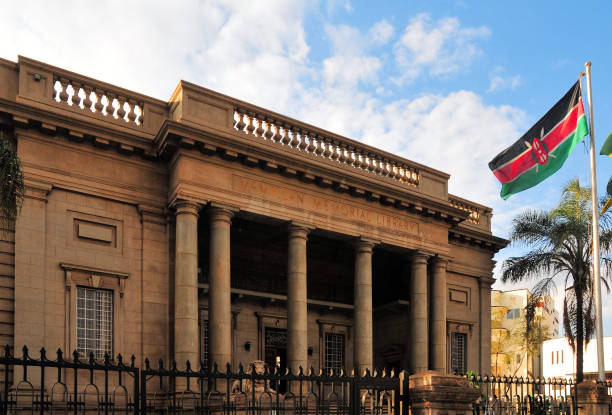
The change, included in amendments to tax laws, would replace the current system, which gives a tax relief of 15 per cent on these contributions.

The National Treasury has proposed that the Housing Levy and Social Health Insurance Fund (SHIF) deductions be made from workers’ gross salaries before taxation, aiming to increase take-home pay for thousands of employees.
The change, included in amendments to tax laws, would replace the current system, which gives a tax relief of 15 per cent on these contributions.
Keep Reading
- How to overcome your tax compliance issues in Africa
- Groconsult: No. 1 Payroll Expert in Africa
- Comprehensive suite of solution for your new market entry
The proposed amendment would end the 15 per cent tax relief applied to the housing levy since March and to the now-defunct National Health Insurance Fund (NHIF) since 2021. Instead, by deducting these levies from gross pay before income tax, employees would see an overall reduction in their tax burden.
Treasury calculations suggest the shift could mean lower monthly taxes for workers, with those earning Sh50,000 saving about Sh318, while employees with monthly salaries of Sh100,000 and Sh500,000 could save Sh637 and Sh3,187, respectively.
The proposal seeks to address concerns that heavy payroll deductions have left some workers with less than a third of their pay after taxes, potentially offering greater relief.
“The Bill proposes to amend the Income Tax Act to provide that the following amounts shall be allowable deductions in the computation of taxable income of individuals: contributions to the Social Health Insurance Fund (SHIF), the amount deducted in accordance with affordable housing, and contributions to a post-retirement medical fund up to Sh15,000,” the Treasury said in a preview of the proposed Tax Laws (Amendment) Bill, 2024, which is expected to be tabled in Parliament soon.
“These amendments will boost disposable income and enhance employees’ take-home pay.”
Payslips concerns
Despite the proposed relief, concerns remain over how recent payroll deductions, including new and increased contributions, continue to impact workers’ earnings.
Last month, employees began paying into SHIF, which replaced NHIF. The revised SHIF rates require employees earning between Sh100,000 and Sh1 million to contribute between Sh1,050 and Sh25,800, making it the largest payroll deduction after income tax.
Additionally, contributions to the National Social Security Fund (NSSF) rose from Sh200 to a maximum of Sh2,160, and a 1.5 per cent housing levy on gross pay, introduced in July last year, has further cut into workers’ earnings.

Global EOR/PEO Solutions: (Entity Establishment (if required), Contractor/Expat Management, Payroll & Tax Compliance, Onboarding & Off boarding Support); Global HR Outsourcing: (Recruitment and Onboarding, Benefits Administration, Performance Management, Training and Development, Compliance, Workforce Planning, Talent Management);
Employers worry that these deductions could leave some workers with less than one-third of their gross pay after meeting other financial obligations, potentially breaching the Employment Act, which restricts deductions to no more than two-thirds of an employee’s salary.
The Federation of Kenya Employers (FKE) noted that the government has not provided guidance on how to handle these deductions while remaining compliant with the law.
As a result, some employers have been restructuring loans to ease the financial pressure on employees, while workers have been reducing voluntary savings in saccos and banks to manage monthly expenses.
Since switching to the SHIF, employees face new monthly deductions, with those earning Sh100,000 paying Sh1,050, while those on Sh200,000 face deductions of Sh3,800. Workers earning Sh450,000, Sh800,000, and Sh1 million face additional costs of Sh10,675, Sh20,300, and Sh25,800, respectively.
The figures push the total mandatory contributions to at least 21.5 per cent of a Sh50,000 salary, 30 per cent for those earning Sh150,000, and above one-third for those making over Sh550,000.
Even before the new SHIF rates, employers observed that monthly deductions were consuming more than two-thirds of workers’ pay, particularly as living costs and loan interest rates reached levels unseen in nearly two decades.
In February, salaried workers began seeing doubled NSSF contributions, now set at Sh2,160, and the 1.5 per cent housing levy continues to cut between Sh750 and Sh15,000 monthly from earnings between Sh50,000 and Sh1 million.
According to the Kenya National Bureau of Statistics (KNBS), 1.28 million Kenyans, or 42 per cent of those in formal employment, earned below Sh50,000 by 2021, while 1.735 million, or 58 per cent, earned Sh50,000 and above. Notably, those earning Sh100,000 or more totaled 371,894 Kenyans.
The recent SHIF contributions have significantly impacted employees with salaries ranging from Sh100,000 to Sh1 million, who now contribute an additional Sh1,050 to Sh25,800 towards the state-backed insurance.
This amount now represents the largest deduction after PAYE for affected employees.
Source: eastleighvoice
Share This:
- GroConsult
- No Comments
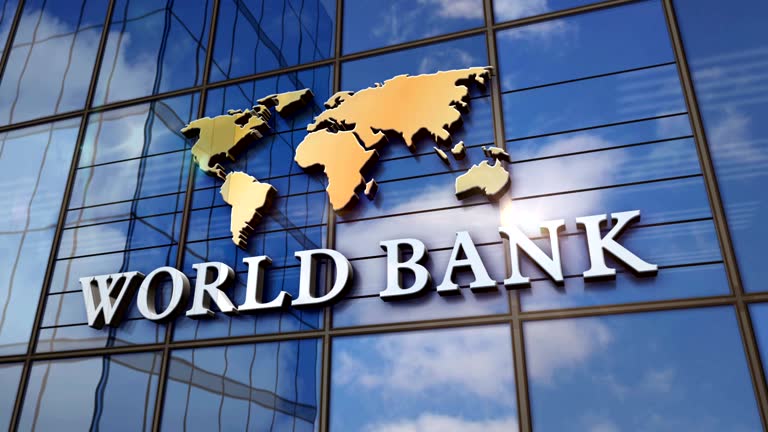
The World Bank has committed $9 billion in agribusiness investments, calling for the creation of a comprehensive global ecosystem as food demand is set to increase by up to 60 per cent.
The call follows the Bank’s observation of four emerging shifts that could reshape the agribusiness landscape such as improving productivity, climate resilience, and providing job security for the world’s 1.2 billion young people in the next decade.
The President of World Bank Group, Ajay Banga, echoed the need for world leaders and development partners to ensure that the opportunities in the agribusiness sector were harnessed for the good of all.
He was speaking on “Agriculture and food as an engine for sustainable growth and jobs,” on Wednesday, at the 2024 International Monetary Fund (IMF)/WBG Annual Meetings in Washington, DC (USA).
The four pivotal shifts – climate finance, private capital flow, advancements in digitalisation, and the linkage between smallholder farmers and large food companies and traders, he said, presented opportunities for reshaping agribusiness.

GroConsult’s payroll services ensure timely, accurate salary processing while staying compliant with local regulations. Our efficient systems minimize errors, reduce administrative burdens, and improve employee satisfaction, giving businesses peace of mind and more time to focus on growth.
“We are combining a new way of working with a new level of investment – doubling our agri-finance and agribusiness commitments to $9 billion annually by 2030.Taking advantage of this opportunity will not happen without a new approach. For us, that change begins today to create a comprehensive ecosystem for agribusiness,” he said.
Mr Banga noted that the Bank had for the past 16 months examined the challenges from every angle – how to increase food production, boost productivity, and resolve issues around water scarcity, fertilizers, infrastructure, and financing.
“It moves us beyond fragmented efforts to a constellation of solutions that includes everything from warehousing to logistics to production, but with smallholder farmers and producer organizations at the centre,” he added.
He stated that with the Bank’s newly simplified Guarantee Platform, there would be a boost in agric and agribusiness transformation, making it easier to deliver tailored solutions to meet the diverse demands of various partners.
“The effort to transform agribusiness is not only about securing the food systems of tomorrow—it is fundamentally a jobs initiative… delivering quality of life and job opportunities,” Mr Banga said.
The provision of jobs, he said had become necessary as in the next 10 years, 1.2 billion young people in developing countries would enter the workforce, with only 420 million jobs projected to be available, leaving nearly 800 million without a clear path to employment.
“We stand at a crossroads, and the path we choose today will determine the future. By transforming agriculture and agribusiness, we can create the food system of tomorrow, raise living standards, and create jobs,” he stated.
“The increase in agricultural productivity—and incomes—will help create jobs, boost revenues, and improve the quality of food and nutrition.
Climate-smart production practices will mean fewer emissions and cleaner air and water. Overall, a better quality of life,” the World Bank President said.
Source: Graphic Business

Unlocking New Investment Opportunities: Groconsult can streamline entry for renewable energy companies seeking to invest in Africa. By handling complex HR and payroll tasks, we will help you reduce overhead and bureaucratic hurdles, making Africa a more attractive destination for clean energy ventures.
Facilitating a Skilled Workforce Transition: As Africa transitions towards a greener economy, Groconsult Management Consortium with over a decade of extensive experience in the Global Consulting Industry can help you bridge the skills gap. We can help you source and manage talent with expertise in renewable energy technologies, project management, and sustainability best practices.
Boosting Knowledge Transfer: With our global networks, we connect African businesses with international talent and expertise. This knowledge transfer can accelerate the adoption of clean technologies and empower African nations to develop their own sustainable energy solutions.
Groconsult: A Catalyst for a Sustainable Future
While Africa has vast oil and gas reserves, the future lies in embracing a diversified and sustainable economic model. GroConsult Management Consortium, by enabling seamless business operations and fostering knowledge exchange, we are a sure powerful catalyst for Africa’s journey towards a greener and more prosperous future.
GroConsult Management Consortium is committed to supporting Africa’s economic transformation. Contact us today to learn how our EOR solutions can empower your business to thrive in the global marketplace.
Share This:
- GroConsult
- No Comments

Thousands of international students expected to study at three Ontario colleges are missing the fall semester, after Ottawa announced it would further tighten Canada’s study permit system.
Some school officials are attributing the dramatic enrollment decline to a chilling effect created by the federal government’s policy, and to visa delays that have resulted from a stricter approach.
Glenn Vollebregt, the president of St. Lawrence College in Kingston, Ont., said his college was expecting 1,600 new international students this fall, but only 775 are enrolled in courses.
“This is not normal,” said Vollebregt, who confirmed many of the students had trouble getting their visas on time, and the college has approved deferral requests for about one-third of the students.
“This is … a direct result of some of the federal policy decisions that we’ve seen take place.”
Last month, Immigration Minister Marc Miller announced he would lower the cap by another 10 per cent, meaning some 300,000 fewer permits would be issued over the next few years. Canada plans a limit of 437,000 study permits in 2025 and 2026.
Vollebregt said the policy means Canada’s brand as an education destination has taken a hit. “Essentially it’s Canada saying we’re closed for business,” he said.
Michael McDonald, director of government relations and policy for Colleges and Institutes Canada, said colleges have expressed deep concerns about a drop in international student enrolments this fall.
“We are expecting sizable declines across our membership,” he said.

At Groconsult, our dedicated team of immigration experts is committed to providing personalized support throughout your immigration journey. We take the time to understand your specific needs and offer tailored solutions that facilitate a smooth transition to life in Ghana and other parts of Africa.
McDonald said he thinks the federal changes have brought uncertainty — both for schools, which rely heavily on international students’ tuition fees, and for potential students, who are deciding whether to come to Canada to continue their studies.
“We think that kind of uncertainty further depresses … enrolments and puts into question a lot of the recruitment efforts,” he said.
Ottawa insists a cap on international students is necessary to bring stability to the country’s ballooning population of temporary residents.
“The annual growth in the number of international students couldn’t be sustained while ensuring students receive the support they need,” said Michelle Carbert, an Immigration Department spokesperson.
“International students are not responsible for the challenges that communities are facing, but the recent skyrocketing growth of this population puts significant pressure on services.”
Carbert said foreign students are encouraged to apply for visas as soon as they get a letter of acceptance from learning institutions to avoid delays.
Mohawk College, which has several campuses in different Ontario cities, welcomed close to 1,500 students from other countries this fall — about 38 per cent fewer than last year, said Katie Burrows, its vice-president for international students.
“This is significant, and it is completely out of the norm,” she said.
She added there is a financial hit that comes from not seeing the expected fees come in. “This year, we can manage it. Going forward, it’s going to be more difficult,” she said.
The college just opened a new 300-bed student residence in downtown Hamilton in anticipation of welcoming more international students, Burrows said — but only 60 students are living there.
She attributed the decrease to several factors, including concerns foreign students have about their future in Canada because of government policy.
Another of the federal changes would affect the availability of work permits for college graduates, which were widely available in the past but will now be restricted to areas that have labour-market shortages in Canada. The change will affect students who apply for permits after Nov. 1.
That has seemingly been the case at Conestoga College, too, which said 1,400 international students deferred their fall programs to the winter semester.
“These deferrals may be the result of visa delays,” said Brenda Bereczki, the executive director of corporate communications at the college.
Brian-Paul Welsh, an immigration consultant at Northern Education Consultants, agreed with the school officials that there are two main factors at play — foreign students rethinking their destinations and “significant” visa delays.
Welsh said Immigration, Refugees and Citizenship Canada had previously come under fire for not reviewing visa applications as carefully as it should have.
That has changed recently, and now every application is being reviewed “quite thoroughly to ensure that they meet the criteria before they give them a successful decision,” he said.
Another layer of bureaucracy could be adding to the time it takes, he said. Ottawa announced in January it would require provinces to issue attestation letters for international students, without which students couldn’t apply for a visa.
Still, Welsh said the larger issue may be the federal government’s policy direction.
Students may be holding back while they wait and see whether the possibility of becoming a permanent resident after their studies is still in the cards, he said.
“The potential benefits might not outweigh what they know it would actually cost,” he said.

Source: GlobalNews
Share This:
- GroConsult
- No Comments

GroConsult helps businesses in Ghana and Africa overcome several key challenges with its tax compliance services:
Navigating complex tax regulations: GroConsult’s experts stay up-to-date with the ever-changing tax laws and regulations in Ghana, simplifying the complexities for businesses. They break down intricate tax rules into easily understandable terms, enabling effective compliance.
Ensuring accurate and timely tax filings: By outsourcing tax compliance to GroConsult, businesses can be confident that their tax returns are filed accurately and on time, minimizing the risk of penalties and fines.
Optimizing tax efficiency: GroConsult provides guidance on maximizing tax efficiency while maintaining full compliance. Their expertise helps businesses fulfill tax obligations in a cost-effective manner.
Avoiding penalties and fines: Failure to adhere to tax regulations can result in severe financial penalties and legal repercussions. GroConsult’s services proactively manage tax obligations, protecting businesses from costly penalties.
Freeing up resources: By outsourcing tax compliance, businesses can redirect their time and resources towards core operations and strategic initiatives, driving growth in Ghana’s competitive business landscape.
Staying updated: GroConsult’s tax compliance services keep businesses informed about the latest tax laws, regulations, and reporting requirements, ensuring they remain compliant as the landscape evolves.
GroConsult’s tax compliance services simplify the complexities, optimize efficiency, and protect businesses from penalties, allowing them to focus on growth while meeting their tax obligations effectively.
How does Groconsult stay updated with changing tax Laws in Ghana

GroConsult stays updated with changing tax laws in Ghana through a combination of proactive strategies and resources.
Firstly, the company maintains a dedicated team of tax professionals who continuously monitor legislative developments and amendments to tax regulations. This team actively engages with local tax authorities, industry associations, and legal experts to ensure they are aware of any changes that may impact their clients.
Additionally, GroConsult leverages reputable sources of information, such as the Ghana Revenue Authority (GRA) and established accounting firms like PwC, which provide regular updates and alerts on new tax laws and amendments. By subscribing to newsletters and alerts from these organizations, GroConsult ensures that it is informed about the latest tax developments, including significant changes like the recent amendments to the Income Tax Act and the introduction of new levies.
Furthermore, GroConsult invests in ongoing training and professional development for its staff. This commitment to education enables the team to understand complex tax issues and apply best practices in compliance, ensuring that clients receive accurate and timely advice.
By combining these strategies, GroConsult effectively navigates the evolving tax landscape in Ghana, allowing it to provide clients with reliable tax compliance services that minimize risks and ensure adherence to current regulations.
How our Payroll Services are tailored to suit different industries

GroConsult tailors its payroll services to different industries by understanding the unique needs and challenges faced by each sector. This customization is achieved through several key strategies:
Industry-Specific Expertise: GroConsult employs professionals with expertise in various industries, allowing them to offer insights and solutions that are relevant to the specific operational contexts of their clients. This ensures that the payroll processes align with industry standards and practices.
Regulatory Compliance: Different industries have distinct regulatory requirements. GroConsult stays updated on the latest labor laws and tax regulations pertinent to each sector, ensuring that their payroll services remain compliant. This is particularly crucial for industries such as finance, healthcare, and telecommunications, where compliance is heavily scrutinized.
Flexible Solutions: The company offers flexible payroll solutions that can be adapted to the size and structure of the organization. Whether a client is a small startup or a large multinational corporation, GroConsult can configure its payroll services to meet the specific needs of the business, including managing multiple pay cycles, varying employee classifications, and different compensation structures.
Integration with Existing Systems: GroConsult’s payroll services can seamlessly integrate with existing HR and accounting systems, which is essential for businesses in sectors that rely on sophisticated technology platforms. This integration helps streamline processes, reduce errors, and improve overall efficiency.
Comprehensive Reporting and Analytics: Understanding that different industries require different metrics, GroConsult provides customizable reporting options. Clients can access industry-specific reports that offer insights into payroll costs, employee performance, and compliance status, enabling informed decision-making.
Support for Global Operations: For businesses operating in multiple countries, GroConsult offers payroll services that cater to international regulations and practices. This is particularly beneficial for companies in industries such as technology and manufacturing, where global talent acquisition is essential.
Focus on Employee Experience: Recognizing that payroll is a critical aspect of employee satisfaction, GroConsult tailors its services to enhance the employee experience. This includes timely payments, clear communication regarding payroll processes, and support for employee inquiries.
By combining industry knowledge, regulatory expertise, and a commitment to client satisfaction, GroConsult effectively tailors its payroll services to meet the diverse needs of different industries, helping clients navigate the complexities of payroll management with confidence.
Share This:
- GroConsult
- No Comments

(Bloomberg) — UK business groups warned the country’s new Labour government against raising a key tax on employers after Prime Minister Keir Starmer and Chancellor of the Exchequer Rachel Reeves both signaled a hike is being considered at the budget later this month.
Executives on Tuesday warned that raising the payroll tax — known as national insurance — would hurt economic activity, with a particular impact on the retail and hospitality sectors. That came after both Starmer and Reeves suggested their electoral promise not to raise NI applied only to the component paid by workers, and not to the rate levied on employers.
“It would be a really damaging way to raise the money,” Neil Carberry, chief executive officer of the Recruitment and Employment Confederation, told Bloomberg Radio. “National Insurance isn’t a tax on profits. It’s a tax on activity. It falls most heavily on labor-intensive firms. Those tend to be retailers, hospitality, health firms, consumer-facing businesses,” he added, describing the proposal as a “real challenge” for high streets.
The push-back illustrates the difficult decisions Reeves faces as she seeks to use her budget to plug what she’s called a £22 billion ($29 billion) void in the public finances this year, without holding back growth or breaking election manifesto commitments ruling out rises on “working people” to income tax, national insurance and value-added tax — the Treasury’s main revenue-raisers.

While Labour could expect to face claims from the opposition Tories that doing so would contradict its manifesto wording, government officials argue the document left enough leeway to raise the payroll tax for businesses. Moreover, the Tories attacked Labour during the campaign for not ruling out a rise in NI for employers.
Reeves has said that tax rises are coming at her Oct. 30 budget, and she and Starmer this week have given their strongest indication yet that they are considering increasing the business component of the payroll tax.
“We were very clear in the manifesto that we wouldn’t be increasing tax on working people,” the premier told BBC TV on Tuesday, when asked if the election commitment on national insurance applied to employers as well as employees.
The premier’s language was a repeat of what Reeves told reporters at an international investment summit hosted in London on Monday, and will be seen as a clear hint that the government is considering the move.

Lifting the main employer rate of national insurance by one percentage point would raise £8.45 billion in the 2025-26 financial year, according to estimates published by His Majesty’s Revenue and Customs.
“If we see a rise in national insurance contributions paid by employers, that’s going to increase the cost of taking someone on, of creating a job, and that will make it more difficult for businesses,” Rain Newton-Smith, director-general of the Confederation of British Industry, told BBC radio on Tuesday. She said such a rise would in particular affect firms “who are creating a lot of jobs across our hospitality sector, our hotels, our pubs.”
That view was backed up by Kate Nicholls, chief executive of UK Hospitality. “An increase would particularly hammer sectors like hospitality, where staffing costs are the biggest business expense,” she said. “Hospitality businesses are much less able to stomach yet another cost increase, when they’re already managing increases in other areas like wages, food, drink and energy.”
Meanwhile Craig Beaumont, executive director at the Federation of Small Businesses, told Bloomberg that such a tax rise would fall hardest on the UK’s one million small employers.
“It’s these who create local jobs and take on those furthest from the labor market,” Beaumont said. “A hike would mean less growth, an acceleration of the dip in jobs we are seeing in UK small businesses, and downward pressure on pay and pension contributions – all directly hitting working people.”
Newton-Smith also flagged potential consequences for economic growth and the money the Treasury has to fund Britain’s already-stretched public services. “If those overall increases in costs of hiring aren’t matched by higher productivity, then it makes it harder for businesses to create the jobs and the growth that we need to really fund our public services,” she said.
Source: Bloomberg
Share This:
- GroConsult
- No Comments

GroConsult sets itself apart from other payroll service providers in Ghana through several distinctive features and approaches that enhance the value it offers to clients.
Firstly, GroConsult emphasizes a comprehensive service model that goes beyond standard payroll processing. Their offerings include payroll management, tax compliance, immigration support, and audit services, allowing clients to access a full suite of solutions under one roof. This integrated approach simplifies operations for businesses, as they can rely on a single provider for multiple needs.
Secondly, GroConsult prides itself on industry-specific expertise. The company employs professionals with deep knowledge of various sectors, enabling them to tailor payroll solutions that meet the unique requirements of different industries. This specialization ensures that clients receive relevant advice and services that align with their operational contexts, which is often lacking in more generalized payroll service providers.

Additionally, GroConsult focuses on technology integration within its payroll services. By utilizing advanced payroll software, they enhance accuracy and efficiency, ensuring timely payments and compliance with local regulations. This technological edge allows for seamless reporting and data management, which is crucial for businesses aiming to make informed decisions.
Moreover, GroConsult’s commitment to client education and support sets it apart. They provide ongoing training and resources to help clients navigate the complexities of payroll and tax compliance. This proactive approach empowers businesses to stay informed about regulatory changes and best practices, reducing the risk of non-compliance.
Lastly, GroConsult has built a reputation for exceptional customer service. Their dedicated support team is readily available to address client inquiries and concerns, fostering strong relationships and trust. This level of personalized attention is often a differentiator in the competitive payroll service market.
GroConsult distinguishes itself from other payroll service providers in Ghana through its comprehensive service offerings, industry-specific expertise, technology integration, commitment to client education, and exceptional customer service. These factors combine to create a robust payroll solution that meets the diverse needs of businesses in the region.
What are the Benefits of Outsourcing Payroll to Groconsult

As a leading provider of HR and business management solutions, we’re here to empower your business with tailored services that drive growth, enhance compliance, and simplify global workforce management.
Outsourcing payroll to GroConsult Management Consortium offers several key benefits for businesses in Ghana:
Expertise and Accuracy
GroConsult has dedicated payroll experts who stay up-to-date with the latest labor laws, taxation, and compliance requirements in Ghana. This specialized knowledge ensures fewer errors and avoids potential fines.
Compliance Assurance
GroConsult provides fully compliant PAYE support and stays abreast of legislative changes, mitigating the risk of penalties or legal issues for your business. Their expertise in tax regulations and compliance across Ghana and globally helps maintain a high level of credibility for your organization.
Cost and Time Savings
Outsourcing payroll to GroConsult is cost-effective, as it turns fixed overhead costs into variable costs. It saves substantial time for clients that can be reinvested into other business functions. GroConsult’s automated solutions provide a quicker and more cost-effective payroll process without compromising quality.
Scalability
As your business grows, GroConsult can adapt to changing payroll needs, whether you’re hiring more employees or expanding to new regions in Ghana. Their scalable and flexible working relationships help ensure a smooth flow of information between all parties involved.
Employee Satisfaction
Timely and accurate payments are crucial for employee morale. GroConsult’s specialized tools and knowledge ensure prompt and correct payments, enhancing employee trust and productivity.
Data Security
GroConsult invests in robust security measures to safeguard sensitive payroll data, reducing the risk of data breaches compared to managing payroll in-house. They store employee information in a secure, centralized location.
By outsourcing payroll to GroConsult, businesses in Ghana can benefit from their expertise, compliance assurance, cost and time savings, scalability, employee satisfaction, and data security, ultimately allowing them to focus on core business objectives.
Share This:
- GroConsult
- No Comments


As a multinational business solutions provider with over a decade of experience, GroConsult Management Consortium is dedicated to helping businesses thrive. We offer a variety of services and leverage our expertise to be a leading force in the industry.
Ghana’s petroleum sector has emerged as a significant player in the African energy landscape, especially following the discovery of oil in commercial quantities in 2007. With refined petroleum products dominating imports and gold leading exports, the country presents a vibrant market for international companies looking to establish or expand their operations in the oil and gas industry. As the market continues to grow, GroConsult is here to provide essential support services for businesses venturing into this dynamic sector.
The Current Landscape of Ghana’s Petroleum Market
According to recent trade statistics, Ghana’s total import bill reached GH¢58.8 billion in the second quarter of 2024, with refined petroleum products accounting for a substantial portion. Gas oil and motor spirit super alone contributed GH¢14.5 billion to this figure. The country’s total trade value was GH¢123 billion, highlighting a trade surplus of GH¢5.4 billion—a significant turnaround from a deficit recorded in the previous year.
Ghana’s primary trade partners are predominantly Asian countries, with China being the largest source of imports, contributing GH¢12.3 billion. This shift towards Asia indicates a growing opportunity for businesses from these regions to tap into Ghana’s burgeoning petroleum market.
Why Choose GroConsult?
As a seasoned partner in human resource management and Employer of Record (EOR) services, GroConsult offers tailored solutions that address the unique challenges faced by companies operating in Ghana’s petroleum sector. Here are some key benefits of partnering with us:
1. Seamless Compliance with Local Regulations
Navigating the complexities of local labor laws and regulations can be daunting for foreign companies. GroConsult ensures that your operations comply with all legal requirements, including employment contracts, payroll management, and benefits administration. Our expertise minimizes risks associated with non-compliance, allowing you to focus on your core business activities.
2. Streamlined Recruitment and Onboarding
The success of your operations hinges on attracting and retaining top talent. GroConsult specializes in recruitment strategies tailored to the local market, ensuring you find qualified professionals who fit your organizational culture. Our onboarding process is designed to integrate new hires smoothly, providing them with essential training and support to thrive in their roles.
3. Local Expertise and Support
Understanding local customs and business practices is crucial for successful integration into Ghana’s petroleum industry. GroConsult provides localized support that helps expatriates acclimate to their new environment, offering cultural orientation and insights into effective communication within the workplace.
4. Comprehensive Payroll and Benefits Administration
Managing payroll and employee benefits can be complex, especially when dealing with multiple currencies and regulatory requirements. GroConsult simplifies this process by handling all aspects of payroll management, ensuring timely payments while providing competitive benefits packages that meet local standards.
5. Risk Mitigation
Entering a new market always comes with inherent risks. By outsourcing your HR functions to GroConsult, you mitigate potential risks associated with employment management and compliance issues. Our dedicated team monitors changes in regulations, ensuring that your business remains compliant at all times.
Opportunities for Growth
The Ghanaian government is actively promoting investment in its petroleum sector through various initiatives aimed at enhancing local participation and infrastructure development. With plans for new oil blocks and increasing domestic refining capacity through projects like the Petroleum Hub Development Corporation (PHDC), there are ample opportunities for companies looking to invest in this sector.
Moreover, as Ghana seeks to maximize its oil and gas resources across its shoreline—from Cape Three Points in the west to Keta in the east—there is significant potential for collaboration between local firms and international players.
Ghana’s petroleum industry is ripe with opportunities for growth and expansion. As an international company looking to navigate this dynamic landscape, partnering with GroConsult will provide you with the necessary support to ensure compliance, streamline operations, and foster successful integration into the local market.
Whether you are exploring new ventures or seeking reliable EOR services for your existing operations, GroConsult is here to help you thrive in Ghana’s vibrant petroleum sector. Let us handle your HR needs so you can focus on driving your business forward in this exciting market!
We have fully controlled branches in Ghana, Nigeria, Ivory Coast, Liberia, Cameroon, Sierra Leone, with a network of partner offices across Africa backed by experienced and passionate professionals. We also have an operational presence in the United Kingdom, Canada and United Arab Emirates.
Share This:
- GroConsult
- No Comments

Ghana’s import market continues to be dominated by refined petroleum products, with gas oil and motor spirit super accounting for a quarter of the total import bill in the second quarter of the year.
Out of the country’s total import bill of GH¢58.8, gas oil accounted for GH¢7.3 billion, with motor spirit super accounting for GH¢7.2 billion.
Presenting the international trade statistics for the second quarter of 2024, Government Statistician, Professor Samuel Kobina Annim, said the country’s total trade value was GH¢123.0 billion, with exports totaling GH¢64.2 billion and imports totaling GH¢58.8 billion.
This led to a trade surplus of GH₵5.4 billion, marking a reversal from a deficit of GH¢3.1 billion recorded in the same period in 2023.

Let GroConsult manage your payroll, benefits administration, and immigration needs so you can excel in your position and make meaningful contributions to your organization. Partner with us today for peace of mind and a successful transition into your professional journey in Africa!
Trade partners
He said the data indicated that Asia remains Ghana’s leading trade partner, contributing over half of the country’s imports and nearly half of its exports in the period under review.
“Between the second quarter of 2023 and second quarter of 2024, the share of imports from Europe declined by 7.5 per cent, while imports from Asia increased substantially by 8.5 per cent,” he said.
He said Gold bullion led Ghana’s exports with a value of GH¢37.0 billion, accounting for 57.6 per cent of total exports.
Other major exports included crude petroleum (GH¢12.6 billion) and cashew nuts (GH₵1.2 billion).
Top export destination
The United Arab Emirates (UAE) remained Ghana’s top export destination, accounting for GH¢15.0 billion, representing 23.3 per cent of total exports.
Switzerland followed closely with exports valued at GH¢13.2 billion representing 20.5 per cent, while South Africa ranked third, with exports amounting to GH₵8.3 billion (12.9%).
China remained the primary source of Ghana’s imports, contributing GH¢12.3 billion (20.9% of total imports), followed by the UAE with a value of GH¢9.1 billion (15.4%) and the United Kingdom with an import value of GH¢5.2 billion (8.8%).
Prof Annim said the Export and Import Unit Value Indices (UVIs) revealed price shifts in key commodities, adding that export prices recorded a 40.5 per cent year-on-year increase, driven largely by surging gold prices while import prices increased by 18.9 per cent.
“In the computation of nominal and real trade values, we have denominated it in cedis. The more than doubling of the nominal values were from GH¢46.3 billion around the second quarter of 2021 to the current figure of GH¢123 billion, so we have adjusted for price changes from a cedi-denominated perspective,” he said.
Source: Graphic Business
By outsourcing HR functions to GroConsult, companies can concentrate on their core business activities rather than getting bogged down by administrative tasks related to employment management. This allows for better resource allocation and strategic focus on growth initiatives.
Share This:
- GroConsult
- No Comments

In today’s globalized economy, businesses are increasingly expanding their operations across borders, leading to a diverse workforce that spans multiple countries and cultures. As companies venture into new markets, the challenges of recruitment and onboarding become more complex. This is where GroConsult excels, providing tailored solutions that streamline the recruitment and onboarding processes for international companies. By leveraging our expertise, we ensure that organizations can effectively integrate new hires into their teams, regardless of geographical boundaries.
Understanding the Importance of Effective Recruitment and Onboarding
Recruitment and onboarding are critical components of human resource management that significantly impact employee satisfaction, retention, and overall organizational performance. Effective recruitment ensures that the right talent is selected to meet the company’s needs, while a well-structured onboarding process facilitates a smooth transition for new employees into their roles.
The Challenges of International Recruitment
International recruitment presents unique challenges that require specialized knowledge and strategies. Some of the key challenges include:
Cultural Differences:
Understanding cultural nuances is essential for attracting candidates who will fit well within the organization. Different countries have varying expectations regarding communication styles, work ethics, and professional conduct.
Legal Compliance:
Each country has its own labor laws and regulations governing employment practices. Ensuring compliance with these laws is crucial to avoid legal penalties and protect the organization’s reputation.
Logistical Issues:
Coordinating recruitment efforts across multiple time zones can complicate scheduling interviews and managing candidate communications.
Language Barriers:
Language differences can hinder effective communication during the recruitment process, making it essential to have multilingual support.
The GroConsult Approach to Recruitment
At GroConsult, we take a holistic approach to international recruitment by combining local expertise with global best practices. Our process includes:
1. Market Research and Analysis
Before initiating the recruitment process, we conduct thorough market research to understand the local labor market dynamics. This includes identifying key skills in demand, salary benchmarks, and potential challenges in attracting talent. By understanding these factors, we can tailor our recruitment strategies to align with local expectations.
2. Tailored Recruitment Strategies
GroConsult develops customized recruitment strategies that resonate with local candidates. This may involve:
Localized Job Postings: We utilize local job boards and social media platforms to reach potential candidates effectively.
Employer Branding: We help companies build a strong employer brand that highlights their values, culture, and benefits to attract top talent.
Networking Events: Organizing or participating in industry-specific events allows us to connect with potential candidates in person.
3. Comprehensive Candidate Screening
To ensure that we select the best candidates for our clients, GroConsult employs a rigorous screening process that includes:
Behavioral Interviews: We assess candidates not only on their technical skills but also on their cultural fit within the organization.
Skill Assessments: Depending on the role, we may conduct practical assessments or tests to evaluate candidates’ competencies.
Reference Checks: We perform thorough reference checks to verify candidates’ employment history and performance.
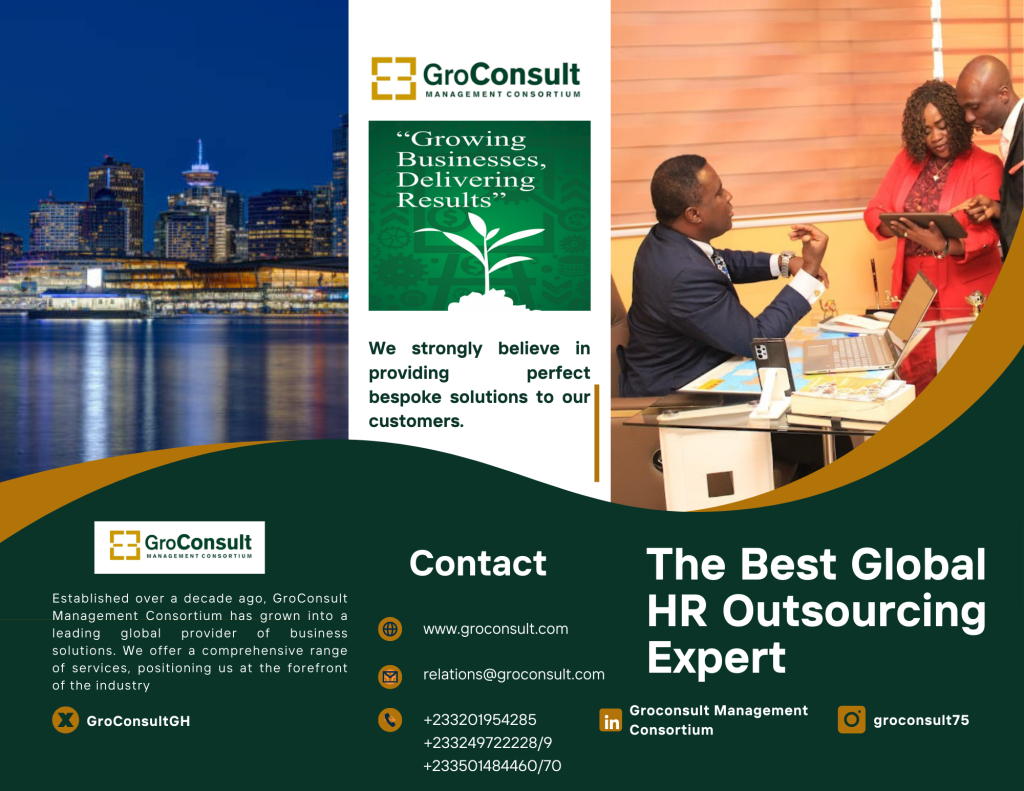
Streamlined Onboarding Process
Once candidates are selected, GroConsult ensures a seamless onboarding experience that integrates new hires into the company effectively. Our onboarding process consists of several key components:
1. Preboarding Initiatives
Preboarding is an essential step in preparing new hires for their first day. During this phase, we focus on:
Providing Necessary Equipment: We coordinate the delivery of work equipment such as laptops and software access before the official start date.
Documentation Completion: New hires complete essential paperwork related to payroll, benefits enrollment, and compliance documentation ahead of time.
Welcome Packages: Sending welcome packages containing company swag, resources, and a personalized welcome letter helps new hires feel valued from day one.
2. Cultural Orientation
Understanding company culture is vital for new employees’ success. GroConsult facilitates cultural orientation sessions that cover:
Company Values and Mission: New hires learn about the organization’s core values and how they align with their roles.
Local Customs and Practices: We provide insights into local customs and workplace etiquette to help international employees acclimate smoothly.
3. Role-Specific Training
To ensure new hires are fully prepared for their roles, we implement comprehensive training programs tailored to specific job functions:
Mentorship Programs: Assigning mentors or buddies helps new hires navigate their roles more effectively by providing guidance and support.
Training Modules: Customized training modules cover essential skills required for success in each position.
4. Integration with Technology
In today’s digital age, technology plays a crucial role in enhancing the onboarding experience:
HR Management Systems: GroConsult utilizes advanced HR software that streamlines onboarding workflows, tracks progress, and manages documentation efficiently.
Communication Tools: We implement digital platforms (e.g., Slack or Microsoft Teams) to facilitate communication among team members and ensure new hires feel connected from day one.
Compliance Assurance
Compliance with local labor laws is a top priority during both recruitment and onboarding processes:
1. Legal Documentation
GroConsult manages all necessary legal paperwork related to employment contracts, work permits, and visas. This ensures that all hires are compliant with local laws from the outset.
2. Ongoing Compliance Monitoring
As regulations can change frequently, we continuously monitor local labor laws to ensure ongoing compliance for both the organization and its employees.
Continuous Support and Feedback
GroConsult believes in maintaining open lines of communication throughout the onboarding process:
1. Regular Check-ins
We schedule periodic meetings with new hires to address any concerns they may have during their transition. This feedback loop helps us refine our processes while ensuring employees feel supported.
2. Engagement Strategies
To foster engagement from day one, we encourage participation in team-building activities and social events that help new hires build relationships within the organization.
GroConsult is committed to providing international companies with comprehensive recruitment and onboarding solutions that enhance employee satisfaction and retention while ensuring compliance with local regulations. Our tailored approach combines market research, localized strategies, streamlined processes, technology integration, compliance assurance, and continuous support—all designed to create a positive experience for new hires from day one.
As businesses expand globally, partnering with an expert like GroConsult can make all the difference in successfully navigating the complexities of recruitment and onboarding in diverse markets. By leveraging our expertise in international HR management, organizations can focus on their core business objectives while we handle the intricacies of integrating new talent into their teams seamlessly.
If you’re ready to enhance your recruitment and onboarding processes or explore how GroConsult can support your international growth strategy further, contact us today! Let’s work together to build a thriving workforce that drives your business forward in today’s competitive landscape.

Share This:
- GroConsult
- No Comments

GroConsult’s payroll and tax compliance services stand out in several key ways that make them unique and beneficial for businesses.
First and foremost, GroConsult offers a comprehensive approach that ensures clients remain compliant with local and national regulations. This is crucial in a landscape where tax laws and payroll regulations can frequently change. By staying updated on these changes, GroConsult helps businesses avoid costly penalties and legal issues that can arise from non-compliance.
Another distinctive feature is the personalized service that GroConsult provides. The team works closely with clients to understand their specific needs and challenges, offering tailored solutions that fit their unique circumstances. This client-centric approach not only enhances the quality of service but also builds strong, trusting relationships.
Additionally, GroConsult integrates technology into its payroll processes, utilizing advanced software that streamlines payroll management. This integration ensures accuracy in calculations, timely payments, and efficient reporting, allowing businesses to focus on their core operations without the stress of managing payroll complexities.
Furthermore, GroConsult’s experience in managing payroll for both local and international companies adds a layer of expertise that is invaluable for businesses operating in multiple jurisdictions. Their understanding of various labor laws and tax implications across different regions enables them to provide informed guidance to clients expanding their operations.
Finally, GroConsult’s commitment to providing ongoing support and resources, such as training and compliance updates, empowers clients to stay informed and proactive in their payroll and tax management. This dedication to continuous improvement and education sets GroConsult apart as a leader in payroll and tax compliance services.
In summary, GroConsult’s unique blend of comprehensive compliance, personalized service, technological integration, international expertise, and ongoing support makes its payroll and tax compliance services a valuable asset for businesses seeking to navigate the complexities of payroll management effectively.

Connect with us: LINKEDIN, INSTAGRAM, X and YOUTUBE for latest updates
Share This:
- GroConsult
- No Comments

In a significant development for Africa’s economic future, the African Capacity Building Foundation (ACBF), the leading institution for capacity development in Africa, and the African Tax Administration Forum (ATAF), the continent’s premier authority in tax matters, have signed a Memorandum of Understanding (MoU).
This MoU marks a critical step towards strengthening Africa’s tax systems by enhancing capacity building initiatives for domestic resource mobilization and supporting sustainable development in Africa.
Under this MOU, ACBF will provide expertise in leadership development, capacity building, and institutional strengthening through its Institutional Accelerator Model (IAM), in support of the public financial management system in Africa, drawing from its extensive experience in building human capital and institutional capacity for Africa’s sustainable development.
ATAF will provide expertise in tax administration, policy, and legislation, building on its proven track record of enhancing African tax systems.
“Strengthening domestic resource mobilization is fundamental to any robust global public financial management system. ACBF remains dedicated to collaborating with African nations to support these critical development areas. Our strategic partnership with ATAF, recognized as the leading authority on taxation in Africa, will significantly enhance and complement ACBF’s ongoing efforts to strengthen the capacity of African countries to finance their development priorities.” said Mr. Mamadou Biteye, Executive Secretary of ACBF.
By combining expertise and resources, ACBF and ATAF will support African countries in building robust tax systems, ultimately contributing to improved domestic resource mobilization and sustainable development. This partnership will focus on key initiatives, including capacity building programs for senior tax administration and policy leaders, developing organizational assessment tools, and promoting best tax capacity building practices. Additionally, the collaboration will facilitate research and knowledge sharing on tax policy and administration, ensuring that African countries receive comprehensive support in building effective tax systems. These initiatives will form the backbone of our joint efforts.
“This MoU marks a significant step in advancing Africa’s tax systems and supporting the broader mandate of ATAF towards effective and sustainable tax administrations. By combining ATAF’s experience and expertise in tax matters with ACBF’s capacity-building expertise, this partnership will strengthen our collective efforts to enhance domestic resource mobilization and improve fiscal management across the continent. Through this collaboration, we aim to build a more robust tax infrastructure that equips African nations to meet future challenges and support sustainable development.” commented Mr. Logan Wort, ATAF Executive Secretary.
With this MoU, ACBF and ATAF are committed to a long-term goal of significantly improving the efficiency and effectiveness of Africa’s taxation architecture. This commitment is a testament to our belief in the potential of African leaders and institutions to drive inclusive growth and sustainable development on the continent. We are optimistic about this partnership’s positive impact on increased domestic resource mobilization and sustainable development.
Source: Daily Observer

WHAT MAKES GROCONSULT’S PAYROLL AND TAX COMPLIANCE SERVICES UNIQUE
GroConsult’s payroll and tax compliance services stand out in several key ways that make them unique and beneficial for businesses.
First and foremost, GroConsult offers a comprehensive approach that ensures clients remain compliant with local and national regulations. This is crucial in a landscape where tax laws and payroll regulations can frequently change. By staying updated on these changes, GroConsult helps businesses avoid costly penalties and legal issues that can arise from non-compliance.
Another distinctive feature is the personalized service that GroConsult provides. The team works closely with clients to understand their specific needs and challenges, offering tailored solutions that fit their unique circumstances. This client-centric approach not only enhances the quality of service but also builds strong, trusting relationships.
Additionally, GroConsult integrates technology into its payroll processes, utilizing advanced software that streamlines payroll management. This integration ensures accuracy in calculations, timely payments, and efficient reporting, allowing businesses to focus on their core operations without the stress of managing payroll complexities.
Furthermore, GroConsult’s experience in managing payroll for both local and international companies adds a layer of expertise that is invaluable for businesses operating in multiple jurisdictions. Their understanding of various labor laws and tax implications across different regions enables them to provide informed guidance to clients expanding their operations.
Finally, GroConsult’s commitment to providing ongoing support and resources, such as training and compliance updates, empowers clients to stay informed and proactive in their payroll and tax management. This dedication to continuous improvement and education sets GroConsult apart as a leader in payroll and tax compliance services.
In summary, GroConsult’s unique blend of comprehensive compliance, personalized service, technological integration, international expertise, and ongoing support makes its payroll and tax compliance services a valuable asset for businesses seeking to navigate the complexities of payroll management effectively.
Share This:
- GroConsult
- No Comments

AUC & GABI Partner to Boost Intra-African Trade
Key Initiatives to Advance Trade Investment Across Africa
Advance trade investment in Africa as AUC and GABI unite to boost regional integration, innovation, and economic growth across the continent. The African Union Commission (AUC) and the Global Africa Business Initiative (GABI), an initiative of the United Nations (UN) Global Compact, have renewed their commitment to advancing development across the African continent.
This follows the signing of letters of intent, marking a significant step towards strengthening the bond and realising the mutual goals of the two institutions.
The institutions have, over the past two years, been working together, harnessing the continent’s potential by promoting investments in trade and business opportunities.
The signing of the letters of intent is to, therefore, strengthen collaboration between the two parties and advance mutual goals in the AU 2024 Agenda for education and GABI’s 2024 themes, as well as the broader and longer term partnership towards the achievement of the AU Agenda 2063 and the Sustainable Development Goals (SDG).
The signing of the letters of intent occurred on the sidelines of the AU Sixth Mid-Year Coordination Meeting, in Accra, over the weekend.
Madam Tolulope Lewis Tamoka, Chief of Intergovernmental Relations and Africa, UN Global Compact, signed on behalf of GABI, while Mr Albert M. Muchanga, Commissioner for Trade and Industry of the AUC, signed on behalf of the Commission.

Present at the signing ceremony were Madam Fatima Kyari Mohammed, AU Permanent Observer Mission to the UN; Dr Benedict Okeychukwu Oramah, President and Chairman of the Board of Directors, African Export–Import Bank (Afreximbank) and Mr Charles Abani, UN Resident Coordinator to Ghana.
Speaking at the event, Madam Fatima Mohammed, AU Permanent Observer Mission to the UN, described the signing of the letters of intent as a significant milestone which would solidify Africa’s “strong working relations with the UN” and also institutionalise the GABI, which had become a huge platform for foreign engagement with the private sector.
She called for deliberative actions in all sectors of the African economy, particularly with the private sector, to ensure the achievement of set out goals.
Madam Fatima noted that the private sector played a crucial role in driving economic growth, creating jobs and fostering innovations across the continent.
Leveraging opportunities within the sector towards achieving Agenda 2063 and the SDGs, she said, therefore, required strategic and deliberate actions.
“We need to be deliberate in our actions to be inclusive to ensure all sectors of the society benefit in order for growth to be sustainable. We need to be deliberate when it comes to investment and focused in ensuring human capital development for education, and trading as well as investment in healthcare and critical infrastructure.
“We need to be deliberate in strengthening our institutions to ensure a conducive environment for businesses to thrive and we need to be deliberate in our efforts to achieving regional integration, facilitating trade and investment across Africa borders through initiatives such as the Africa Continental Free Trade Area (AfCFTA),” she stressed.
Mr Muchanga, AUC Commissioner of Trade and Industry, expressed excitement about the signing of the letters of intent, saying it would consolidate engagement between the two parties and ensure prosperity for the continent.
He also reaffirmed the Commission’s commitment to collaborating with the UN towards achieving a common goal, adding that it was ready to ensure full implementation of the letters of intent.
“We are committed to implementing the letters of intent that we have signed.”
Dr Oramah, President and Chairman of the Board of Directors, African Export–Import Bank (Afreximbank), said the Bank was “proud to be firm supporter of the initiative”.
He said as a Bank, it believed in the African global movement, saying “any initiative that brings all of us together is a positive one for the continent of Africa.”
Mr Charles Abani, UN Resident Coordinator to Ghana, also highlighted the importance of the private sector in achieving the AU 2063 agenda and the SDGs.
On the Agenda 2063 of the AU and the SDGs, he identified six areas as critical to achieving the targets.
This include working on food systems; improving accessibility, efficiency and affordability of energy; digital transformation and the opportunities; leveraging the private sector for jobs, creativity and strong social protection; education and addressing climate change.
Global Africa Business Initiative, also known as GABI, is the premier private-sector led global platform that galvanises African and global private and public sector leaders to amplify and accelerate Africa’s “unstoppable business, trade and investment opportunities” for Africa and the world.
GABI’s goal is to position Africa as the world’s premier business, trade and investment destination and reshape Africa’s global narrative.
Source: GNA
Share This:
- GroConsult
- No Comments

Ghana’s state-owned Petroleum Hub Development Corp. and a consortium of private-sector partners have broken ground on the first phase of the subregion’s first integrated downstream petroleum hub.
Ghana’s state-owned Petroleum Hub Development Corp. (PHDC) and a consortium of private-sector partners have formally broken ground on the previously announced first phase of the West African subregion’s first integrated downstream petroleum hub (OGJ Online, Aug. 12, 2024).
A groundbreaking ceremony for the multiphased megaproject’s Phase 1—including a 300,000-b/sd refinery, a petrochemical plant, and extensive storage and port installations—took place on Aug. 19 in Nawule, Jomoro, in Ghana’s Western Region, the office of Ghanaian President Nana Addo Dankwa Akufo-Addo said in an official release.
“This project promises to be a cornerstone of our nation’s development, ensuring that all Ghanaian homes and industries have access to reliable, affordable, and environmentally sustainable energy,” Akufo-Addo said at the event, stressing the development’s strategic importance in Ghana’s plan to increase domestic refining capacity and ensure a diversified, efficient, and financially stable national energy economy.
In addition to its alignment with global environmental sustainability standards, the hub is designed to become a benchmark for crude and petroleum product pricing in Africa, as well as a site that will complement rather than compete with existing refineries in the region by focusing on serving the African Continental Free Trade Area (AfCFTA) market, Akufo-Addo said.

In tandem with formal groundbreaking, Akufo-Addo also announced Ghana’s Ministry of Finance has allocated 200 million cedis (about $12.8 million) as land compensation for affected communities within the Jomoro district in gratitude to tribal chiefs and peoples within those areas offering their lands for the hub’s construction.
Additionally, Akufo-Addo additionally revealed plans to establish the Jomoro Petroleum Hub Development Corp. (JPHDC)—which would have headquarters in Jomoro—and directed the Ministry of Energy to ensure the training of 200,000 skilled, semi-skilled, and unskilled Ghanaians in preparation for the project’s takeoff, with a large portion of these workers to come directly from the Jomoro area.
Akufo-Addo also assured the consortium—which includes several international and local partners—the Ghanaian government’s full support for development of the hub that—funded solely by private-sector investors from across the international petroleum value chain—is anticipated to create about 780,000 direct and indirect jobs in the region, stabilize the national currency, and stimulate local economic development.
Overseen by PHDC and under development by a consortium comprised of Touchstone Capital Group Holdings Ltd., UIC Energy Ghana Ltd., China Wuhan Engineering Co. Ltd., and China Construction Third Engineering Bureau Co. Ltd., Phase 1 of the PHDC hub will be situated across 6,590.8 acres abutting the Gulf of Guinea located within the southern section of a total 20,000-acre tract of land PHDC acquired for the entire hub’s development in the Jomoro municipal district, according to official project documents.
In addition to its planned 300,000-b/sd refinery, Phase 1 will also involve construction of a 90,000-b/sd petrochemical plant, storage tanks with total capacity of 3 million cu m, as well as jetty and marine port infrastructure.
Designated as a free-zone area, the PDHC hub, once completed, will feature an overall crude oil processing capacity of at least 900,000 b/sd spread across three new 300,000-b/d refineries, each of which can be expanded to 500,000 b/sd between 2030 and 2035 for an overall processing capacity of 1.5 million b/sd. Each of the project’s three phases will include a new refinery.
PDHC has allotted 750 acres for construction of each refinery, and the three refineries will be able to source their feedstock from Ghana or abroad.
The hub ultimately will include five multi-purpose petrochemical plants, each with a capacity to produce 90,000 b/sd of chemicals, as well as fertilizers, lubricants, and cosmetics. Three of the plants will use natural gas as feedstock, with two plants processing crude-derived byproducts from the site’s refineries. Following construction of the hub’s first petrochemical plant in Phase 1, Phases 2 and 3 will add two new plants each.
While neither PDHC nor member companies of the first-phase consortium have revealed detailed project responsibilities or timelines, PDHC said it will execute the entirety of the industrial hub in three phases between 2024 and 2036 at an overall estimated cost of about $60 billion.
Source: Oil & Gas Journal
Share This:
- GroConsult
- No Comments

EU Accelerates Investment in West Africa for Stronger Economic Ties
The European Union is significantly ramping up its trade and investment in West Africa, signaling a transformative phase in the region’s economic landscape. As global markets evolve and strategic partnerships take center stage, the EU’s renewed focus on fostering deeper commercial ties with West African nations is set to unlock new growth opportunities, strengthen regional infrastructure, and support sustainable development
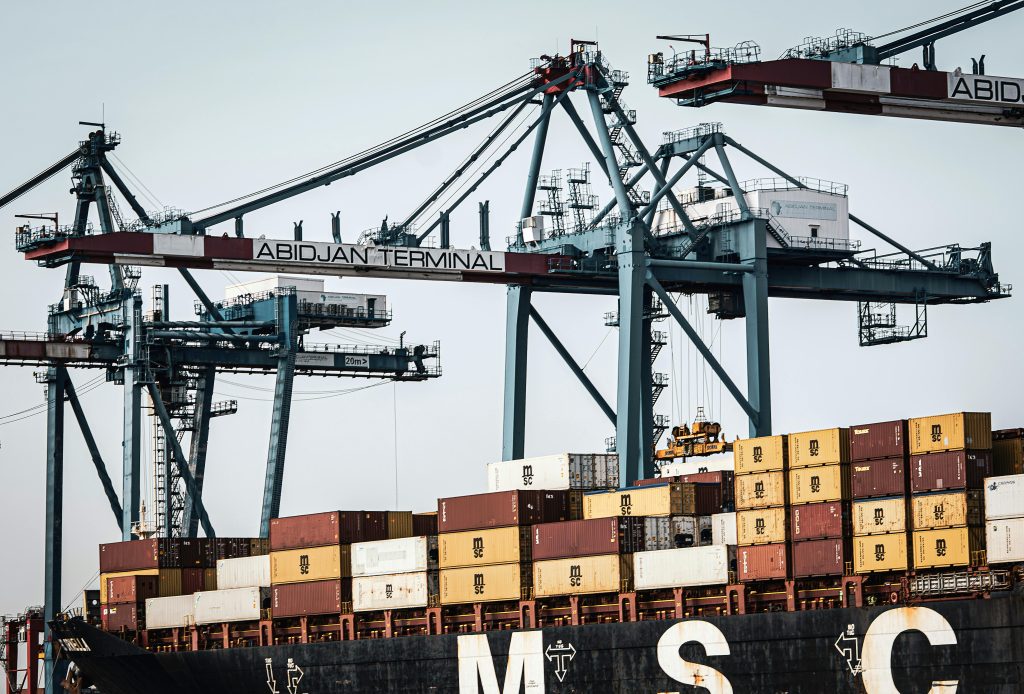
This surge in investment in West Africa not only reflects Europe’s commitment to mutual prosperity but also highlights the region’s rising potential as a vital hub for global trade and innovation.
Why the EU Is Prioritizing Investment in West Africa
The European Union (EU) is intensifying efforts to boost trade and investment in West Africa, a move described by an EU official as a top strategic priority. With West Africa home to some of the continent’s largest economies—namely Nigeria, Ghana, and Ivory Coast—the region’s role in shaping Africa-EU relations is becoming more critical.
According to a high-ranking source within the EU, the bloc sees West Africa as a vital partner due to its proximity and interconnected social, economic, and migratory ties with Europe.
Economic Growth Fuels EU’s Interest in Investment in West Africa
Countries across West Africa have witnessed steady economic growth in recent years. This consistent upward trend has attracted the EU’s attention, encouraging the bloc to engage more closely through trade agreements and strategic development plans that increase investment in West Africa.
The EU believes that economic collaboration with this region can offer mutual benefits—fueling job creation, infrastructure development, and industrial diversification.

The Economic Partnership Agreement (EPA): A Catalyst for Investment
One of the EU’s most powerful tools for encouraging investment in West Africa is the Economic Partnership Agreement (EPA). This trade and development deal seeks to open markets and strengthen long-term cooperation between Europe and West African countries.
The agreement has been signed by all EU members and most West African nations, with Nigeria being the notable exception. Even so, the EU remains open to negotiations with Nigeria to address concerns and build consensus.
Ghana and Ivory Coast Lead in EPA-Driven Growth
Ghana and Ivory Coast, both signatories of interim EPAs, have seen significant economic benefits since the agreement’s implementation. Between 2014 and now, total trade between the EU27 and these two countries has surged by 18%.
More impressively, their exports of locally processed cocoa products have increased by 50% and 30% respectively, showing a shift from raw exports to value-added goods—a key aim of increasing investment in West Africa.
Both countries are gradually moving beyond the export of raw cocoa beans to cocoa products processed locally, thereby responding to the growing local demand, and consumption of “made in Africa” goods.
A Closer Look at Ghana-EU Trade Figures
In 2023, total trade between the EU and Ghana reached €6 billion. Despite a 3% decrease compared to 2022, the nature of the trade has evolved.

EU exports to Ghana declined by 11%, while imports from Ghana rose by 8%, increasing from €2.4 billion to €2.6 billion.
The EU’s trade surplus with Ghana shrank nearly by half—from €1.3 billion in 2022 to €700 million in 2023—illustrating a more balanced partnership and greater returns from investment in West Africa.
The source confirmed that the EU was open to consider all the options, including engaging in discussions with Nigeria on concerns including the apprehension that EU products would flood Nigerian markets, to reach a consensus to pave the way for the signing of the EPA deal.
SIFA: A New Chapter in Investment in West Africa
Beyond the EPA, the EU is rolling out a new initiative called the Sustainable Investment Facilitation Agreement (SIFA). This initiative aims to make investment in West Africa more attractive, streamlined, and sustainable.
After successfully partnering with Angola, the EU has begun exploratory talks with Ghana, Ivory Coast, and Nigeria to expand SIFA’s scope in West Africa.
How SIFA Supports Investment in West Africa
SIFA is designed to simplify the investment process, encourage diversification into non-traditional sectors like food exports, services, and manufacturing, and foster digital transformation through e-government systems. The initiative also aims to uphold labor and environmental standards, promote corporate responsibility, and enhance transparency—cornerstones of ethical investment in West Africa.
It promotes mutual commitments from both investors and host governments, ensuring that business practices remain socially and environmentally responsible.
Nigeria’s Role in Shaping Future Investment in West Africa
Although Nigeria has yet to sign the EPA, the EU remains optimistic. Discussions are underway to address Nigeria’s concerns, particularly fears that European imports could overwhelm local industries. By finding common ground, the EU hopes to bring Nigeria on board—an essential step to fully unlocking the region’s investment potential.
Nigeria’s participation could significantly elevate the scale of investment in West Africa, given its population size and economic weight.
The Bigger Picture: Why Investment in West Africa Matters Now
The EU’s accelerated push for investment in West Africa is more than a strategic move; it’s a testament to a future built on shared prosperity. From improved trade balances and processed goods exports to sustainable investment standards, West Africa is emerging as one of the most promising regions for economic growth and transformation.
The EU’s approach reflects a broader vision of inclusive development, where both partners contribute to, and benefit from, long-term cooperation.
Frequently Asked Questions
Why is the EU focusing on investment in West Africa?
The EU sees West Africa as strategically important due to its geographic proximity, economic potential, and growing regional markets.
What is the Economic Partnership Agreement (EPA)?
The EPA is a trade and development agreement between the EU and West African nations designed to enhance trade, reduce tariffs, and boost economic growth.
What is SIFA and how does it benefit West Africa?
SIFA, or the Sustainable Investment Facilitation Agreement, is a new EU initiative to attract and retain foreign investments while ensuring ethical and sustainable practices.
How have Ghana and Ivory Coast benefited from the EPA?
Both countries have increased their exports of processed cocoa products significantly, showing progress in industrialization and local value addition.
Is Nigeria part of the EPA?
Not yet. Nigeria has expressed concerns but remains in discussions with the EU to potentially join in the future.
How does the EU ensure investments are sustainable in West Africa?
Through SIFA, the EU promotes labor and environmental protections, transparency, and corporate social responsibility to ensure sustainable development.
Conclusion: EU and West Africa Forge a Stronger Future Through Investment
The European Union’s deepening engagement through the EPA and SIFA underscores its strong commitment to advancing investment in West Africa. As trade grows and infrastructure improves, the region is becoming a magnet for global investors looking for sustainable and inclusive growth opportunities. By addressing challenges and fostering dialogue, the EU and West Africa are laying the groundwork for a future of mutual prosperity.
Source: GNA
Share This:
- GroConsult
- No Comments

The rise of remote work has transformed the way businesses operate, offering flexibility, access to a global talent pool, and cost savings. However, managing remote teams comes with its own set of challenges, particularly in areas such as compliance, payroll, and employee administration. Employer of Record (EOR) services provide a comprehensive solution for managing remote teams, ensuring compliance and efficiency. Groconsult, a leader in EOR services, offers tailored solutions that support remote work and help businesses thrive in a distributed environment. This article provides a complete overview of EOR services for remote teams and how Groconsult can be your ideal partner.
The Benefits of EOR Services for Remote Teams
1. Simplified Hiring and Onboarding
EOR services streamline the hiring and onboarding process for remote employees. Groconsult handles job postings, interviews, employment contracts, and onboarding activities, ensuring compliance with local labor laws. This enables businesses to quickly integrate remote employees and start leveraging their skills.
2. Compliance with Local Labor Laws
Compliance with local labor laws is crucial when managing remote teams in different countries. Groconsult’s legal experts ensure that all employment practices, payroll, and benefits administration comply with local regulations, mitigating legal risks and ensuring smooth operations.
3. Efficient Payroll Management
Managing payroll for remote teams involves dealing with different currencies, tax regulations, and social security contributions. Groconsult handles all aspects of payroll processing, ensuring accuracy and compliance. This reduces the administrative burden on businesses and ensures timely payments to remote employees.
4. Competitive Benefits Packages
Providing competitive benefits is essential for attracting and retaining top remote talent. Groconsult offers comprehensive benefits packages tailored to each market, including health insurance, retirement plans, and other perks. This enhances employee satisfaction and loyalty.
5. Risk Mitigation
Expanding into new markets with remote teams involves various risks, including legal, financial, and operational risks. Groconsult’s EOR services mitigate these risks by ensuring compliance with local laws, managing payroll and taxes, and providing legal support. This allows businesses to expand with confidence.
Example: A consulting firm entering the Middle East with remote consultants faced challenges with regulatory compliance and cultural differences. Groconsult’s local expertise and comprehensive EOR services mitigated these risks, enabling the firm to establish a strong presence in the region.
6. Focus on Core Business Activities
By outsourcing HR, payroll, and compliance tasks to Groconsult, businesses can focus on their core activities, such as product development, marketing, and customer acquisition. This enhances efficiency and accelerates growth.
Example: An e-commerce company focused on expanding its product range and customer base. By partnering with Groconsult for EOR services, the company was able to dedicate more resources to strategic initiatives, resulting in faster growth and market penetration.

Managing Remote Teams with Groconsult
1. Virtual Onboarding
Groconsult’s virtual onboarding solutions provide a comprehensive and engaging experience for new remote hires. This includes online training, orientation sessions, and access to essential resources, ensuring remote employees are well-prepared and integrated into the team.
2. Time and Attendance Tracking
Accurate time and attendance tracking is crucial for managing remote teams. Groconsult’s advanced tracking tools ensure that all timekeeping data is recorded accurately, supporting fair and compliant payroll processing.
3. Performance Management
Groconsult’s performance management software provides a platform for setting goals, tracking progress, and conducting performance reviews. This fosters a culture of continuous feedback and development, ensuring remote employees stay motivated and productive.
4. Employee Engagement
Maintaining high levels of engagement among remote employees is essential for retention and productivity. Groconsult offers employee engagement tools that facilitate communication, recognition, and collaboration, creating a positive and inclusive remote work environment.
Why Choose GroConsult?
With a proven track record of supporting industry leaders such as Huawei, Nokia, General Electric, Ericsson, Baker Hughes, Tullow Oil, MTN, Vodafone, and Airtel, GroConsult has the expertise and experience to help your business succeed in Africa. Our comprehensive EOR services are designed to address the unique challenges of the African market, providing you with the support needed to navigate regulatory complexities, manage your workforce effectively, and achieve your business goals and for your remote team.
Ready to overcome the challenges of expanding into Africa? Partner with GroConsult to unlock the full potential of the African market. Schedule a meeting with us today to discuss how our comprehensive EOR services can support your business and help you achieve your strategic objectives. Let’s embark on this journey together and make your expansion into Africa a resounding success.
Contact Us Now to Schedule a Meeting and Explore Partnership Opportunities!
By choosing GroConsult, you gain a trusted partner committed to your success, with the expertise and resources to navigate the complexities of the African market and drive your business forward. Let’s build the future of your business together.
Welcome to GroConsult Management Consortium: Growing Businesses, Delivering Results.Share This:
- GroConsult
- No Comments

The rapid advancement of technology has revolutionized various industries, and the Employer of Record (EOR) services sector is no exception. Modern EOR services leverage cutting-edge technology to streamline processes, ensure compliance, and enhance the overall experience for both employers and employees. Groconsult, a leader in EOR services, utilizes state-of-the-art technology to provide efficient, accurate, and reliable solutions. This article explores the pivotal role of technology in modern EOR services and how Groconsult is at the forefront of this transformation.

Technology in Payroll Processing
Automated Payroll Systems
Automated payroll systems are a cornerstone of modern EOR services. These systems calculate salaries, deductions, and taxes with precision, ensuring timely and accurate payments. Groconsult’s automated payroll solutions minimize errors and reduce the administrative burden on HR departments, allowing businesses to focus on their core operations.
Integration with HR and Accounting Software
Groconsult’s payroll systems seamlessly integrate with various HR and accounting software, providing a unified platform for managing employee data, payroll, and financial records. This integration enhances efficiency and ensures consistency across all systems, simplifying the management of payroll and related processes.
Real-Time Reporting and Analytics
Real-time reporting and analytics provide valuable insights into payroll expenses, tax obligations, and other financial metrics. Groconsult’s advanced reporting tools enable businesses to monitor payroll trends, identify potential issues, and make informed decisions to optimize their payroll processes.
Compliance Management
Automated Compliance Updates
Keeping up with changing labor laws and regulations is a significant challenge for businesses operating in multiple jurisdictions. Groconsult’s technology-driven compliance management systems automatically update to reflect the latest legal requirements, ensuring that all employment practices remain compliant with local laws.
Digital Document Management
Digital document management systems streamline the storage and retrieval of important documents, such as employment contracts, tax forms, and compliance records. Groconsult’s secure digital platforms ensure that all documents are easily accessible and protected from unauthorized access, enhancing compliance and reducing the risk of legal issues.
Compliance Monitoring and Auditing
Groconsult’s compliance monitoring tools continuously track adherence to local labor laws and regulations. Automated auditing processes identify discrepancies and potential compliance risks, enabling businesses to address issues proactively and maintain a high standard of compliance.
Employee Benefits Administration
Online Benefits Enrollment
Online benefits enrollment platforms simplify the process of selecting and managing employee benefits. Groconsult’s user-friendly portals allow employees to view and choose from a range of benefits options, enhancing transparency and employee satisfaction.
Benefits Administration Software
Benefits administration software automates the management of health insurance, retirement plans, and other employee benefits. Groconsult’s technology solutions ensure that benefits are administered accurately and efficiently, reducing administrative overhead and improving the overall benefits experience for employees.
Employee Self-Service Portals
Employee self-service portals empower employees to manage their own benefits, access pay stubs, update personal information, and more. Groconsult’s intuitive self-service platforms enhance employee engagement and reduce the administrative workload on HR teams.
Remote Workforce Management
Virtual Onboarding
Virtual onboarding platforms facilitate the seamless integration of new hires, regardless of their location. Groconsult’s virtual onboarding solutions provide a comprehensive and engaging onboarding experience, ensuring that remote employees feel connected and supported from day one.
Time and Attendance Tracking
Time and attendance tracking systems enable accurate monitoring of employee work hours, leave requests, and overtime. Groconsult’s advanced tracking tools ensure that all timekeeping data is recorded accurately, supporting fair and compliant payroll processing for remote teams.
Performance Management Software
Performance management software provides a platform for setting goals, tracking progress, and conducting performance reviews. Groconsult’s technology solutions support continuous performance management, fostering a culture of feedback and development for remote employees.
Enhancing Employee Experience
Mobile Applications
Mobile applications provide employees with convenient access to payroll, benefits, and HR information. Groconsult’s mobile apps enable employees to manage their employment details on the go, enhancing convenience and satisfaction.
AI-Powered Chatbots
AI-powered chatbots offer instant support for common HR queries, such as payroll questions, benefits information, and policy clarifications. Groconsult’s chatbots provide quick and accurate responses, improving the employee experience and reducing the workload on HR teams.
Employee Engagement Tools
Employee engagement tools facilitate communication, recognition, and collaboration among remote and distributed teams. Groconsult’s engagement platforms support a positive and inclusive work culture, enhancing employee morale and retention.
The role of technology in modern EOR services is transformative, enabling businesses to streamline processes, ensure compliance, and enhance the employee experience. Groconsult leverages cutting-edge technology to provide comprehensive EOR solutions that meet the evolving needs of businesses and their employees. By partnering with Groconsult, companies can harness the power of technology to optimize their HR operations, achieve compliance, and scale rapidly. Trust Groconsult to be your technology-driven EOR partner and drive your business forward with innovative and efficient solutions.
Share This:
- GroConsult
- No Comments

Starting a new business is an exhilarating journey filled with opportunities and challenges. For startups aiming to scale quickly, managing the complexities of HR, compliance, and international expansion can be daunting. This is where Employer of Record (EOR) services come into play. EOR services provide a streamlined solution for managing payroll, benefits, compliance, and employee administration, allowing startups to focus on growth and innovation. Groconsult, a leader in EOR services, offers tailored solutions that empower startups to scale rapidly and efficiently. This article explores how EOR services can help startups scale quickly and why Groconsult is the ideal partner for this journey.
The Challenges of Scaling a Startup
Scaling a startup involves navigating numerous challenges, including:
- Compliance with Local Laws: Each country has its own set of labor laws and regulations. Ensuring compliance across multiple jurisdictions can be complex and time-consuming.
- Managing Payroll and Taxes: Handling payroll and tax compliance for a global workforce requires expertise and meticulous attention to detail.
- Employee Benefits Administration: Providing competitive benefits that comply with local standards is essential for attracting and retaining top talent.
- HR Management: Efficient HR management is crucial for maintaining employee satisfaction and productivity.
How EOR Services Facilitate Rapid Scaling
1. Simplified Hiring Process
EOR services streamline the hiring process, allowing startups to quickly onboard new employees in different countries. Groconsult handles job postings, interviews, and employment contracts, ensuring compliance with local labor laws. This enables startups to access a global talent pool without the administrative burden.
Case Study: A tech startup based in the US wanted to hire developers in India and Brazil. Groconsult facilitated the hiring process, handling all administrative tasks and ensuring compliance with local regulations. This allowed the startup to quickly build a diverse and skilled team, accelerating product development.
2. Compliance with Local Labor Laws
Navigating the complexities of local labor laws is a significant challenge for startups expanding internationally. Groconsult’s team of legal experts ensures that all employment contracts, payroll, and benefits administration comply with local regulations. This mitigates legal risks and ensures smooth operations.
Example: A fintech startup expanding into Europe faced challenges with varying labor laws across different countries. Groconsult’s expertise in European labor laws ensured that the startup remained compliant, avoiding potential legal issues and penalties.
3. Efficient Payroll Management
Managing payroll for a global workforce involves dealing with different currencies, tax regulations, and social security contributions. Groconsult handles all aspects of payroll processing, ensuring accuracy and compliance. This reduces the administrative burden on startups and allows them to focus on strategic initiatives.
Case Study: A healthcare startup with employees in multiple countries struggled with payroll complexities. Groconsult took over payroll management, ensuring timely and accurate payments while adhering to local tax regulations. This improved employee satisfaction and allowed the startup to concentrate on growth.
4. Competitive Benefits Packages
Attracting and retaining top talent requires offering competitive benefits that comply with local standards. Groconsult provides comprehensive benefits packages tailored to each market, including health insurance, retirement plans, and other perks. This enhances employee satisfaction and loyalty.
Example: A marketing startup expanding into Asia wanted to offer attractive benefits to attract top talent. Groconsult designed benefits packages that met local requirements and exceeded employee expectations, helping the startup build a motivated and loyal team.
5. Risk Mitigation
Expanding into new markets involves various risks, including legal, financial, and operational risks. Groconsult’s EOR services mitigate these risks by ensuring compliance with local laws, managing payroll and taxes, and providing legal support. This allows startups to expand with confidence.
Example: A logistics startup entering the Middle East faced challenges with regulatory compliance and cultural differences. Groconsult’s local expertise and comprehensive EOR services mitigated these risks, enabling the startup to establish a strong presence in the region.
6. Focus on Core Business Activities
By outsourcing HR, payroll, and compliance tasks to Groconsult, startups can focus on their core business activities, such as product development, marketing, and customer acquisition. This enhances efficiency and accelerates growth.
Example: A software startup focused on developing innovative solutions for the healthcare industry. By partnering with Groconsult for EOR services, the startup was able to dedicate more resources to research and development, resulting in faster innovation and market penetration.
Why Groconsult is the Ideal Partner for Startups
Groconsult stands out as the ideal EOR partner for startups due to its comprehensive services, global reach, and commitment to excellence. Here’s why startups should choose Groconsult:
1. Comprehensive EOR Services
Groconsult offers a full suite of EOR services, including:
- Payroll Processing: Accurate and timely payroll management in compliance with local regulations.
- Benefits Administration: Competitive benefits packages tailored to each market.
- Compliance Management: Ensuring compliance with local labor laws and tax regulations.
- HR Support: Handling employment contracts, onboarding, and offboarding processes.
- Legal Expertise: Providing legal support and mitigating risks.
2. Global Reach and Local Expertise
With operations in key markets worldwide, Groconsult has a deep understanding of local labor laws and regulations. This ensures compliance and smooth operations, enabling startups to expand into new markets with confidence.
3. Customized Solutions
Groconsult provides tailored EOR solutions that align with each startup’s unique needs and goals. Whether it’s hiring employees in a specific country or managing a global workforce, Groconsult’s services are designed to meet the specific requirements of each client.
4. Reliable Support
Groconsult’s dedicated support team is available around the clock to address any concerns and ensure smooth operations. This reliability and commitment to excellence make Groconsult a trusted partner for startups.

5. Proven Track Record
Groconsult has a proven track record of success, with numerous case studies and client testimonials highlighting its expertise and reliability. Startups can trust Groconsult to deliver high-quality EOR services that drive growth and success.
Scaling a startup quickly requires efficient management of HR, payroll, compliance, and employee administration. Employer of Record services provide a streamlined solution, allowing startups to focus on growth and innovation. Groconsult, with its comprehensive EOR services, global reach, and commitment to excellence, is the ideal partner for startups looking to scale rapidly. By partnering with Groconsult, startups can navigate the complexities of international expansion, ensure compliance, and build a motivated and productive workforce. Trust Groconsult to be your partner in achieving rapid and sustainable growth.
Share This:
- GroConsult
- No Comments
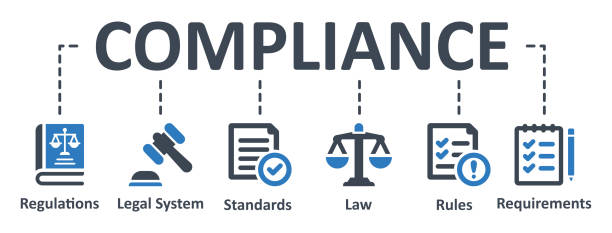
Navigating the complexities of international labor laws and regulations can be a significant challenge for businesses expanding globally. Employer of Record (EOR) services offer a streamlined solution for managing compliance across different countries. Groconsult, a leader in EOR services, provides the expertise and support needed to ensure your business remains compliant in every market. This article explores the importance of compliance and how Groconsult’s EOR services can help your business succeed internationally.

Importance of Compliance
Compliance with local labor laws is crucial for avoiding legal issues, penalties, and reputational damage. Each country has unique regulations governing employment contracts, payroll, taxes, benefits, and termination. Ensuring compliance with these laws protects your business and employees, fostering a positive work environment and building trust with stakeholders.
Key Compliance Areas
1. Employment Contracts: Local labor laws dictate the terms and conditions of employment contracts. Groconsult ensures that all employment contracts are in compliance with local regulations, protecting both the employer and employees.
2. Payroll and Taxation: Payroll processing and tax compliance are complex tasks that vary by country. Groconsult handles payroll processing, tax withholdings, and social security contributions, ensuring accuracy and compliance with local laws.
3. Benefits Administration: Employee benefits, such as health insurance and retirement plans, must adhere to local standards. Groconsult provides comprehensive benefits packages that meet local requirements, enhancing employee satisfaction and retention and ensures compliance with any other employee benefits.
4. Work Permits and Visas: Hiring foreign workers requires obtaining work permits and visas. Groconsult manages the application process, ensuring compliance with immigration laws and facilitating smooth onboarding.
5. Termination and Offboarding: Termination laws vary significantly between countries. Groconsult handles the offboarding process, ensuring compliance with local termination laws and providing support to both the employer and employees.

Compliance Challenges
1. Regulatory Complexity: Navigating the complexities of different labor laws requires expertise and up-to-date knowledge. Groconsult’s legal team stays abreast of regulatory changes, ensuring your business remains compliance with local labor laws.
2. Cultural Differences: Understanding cultural differences is essential for successful international operations. Groconsult provides cultural training and support, helping your team adapt to local customs and business practices.
3. Language Barriers: Language barriers can hinder effective communication and compliance. Groconsult’s multilingual team ensures clear and accurate communication, facilitating smooth operations.
Compliance with local labor laws is crucial for successful global expansion. Employer of Record services provide a streamlined solution for managing compliance across different countries. Groconsult’s expertise in EOR services ensures your business remains compliant, mitigating risks and allowing you to focus on core operations.
By partnering with Groconsult, you gain access to a team of experts dedicated to navigating the complexities of international labor laws and ensuring smooth and efficient operations. Trust Groconsult to be your compliance partner and achieve your international growth objectives with confidence.
Partnering with GroConsult for your Employer of Record services is a strategic move that can facilitate your business’s global expansion while minimizing risks and costs. Our comprehensive solutions, local expertise, commitment to excellence, and personalized service make us the ideal partner for businesses looking to navigate the complexities of international hiring.
Our streamlined processes and efficient systems ensure that your hiring and onboarding processes are handled swiftly, allowing you to get your operations up and running without unnecessary delays. We prioritize your timelines and work diligently to meet your deadlines, ensuring that your business can thrive in new markets.
As you consider your options for EOR services, remember that GroConsult is here to support you every step of the way. Let us help you unlock your business’s potential in Africa and beyond. Contact us today to learn more about how we can assist you in achieving your global expansion goals.
Share This:
- GroConsult
- No Comments

7 Reasons to Choose the Best EOR Services for Your Business
Selecting the best EOR services for your business is a crucial decision when planning international expansion. A reliable Employer of Record (EOR) partner can simplify global hiring, ensure compliance with local labor laws, and help you manage your workforce efficiently. Whether you’re entering new markets or scaling operations, aligning with the right EOR ensures that your company remains agile, compliant, and cost-effective across borders.
One of the most trusted names in this space, Groconsult, offers insights into what makes an EOR service the best fit for global businesses. Below, we outline key factors to help you evaluate and choose the best EOR services for your business.

Key Factors That Define the Best EOR Services for Your Business
Comprehensive Service Offerings
When selecting the best EOR services for your business, start by examining what each provider offers. Services like payroll processing, benefits administration, tax filing, onboarding, and offboarding should all be included. Groconsult delivers a full suite of EOR solutions that streamline these tasks so your HR team can focus on core business goals.
Global Geographical Coverage
Your ideal EOR should operate in the countries you’re targeting. Groconsult, for instance, covers major markets across North America, Europe, Africa, and Asia. Their in-country experts provide essential local knowledge, which is critical for compliant and successful operations abroad.
Expertise in Legal Compliance
Global employment laws are complex and ever-changing. The best EOR services for your business will include legal teams that stay updated on local regulations. Groconsult ensures your company adheres to all labor laws, tax codes, and reporting obligations—helping you avoid legal pitfalls that could delay expansion.
Transparent Pricing Structures
Budgeting accurately is a must. Groconsult offers transparent and scalable pricing, often based on the number of employees or a percentage of payroll. With no hidden fees, you get predictable costs and clear ROI, a hallmark of the best EOR services for your business.
Dedicated Customer Support
One of the biggest differentiators in top-tier EOR services is responsive, expert customer support. Groconsult offers 24/7 support to resolve issues quickly, no matter your time zone or problem.
Evaluation Process to Choose the Best EOR Services for Your Business
Define Business Requirements
Start by listing your company’s hiring goals, desired countries for expansion, and compliance challenges. The best EOR services for your business will offer customized solutions tailored to these needs. Groconsult begins each engagement with a thorough needs analysis to match you with the right services.
Research and Compare EOR Providers
Visit websites, read client testimonials, and check third-party reviews. Platforms like G2 and Trustpilot provide unfiltered insights into EOR providers’ reputations. Groconsult consistently ranks high for client satisfaction and global reach.
Request and Evaluate Proposals
Ask for a detailed proposal that outlines services, timelines, and fees. The best EOR services for your business will provide clear documentation and personalized recommendations. Groconsult’s proposals include workflow timelines and performance metrics, so there are no surprises down the road.
Conduct Interviews
Schedule calls with shortlisted providers. Use these discussions to gauge their responsiveness, domain expertise, and alignment with your values. Groconsult excels in providing direct access to senior consultants during this evaluation phase.
Smart Questions to Ask When Evaluating the Best EOR Services for Your Business
-
What countries do you support, and do you have local experts on the ground?
-
Can you provide legal support for compliance and employee classification?
-
What’s your average response time for customer inquiries or emergencies?
-
Do you offer tech integration with our existing HR systems?
-
How do you handle offboarding and contract terminations?
Red Flags to Avoid When Choosing EOR Services
-
Hidden Costs: If pricing isn’t clearly outlined, expect surprise charges later.
-
Limited Coverage: Providers without local presence may struggle with compliance.
-
Poor Reviews: Check independent platforms for consistent negative feedback.
-
Slow Response Times: If support is sluggish during the sales process, it will likely worsen post-sale.
-
Generic Proposals: If your proposal isn’t tailored, the service won’t be either.
Why Groconsult Offers Some of the Best EOR Services for Your Business
Groconsult’s approach is built on transparency, tailored solutions, and a true understanding of international employment law. Their global coverage, legal compliance frameworks, and dedicated service make them a preferred choice for businesses entering new markets.
Additionally, Groconsult provides tools and dashboards that let clients track payroll, taxes, benefits, and documentation in real-time—an essential feature for growing businesses.
Benefits of Choosing the Best EOR Services for Your Business
| Feature | Benefit |
|---|---|
| Legal Compliance | Avoid fines and regulatory issues |
| Cost Efficiency | Predictable budgeting and no hidden fees |
| Faster Market Entry | Deploy teams quickly without setting up a local entity |
| Reduced Admin Burden | Automate payroll, taxes, and benefits |
| Employee Satisfaction | On-time payments and support for international staff |
Trust Groconsult to be your EOR partner and achieve your international growth objectives with confidence.
Conclusion: Empower Your Growth with the Best EOR Services for Your Business
As your company scales globally, aligning with the best EOR services for your business becomes vital for operational success and long-term growth. A provider like Groconsult not only removes barriers to entry in foreign markets but also ensures that your operations are streamlined, compliant, and employee-friendly. From legal guidance and payroll to unmatched customer support, Groconsult offers everything your business needs to go global—confidently and compliantly.
Let us help you unlock your business’s potential in Africa and beyond. Contact us today to learn more about how we can assist you in achieving your global expansion goals.
Share This:
- GroConsult
- No Comments
Global expansion presents exciting opportunities for businesses, but it also comes with significant challenges. Navigating foreign labor laws, managing payroll, and ensuring compliance in different jurisdictions can be daunting. Employer of Record (EOR) services offer a seamless solution to these challenges. Groconsult, a premier provider of EOR services, is your trusted partner in achieving successful global expansion. This ultimate guide explores how EOR services can facilitate your business’s international growth.
Planning for Expansion
1. Market Research (The Required Knowledge for Expansion): Before expanding, it’s crucial to conduct thorough market research. Understand the economic landscape, consumer behavior, and competitive environment in the target market. Groconsult provides valuable insights and data to help you make informed decisions.
2. Regulatory Environment (As long as you business Expansion is concern): Each country has unique labor laws and regulations. Groconsult’s team of legal experts ensures you understand and comply with these laws, minimizing risks and avoiding legal complications in your pursuit of expansion.
3. Strategic Planning in Expansion: Develop a comprehensive expansion strategy that includes market entry, resource allocation, and risk management. Groconsult offers strategic guidance to align your expansion goals with operational capabilities.
Role of EOR in Expansion
1. Simplified Hiring Process: EOR services streamline the hiring process by recruiting and onboarding employees on your behalf. Groconsult manages job postings, interviews, and employment contracts, ensuring compliance with local labor laws.
2. Payroll Management: Managing payroll in different countries can be complex. Groconsult handles payroll processing, tax withholdings, and benefits administration, ensuring accuracy and compliance with local regulations.
3. Legal Compliance: Compliance with foreign labor laws is critical for successful expansion. Groconsult takes full responsibility for legal compliance, including work permits, visas, and adherence to employment contracts.
4. Employee Benefits: Providing competitive benefits is essential for attracting and retaining talent. Groconsult offers comprehensive benefits packages tailored to local market standards, enhancing employee satisfaction and loyalty.
Compliance Across Borders
1. Local Labor Laws: Understanding and complying with local labor laws is essential for global expansion. Groconsult’s legal team stays updated on regulatory changes, ensuring your business remains compliant in every market.
2. Tax Regulations: Different countries have varying tax regulations. Groconsult manages tax compliance, including payroll taxes, social security contributions, and employee withholdings, minimizing the risk of legal issues.
3. Employment Contracts: Employment contracts must adhere to local labor laws. Groconsult drafts and manages employment contracts, ensuring they meet legal requirements and protect your business interests.
Challenges and Solutions in Expansion
1. Cultural Differences: Expanding into new markets involves understanding cultural differences. Groconsult provides cultural training and support, helping your team adapt to local customs and business practices.
2. Regulatory Complexity: Navigating complex regulations can be challenging. Groconsult’s legal experts ensure compliance with local laws, minimizing risks and avoiding legal issues.
3. Talent Acquisition: Attracting top talent in a new market requires a strategic approach. Groconsult’s recruitment services identify and hire the best candidates, ensuring your business has the right team in place for success.
Global expansion offers tremendous opportunities for growth, but it also comes with significant challenges. Employer of Record services provide a streamlined solution for managing international operations.
Why Choose GroConsult?
Groconsult, with its expertise in EOR services, is your trusted partner in achieving successful global expansion. By handling the complexities of hiring, payroll, and compliance, Groconsult allows you to focus on your core business activities. Trust Groconsult to guide you through the process and achieve your international growth objectives.
With a proven track record of supporting industry leaders such as Huawei, Nokia, General Electric, Ericsson, Baker Hughes, Tullow Oil, MTN, Vodafone, and Airtel, GroConsult has the expertise and experience to help your business succeed in Africa. Our comprehensive EOR services are designed to address the unique challenges of the African market, providing you with the support needed to navigate regulatory complexities, manage your workforce effectively, and achieve your business goals.
Ready to overcome the challenges of expanding into Africa? Partner with GroConsult to unlock the full potential of the African market. Schedule a meeting with us today to discuss how our comprehensive EOR services can support your business and help you achieve your strategic objectives. Let’s embark on this journey together and make your expansion into Africa a resounding success.
Contact Us Now to Schedule a Meeting and Explore Partnership Opportunities!
By choosing GroConsult, you gain a trusted partner committed to your success, with the expertise and resources to navigate the complexities of the African market and drive your business forward. Let’s build the future of your business together.
You visit our social media platforms for latest updates: LINKEDIN, INSTAGRAM, and X

Share This:
- GroConsult
- No Comments
As businesses navigate the complexities of managing a global workforce, two solutions often come to the forefront: Employer of Record (EOR) and Professional Employer Organization (PEO). Both offer unique advantages, but understanding their differences is crucial for making the right choice for your business. Groconsult, a leader in both EOR and PEO services, provides insights into which solution best fits your needs.
Definitions of Employer of Record and PEO
Employer of Record (EOR): An EOR is a third-party organization that takes on the legal responsibilities of employing workers on behalf of a company. This includes handling payroll, tax compliance, benefits administration, and adhering to local labor laws.
Professional Employer Organization (PEO): A PEO, on the other hand, co-employs the workers, sharing employer responsibilities with the client company. The PEO handles HR functions such as payroll, benefits, compliance, and risk management, while the client company maintains control over day-to-day operations and employee management.
Employer of Record vs. PEO: Service Comparison
1. Employment Structure:
- EOR: The EOR becomes the legal employer of the workers, taking on all employment-related liabilities.
- PEO: The PEO and client company enter into a co-employment relationship, sharing employer responsibilities.
2. Payroll and Benefits:
- EOR: Manages payroll processing and benefits administration, ensuring compliance with local laws.
- PEO: Provides payroll processing and access to comprehensive benefits packages, often leveraging economies of scale for better rates.
3. Compliance and Risk Management:
- EOR: Takes full responsibility for compliance with labor laws and regulations in the respective countries.
- PEO: Assists with compliance and risk management, but the client company retains some legal responsibilities.
4. Cost and Fees:
- EOR: Typically charges a fee based on the number of employees or a percentage of the payroll.
- PEO: Charges a service fee, often a percentage of the total payroll, and may offer cost savings through pooled resources.

Scenarios Where an Employer of Record (EOR) Is the Best Choice
- Expanding into new international markets without establishing a legal entity.
- Managing a remote or distributed workforce in different countries.
- Ensuring compliance with complex local labor laws and regulations.
When to Choose PEO:
- Enhancing HR capabilities without building an in-house HR department.
- Providing competitive benefits to attract and retain top talent.
- Sharing HR responsibilities while maintaining control over daily operations.
Why Choose Groconsult?
Groconsult offers both EOR and PEO services, providing tailored solutions to meet the unique needs of each client. With a deep understanding of global employment laws and a commitment to excellence, Groconsult ensures seamless operations, compliance, and employee satisfaction. Here’s why Groconsult is the right partner for your business:
- Comprehensive Services: Groconsult offers a full suite of EOR and PEO services, from payroll and benefits to compliance and risk management.
- Global Reach: With operations in key markets worldwide, Groconsult can support your business expansion into new territories.
- Expertise and Experience: Groconsult’s team of HR and legal experts ensures compliance and efficient management of your workforce.
- Customized Solutions: Groconsult provides tailored services that align with your business goals and operational needs.
- Reliable Support: Groconsult’s dedicated support team is available around the clock to address any concerns and ensure smooth operations.
Choosing between an EOR and a PEO depends on your business’s specific needs and goals. While both offer valuable HR solutions, understanding their differences and benefits is crucial for making an informed decision.
Groconsult, with its expertise in both EOR and PEO services, is the ideal partner to help you navigate these options and achieve your business objectives. Trust Groconsult to provide the right solution for your global workforce management needs.
Why Choose GroConsult?
With a proven track record of supporting industry leaders such as Huawei, Nokia, General Electric, Ericsson, Baker Hughes, Tullow Oil, MTN, Vodafone, and Airtel, GroConsult has the expertise and experience to help your business succeed in Africa. Our comprehensive EOR services are designed to address the unique challenges of the African market, providing you with the support needed to navigate regulatory complexities, manage your workforce effectively, and achieve your business goals.
Ready to overcome the challenges of expanding into Africa? Partner with GroConsult to unlock the full potential of the African market. Schedule a meeting with us today to discuss how our comprehensive EOR services can support your business and help you achieve your strategic objectives. Let’s embark on this journey together and make your expansion into Africa a resounding success.
Contact Us Now to Schedule a Meeting and Explore Partnership Opportunities!
By choosing GroConsult, you gain a trusted partner committed to your success, with the expertise and resources to navigate the complexities of the African market and drive your business forward. Let’s build the future of your business together.

Share This:
- GroConsult
- No Comments
PEO services help companies streamline operations, reduce costs, and enhance employee satisfaction in today’s competitive business environment. Professional Employer Organizations (PEOs) have become a powerful solution to achieve these goals. Groconsult, a leading PEO service provider, offers a range of benefits that can transform how businesses manage their human resources. This article explores the top 10 benefits of using PEO services and why Groconsult is the right partner for your business.

Top Benefits of Using PEO Services for Your Business
1. Enhanced Compliance
Navigating the complexities of employment laws and regulations can be daunting. PEO services, such as those offered by Groconsult, ensure full compliance with local, state, and federal regulations—minimizing the risk of legal issues and costly penalties. With Groconsult’s expert-led PEO services, businesses benefit from a dedicated team that stays current on regulatory changes, providing peace of mind and freeing up valuable time to focus on growth.
2. Cost Efficiency
PEO services offer cost-effective HR solutions by pooling resources and leveraging economies of scale to reduce overhead. Through its tailored PEO services, Groconsult delivers comprehensive HR support—including payroll processing, benefits administration, and risk management—at a fraction of the cost of maintaining an in-house HR department. These strategic solutions help businesses save money, optimize operations, and allocate resources more efficiently.
3. Access to Better Benefits
One of the key advantages of partnering with PEO services is gaining access to high-quality, cost-effective employee benefits that might otherwise be out of reach for small and mid-sized businesses. Through its trusted PEO services, Groconsult negotiates competitive benefits packages—including health insurance, retirement plans, and wellness programs—designed to meet the needs of today’s workforce. Offering these attractive benefits helps businesses attract and retain top talent while boosting overall employee satisfaction and loyalty.
![]()
4. Improved HR Services
PEO services deliver expert HR support across the employee lifecycle—from recruitment and onboarding to performance management and employee relations. With Groconsult’s results-driven PEO services, businesses gain access to dedicated HR professionals who provide both strategic guidance and hands-on assistance. This ensures that all HR functions are not only compliant but also fully aligned with business goals and industry best practices.
5. Focus on Core Business
By outsourcing HR responsibilities to PEO services, businesses can redirect their focus toward core operations and strategic growth initiatives. Groconsult’s comprehensive PEO services take over time-consuming administrative functions—such as compliance, payroll, and employee documentation—freeing up leadership to concentrate on innovation, customer satisfaction, and scaling the business effectively.
6. Employee Development
PEO Services support employee development through training and professional development programs. Groconsult offers customized training solutions that enhance employee skills and knowledge, fostering a culture of continuous improvement and career growth.
7. Scalability
PEO Services provide scalable HR solutions that grow with your business. Whether you’re expanding into new markets or increasing your workforce, Groconsult’s flexible services can adapt to your changing needs, ensuring seamless operations and support.
8. Risk Management
Managing employment risks is critical for any business. PEOs, like Groconsult, help mitigate risks by ensuring compliance with safety regulations, managing workers’ compensation, and providing liability coverage. This proactive approach to risk management protects your business and employees.
9. Technology Integration
PEOs leverage advanced HR technology to streamline processes and enhance efficiency. Groconsult’s state-of-the-art HR platform provides real-time access to payroll, benefits, and compliance information, enabling businesses to make informed decisions and improve overall productivity.
10. Strategic HR Partnership
Partnering with a PEO offers more than just administrative support; it provides a strategic HR partnership. Groconsult works closely with clients to develop HR strategies that align with business objectives, driving performance, and achieving long-term success.
Utilizing the services of a Professional Employer Organization can revolutionize how businesses manage their human resources. Groconsult’s PEO services offer enhanced compliance, cost efficiency, access to superior benefits, and expert HR support, among other benefits. By partnering with Groconsult, businesses can focus on their core operations, attract and retain top talent, and achieve their strategic goals. Trust Groconsult to be your PEO partner and experience the transformative power of professional HR solutions.
Why Choose GroConsult?
With a proven track record of supporting industry leaders such as Huawei, Nokia, General Electric, Ericsson, Baker Hughes, Tullow Oil, MTN, Vodafone, and Airtel, GroConsult has the expertise and experience to help your business succeed in Africa. Our comprehensive EOR services are designed to address the unique challenges of the African market, providing you with the support needed to navigate regulatory complexities, manage your workforce effectively, and achieve your business goals.
Ready to overcome the challenges of expanding into Africa? Partner with GroConsult to unlock the full potential of the African market. Schedule a meeting with us today to discuss how our comprehensive EOR services can support your business and help you achieve your strategic objectives. Let’s embark on this journey together and make your expansion into Africa a resounding success.
Contact Us Now to Schedule a Meeting and Explore Partnership Opportunities!
By choosing GroConsult, you gain a trusted partner committed to your success, with the expertise and resources to navigate the complexities of the African market and drive your business forward. Let’s build the future of your business together.
Visit our social media platforms for more tips on PEO benefits: LINKEDIN, INSTAGRAM, and X

Share This:
- GroConsult
- No Comments

In the dynamic landscape of global business, the Employer of Record (EOR) model has emerged as a pivotal solution for companies seeking to expand their operations internationally without the complexities of establishing a legal entity in each new market. Groconsult, a leader in EOR services, provides a seamless pathway for businesses to hire and manage employees globally. This comprehensive guide will delve into what an EOR is, how it works, and why Groconsult stands out as the ideal partner for your international employment needs.
What is an Employer of Record (EOR)?
An Employer of Record (EOR) is a third-party organization that takes on the legal responsibilities of employing workers on behalf of another company. Essentially, the EOR becomes the legal employer for the employees, handling all the administrative and compliance aspects of employment, while the client company retains control over the day-to-day management and work performed by the employees. This arrangement allows businesses to focus on their core operations while the EOR ensures compliance with local labor laws and regulations.
How Does an EOR Work?
1. Hiring and Onboarding: The EOR recruits and hires employees on behalf of the client company. This includes posting job advertisements, conducting interviews, and handling employment contracts. Groconsult’s team of experts ensures that all hiring practices comply with local labor laws and best practices.
2. Payroll Processing: Once employees are hired, the EOR manages payroll processing. This involves calculating salaries, withholding taxes, and ensuring timely payment of wages. Groconsult’s state-of-the-art payroll system guarantees accuracy and compliance with local tax regulations.
3. Benefits Administration: An EOR also handles employee benefits, including health insurance, retirement plans, and other perks. Groconsult offers comprehensive benefits packages tailored to meet the needs of employees in different regions, enhancing employee satisfaction and retention.
4. Compliance and Legal Responsibilities: One of the most critical functions of an EOR is ensuring compliance with local labor laws. This includes adhering to employment contracts, managing work permits and visas, and ensuring workplace safety standards are met. Groconsult’s legal team stays abreast of regulatory changes to mitigate risks and protect both the client company and its employees.
5. Termination and Offboarding: In cases where employment needs to be terminated, the EOR handles the offboarding process, ensuring compliance with local termination laws and providing support to both the employee and the client company. Groconsult’s compassionate approach to offboarding helps maintain positive relationships and a smooth transition.
Why Choose Groconsult as Your EOR Partner?
Groconsult distinguishes itself through a commitment to excellence, a global outlook, and a focus on client satisfaction. Here’s why Groconsult is the ideal partner for your EOR needs:
- Expertise and Experience: With years of experience in the industry, Groconsult has developed a deep understanding of international employment laws and practices, ensuring seamless operations across multiple jurisdictions.
- Tailored Solutions: Groconsult offers customized EOR solutions that align with the specific needs of each client, providing flexibility and scalability as your business grows.
- Global Reach: With a presence in key markets worldwide, Groconsult can support your expansion into new territories, managing the complexities of local employment laws.
- Reliable Support: Groconsult’s dedicated support team is available around the clock to address any concerns or issues, ensuring smooth and efficient operations.
- Innovative Technology: Leveraging cutting-edge technology, Groconsult provides transparent, efficient, and accurate payroll and compliance services, enhancing the overall employee experience.
Navigating the complexities of international employment can be challenging, but with Groconsult’s Employer of Record services, businesses can expand globally with confidence and ease. By partnering with Groconsult, you gain access to a team of experts dedicated to managing the administrative and legal aspects of employment, allowing you to focus on your core business activities. Trust Groconsult to be your reliable partner in achieving global success.
Visit our social media platforms: LINKEDIN, INSTAGRAM, and X

Share This:
- GroConsult
- No Comments

EOR services have become essential for businesses looking to expand globally without the administrative burden of managing international employment complexities. In today’s globalized economy, expanding your business across borders is a strategic move that can drive growth and innovation. However, the challenges of hiring and managing employees in different countries—ranging from diverse employment laws to tax regulations and compliance requirements—can be overwhelming. GroConsult, a leading provider in the EOR market, offers comprehensive solutions that help businesses manage their international workforce with ease and efficiency. In this blog post, we explore why GroConsult is the ideal partner for your EOR needs.

Understanding Employer of Record (EOR) Services
Before we explore why GroConsult stands out, it’s essential to understand what EOR services entail. An EOR is a third-party organization that takes on the legal responsibilities of employing workers on behalf of another company. This includes managing payroll, taxes, benefits, compliance, and other HR functions. By using an EOR, businesses can hire employees in foreign countries without having to establish a legal entity in those locations.
The Value Proposition of EOR Services
- Compliance and Risk Management: EOR services ensure that your business complies with local labor laws and regulations, reducing the risk of legal issues and fines.
- Cost Efficiency: Avoid the high costs and administrative burden of setting up and maintaining a foreign subsidiary.
- Speed to Market: Quickly onboard employees in new markets, enabling faster expansion and scalability.
- Focus on Core Business: Free up your internal resources to focus on strategic initiatives rather than administrative tasks.
Why GroConsult?
GroConsult has established itself as a trusted partner in the EOR industry, offering tailored solutions that cater to the unique needs of businesses across various sectors. Here are the key reasons why GroConsult is the right choice for your EOR requirements:
1. Extensive Global Reach
GroConsult provides EOR services in multiple countries, including Ghana, Nigeria, Liberia, Ivory Coast, Canada, the United Kingdom, and the United Arab Emirates. This extensive global reach allows you to expand your business operations seamlessly across different regions. GroConsult’s local expertise in these markets ensures that your business complies with local employment laws and regulations.
2. Comprehensive Services
GroConsult offers a wide range of EOR services designed to manage every aspect of the employment lifecycle. These services include:
- Payroll Processing and Funding: Accurate and timely payroll management to ensure your employees are paid correctly and on time.
- Tax Compliance: Handling all tax-related matters, including filing and depositing taxes, to ensure compliance with local tax laws.
- Employee Onboarding: Streamlined onboarding processes to help new employees integrate smoothly into your organization.
- Benefits Administration: Managing employee benefits such as health insurance, retirement plans, and other perks.
- Timesheet Management: Efficient collection and processing of employee timesheets to ensure accurate payroll calculations.
3. Expertise and Experience
With years of experience in the EOR industry, GroConsult has developed a deep understanding of the complexities involved in managing an international workforce. Their team of experts is well-versed in the intricacies of local labor laws and regulations, ensuring that your business remains compliant at all times. GroConsult’s expertise extends across various industries, enabling them to provide customized solutions that address the specific needs of your business.
4. Client-Centric Approach
At GroConsult, the client’s needs are at the forefront of everything they do. They take the time to understand your business goals and challenges, offering personalized solutions that align with your objectives. GroConsult’s client-centric approach is reflected in their commitment to providing exceptional customer service, ensuring that you have a dedicated point of contact for all your EOR needs.
5. Scalability and Flexibility
Whether you’re a small startup or a large multinational corporation, GroConsult offers scalable solutions that grow with your business. Their flexible EOR services can be tailored to meet your evolving needs, allowing you to scale up or down as required. This adaptability ensures that you can respond to changing market conditions and business requirements without disruption.
6. Compliance and Risk Mitigation
Navigating the complex landscape of international labor laws can be challenging. GroConsult’s comprehensive compliance management services ensure that your business adheres to all relevant regulations, mitigating the risk of legal issues and penalties. Their proactive approach to compliance includes regular updates on changes in local laws and regulations, ensuring that your business remains compliant at all times.
Case Study: Successful Implementation of EOR Services

With a proven track record of supporting industry leaders such as Huawei, Nokia, General Electric, Ericsson, Baker Hughes, Tullow Oil, MTN, Vodafone, and Airtel, GroConsult has the expertise and experience to help your business succeed in Africa. Our comprehensive EOR services are designed to address the unique challenges of the African market, providing you with the support needed to navigate regulatory complexities, manage your workforce effectively, and achieve your business goals.

Expanding your business internationally can be a complex and challenging endeavor, but with the right partner, it becomes a seamless and rewarding experience. GroConsult’s comprehensive EOR services, extensive global reach, and client-centric approach make them the ideal choice for businesses looking to hire and manage employees in foreign countries. By partnering with GroConsult, you can focus on your core business objectives while they handle the intricacies of global workforce management.
Discover how GroConsult can support your international expansion and help you achieve your business goals. Contact us today to learn more about our EOR services and how we can tailor them to meet your specific needs.
Ready to overcome the challenges of expanding into Africa? Partner with GroConsult to unlock the full potential of the African market. Schedule a meeting with us today to discuss how our comprehensive EOR services can support your business and help you achieve your strategic objectives. Let’s embark on this journey together and make your expansion into Africa a resounding success.
Contact Us Now to Schedule a Meeting and Explore Partnership Opportunities!
By choosing GroConsult, you gain a trusted partner committed to your success, with the expertise and resources to navigate the complexities of the African market and drive your business forward. Let’s build the future of your business together.
Visit our social media platforms for more update: LINKEDIN, INSTAGRAM and X
Share This:
- GroConsult
- No Comments

Africa is forecast to create 1.5 million new BPO jobs over the next six years, with South Africa, Kenya, and Egypt poised to benefit.
The business process outsourcing (BPO) sector in Africa – currently employing 1.2 million full-time equivalents across more than 400 contact centres handling international outsourcing contracts – is set for exponential growth. A recent report by CCI Global, a prominent player in African outsourcing, projects that the continent’s BPO workforce will more than double by 2030. This surge is fueled by the growing demand from global companies seeking outsourced customer service.
The report, conducted in collaboration with research firm Everest Group, forecasts the creation of 1.5 million new BPO jobs in Africa over the next six years. South Africa, Kenya, and Egypt are poised to reap significant benefits, while emerging hubs like Ghana, Ethiopia, and Rwanda are also positioned for substantial growth.
Several factors are fueling this expansion. Foremost among them is the fact that Africa offers significant cost advantages, with labour costs up to 80% lower than Western markets. Additionally, nearly half (45%) of companies surveyed report that African governments are actively creating a business-friendly environment through tax breaks, infrastructure development, and workforce training programs. Africa’s young, multilingual population further strengthens its appeal as an outsourcing destination.
Access to motivated talent pool
Martin Roe, CEO of CCI Global, a major outsourcing firm, attributes Africa’s booming BPO sector partly to the continent’s high youth unemployment. In an interview with African Business, Roe explained: “Our view as a company is that talent is actually quite well distributed globally, but opportunities are not, and unfortunately in many African countries highly educated and motivated young people can’t get a job.”
BPO companies like CCI Global are creating significant new private-sector jobs across Africa, Roe says, benefiting from this motivated talent pool. The firm has about 15,000 employees across South Africa, Kenya, Ghana, Rwanda, Ethiopia, and Egypt.
“What characterises all those markets for us is the availability of highly talented people to be able deliver better outcomes,” says Roe, highlighting metrics like sales, conversion, net promoter score and customer satisfaction.
CCI Global primarily serves the US market, the largest BPO market globally, as well as the UK, Australia and other mature global markets. “We’ve been building our business in Africa since 2006 and 70% of our business is servicing the American market,” he says, emphasising that CCI Global specialises in handling complex customer interactions for major brands. CCI Global has about 80 clients drawn from sectors such as telecoms and media, high-end retail, financial services, and the new economy and high-growth technology businesses.
“The business process outsourcing industry has traditionally focused on low-cost, high-volume interactions between companies and consumers. However, automation, self-service options, chatbots and AI are rapidly reducing the need for such services,” Roe explains. As a result, the remaining interactions tend to be “complicated and highly emotional.”
According to Roe, traditional offshore locations such as the Philippines or India, and even source markets like the US, the UK, and Australia, lack the specific skill set required for these complex, emotional interactions.
“We think the kind of humans that can handle complex and emotional interactions exist in pretty large numbers in Africa.”
Customer connection
Language is also a key factor when BPO companies consider setting up shop in Africa, Roe notes. CCI Global is predominantly anglophone in terms of the end markets it serves. However, “it’s about more than just speaking English,” he says. “It’s understanding the nuances of English, like sarcasm and irony and having a connection with a customer.”
While English speakers are in demand, CCI Global is expanding its language capabilities to match linguistic trends in source markets. “We’re building multilingual services in Rwanda and Egypt,” he says.
Roe sees a “huge opportunity” for Africa to become a major player in global BPO. However, he emphasises that Africa needs to adequately prepare to make the most out of the expected wave of investment. The good news is that governments across Africa increasingly recognise the BPO sector’s job creation potential, he argues.
“Increasingly in Africa governments are recognising that rapid job creation is really difficult and there are very few sectors that can create as many jobs as quickly as the BPO sector.”
This recognition has translated to “enabling policies and regulations” for the industry in some countries.
“The playing field in terms of legislation and ease of doing business is improving for sure. But that historically has been a challenge,”
However, bottlenecks remain. “Infrastructure can be unreliable, and currency instability can be a problem,” Roe acknowledges.
Kenya stands out
The company in May unveiled a new call centre in Tatu City, a 5,000- acre Special Economic Zone (SEZ) on Nairobi’s doorstep. CCI’s new call centre represents a $50m investment and is said to be the largest facility of its kind so far in East Africa.
“Our decision to expand across Kenya reflects our profound confidence in the country’s thriving BPO industry and its capacity for sustained growth,” Roe said during the launch.
He tells us that the company now employs around 5,000 people in Kenya. “We recognise the raw talent exists in very large numbers in Kenya, that is why we entered the Kenyan market in 2016 and are growing at such a rate”.
“We’re a people business and we go where the talented people are. Kenya has been a major success story and that’s entirely down to the kind of people that we’ve managed to hire,” Roe says.
Investor confidence grows
According to Brenda Mbathi, CEO of Two Rivers International Finance and Innovation Centre (TRIFIC), the rapid growth of Special Economic Zones (SEZs) dedicated to business services has helped bolster investor confidence in Kenya’s BPO sector.
She argues that SEZs offer a compelling package for businesses, including tax breaks, streamlined regulations, and high-quality infrastructure.
Investors are recognising the potential of SEZs dedicated to business services and are actively backing them, says Mbathi. She points to the fact that TRIFIC, Kenya’s first privately owned SEZ focused on business services, recently secured a $47.5m investment from Vantage Capital, an African investment firm.
“This funding will support several key projects, including the expansion of our state-of-the-art business facilities, the development of advanced IT infrastructure, and the enhancement of our service offerings,” she notes.
Some of the benefits that TRIFIC offers would-be-investors interested in operating their businesses from its premises include streamlined procedures for business registration, licensing, and compliance.
“Incentives available to businesses include competitive corporate tax rates, exemptions on import and export duties, VAT exemptions, and simplified customs procedures. We also offer incentives for talent mobility and ease of repatriation of profits,” she says.
Additionally, TRIFIC provides tailored support services, including talent acquisition and training programs, to assist BPO companies in recruiting and retaining skilled personnel.
Mbathi highlights TRIFIC’s strategic location in Nairobi’s diplomatic blue zone, with direct access to the Two Rivers complex, as key draws. The Two Rivers complex is backed by Nairobi Securities Exchange listed investment firm, Centum. It encompasses residential developments, dining, lifestyle options, retail offerings, and entertainment venues.
Mbathi believes that the outlook for the BPO sector in Kenya is highly promising due to the availability of talent.
“With a growing young and tech-savvy population, Kenya has a vast pool of talent that BPO companies can tap into. The government’s focus on improving ICT infrastructure and promoting the digital economy further enhances the sector’s potential.”
However, continuous skills development, cybersecurity threats, and infrastructure upgrades need to be addressed, she argues.
“The opportunities lie in expanding service offerings beyond traditional call centers to include higher-value services such as IT support, financial services, and healthcare.”
Source: Africa Business
Share This:
- GroConsult
- No Comments

Mauritania’s Potential lies in its untapped mining resources, offering a unique opportunity for economic transformation and sustainable development. As global demand for minerals rises, Mauritania is strategically positioned to become a key player in the mining sector. However, realizing this potential requires the right investment, expertise, and partnerships. This blog explores how GroConsult supports investors and governments in unlocking Mauritania’s wealth through responsible and efficient mining initiatives.
Here is the African Development Bank’s take on the sector and what it means for the Mauritanian economy.
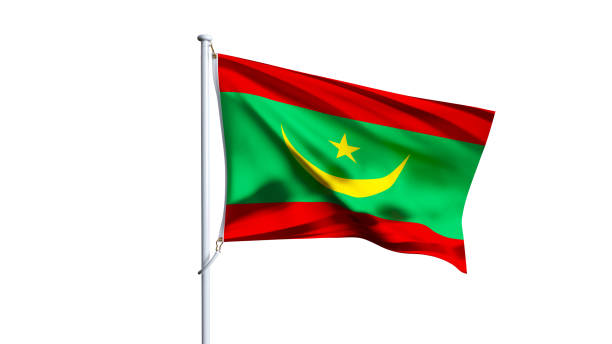
A Promising Start
Mauritania’s Potential as a mining powerhouse is underscored by its vast reserves of untapped mineral wealth. Home to several billion tons of iron ore, Mauritania ranks as the second-largest producer of this essential mineral in Africa. In 2022 alone, the country produced an impressive 13 million tons of iron ore—an achievement driven by proactive government reforms and investor-friendly mining policies. According to the Extractive Industries Transparency Initiative, these strategic measures are positioning Mauritania as a rising force in the global mining landscape.
And guess what? Mining sources say they are well underway to double this by 2030!
How central is mining to Mauritania’s economy?
Mauritania’s Potential for sustained economic growth is reinforced by promising projections from the African Development Bank’s African Economic Outlook 2024. The report forecasts real GDP growth of 4.2% in 2024 and 5.5% in 2025—outpacing both African and global averages. These figures highlight the country’s strong economic trajectory, driven by strategic investments, expanding mining operations, and a stable policy environment that continues to attract international interest.
That above average growth is largely thanks to the activities of the mining sector.
Last year—2023—saw the sector generate many headlines.
Mauritania’s Potential in the mining sector is further demonstrated by the impressive performance of its key industry players. Gold mining company Tasiast Mauritanie Limited S.A. saw its production soar to 620.8 thousand ounces, while the state-owned SNIM (Société Nationale Industrielle et Minière de Mauritanie) achieved a record-breaking output of 14.01 million tons of iron ore. These milestones underscore the country’s growing capacity and competitiveness in the global extractive industry.
Those figures highlight how the extractive industries are not just pillars of the national economy: they are its most dynamic engines of growth.
Mauritania’s Potential as a mineral-rich economy is clearly reflected in the mining sector’s growing impact on national development. The sector’s contribution to GDP surged from 18% in 2021 to 24% in 2022, driven largely by increased extraction of metal ores—especially gold. It also played a vital role in national revenue generation, accounting for approximately 30% of budget inflows in 2022. Leading this growth were SNIM, Tasiast Mauritanie Limited S.A., and Mauritanian Copper Mines, each playing a pivotal role in unlocking the country’s economic promise through mining.
Sector developments and future plans
Mauritania’s Potential to become a key player in the global steel supply chain is rising as the industry shifts toward low-carbon and energy-efficient production methods. The growing demand for high-quality iron ores and DRI (Direct Reduced Iron) pellets—known for requiring less energy and generating less waste—positions Mauritania, and especially SNIM, to capitalize on this emerging trend. With its rich resources and strategic outlook, the country is well-placed to meet the evolving needs of sustainable steel production.
Mauritania’s Potential for long-term industrial growth is underscored by its ambitious plan to double iron ore production capacity to over 45 million tons annually within the next decade. Achieving this goal will require substantial investments in infrastructure, logistics, and processing capabilities. The country is placing a strong emphasis on producing high-grade iron ore and developing iron ore pellets—strategically aligning with the global transition to cleaner, more sustainable steelmaking practices.
Medium to longer terms plans also include moving up the value chain to the production of green steel, initially steel pellets. However, electricity is the backbone of these industrial ambitions, and in parallel, Mauritania is also eyeing the green hydrogen market, aiming to become a hub for this clean energy source. The synergy between mining, green hydrogen, and gas field development will require substantial infrastructure, benefiting not just the mining sector but the broader economy.
The African Development Bank’s role
The African Development Bank has been a key partner in Mauritania’s journey. The Bank has invested heavily in SNIM’s infrastructure, including a $46.9 million loan to widen the access channel to the mineral port of Nouadhibou. This has boosted iron exports and contributed to state revenues. The Bank is also contributing to addressing the energy challenge through initiatives like the Desert-to-Power project, promoting solar energy and improving access to electricity. The Bank’s financial support goes hand in hand with a strong commitment to the country’s compliance with environmental and social standards. This ensures that the benefits of mining are shared widely and sustainably.
Green hydrogen is another exciting frontier. The Bank is providing technical assistance to develop hydrogen plans and attract private sector investments. This aligns perfectly with Mauritania’s goal to produce green steel, adding value to its mining sector.
On a visit to the country in 2022, the President of the Bank, Dr Akinwumi Adesina reviewed with national leadership the overall cooperation between the two parties.
They focused on strengthening the integration of agricultural value chains, supporting young entrepreneurs, strengthening public financial management, ensuring water security in the face of climate change in addition to enhancing the production and processing capacities of iron ore to increase the added value of exportable goods, and services.

Green Hydrogen: The game changer
Speaking of green hydrogen, Mauritania is making bold moves. The Aman project, a $40 billion venture, aims to produce 1.7 million tons of green hydrogen and 10 million tons of green ammonia annually. This project alone could boost Mauritania’s GDP by 50-60% by 2035.
The Nour project, another green hydrogen initiative, has the potential to be one of the largest globally by 2030. Meanwhile, SNIM and ArcelorMittal are exploring the joint production of green steel, which would position Mauritania as a leader in sustainable steel production.
Beyond mining : Other extractive projects
Mauritania’s natural gas reserves are also impressive. The Grand Tortue Ahmeyim gas project is set to start production by the end of 2024, with the Banda BirAllah gas field following close behind. Uranium mining is also on the horizon, with the Tiris project expected to kick off in 2026.
Navigating risks and challenges
Transparency is key to Mauritania’s success. SNIM’s involvement in the Extractive Industries Transparency Initiative demonstrates that the benefits of mining are shared equitably. The African Development Bank Group supports Mauritania in addressing development challenges, from environmental compliance to strengthening human capital and skills development.
Security in the volatile Sahel region is crucial for sustained growth. Mauritania has managed to remain stable, an essential factor for attracting investment and fostering inclusive growth.
With great power comes great responsibility. The heavy reliance on mining exports makes the economy vulnerable to global price fluctuations, highlighting the need to also diversify the economy. The benefits of the scaled-up mining sector will need to be ploughed back into the national economy, into social sectors and enabling infrastructure, and that will be the topic of another blog.
Conclusion: A bright future ahead
Mauritania’s Potential to transform into a prosperous and sustainable economy is within reach, thanks to its abundant natural resources and forward-looking investments. With the right policies, strong governance, and strategic partnerships, the country is well-positioned to harness its mineral wealth and drive inclusive development. By aligning resource management with long-term national goals, Mauritania can unlock a future marked by economic resilience and shared prosperity.
Source: AFDB
Visit our Groconsult on: LINKEDIN, INSTAGRAM and X for subsequent articles.

Share This:
- GroConsult
- No Comments

Running a successful business in Africa requires focus on your core operations. But navigating the complexities of tax and payroll regulations can be a significant time drain and a potential minefield of legal repercussions.
GroConsult: Your Partner in Compliance
At GroConsult, we understand the challenges businesses face when it comes to tax, payroll, and statutory filings in Africa. We offer a comprehensive suite of services designed to ensure your company operates smoothly and compliantly across the continent.

Here’s how we can help you avoid penalties and stay focused on growth:
Tax Expertise:
Tax Compliance & Planning: Our tax specialists stay up-to-date on ever-changing regulations across various African countries. We help you navigate tax obligations, identify deductions and credits, and develop tax-saving strategies.
Corporate Tax Returns: We handle the preparation and filing of your corporate tax returns, ensuring accuracy and adherence to deadlines.
Tax Audits & Disputes: Should you face a tax audit, GroConsult’s experienced professionals will represent you and advocate for your best interests.
Streamlined Payroll Services:
Payroll Processing & Administration: We handle all aspects of payroll, from calculating salaries and deductions to managing employee benefits and tax withholdings.
Global Payroll Solutions: Whether you have a small local team or a large multinational workforce, GroConsult can manage your payroll seamlessly across borders.
Compliance with Local Labor Laws: We ensure your payroll practices comply with all relevant labor laws and social security regulations.
Comprehensive Statutory Filings:
Meeting Regulatory Requirements: We keep track of all statutory filing deadlines and handle submissions on your behalf, ensuring you remain compliant with local authorities.
Reduced Administrative Burden: Let us take care of the paperwork, freeing you and your team to focus on core business activities.
Minimized Risk of Penalties: Non-compliance with statutory filing requirements can result in hefty fines and penalties. GroConsult helps you avoid these risks.
Why Choose GroConsult?
Local Expertise, Global Reach: Our team combines in-depth knowledge of African regulations with extensive experience serving international clients.
Peace of Mind & Focus: With GroConsult managing your tax, payroll, and statutory filings, you can concentrate on running your business with confidence.
Cost-Effectiveness: Our services help you avoid costly penalties and ensure efficient resource allocation.
Don’t let tax and compliance issues hinder your success in Africa. Contact GroConsult today for consultation and discover how we can help your business thrive.
Together, we can ensure your company operates legally, efficiently, and profitably across the African continent.
With a proven track record of supporting industry leaders such as Huawei, Nokia, General Electric, Ericsson, Baker Hughes, Tullow Oil, MTN, Vodafone, and Airtel, GroConsult has the expertise and experience to help your business succeed in Africa. Our comprehensive EOR services are designed to address the unique challenges of the African market, providing you with the support needed to navigate regulatory complexities, manage your workforce effectively, and achieve your business goals.
Ready to overcome the challenges of expanding into Africa? Partner with GroConsult to unlock the full potential of the African market. Schedule a meeting with us today to discuss how our comprehensive EOR services can support your business and help you achieve your strategic objectives. Let’s embark on this journey together and make your expansion into Africa a resounding success.
Contact Us Now to Schedule a Meeting and Explore Partnership Opportunities!
By choosing GroConsult, you gain a trusted partner committed to your success, with the expertise and resources to navigate the complexities of the African market and drive your business forward. Let’s build the future of your business together.
Follow us on: LinkedIn, Instagram, and X

Share This:
- GroConsult
- 2 Comments
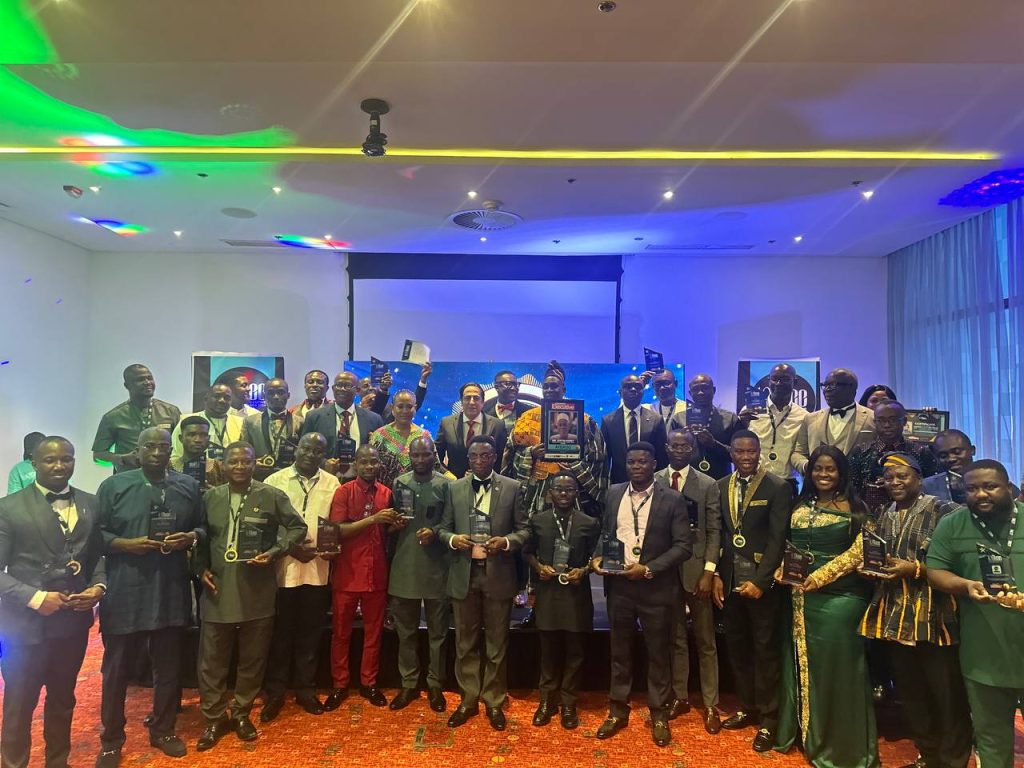
We are thrilled to announce that GroConsult Management Consortium has been named the Consulting Firm of the Year at the prestigious 10th Business Executive Excellence Awards 2024. This remarkable achievement is a testament to our unwavering commitment to delivering exceptional services and driving the success of our clients across Africa.
The Business Executive Excellence Awards, hosted by The Business Executive, is Ghana’s premier event recognizing the remarkable achievements of the country’s business leaders and organizations. For the past decade, this esteemed awards ceremony has been shining a spotlight on the trailblazers – those visionary individuals and forward-thinking companies that are pushing the boundaries of what’s possible in the Ghanaian business world.

The 10th edition of the Business Executive Excellence Awards held on Friday 28th June, 2024, was truly a remarkable event, filled with inspiring keynotes, insightful panel discussions, and, of course, the highly anticipated awards ceremony. One of the highlights of the evening was the keynote address delivered by Mr. Austin Gamey, the founder and CEO of Gamey & Gamey Group. In his thought-provoking speech, Mr. Gamey emphasized the importance of human resources and customer-centricity, making a poignant statement that “in Ghana, employees are paid based on presence at the office but not based on result.”
The awards ceremony itself was a true celebration of excellence, with the Lebanese Ambassador to Ghana, H.E. Maher Kheir, taking the stage to present the Consulting Firm of the Year award to GroConsult’s CEO, Mr. Romeo Triumph Jones. This prestigious accolade is a testament to our team’s unwavering commitment to delivering exceptional services and driving the success of our clients.
A Decade of Celebrating Excellence
The Business Executive Excellence Awards first launched in 2014 with the goal of recognizing the custodians of corporate Ghana. In those early years, the awards ceremony was a modest affair, but it quickly gained traction as word spread of its commitment to honoring true excellence. As the years passed, the awards grew in both scale and prestige.
The organizers expanded the categories to ensure that they were recognizing the full breadth of achievement, from innovative startups to long-standing industry titans. But through it all, they remained steadfast in their mission to celebrate those who are making a significant impact on the growth and development of Ghana’s business landscape.
Today, the Business Executive Excellence Awards is the premier event for the Ghanaian business community. Each year, hundreds of nominations are received from companies and individuals across a wide range of sectors, all vying for the chance to be recognized as the best of the best.
The selection process is rigorous, with a panel of esteemed judges meticulously evaluating each submission based on a set of stringent criteria. Only those who have demonstrated exceptional performance, innovative thinking, and a steadfast commitment to their stakeholders are selected as finalists.
GroConsult’s Journey to Excellence
GroConsult Management Consortium has been on a remarkable journey since its inception. Over the years, we have evolved from a small consulting firm to a leading provider of comprehensive business solutions, including Immigration Support, Global HR Outsourcing, Payroll & Tax Compliance, and Audit & Accounting Services.
Our team of seasoned professionals has consistently demonstrated their expertise in navigating the complex business landscape, empowering organizations to thrive in the African market.
Through our unwavering commitment to excellence and our ability to adapt to the ever-changing needs of our clients, we have established ourselves as a trusted partner for businesses seeking to expand their reach and maximize their impact on the continent.
“We are honored to be recognized as the Consulting Firm of the Year,” said Baron Romeo Triumph Jones, CEO of GroConsult. “This award is a reflection of the hard work, dedication, and innovative spirit of our entire team. We remain committed to pushing the boundaries of what’s possible and providing our clients with the tools and support they need to achieve their goals.” When he met with the team earlier this morning in their corporate weekly review meeting.
Celebrating the Custodians of Corporate Ghana
The culmination of the Business Executive Excellence Awards process is the annual awards ceremony, where the crème de la crème of Ghana’s business community gathers to celebrate their achievements. It is a night of unbridled excitement, as the winners are unveiled and honored for their contributions to the growth and prosperity of our nation.
From the tech visionaries revolutionizing the way we live and work, to the manufacturing titans driving industrial innovation, to the financial leaders steering our economy towards new heights – each and every one of our award recipients represents the very best of corporate Ghana.As GroConsult Management Consortium takes its place among these luminaries, we are humbled by the recognition and inspired to continue our mission of excellence.
Our victory at the 10th Business Executive Excellence Awards is a testament to our commitment to delivering world-class services and driving the success of our clients.
Shaping the Future of Business in Africa
At GroConsult, we believe that the key to success lies in our ability to adapt and innovate. As the business landscape continues to evolve, we remain committed to staying ahead of the curve, anticipating the needs of our clients, and developing solutions that drive their growth and success. Our team of experts is constantly researching emerging trends, analyzing market data, and collaborating with industry leaders to identify new opportunities and develop cutting-edge strategies. We are not content to rest on our laurels; instead, we are always pushing the boundaries of what’s possible, constantly striving to deliver even better results for our clients.
Join Us in Shaping the Future of Business
As we look ahead to the next chapter of our journey, we invite you to join us in shaping the future of business in Africa and beyond. Whether you are a business leader, an aspiring entrepreneur, or simply someone who believes in the power of achievement, we welcome you to partner with GroConsult and experience the difference that our expertise can make.
Together, let us continue to push the boundaries of what’s possible, driving innovation, creating value, and making a lasting impact on the African business landscape. Contact us today to learn how GroConsult can help your business thrive in the ever-evolving world of global business.
Share This:
- GroConsult
- No Comments

Africa is rapidly emerging as a focal point for global business expansion. With its rich natural resources, burgeoning tech ecosystems, and dynamic markets, the continent presents a wealth of opportunities for investors, contractors, and consultants. This demand is driven by the influx of foreign investors, contractors, and consultants seeking to capitalize on the continent’s vast economic opportunities in industries ranging from mining and manufacturing to technology and tourism. However, navigating the diverse and complex regulatory, economic, and cultural landscapes of African countries can pose significant challenges.
Streamlining Global Expansion with GroConsult
GroConsult has a proven track record of supporting multinational corporations, including industry leaders like Huawei, Nokia, General Electric, Ericsson, Baker Hughes, Tullow oil, MTN, Vodafone, and Airtel, Bosch, etc in their African expansion efforts. Our team of experienced professionals has deep knowledge of the local business environments and can help you overcome the unique challenges you may face.
GroConsult is your trusted partner for seamless and successful expansion into the African market.
Immigration Support Services
One of the primary hurdles companies face when expanding into Africa is managing immigration and visa processes for their employees. Each country has its own set of regulations and requirements, which can be time-consuming and complicated to navigate. GroConsult’s Immigration Support Services simplify this process, ensuring compliance with local laws and smooth relocation for your employees.
How We Help:
- Visa and Work Permit Processing: We handle all aspects of visa and work permit applications, ensuring timely approvals and compliance with local immigration laws.
- Relocation Assistance: Our services include support with housing, transportation, and settling-in services to make the transition as smooth as possible for your employees.
- Compliance Monitoring: We stay updated with changes in immigration laws and regulations to ensure ongoing compliance and avoid any legal issues.
Global HR Outsourcing
Managing human resources in a foreign country can be challenging, especially with varying labor laws, cultural differences, and administrative burdens. GroConsult’s Global HR Outsourcing services take the hassle out of HR management, allowing you to focus on your core business operations.
How We Help:
- Recruitment and Onboarding: We manage the recruitment process from start to finish, ensuring you hire the best local talent. Our onboarding services help new hires integrate seamlessly into your company culture.
- Employee Benefits Management: We design and administer competitive benefits packages tailored to the local market, helping you attract and retain top talent.
- HR Compliance: Our experts ensure that your HR practices comply with local labor laws and regulations, minimizing risks and protecting your business from legal issues.
Payroll & Tax Compliance
Payroll and tax compliance can be particularly daunting in Africa due to varying tax regulations, frequent changes in tax laws, and complex payroll requirements. GroConsult’s Payroll & Tax Compliance services ensure accurate and timely payroll processing, while keeping your business compliant with local tax laws.
How We Help:
- Payroll Processing: We manage all aspects of payroll, including salary calculations, deductions, and disbursements, ensuring accuracy and timeliness.
- Tax Filing and Compliance: Our team of experts handles tax calculations, filings, and payments, ensuring compliance with local tax laws and regulations.
- Audit Support: In the event of a tax audit, we provide comprehensive support to ensure a smooth and successful audit process.
Global Staff Management
Managing a global workforce requires effective communication, cultural understanding, and robust management practices. GroConsult’s Global Staff Management services provide the tools and support needed to manage your international team effectively.
How We Help:
- Performance Management: We implement performance management systems to track employee performance and provide feedback, helping you maximize productivity and employee satisfaction.
- Training and Development: Our training programs are designed to enhance the skills and capabilities of your workforce, ensuring they are well-equipped to meet your business needs.
- Employee Relations: We foster positive employee relations through effective communication and conflict resolution strategies, creating a harmonious and productive work environment.
Strategic Business Planning & Support
Entering a new market requires careful planning and strategic decision-making. GroConsult’s Strategic Business Planning & Support services provide the insights and expertise needed to develop a successful market entry strategy and achieve your business objectives.
How We Help:
- Market Research and Analysis: We conduct thorough market research to identify opportunities and challenges, helping you make informed decisions about your market entry strategy.
- Business Planning: Our experts work with you to develop a comprehensive business plan that aligns with your goals and objectives, ensuring a clear path to success.
- Strategic Partnerships: We leverage our extensive network to help you establish strategic partnerships and collaborations, enhancing your market presence and competitive advantage.
Business Registration Services
Setting up a business in a foreign country involves navigating complex regulatory requirements and administrative processes. GroConsult’s Business Registration Services streamline the setup process, ensuring compliance with local laws and a smooth entry into the market.
How We Help:
- Company Incorporation: We manage the entire incorporation process, from filing the necessary paperwork to obtaining required licenses and permits.
- Regulatory Compliance: Our team ensures that your business complies with all local regulations, minimizing risks and avoiding legal issues.
- Administrative Support: We provide ongoing administrative support, including office setup, legal representation, and more, ensuring your business operates smoothly from day one.
Audit & Accounting Services
Accurate financial management is crucial for any business, especially when operating in a foreign market. GroConsult’s Audit & Accounting Services provide the expertise and support needed to manage your finances effectively and ensure compliance with local accounting standards.
How We Help:
- Financial Reporting: We prepare accurate and timely financial reports, providing insights into your business’s financial performance and helping you make informed decisions.
- Audit Services: Our audit services ensure compliance with local accounting standards and provide assurance to stakeholders about the accuracy of your financial statements.
- Accounting Support: We offer comprehensive accounting support, including bookkeeping, tax planning, and financial analysis, ensuring your business’s financial health and stability.
Our comprehensive EOR services are designed to address the unique challenges of the African market, providing you with the support needed to navigate regulatory complexities, manage your workforce effectively, and achieve your business goals.
Ready to overcome the challenges of expanding into Africa?
Partner with GroConsult to unlock the full potential of the African market. Schedule a meeting with us today to discuss how our comprehensive EOR services can support your business and help you achieve your strategic objectives. Let’s embark on this journey together and make your expansion into Africa a resounding success.
Contact Us Now to Schedule a Meeting and Explore Partnership Opportunities!
By choosing GroConsult, you gain a trusted partner committed to your success, with the expertise and resources to navigate the complexities of the African market and drive your business forward. Let’s build the future of your business together.

Share This:
- GroConsult
- No Comments

Akinwumi Adesina wants one of the legacies of his tenure at the African Development Bank to be Africa’s own credit rating agency, run from the continent. He tells Chris Bishop why.
He’s had his critics over the last eight years, but you could never really fault Akinwumi Adesina for a lack of passion and resilience. The newspapers have called him Africa’s optimist-in-chief; surely, the Nigerian would have been a poor president of the AfDB if he were a pessimist.
This is Adesina’s valedictory year and he will be circling the globe talking to investors and world leaders with his brand of pragmatism blended with irrepressible optimism.
Within a week of this fleeting trip to London he was at the G7 Leaders’ Summit, shaking hands with world leaders including US President Joe Biden, India’s Prime Minister Narendra Modi and the Pope.
I have been interviewing him for more than a decade, ever since he served as minister of agriculture in Nigeria, and he has lost none of his irrepressible energy.
“It is not a job, it is a mission. I have been given the trust and the resources and the platform to develop the continent of my birth and I will breathe that mission until the very last minute of my assignment. You will probably have to remind me that they have elected a new president before I stop working!”
Before more than a hundred invited guests at the Chatham House think tank, in St James’s Square in the heart of London, Adesina is up on the podium giving it everything on behalf of a mineral-rich continent that is still poor.
Numbers, statistics and stories tumble forth at breakneck speed; Adesina is a flamboyant storyteller, who speaks urgently and gestures with his hands to make the point.
His mannerisms are the fruit of a remarkable life: born among Nigerian poor, forged in a top university in the United States and seasoned by numerous missions in the corridors of power.
That can-do Ivy League approach to life came to the fore very recently, according to one of his aides.
Adesina would have make a journey on a boat for work: a safety officer asked him if he could swim.
“No,” was the answer.
But Adesina didn’t need asking twice; he donned a bathing suit and learned the crawl and breaststroke, at the age of 64, before completing his (incident-free) journey.
Africa’s challenges multiply
We repair to the 135-year-old Savoy Hotel, in the Strand, for the interview. It was the first hotel in Britain to adopt electric light bulbs; Adesina is very mindful of the fact that more than a century later millions of Africans have yet to flick their first switch.
His suite overlooks Waterloo Bridge, which spans the grey River Thames. Three kilometers downstream is London Bridge, where every morning hundreds of financiers, who handle the very capital that Adesina wants to channel to Africa, walk across the river to their offices in the City of London.
For Adesina, forever on the hunt for new sources of capital that the continent can tap, the challenges facing Africa are as urgent as ever.
When I attended Adesina’s first speech as African Development Bank president in Johannesburg, he told me he wanted “a new Africa that people want to come to, and not move out of”.
Eight years on, the large-scale migration of Africans to Europe and elsewhere continues, and remains a huge political and economic issue on both sides of the Mediterranean.
The number of irregular border crossings at the EU’s external border in 2023 reached a total of approximately 380,000, driven by a rise in arrivals via the Mediterranean region, according to preliminary calculations by Frontex. This marks the highest level since 2016 and constitutes a 17% increase from the figures in 2022, indicating a consistent upward trend over the past three years.
As the exodus continues, does Adesina’s vision still hold true?
“I think first of all I am not against legal migration. Legal migration should continue to go ahead because that is a labour market where people can move their skills and that’s ok,” he says.
“It is the forced illegal migration that I think is a big challenge. People forget that 85% of the migration of young people in Africa is internal; people moving from one country to another. But it does get exaggerated because of the media [coverage] when people sink on the Mediterranean. But Africa’s heartland is not emptying into it – that is what I am saying.”
He acknowledges that a complex range of factors continue to push both internal and external African migration.
“We need to also understand that a number of factors have been pushing that. Climate change has made it much more difficult too. A lot of internal conflicts are because of poverty, inequality or pressure over resources and politically motivated conflicts that we have had.”
But there are perils in remaining at home, too. Adesina warns that if large numbers of Africans are unemployed in unproductive countries, terrorists will find it easy to recruit then, as has happened in Mozambique.
With so many challenges facing the continent, does he despair sometimes?
“I don’t despair. I just look at challenges we need to fix. For example, consider the growth process that we talk about quite a lot. Yes, I am happy with the growth figure that we have: it is not the level that we wanted, but we still have 10 of the 20 fastest-growing economies in the world.”
It’s a long way to the top
Adesina’s familiarity with the impossible choices faced by the poor is etched into his DNA. He is the son
of a former farm worker from Ibadan, 128 km north east of Lagos, for whom toil in the soil is bred-in-the-bone. His life is a remarkable Africa tale of ambition, inspiration, grit and application. Adesina grew up sleeping on a mat, alongside his brothers, without running water or proper toilets.
“Ï grew up very poor. My grandfather and father used to work on other people’s farms for a penny a day,” Adesina told me in Johannesburg, in 2019.
One word drove the life of Adesina senior: education. Every night he would take out a blackboard in the tiny family home and teach his young sons English and arithmetic.
“One day, he told us that the difference between his life and that of the permanent secretary at work was like the difference between light and darkness. But he said to us that if we worked for an education, we and the children of the permanent secretary would be at the same level,” says Adesina.
His father saved almost every penny he earned to put his sons through school. Yet he didn’t send his sons to a private school. Instead, they went to a village school with 60 in a class.
“He wanted us to understand rural poverty. It allowed me to form an idea of what to do with my life. It taught me that poverty is real, and I grew out of it myself,” says Adesina.
The village school also taught the young Adesina the power of agriculture over the life of poor people. He saw that when the crops grew there was always money to keep the children at school; if the crops failed, the children were taken out of school to work.
He sailed through school with flying colours and passed enough exams to enter university by the time he was 14 – success that prompted some tension with his father, who had dreamed of a medical career for Akinwumi.
“My father threw a fit because he thought that agriculture was where he had come from. He wasn’t happy. In the end, my father said to me: Akin, God must really want you in agriculture,” recalls Adesina.
Adesina studied for a bachelor’s degree in agricultural economics at the University of Ife in Nigeria in 1981. He followed it up with a PhD in the same subject, in 1988, from Purdue University, Indiana, one of the best agricultural schools in the United States.
He leveraged his agricultural expertise in his role as a senior economist at West African Rice Development Association; as a senior scientist at Rockefeller Foundation; and, most significantly, as Nigeria’s agriculture minister from 2010 to 2015. It was his success in this role – and the contacts he reaped – that allowed him to launch his bid for president of the African Development Bank.
A lending machine
So what has been the significance of his two-term presidency at Africa’s premier multilateral institution, and to what extent has he made headway with solving the continent’s most pressing challenges?
First and foremost, Adesina says, in his eight years at the helm he has increased the pool of capital available to the AfDB to invest in the continent.
When he took over, he first increased the pool to $201bn by 2019: it stands at stands at $318bn today, he says.
He points out projects where some of those billions have already been deployed. He says $50bn has been poured into infrastructure in the last eight years, and billions more to agriculture.
He reels off what he considers the bank’s major achievements. “Ethiopia is self-sufficient in wheat in less than in four years. We are setting up $1.7bn agricultural processing zones and infrastructure that will allow value chains to emerge,” he says.
“In Benin, they used to export cotton fibre. Since we set up agri-processing zones two years ago 100% of their fibre is processed into textile garments. All their cash used to go to Vietnam!”
Recently he spoke to a group of investors who wanted to export bauxite from Africa.
“I told them why don’t you go for aluminium and not just bauxite, otherwise the profits will be made in another country and you will end up poor!’”
Yet Adesina admits capital investment is not reaching the poor people who live in rural areas. Macrotrends estimates more than 698m people in Sub Saharan Africa alone live in rural areas – around 57% of the population – more than three times the population of Nigeria.
“A lot of that (capital) that goes into Africa for infrastructure goes into urban areas; the bulk of the population is in rural areas. So, if you are going to really get a lot of people out (of poverty), you have to turn those rural economies, because, literally I can tell you, those rural economies are nothing more than zones of economic misery.”
Africa’s unfair risk premium
But even as his term draws to a close, Adesina is still making sure Africa’s concerns are high up in the global agenda.
In recent months, he has argued repeatedly that the cost of capital is too high in Africa – driven by an outdated “risk premium” placed on the continent by outside investors and credit ratings agencies. In particular, Africa is constrained by a dearth of longer term, cheaper, so-called concessional capital, he claims.
“Concessional financing has plummeted in Africa. It used to be that the debt exposure of African countries was about 52% concessional financing in 2010; today it is 25%. As that has gone down many countries are going to the capital markets, they are going to private lenders and commercial lenders…When you have a lot of commercial creditors, it is different, you need to walk smarter.
“What I am asking for is transparency, it is accountability… we want economies to grow in a way that is sustainable without accumulating nonsensical debt,” says Adesina.
What grieves Adesina is that when African nations do go to the commercial lenders they risk paying through the nose. Africa’s debt service payments will be $74bn this year, up from $17bn in 2010, according to the AfDB.
“The cost of raising capital in Africa is three or four times what it is in other regions. Why? Because of the so-called Africa premium. A country in Latin America – a BB country in terms of credit ratings – raises money with a country in Africa. The one in Africa pays 1.1 percentage points more in interest… The issue is perception, the perception is not reality – data matters,” he says.
“Something happens in one part of Africa and they say the whole of Africa is a problem. You have a situation where a coup happened in Niger and President Ruto of Kenya was telling me as a result of that he had to pay 220 basis points higher for his bond issue because of Niger; even though Niger is nowhere near Kenya!”
Adesina wants one of the legacies of his tenure to be Africa’s own ratings agency, run from the continent instead of Washington and London. The shareholder countries of the AfDB have mandated the bank to look into ways of doing it.
“It is not to compete with any ratings agencies… but to be able to get proper assessment of risks, to be able to compare methodologies, and be able to give a fair assessment. Some people think it is going to be political. It is absolutely not. That is crap,” he says.
“It is just to make sure that Africa’s risks are properly understood and better priced.”
It is going to be a tall order for Adesina’s technocrats to come up with a workable plan to achieve this in his final year. If he does, it could be one of the major landmarks in his tenure running the AfDB.
At the same time, Adesina also wants to raise funding from Africa’s own capital markets.
“It is not just foreign-currency-denominated financing that matters; we also need to employ domestic capital markets and employ a lot more local currency financing, which we are doing. We are doing local currency bond issues in Tanzania shillings, Uganda shillings, Nigerian naira, Ghanaian cedis and all of that,” he says.
Adesina says that governments still have a vital role to play in supporting the bank’s work.
“The whole issue of framing the issue by saying the government should get out of it and let the private sector do it, is misdirected. The government cannot abdicate their responsibility. In all developed countries, whether you are talking about energy, or even aviation, medicines, infrastructure, or security, it is all about government,” he counters.
“Government has to set the right policies the right investment environment, the government also has to inject money to create public goods. The private sector is not going to set up public goods so let’s not get ourselves confused.”
End of an era
Now, as Adesina’s time as president of the AfDB draws to a close, the jockeying to be his successor has already begun. Observers say the new president needs to be a strong, decisive and visionary.
Whoever wins next year’s election faces an enormous in-tray. With many African countries still struggling under mounting debt, depreciating currencies, high inflation, and sluggish global growth, the role of the AfDB in contributing to sustainable economic development is even more important.
The current president has been lobbying hard to have the Special Drawing Rights of the IMF channelled to the AfDB to increase the continent’s fire power to accelerate development.
The onus will be on the new incumbent to press ahead with this, to win the argument on concessional financing, and to get the funding to where it is needed the most. Adesina has laid the groundwork but it is now time for others to pick up the baton.
As he looks for his next challenge, I ask Adesina whether he has any regrets.
“No. I always say: when God created people he gave them two eyes in front because he expected them to be looking forward. If he wanted them to be looking behind, he would have put two eyes behind the head.”
Source: African Business
Share This:
- GroConsult
- No Comments

Expanding your business into a new market is an exciting opportunity for growth and increased revenue. However, it comes with a unique set of challenges that can be daunting for even the most experienced companies. Successfully navigating these challenges requires strategic planning, local expertise, and effective resource management. Here, we explore five common challenges businesses face when entering a new market and how to overcome them, highlighting how GroConsult can support your expansion with our comprehensive services.
1. Understanding Local Regulations and Compliance
Challenge: Navigating the maze of local regulations and compliance requirements is often the most daunting aspect of entering a new market. Every country has its own set of laws governing business operations, including tax policies, labor laws, and industry-specific regulations. Non-compliance can result in hefty fines, legal issues, and a damaged reputation.
Solution: Thorough research and expert guidance are crucial. Engage with local legal and business experts who can provide insights into the regulatory landscape and help you navigate it effectively. Additionally, partnering with a company like GroConsult can simplify this process significantly. Our Business Registration Services and Audit & Accounting Services ensure that your business complies with all local laws and regulations, allowing you to focus on your core operations.
At GroConsult, we have years of experience helping businesses establish themselves in new markets. Our team of experts ensures that all regulatory requirements are met, providing peace of mind and a solid foundation for your operations.
2. Cultural Differences and Market Dynamics
Challenge: Understanding the cultural nuances and market dynamics of a new region is critical for success. What works in one market might not necessarily translate to another due to differences in consumer behavior, preferences, and business practices.
Solution: Conduct comprehensive market research to understand the local culture, consumer preferences, and business etiquette. Tailor your products, services, and marketing strategies to align with local expectations. Engaging local experts and leveraging local partnerships can provide invaluable insights.
GroConsult’s Strategic Business Planning & Support service offers in-depth market analysis and strategic guidance, helping you adapt your business model to the local context. Our local expertise and extensive network in various regions ensure that you have the necessary insights to navigate cultural differences effectively.
3. Building a Reliable Local Team
Challenge: Finding and retaining skilled employees in a new market can be challenging. Understanding the local labor market, employment laws, and effective recruitment strategies is essential for building a reliable team.
Solution: Partner with local HR experts or agencies that understand the local talent pool and can assist with recruitment and onboarding. Implementing effective HR practices that align with local labor laws and cultural expectations is also crucial.
GroConsult’s Global HR Outsourcing and Global Staff Management services provide end-to-end solutions for managing your workforce. From recruitment and onboarding to ongoing HR management, we ensure that you have the right team in place to drive your business forward. Our expertise in local labor markets across various regions ensures that you can attract and retain top talent.
4. Managing Logistics and Supply Chain
Challenge: Establishing a reliable logistics and supply chain network in a new market can be complex. Ensuring the efficient movement of goods and services while managing costs and maintaining quality standards requires careful planning and execution.
Solution: Develop a robust supply chain strategy that includes reliable local partners and suppliers. Invest in technology and systems that provide visibility and control over your supply chain operations. Regularly review and optimize your logistics processes to ensure efficiency.
GroConsult’s extensive experience in Logistics and Supply Chain Management ensures that your operations run smoothly. We help you identify and partner with reliable local suppliers, manage logistics, and optimize your supply chain processes. Our tailored solutions ensure that your goods and services are delivered efficiently and cost-effectively.
5. Financial Management and Currency Fluctuations
Challenge: Managing finances in a new market involves dealing with different currencies, banking systems, and financial regulations. Currency fluctuations can impact your profitability and financial stability.
Solution: Implement robust financial management practices and systems that provide real-time visibility into your financial performance. Consider using hedging strategies to mitigate the impact of currency fluctuations. Partnering with local financial experts can also help navigate the complexities of the local financial environment.
GroConsult’s Payroll & Tax Compliance and Audit & Accounting Services ensure that your financial operations are compliant and efficient. Our team of financial experts helps you manage currency risks, optimize tax strategies, and ensure accurate and timely financial reporting. With GroConsult, you can navigate the financial complexities of a new market with confidence.
Expanding into a new market is a significant undertaking that requires careful planning and execution. By understanding and addressing the common challenges associated with market entry, businesses can position themselves for success. Partnering with an experienced and reliable service provider like GroConsult can make all the difference.
With our comprehensive suite of services, including Immigration Support Services, Relocation Services, Global HR Outsourcing, Payroll & Tax Compliance, Global Staff Management, Strategic Business Planning & Support, Business Registration Services, and Audit & Accounting Services, we provide the support you need to navigate the complexities of entering a new market.
Get in touch with us
Ready to expand your business into a new market? Let GroConsult be your trusted partner. Subscribe to our newsletter for the latest insights and strategies, or contact us today to learn how our expert services can support your global expansion efforts. Together, we can achieve excellence and drive your business to new heights.
By addressing these five challenges with strategic solutions and leveraging the expertise of GroConsult, businesses can successfully enter and thrive in new markets. Our commitment to excellence, reliability, and comprehensive support ensures that your expansion efforts are smooth, compliant, and strategically sound.
Contact us today to start your journey towards global success.

Share This:
- GroConsult
- No Comments

In April 2024, the market capitalization of the Ghana Stock Exchange (GSE) surged to an unprecedented GH¢80.20 billion, marking a significant milestone.

This remarkable increase was driven by substantial gains in the share prices of various companies, underscoring the positive market sentiment and bolstered investor confidence.
As outlined in the GSE’s April 2024 Summary of Market Activities, the GSE Composite Index experienced a notable surge of 6.68 percent during the month, contributing to a year-to-date gain of 17.7 percent. Additionally, the Financial Stock Index saw a gain of 2.14 percent.
Among the standout performers in April 2024 were GCB with a 23.03% increase, MTN Ghana with 10.76 percent, Camelot with 10 percent, Access Bank with 7.87 percent, New Gold with 5.72 percent, SIC with 4.17 percent, Unilever with 1.27 percent, BOPP with 0.33 percent, and TotalEnergies with 0.11 percent growth.
Simultaneously, the Ghana Fixed Income Market experienced a surge in trade volumes, reaching 11.34 billion, a substantial 98.47 percent rise compared to the previous year’s 5.71 billion.
Notably, long-term government securities contributed 30.10 percent to the overall market activity, while short-term government instruments made up 69.51 percent of the market’s activity during the period under review.
Source: graphic.com
Join our community on; LinkedIn, Instagram & X

Share This:
- GroConsult
- No Comments

As Côte D’Ivoire emerges from a period of economic turbulence, the nation’s rebound signifies not just a triumph for its local industries, but also a beacon of opportunity for global businesses. This resurgence is characterized by robust economic policies, increased foreign investment, and a dynamic entrepreneurial spirit. For companies looking to expand their footprint in Africa, partnering with GroConsult offers a strategic advantage.
The Economic Revival of Côte D’Ivoire
Côte D’Ivoire’s economic recovery is powered by significant reforms aimed at enhancing business operations and attracting foreign direct investment. The government’s initiatives focus on infrastructure development, boosting agricultural productivity, and fostering an enabling environment for businesses. This positive trajectory presents an opportune moment for companies to invest in or expand their operations within this vibrant market.
GroConsult: Your Ideal Partner for Expansion
At GroConsult, we provide comprehensive solutions that facilitate seamless market entry and operations for businesses in Côte D’Ivoire and across Africa. Our expertise in Immigration Support Services, Global HR Outsourcing, Payroll & Tax Compliance, Global Staff Management, and Strategic Business Planning & Support positions us as the partner of choice for businesses seeking to capitalize on Côte D’Ivoire’s economic resurgence.
Immigration Support Services
Navigating the complexities of immigration regulations is a critical aspect of establishing a business presence in Côte D’Ivoire. GroConsult’s Immigration Support Services ensure that your expatriate staff can transition smoothly and legally, minimizing disruptions and ensuring compliance with local laws. Our comprehensive support covers visa processing, work permits, and residence permits, allowing your team to focus on driving business growth.
Global HR Outsourcing and Management
Effective human resource management is crucial for maintaining operational efficiency and achieving business objectives. GroConsult’s Global HR Outsourcing and Global Staff Management services provide tailored solutions that address the unique challenges of managing a diverse workforce in Côte D’Ivoire. From recruitment and onboarding to training and performance management, we ensure that your human capital is optimized for success.
Payroll & Tax Compliance
Navigating payroll and tax regulations can be daunting, especially in a foreign market. GroConsult offers expert Payroll & Tax Compliance services that ensure your business adheres to local tax laws and payroll regulations. Our team of specialists manages payroll processing, tax filings, and compliance reporting, reducing the risk of legal complications and financial penalties.
Strategic Business Planning & Support
Entering a new market requires a strategic approach to business planning and support. GroConsult’s Strategic Business Planning & Support services provide comprehensive market analysis, business strategy development, and operational support tailored to your specific needs. We help you identify opportunities, mitigate risks, and implement strategies that drive growth and profitability.
GroConsult is more than just a service provider; we are your strategic partner in navigating the complexities of the African market. Our commitment to excellence, reliability, and world-class service ensures that your business operations in Côte D’Ivoire and beyond are efficient, compliant, and poised for success. Here’s why GroConsult stands out:
- Local Expertise with Global Reach: Our deep understanding of local markets, combined with our global perspective, allows us to offer solutions that are both locally relevant and globally competitive.
- Comprehensive Service Offering: From immigration support to payroll compliance, we provide a full spectrum of services that address all aspects of business operations in Africa.
- Proven Track Record: Our successful track record of supporting businesses in Africa speaks to our ability to deliver results and drive growth for our clients.
- Customized Solutions: We understand that every business is unique, and we tailor our services to meet your specific needs and objectives.
As Côte D’Ivoire bounces back, the opportunities for business growth and expansion are immense. Partnering with GroConsult ensures that your entry into this promising market is smooth, compliant, and strategically sound. Let us help you unlock the potential of Côte D’Ivoire and the broader African market. Together, we can achieve excellence and drive global success.
For more information on how GroConsult can support your business in Côte D’Ivoire, please contact us today. Let’s embark on this journey of growth and prosperity together.
Join our community on; LinkedIn, Instagram & X

Share This:
- GroConsult
- No Comments

The West African country looks to sustain growth based on rising productivity.
Côte d’Ivoire, the world’s top producer of cocoa and third-largest supplier of cashews, enters the new year with optimistic growth expectations. The World Bank projects a GDP growth rate of 6.5% in 2024 and 2025, while the International Monetary Fund (IMF) anticipates similar gains.
The World Bank adds that continued investment in network infrastructure, especially in the digital and transport sectors, as well as recent oil discoveries, alongside prudent macroeconomic policies, will boost business confidence and productivity in the country.
The outlook and expectations for the Ivorian economy in 2024 depend on political stability, economic reforms, and global conditions, according to Stéphane Eholie, founder and CEO of Ivorian transport and logistics company Societe Ivoirienne de Manutention et de Transit (Simat).
“The country is experiencing one of the fastest economic growth rates in sub-Saharan Africa,” he notes. “After the Covid-19 pandemic, the country has returned to strong growth and continues to have an important role as a regional economic hub.” Growth is expected to return to the pre-Covid era, when the economy achieved rates of up to 8%.
Yet, such expectations are subject to significant downside risks, mainly due to the Russia-Ukraine conflict, which has caused currency and inflation fluctuations.
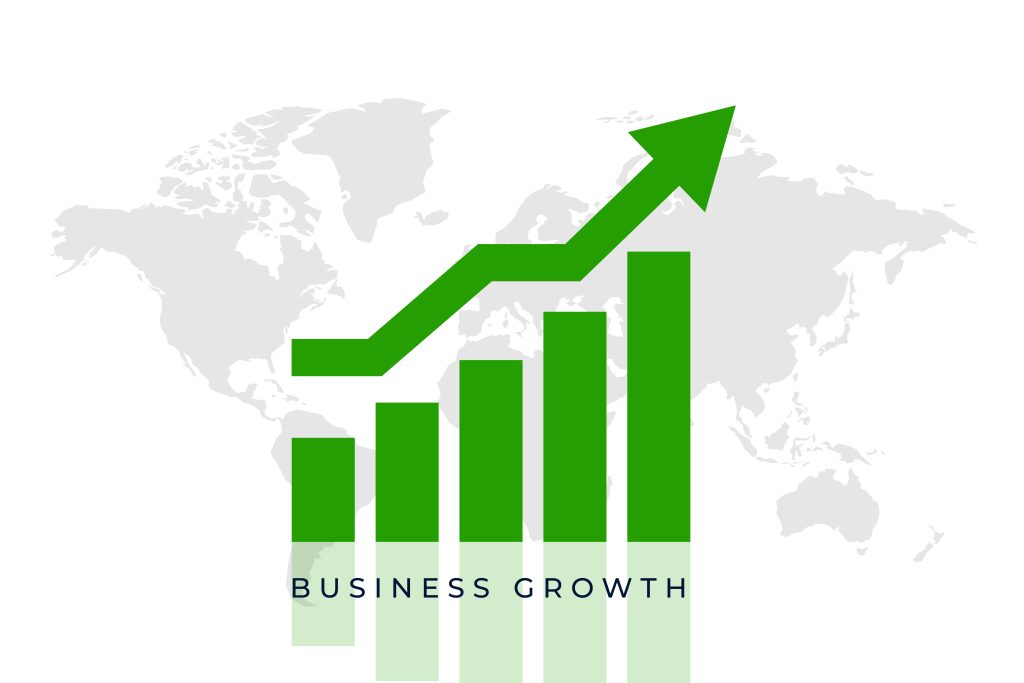
Making Improvements
In a December 8, 2023 statement announcing a $300 million aid package, the World Bank noted that “limited competition in key sectors, such as transport, financial services, and telecom, hinders private sector investment.” The bank also notes a need “to improve service delivery and build human capital, reduce spatial disparities, and address environmental concerns, including coastal erosion and deforestation.”
Investments in infrastructure, increased storage capacity, the acquisition or operation of a terminal by a local company, and the “creation of national champions,” would strengthen the private sector’s confidence and stimulate productivity, says Simat’s Eholie. There must also be “relieved borrowing conditions for our businesses,” he stresses.
This was significantly boosted on December 6, when the board of directors of the African Development Bank (AfDB) approved two loans totaling €165 million (about $181.4 million) for Côte d’Ivoire. “The funding is intended for implementation of the Diversification, Industrial Acceleration, Competitiveness, and Employment Programme created under Côte d’Ivoire’s National Development Plan 2021-2025,” the AfDB said in a statement.
This funding is further intended to support “reforms and investments in the public assets needed to develop the private sector and to de-risk the financing of [small and midsize enterprises] and innovative startups,” AfDB explains.
Côte d’Ivoire is also set to fully join the league of African oil producers such as Nigeria, Angola, and Libya in the new year, as investment into its new Baleine offshore oilfield gathers momentum. The Italian oil company Eni is preparing to invest $10 billion into the Baleine field, which it discovered in 2021. It will develop the field in partnership with the state-owned oil company Petroci. The potential of this field is high, with estimates of its reserves ranging from 1.5 billion to 2.5 billion barrels of crude oil and more than 3,300 billion cubic feet of associated gas.
Until now, Côte d’Ivoire has been a modest producer of hydrocarbons, with around 30,000 barrels per day in 2023. But by 2027, during the third phase of development of the deposit, located in deep waters, Côte d’Ivoire is expected to increase production to around 150,000-200,000 barrels of oil per day.
Fueling Growth
Ivorian authorities have come into the new year with strong backing from the World Bank and the IMF to help implement the country’s strategic plans. The National Development Plan aims to implement strategic reforms to help Côte d’Ivoire attain the status of an upper-middle-income economy by 2030.
Besides the $300 million the World Bank has dedicated to accelerating the country’s economic growth, the IMF also announced immediate access to approximately $495 million under a 40-month extended credit facility and extended fund facility (ECF/EFF) arrangement.
These figures are quite modest compared to the level of activity in that country, according to Ernest Achonu, a Nigerian former staff member of the AfDB, in Abidjan, the Ivorian business capital. “The country may need more. It is a country that can handle more resources, but it is a country that is also cautious in its approach in every way,” he says.
The World Bank explains that the $300 million, its second support in a three-part series, focuses on three major reform areas. First: “fostering competition in critical sectors and boosting domestic revenue mobilization.” The reforms “target improvements in sectoral competition policies and regulatory frameworks, particularly in network sectors.”
Second: “expanding equitable access to health and education services, improving the quality of basic education, addressing skills mismatches in labor markets, and advocating for inclusive health insurance.”
Finally: “promoting sustainable natural resource utilization, encompassing sustainable cocoa production and forest conservation, while reinforcing environmental regulatory frameworks.”
“Continued fiscal consolidation envisaged in the 2024 budget will be underpinned by high-quality and permanent tax policy measures, as well as tax and customs administration reforms. These will support reaching the [West African Economic and Monetary Union] deficit target of 3% of GDP by 2025 and reduce the country’s debt sustainability risks,” says the IMF in its December 4 statement assessing the ECF/EFF arrangement.
Meanwhile, several foreign companies operate in various sectors of the economy. Cargill, the global agricultural industry leader, operates cocoa processing facilities in the country, the largest producer of this commodity. In 2021, it completed a $100 million expansion of cocoa processing facilities in Yopougon.
Olam Group, the international food and agribusiness company, also operates in the country, sourcing cocoa, rubber, cashews, and cotton, among other commodities. TotalEnergies is the nation’s largest retailer of petroleum products. Recently, it acquired an offshore license and has begun exploration and production activities. Similarly, Vivo Energy, a Shell brand, has been in the country since 1927.
Others include Societe Generale, the French multinational investment bank and financial services company; Orange, a French international telecom company; and Unilever, a British global consumer goods company.
Furthering Stability
The country’s political stability has been tested by Jihadist strife in the northern region bordering Burkina Faso, which has led to the displacement of locals and the creation of humanitarian challenges.
In 2025, Côte d’Ivoire returns to the presidential polls, which will test whether the nation can avoid the tumult of the 2020 election, which was boycotted by leading opposition figures.
“There is no problem. Ivorians have had enough of problems,” says Achonu. “With the level of development going on in the country, the people are happy.”
For more information, check out Global Finance’s Côte d’Ivoire GDP data page.
Source: Global Finance
Share This:
- GroConsult
- No Comments

In an increasingly globalized economy, compliance with local labor laws, payroll standards, and tax regulations is not just a legal requirement but a cornerstone of sustainable business operations. Africa, with its diverse and dynamic markets, presents both opportunities and challenges for businesses. However, failure to adhere to the continent’s regulatory frameworks can have far-reaching implications. In this blog post, we will explore these implications and discuss how GroConsult can be your reliable partner in ensuring compliance and avoiding legal pitfalls.
The Landscape of Labor Laws, Payroll, and Tax Regulations in Africa
Africa comprises 54 countries, each with its unique set of labor laws, payroll standards, and tax regulations. These regulations are designed to protect workers, ensure fair wages, and maintain economic stability. However, the complexity and variability of these regulations can pose significant challenges for businesses operating across multiple African nations.
The Consequences of Non-Compliance
Legal Penalties and Fines
One of the most immediate consequences of non-compliance is the imposition of legal penalties and fines. These can range from monetary fines to more severe sanctions such as the suspension of business licenses. For example, failure to comply with payroll regulations can result in hefty fines that can significantly impact a company’s bottom line.
Damage to Reputation
Non-compliance can also damage a company’s reputation. In today’s interconnected world, news of legal troubles can spread quickly, affecting not only the business’s standing in Africa but also its global reputation. Customers, investors, and partners may be hesitant to engage with a company that is perceived as unethical or unreliable.
Operational Disruptions
Legal issues arising from non-compliance can lead to operational disruptions. These can include the freezing of bank accounts, restrictions on business activities, and even the closure of operations. Such disruptions can be particularly damaging in the competitive and fast-paced African market.
Financial Losses
Beyond fines and operational disruptions, non-compliance can lead to significant financial losses. These can stem from legal fees, back payments of wages and taxes, and the costs associated with rectifying non-compliant practices. Over time, these expenses can erode a company’s profitability and viability.
The Importance of Compliance
Protecting Workers’ Rights
Compliance with labor laws ensures that workers’ rights are protected. This includes fair wages, safe working conditions, and the right to collective bargaining. By adhering to these regulations, companies can foster a positive and productive work environment.
Ensuring Fair Competition
Compliance also ensures a level playing field for all businesses. Companies that adhere to regulations are not at a competitive disadvantage compared to those that might cut corners. This fairness is essential for a healthy and sustainable business ecosystem.
Promoting Economic Stability
Adhering to tax regulations contributes to the economic stability of the countries in which businesses operate. Taxes fund essential public services and infrastructure, which in turn supports economic growth and development.
How GroConsult Can Help
Navigating the complex landscape of labor laws, payroll standards, and tax regulations in Africa requires expertise and diligence. This is where GroConsult comes in. As a leading provider of compliance services, we offer a comprehensive suite of solutions designed to help businesses remain compliant and avoid legal pitfalls.
Expertise in Local Regulations
Our team of experts possesses in-depth knowledge of the regulatory frameworks across Africa. We stay abreast of the latest changes in labor laws, payroll standards, and tax regulations, ensuring that your business remains compliant at all times.
Customized Compliance Solutions
We understand that each business is unique. GroConsult offers customized compliance solutions tailored to your specific needs and operational footprint. Whether you operate in a single country or across multiple African markets, we have the expertise to support you.
Seamless Payroll Management
Our payroll management services ensure that your employees are paid accurately and on time, in accordance with local regulations. We handle all aspects of payroll processing, from wage calculations to tax withholdings, allowing you to focus on your core business activities.
Comprehensive Tax Compliance
GroConsult provides comprehensive tax compliance services, including tax planning, filing, and reporting. Our proactive approach helps you identify potential risks and opportunities, ensuring that you remain compliant while optimizing your tax position.
Immigration Support Services
In addition to our expertise in labor law, payroll management, and tax compliance, GroConsult offers comprehensive immigration support services tailored to meet the needs of businesses and individuals navigating the complexities of relocating to and within Africa. Whether you’re seeking to bring in talent from abroad, relocate your business, or ensure compliance with immigration regulations, GroConsult provides a seamless and stress-free experience.
1. Expert Guidance on Visa Applications
Our team of immigration experts is well-versed in the visa requirements and processes of various African countries. We assist with the preparation and submission of visa applications, ensuring that all documentation is accurate and complete. By handling the intricacies of visa applications, we help minimize delays and increase the likelihood of approval.
2. Comprehensive Relocation Assistance
Relocating to a new country involves more than just obtaining a visa. GroConsult offers end-to-end relocation support, including assistance with finding accommodation, settling in, and understanding local customs and regulations. Our personalized approach ensures that both individuals and businesses can transition smoothly to their new environment.
3. Compliance with Immigration Laws
Staying compliant with immigration laws is crucial to avoid legal issues and penalties. GroConsult monitors changes in immigration policies and regulations across Africa, ensuring that your business and employees remain compliant. Our proactive approach helps prevent potential legal problems and ensures a smooth immigration process.
4. Work Permits and Residency Applications
Securing work permits and residency for your employees can be a complex and time-consuming process. GroConsult simplifies this by managing the entire application process on your behalf. From initial consultation to final approval, we provide comprehensive support to ensure that your employees can legally work and reside in their host country.
5. Family Reunification Services
For expatriates looking to bring their families along, GroConsult offers family reunification services. We assist with the necessary applications and documentation to ensure that family members can join you without unnecessary delays or complications. Our empathetic approach prioritizes the well-being of your family during the relocation process.
6. Ongoing Support and Advisory Services
Immigration needs do not end once a visa or work permit is granted. GroConsult provides ongoing support and advisory services to address any immigration-related issues that may arise. Whether it’s extending a visa, changing residency status, or addressing compliance concerns, our team is here to help every step of the way.
GroConsult’s immigration support services are designed to make the process of relocating to and within Africa as smooth and stress-free as possible. By offering expert guidance, comprehensive relocation assistance, and ongoing support, we help businesses and individuals navigate the complexities of immigration with confidence.
Partnering with GroConsult ensures that your immigration needs are handled with professionalism and care, allowing you to focus on your business and personal goals. Contact us today to learn more about how our immigration support services can benefit you and your organization.
Conclusion
Non-compliance with labor laws, payroll standards, and tax regulations in Africa can have severe consequences for businesses. From legal penalties and financial losses to reputational damage and operational disruptions, the implications are far-reaching. However, with the right partner, these challenges can be effectively managed.
GroConsult is committed to helping businesses navigate the complexities of compliance in Africa. Our expertise, customized solutions, and proactive approach ensure that you remain compliant, avoid legal pitfalls, and focus on growing your business. Partner with GroConsult today and secure a compliant and prosperous future for your business in Africa.
For more information on how GroConsult can support your compliance needs, contact us today. Let’s work together to ensure your business thrives in the dynamic African market.
Share This:
- GroConsult
- No Comments

Launched on Monday 03, 2024 at the 15th Meeting of the Africa Initiative in Lomé, Togo, Tax Transparency in Africa 2024: Africa Initiative Progress Report shows African countries collected more fiscal revenue through tax transparency, exchange of information and related measures in 2023 than over the 13 preceding years combined.
With EUR 2.2 billion of additional revenue reported by 7 African countries last year, the report makes a strong case for an ever-sharpening political attention on the matters of transparency and international tax co-operation. In total, since 2009, African countries have identified over EUR 3.8 billion in additional revenue as a result of the use of the exchange of information on request (EOIR), automatic exchange of financial account information (AEOI), and voluntary disclosure programmes (VDPs).
After 10 years of shared progress on advancing the implementation of EOIR and AEOI, the 39 members of the Africa Initiative are now harnessing the fruits of their sustained and collective efforts in the fight against tax evasion and other illicit financial flows, with domestic resource mobilisation (DRM) spin-off as a guiding light.
“The creation of the Africa Initiative was prompted by the need to make tax transparency a lever for increasing public resources in African countries”, said Philippe Kokou Tchodié, Commissioner General, Togolese Revenue Office, and Co–Chair of the Africa Initiative. “This can only be achieved through strong political support and, above all, capacity building that enables tax administrations to make effective use of international information exchange in the fight against international tax evasion and avoidance.”
Major breakthroughs include:
- 22 African countries have joined the Global Forum since 2014, including 5 since March 2023 (Angola, Democratic Republic of the Congo, Sierra Leone, Zambia and Zimbabwe).
- Through the Convention on Mutual Administrative Assistance in Tax Matters (MAAC), African countries have entered into over 3400 EOI bilateral relationships to foster tax co-operation and most of them have an EOI network covering more than 140 jurisdictions.
- 12 African countries are committed to start automatically exchanging financial account information by 2026, and 5 have already started automatic exchanges.
- 8 out of 12 African countries fully reviewed in the second round of EOIR peer reviews were granted a satisfactory rating (“Compliant” or “Largely compliant”).
- More than 2700 tax officials have been trained on the exchange of information by the Global Forum Secretariat between 2020 and 2023, including through the flagship programmes: Train the Trainer and Women Leaders in Tax Transparency.
“In addition to the standard setting, peer reviews and monitoring, the greatest value proposition of the Global Forum and its regional initiatives is its unwavering commitment to capacity building and outreach aimed at enhancing tax transparency across the globe,” said Edward Kieswetter, Commissioner, South Africa Revenue Authority, and Co–Chair of the Africa Initiative.
The launch of Tax Transparency in Africa 2024 is part of the 15th Meeting of the Africa Initiative, jointly organised by the Global Forum Secretariat, the Togolese Revenue Office (Office Togolais des Recettes (OTR)) and the Ministry of Economy and Finance of Togo, and to be held on 3-5 June 2024 in Lomé. The meeting will gather senior politicians, high-level representatives from more than 30 African countries, as well as international tax experts, various regional and international organisations, partners and donors of the Africa Initiative and civil society organisations.
“The results presented in the report are clear evidence that international co-operation in tax matters is a necessary instrument to fight tax evasion and other forms of illicit financial flows. African countries are reaping the outcomes of their investment in tax transparency for the benefit of their people,” said Zayda Manatta, Head of the Global Forum Secretariat. “The Global Forum Secretariat is proud of having walked at their side and is committed to continue supporting their efforts.”
Backed by 17 regional and international donors and partners, the Africa Initiative has helped create strong and sustainable regional synergies and heightened ambitions amongst African countries, to better tackle tax evasion and other illicit financial flows. The capacity-building activities of the Global Forum and its partners ultimately support African countries’ revenue mobilisation efforts. This crucial work takes place against a backdrop of inter- and intra-regional discussions around fairness of the tax systems, mechanisms and benefits of advanced levels of international co-operation in tax matters, and the need to mobilise domestic resources to reach the Sustainable Development Goals (SDGs).
With 171 members, the Global Forum on Transparency and Exchange of Information for Tax Purposes is the leading multilateral body mandated to ensure that jurisdictions around the world adhere to, and effectively implement the standards of transparency exchange of information on request (EOIR) and automatic exchange of financial account information (AEOI). These objectives are achieved through a robust monitoring and peer review process. The Global Forum also runs an extensive capacity-building programme to support its members in implementing the standards and help tax authorities make the best use of cross-border information-sharing channels.
Source: OECD

Share This:
- GroConsult
- No Comments

NEW EDITION PUBLISHED ON 3 JUNE 2024
Tax Transparency in Africa is a key output of the Africa Initiative, a programme established in 2014 to ensure that African countries are equipped to exploit the latest improvements in global transparency, to better tackle tax evasion and other illicit financial flows and ultimately improve domestic resource mobilisation to support their economic development. The 2024 edition covers 41 African countries and is co-produced by the Global Forum on Transparency and Exchange of Information for Tax Purposes (Global Forum), the African Union Commission and the African Tax Administration Forum. It includes impressive new figures, case studies and testimonies showing the very concrete results achieved so far, most notably on domestic resource mobilisation.
The launch event is part of the 15th Meeting of the Africa Initiative, to be held on in Lomé (Togo) on 3-5 June 2024. The meeting will gather senior politicians, high-level representatives from more than 30 African countries, as well as international tax experts, regional and international organisations, partners and donors of the Africa Initiative and civil society organisations.
To get the complete document, you can visit the OECD page or contact GroConsult via relations@groconsult.com
Source: OECD

What makes GroConsult the right partner for businesses looking to expand in Africa
When considering expansion into Africa, businesses face a myriad of challenges, including navigating complex regulatory environments, understanding local market dynamics, and managing human resources effectively. Partnering with the right service provider can make all the difference in ensuring a smooth and successful entry into these emerging markets. GroConsult stands out as the ideal partner for businesses looking to expand in Africa, offering a comprehensive suite of services tailored to meet the unique needs of each client.
1. Local Expertise and Knowledge
One of the most significant advantages of partnering with GroConsult is our deep understanding of the African market. Each country in Africa has its own set of regulations, labor laws, and cultural nuances that can impact business operations. Our team comprises local experts who are well-versed in these complexities, providing invaluable insights that can help businesses navigate the landscape effectively.For instance, GroConsult has a proven track record of assisting companies in understanding compliance requirements, which is crucial for avoiding legal pitfalls. We keep abreast of changes in legislation and labor laws across various African countries, ensuring that your business remains compliant and can operate without disruptions.
2. Comprehensive Employer of Record Services
GroConsult’s Employer of Record (EOR) services are designed to simplify the employment process for businesses entering new markets. By acting as the legal employer for your workforce, we handle all aspects of employment, including payroll, benefits, taxes, and compliance with local labor laws. This allows businesses to focus on their core operations while we manage the complexities of employment.Our EOR services include:
- Payroll Management: Ensuring timely and accurate payroll processing, including tax withholdings and benefits administration.
- Compliance Assurance: Keeping your business compliant with local labor laws and regulations to mitigate risks.
- Employee Benefits Management: Designing competitive benefits packages that attract and retain top talent.
3. Streamlined Immigration Support
Expanding into Africa often requires navigating complex immigration processes. GroConsult offers comprehensive immigration support services, assisting businesses with visa applications, work permits, and residency requirements. Our team works closely with local authorities to ensure that all necessary documentation is processed efficiently, allowing your employees to focus on their roles without the stress of immigration issues.By streamlining the immigration process, GroConsult helps businesses avoid delays and ensures that they can quickly mobilize their workforce in new markets.
4. Tailored Solutions for Diverse Needs
Every business is unique, and at GroConsult, we recognize that one size does not fit all. We take the time to understand your specific goals, challenges, and operational needs, allowing us to design customized solutions that align with your business objectives. Whether you require assistance with human resource management, payroll, or compliance, our team is dedicated to providing tailored support that meets your requirements.
5. Commitment to Excellence and Reliability
GroConsult is committed to delivering excellence in everything we do. Our core values emphasize reliability, timeliness, and a customer-centric approach. We understand that your business’s success depends on our ability to provide consistent and dependable services, and we strive to exceed your expectations at every turn.Our clients can trust that we will go above and beyond to deliver results, ensuring that their expansion efforts are met with success. Our dedication to excellence has earned us a reputation as a trusted partner in the African market.
6. Strategic Partnerships and Networking
Expanding into a new market often requires establishing connections with local stakeholders, including suppliers, regulatory bodies, and industry associations. GroConsult leverages its extensive network to facilitate introductions and build relationships that can benefit your business. Our strategic partnerships enable us to provide additional resources and support, enhancing your ability to succeed in the African market.
7. Focus on Sustainable Growth
At GroConsult, we believe in fostering sustainable growth for our clients. We not only help businesses establish a presence in Africa but also support their long-term success by providing ongoing assistance and resources. Our commitment to sustainable practices ensures that your business can thrive in a responsible and ethical manner, aligning with global standards and expectations.
8. Proven Success Stories
Our track record speaks for itself. GroConsult has successfully assisted numerous businesses in expanding their operations across Africa. For example, we helped a multinational tech company navigate the complexities of entering the Nigerian market, providing EOR services that allowed them to hire local talent quickly and efficiently. Our expertise in compliance and local regulations ensured that the company could operate without legal issues, ultimately leading to a successful market entry.
Conclusion
In summary, GroConsult is the right partner for businesses looking to expand in Africa due to our local expertise, comprehensive EOR services, streamlined immigration support, and commitment to excellence. We understand the challenges that come with entering new markets and are dedicated to providing tailored solutions that meet your specific needs. As you consider your options for expansion, remember that partnering with GroConsult can help you unlock your business’s potential in Africa. Our team is ready to support you every step of the way, ensuring that your expansion efforts are met with success. Contact us today to learn more about how we can assist you in achieving your global business objectives.
Share This:
- GroConsult
- No Comments

The consulting industry stands on the brink of significant transformation, driven by technological advancements, shifting market dynamics, and evolving client expectations. As we look towards the future, several key trends are emerging that will shape the consulting landscape. For companies like Groconsult Management Consortium, a leading provider of global Employer of Record (EOR), HR, and Immigration support services, these trends present unique opportunities to become indispensable partners for businesses aiming to expand globally.
Key Trends Shaping the Consulting Industry
- Digital Transformation and Automation
The integration of advanced technologies such as AI, machine learning, and robotic process automation (RPA) is revolutionizing the consulting industry. These tools enhance data analysis, streamline processes, and improve decision-making capabilities, enabling consultants to provide more strategic and data-driven advice. - Remote Consulting
The growing global health concerns has accelerated the shift towards remote work. This trend is likely to continue, with virtual consulting becoming a norm. Remote consulting not only reduces costs but also allows firms to tap into a global talent pool, offering clients the best expertise irrespective of geographical boundaries. - Focus on Sustainability
With increasing awareness of environmental issues, there is a growing demand for consulting services that help businesses implement sustainable practices. Consultants will need to guide clients through the complexities of environmental regulations, sustainable supply chain management, and corporate social responsibility initiatives. - Customized Solutions and Niche Expertise
Clients are seeking more personalized and industry-specific solutions. This trend will drive demand for consultants who possess deep expertise in particular sectors or niche areas. Firms that can offer tailored services and specialized knowledge will have a competitive edge. - Enhanced Client Collaboration
The traditional client-consultant relationship is evolving towards more collaborative partnerships. Clients expect consultants to work closely with their in-house teams, co-creating solutions and ensuring knowledge transfer. This collaborative approach fosters innovation and ensures that the solutions are practical and implementable. Groconsult’s global network positions them perfectly for such collaborations, allowing them to connect clients with the best possible resources regardless of location. - A Human Touch Endures
While technology is important, the human element remains irreplaceable. Clients will still value consultants who can provide strategic guidance, offer cultural insights, and build strong relationships. Groconsult’s team of experienced professionals brings a human touch to global expansion, ensuring a smooth cultural transition for your workforce.
Advantages of Partnering with Groconsult Management Consortium
As businesses navigate these trends, Groconsult Management Consortium stands out as an ideal partner for companies looking to expand into the global market. Here’s why:
- Global EOR Services
Groconsult provides comprehensive EOR services, enabling companies to hire and manage employees in foreign markets without the need to establish a legal entity. This flexibility allows businesses to scale quickly and efficiently while remaining compliant with local labor laws. - Expert HR Support
Effective human resource management is crucial for global expansion. Groconsult offers expert HR support, including talent acquisition, employee benefits management, and performance optimization, ensuring that clients can attract and retain top talent across different regions. - Immigration Solutions
Navigating immigration laws can be challenging for businesses expanding internationally. Groconsult’s immigration support services simplify the process, handling visa applications, work permits, and compliance issues, allowing clients to focus on their core business activities. - Customized and Scalable Solutions
Understanding that each business has unique needs, Groconsult provides customized solutions that can be scaled as the company grows. Their tailored approach ensures that clients receive the most relevant and effective services for their specific circumstances. - Proven Track Record
With extensive experience and a proven track record, Groconsult has successfully assisted numerous companies in achieving their global expansion goals. Our expertise and reliability make them a trusted partner in navigating the complexities of international business.
The consulting industry is poised for exciting changes, driven by technological advancements and evolving client expectations. Companies like Groconsult Management Consortium are well-positioned to leverage these trends, offering invaluable support to businesses aiming for global expansion. By providing comprehensive EOR, HR, and immigration services, Groconsult not only simplifies the expansion process but also ensures that companies can operate smoothly and compliantly in new markets. Partnering with Groconsult means having a strategic ally in the journey towards international growth and success.
What makes GroConsult the right partner for businesses looking to expand in Africa
When considering expansion into Africa, businesses face a myriad of challenges, including navigating complex regulatory environments, understanding local market dynamics, and managing human resources effectively. Partnering with the right service provider can make all the difference in ensuring a smooth and successful entry into these emerging markets. GroConsult stands out as the ideal partner for businesses looking to expand in Africa, offering a comprehensive suite of services tailored to meet the unique needs of each client.
1. Local Expertise and Knowledge
One of the most significant advantages of partnering with GroConsult is our deep understanding of the African market. Each country in Africa has its own set of regulations, labor laws, and cultural nuances that can impact business operations. Our team comprises local experts who are well-versed in these complexities, providing invaluable insights that can help businesses navigate the landscape effectively.
For instance, GroConsult has a proven track record of assisting companies in understanding compliance requirements, which is crucial for avoiding legal pitfalls. We keep abreast of changes in legislation and labor laws across various African countries, ensuring that your business remains compliant and can operate without disruptions.
2. Comprehensive Employer of Record Services
GroConsult’s Employer of Record (EOR) services are designed to simplify the employment process for businesses entering new markets. By acting as the legal employer for your workforce, we handle all aspects of employment, including payroll, benefits, taxes, and compliance with local labor laws. This allows businesses to focus on their core operations while we manage the complexities of employment.
Our EOR services include:
- Payroll Management: Ensuring timely and accurate payroll processing, including tax withholdings and benefits administration.
- Compliance Assurance: Keeping your business compliant with local labor laws and regulations to mitigate risks.
- Employee Benefits Management: Designing competitive benefits packages that attract and retain top talent.
3. Streamlined Immigration Support
Expanding into Africa often requires navigating complex immigration processes. GroConsult offers comprehensive immigration support services, assisting businesses with visa applications, work permits, and residency requirements. Our team works closely with local authorities to ensure that all necessary documentation is processed efficiently, allowing your employees to focus on their roles without the stress of immigration issues.
By streamlining the immigration process, GroConsult helps businesses avoid delays and ensures that they can quickly mobilize their workforce in new markets.
4. Tailored Solutions for Diverse Needs
Every business is unique, and at GroConsult, we recognize that one size does not fit all. We take the time to understand your specific goals, challenges, and operational needs, allowing us to design customized solutions that align with your business objectives. Whether you require assistance with human resource management, payroll, or compliance, our team is dedicated to providing tailored support that meets your requirements.
5. Commitment to Excellence and Reliability
GroConsult is committed to delivering excellence in everything we do. Our core values emphasize reliability, timeliness, and a customer-centric approach. We understand that your business’s success depends on our ability to provide consistent and dependable services, and we strive to exceed your expectations at every turn.
Our clients can trust that we will go above and beyond to deliver results, ensuring that their expansion efforts are met with success. Our dedication to excellence has earned us a reputation as a trusted partner in the African market.
6. Strategic Partnerships and Networking
Expanding into a new market often requires establishing connections with local stakeholders, including suppliers, regulatory bodies, and industry associations. GroConsult leverages its extensive network to facilitate introductions and build relationships that can benefit your business. Our strategic partnerships enable us to provide additional resources and support, enhancing your ability to succeed in the African market.
7. Focus on Sustainable Growth
At GroConsult, we believe in fostering sustainable growth for our clients. We not only help businesses establish a presence in Africa but also support their long-term success by providing ongoing assistance and resources. Our commitment to sustainable practices ensures that your business can thrive in a responsible and ethical manner, aligning with global standards and expectations.
8. Proven Success Stories
Our track record speaks for itself. GroConsult has successfully assisted numerous businesses in expanding their operations across Africa. For example, we helped a multinational tech company navigate the complexities of entering the Nigerian market, providing EOR services that allowed them to hire local talent quickly and efficiently. Our expertise in compliance and local regulations ensured that the company could operate without legal issues, ultimately leading to a successful market entry.
GroConsult is the right partner for businesses looking to expand in Africa due to our local expertise, comprehensive EOR services, streamlined immigration support, and commitment to excellence. We understand the challenges that come with entering new markets and are dedicated to providing tailored solutions that meet your specific needs.
As you consider your options for expansion, remember that partnering with GroConsult can help you unlock your business’s potential in Africa. Our team is ready to support you every step of the way, ensuring that your expansion efforts are met with success. Contact us today to learn more about how we can assist you in achieving your global business objectives.

Share This:
- GroConsult
- No Comments

China’s flagship economic cooperation program is making a strong comeback after a slowdown during the global pandemic, with a renewed focus on Africa.
- China’s involvement in Africa remains predominantly extractive and has sparked concerns in European public debates
- Chinese investment in Africa surged by 114% last year, mainly directed towards crucial minerals
- Chinese sovereign lending for Africa’s infrastructure is at its lowest level in two decades
A Reuters analysis of lending, investment, and trade data shows this resurgence.
Chinese leaders have cited the billions of dollars committed to new construction projects and record levels of two-way trade as proof of their dedication to supporting Africa’s modernization and fostering “win-win” cooperation.
However, the data reveals a more complex relationship, one that remains predominantly extractive, and has so far failed to live up to some of Beijing’s rhetoric about the Belt and Road Initiative, an ambitious infrastructure development program seeking to link China with markets and economies across the globe.
China’s involvement in Africa has sparked concerns in European public debates and among policymakers.
With a desperate need for raw materials and energy to fuel its expanding manufacturing sector, China has prioritized the continent almost as highly as Shanghai in its business agenda.
Last year, Chinese investment in Africa surged by 114%, as reported by the Griffith Asia Institute at Australia’s Griffith University. However, this investment was predominantly directed towards minerals crucial for the global energy transition and China’s efforts to rejuvenate its struggling economy.
Some $7.8 billion of that went to mining, like Botswana’s Khoemacau copper mine, which China’s MMG Ltd bought for $1.9 billion, and cobalt and lithium mines in countries including Namibia, Zambia and Zimbabwe.
As attempts to increase other imports from Africa, such as agricultural products and manufactured goods, falter, the continent’s trade deficit with China has ballooned. Chinese sovereign lending, once the primary source of financing for Africa’s infrastructure, is now at its lowest level in two decades.
Moreover, public-private partnerships (PPPs), which China has promoted as its new preferred investment model worldwide, have yet to gain traction in Africa.
“This is something late-19th century Britain would recognize,” said Eric Olander, co-founder of the China-Global South Project website and podcast. China rejects such assertions.
“Africa has the right, capacity and wisdom to develop its external relations and choose its partners,” China’s foreign ministry told Reuters.
“China’s practical support for Africa’s path of modernization in accordance with its own characteristics has been welcomed by an increasing number of African countries.”
Source: Business Insider Africa
Share This:
- GroConsult
- No Comments

Running a successful business in Africa requires focus on your core operations. But navigating the complexities of tax and payroll regulations can be a significant time drain and a potential minefield of legal repercussions.
GroConsult: Your Partner in Compliance
At GroConsult, we understand the challenges businesses face when it comes to tax, payroll, and statutory filings in Africa. We offer a comprehensive suite of services designed to ensure your company operates smoothly and compliantly across the continent.
Here’s how we can help you avoid penalties and stay focused on growth:
1. Tax Expertise:
Tax Compliance & Planning: Our tax specialists stay up-to-date on ever-changing regulations across various African countries. We help you navigate tax obligations, identify deductions and credits, and develop tax-saving strategies.
Corporate Tax Returns: We handle the preparation and filing of your corporate tax returns, ensuring accuracy and adherence to deadlines.
Tax Audits & Disputes: Should you face a tax audit, GroConsult’s experienced professionals will represent you and advocate for your best interests.

2. Streamlined Payroll Services:
Payroll Processing & Administration: We handle all aspects of payroll, from calculating salaries and deductions to managing employee benefits and tax withholdings.
Global Payroll Solutions: Whether you have a small local team or a large multinational workforce, GroConsult can manage your payroll seamlessly across borders.
Compliance with Local Labor Laws: We ensure your payroll practices comply with all relevant labor laws and social security regulations.
3. Comprehensive Statutory Filings:
Meeting Regulatory Requirements: We keep track of all statutory filing deadlines and handle submissions on your behalf, ensuring you remain compliant with local authorities.
Reduced Administrative Burden: Let us take care of the paperwork, freeing you and your team to focus on core business activities.
Minimized Risk of Penalties: Non-compliance with statutory filing requirements can result in hefty fines and penalties. GroConsult helps you avoid these risks.
Why Choose GroConsult?
Local Expertise, Global Reach: Our team combines in-depth knowledge of African regulations with extensive experience serving international clients.
Peace of Mind & Focus: With GroConsult managing your tax, payroll, and statutory filings, you can concentrate on running your business with confidence.
Cost-Effectiveness: Our services help you avoid costly penalties and ensure efficient resource allocation.
Don’t let tax and compliance issues hinder your success in Africa. Contact GroConsult today for consultation and discover how we can help your business thrive.
Together, we can ensure your company operates legally, efficiently, and profitably across the African continent.
Share This:
- GroConsult
- No Comments

The full KPMG report released by President Akufo-Addo on Wednesday, May 22, has revealed that Strategic Mobilisation Ghana Limited (SML) is indebted to the Ghana Revenue Authority (GRA) to the tune of GH¢ 31.88 million for unpaid taxes spanning eight months of service provision.
This outstanding amount also includes accrued interest, estimated at GH¢ 18.50 million as of January 31, 2024.
According to the report by the renowned accounting and advisory firm, SML has failed to fulfill its statutory obligations by neglecting to file its tax returns or remit the owed taxes to the GRA.

This deviation from standard practice occurred between June 1, 2020, and August 31, 2023, during which the GRA typically deducts taxes for payments made to SML.
The reputable audit firm further highlighted that it has alerted the GRA to this discrepancy, prompting the Authority to issue a letter to SML demanding payment.
Despite this intervention, SML has yet to address its outstanding tax liabilities to the GRA.
“During the period from 1 September 2020 to 30 April 2021, a bulk payment to SML covering invoices for an eight (8) month period, did not have VAT and WHT deductions, amounting to GH¢13.38 million. This contradicts GRA’s standard practice of deducting such taxes for payments to SML between 1 June 2020 and 31 August 2023.”
“Additionally, SML failed to fulfil its statutory obligations by neither filing returns nor remitting these taxes to GRA. Pursuant to Section 71(1) of the RA Act, the accrued interest on the tax liability is estimated at GH¢18.50 million owed by SML to GRA as of 31 January 2024. Consequently, the total liability incurred by SML amounts to GH¢31.88 million.”
“At the time of our review, we noticed the discrepancy and informed GRA, leading to their subsequent communication with SML, demanding a settlement of the outstanding amount,” an excerpt of the report said on page 14.
Following an investigation by The Fourth Estate, which uncovered numerous irregularities in the contracts between Strategic Mobilisation Limited (SML), the Ministry of Finance, and the Ghana Revenue Authority (GRA), President Akufo-Addo instructed KPMG to conduct a comprehensive audit.
The investigation revealed discrepancies in SML’s claims regarding its services aimed at tackling revenue losses in the downstream petroleum sector.
Despite SML’s assertions that its services were effectively addressing under-declaration, dilution, and diversion of petroleum products, evidence presented by The Fourth Estate showed that these functions were being carried out by other companies and the National Petroleum Authority (NPA).
Managing Director of SML, Christian Tetteh Sottie admitted to the inaccuracies and promptly removed the false claims from the company’s website.
Despite these revelations and other admitted falsehoods, Minister of Finance Ken Ofori-Atta initiated a process in 2023 to expand SML’s contracts to include the gold and oil producing sectors. This decision significantly increased the annual contract sum to over $100 million.
Following the investigation by The Fourth Estate and subsequent public outcry, President Akufo-Addo suspended the contracts and commissioned KPMG to conduct an audit and submit a report.
While the president released a press statement regarding the findings, the full report provides even more damning revelations about SML’s operations within its contracts with the Ministry of Finance and the GRA.
Source: Joyonline.com
Share This:
- GroConsult
- No Comments

Africa is no longer the sleeping giant of the investment world. With economies soaring, a burgeoning middle class, and rapid urbanization, the continent is a land of opportunity waiting to be explored. GroConsult, a leading EOR (Employer of Record) and immigration support services provider, can be your trusted partner in navigating this exciting investment landscape. Here’s why you should consider Africa as your next investment frontier, and why GroConsult is the key to unlocking its potential:
1. A Continent on the Rise: Thriving Markets
Africa boasts some of the fastest-growing economies globally. Fueled by a growing middle class and increasing urbanization, demand for quality infrastructure and services is skyrocketing. This creates an environment ripe for investment across various sectors, but navigating the complexities of entering new African markets can be a challenge.
GroConsult’s Expertise: Seamless Entry & Ongoing Support
GroConsult, with its extensive experience in Africa, can help you establish a legal presence quickly and efficiently through our EOR services. We handle all the complexities of payroll, tax compliance, and HR administration, allowing you to focus on your core business activities. Additionally, our immigration support services ensure your workforce has the necessary visas and work permits to operate smoothly.
2. Diverse Opportunities: A Buffet of Investment Choices
Africa offers a smorgasbord of investment options, catering to a wide range of interests:
Luxury Lodges & Hotels:
Capitalize on Africa’s booming tourism industry by investing in luxurious accommodations. From bustling cities to breathtaking natural wonders, prime locations are experiencing a surge in visitors, creating a strong demand for high-end hospitality experiences.
Prime Real Estate Be Part of the Transformation:
Invest in prime real estate within rapidly developing urban centers. Major cities are undergoing rapid development, driving property values upwards. This presents an exceptional opportunity to secure a foothold in these flourishing markets.
Investing in Minds:
The Rise of African Education: Support the future by investing in the development of universities. Rising enrollment rates highlight the increasing demand for quality higher education institutions, offering a chance to make a social impact while generating solid returns.
Sustainable Water Solutions:
A Win-Win Proposition: Investing in water projects in Africa fulfills a critical need while offering financial rewards. These projects contribute significantly to sustainable development and improve the quality of life for millions, making them a socially responsible and financially rewarding investment.
Tech Takes Center Stage
A Booming Landscape: Africa has witnessed a surge in technology adoption and innovation. Mobile phone penetration rates are soaring, with many countries surpassing 80%. This widespread connectivity has fueled the growth of fintech, e-commerce, and ride-hailing services.
Innovation Hubs Emerge: Cities like Nairobi, Lagos, and Johannesburg are becoming hubs for tech startups. These companies are addressing local challenges and creating solutions with global applications, attracting significant venture capital investments.
A Culinary Revolution:
Gourmet Restaurants: Embrace Africa’s evolving culinary scene by investing in restaurants. Major cities are becoming culinary hotspots, attracting food enthusiasts from around the world. This presents a lucrative opportunity to tap into a growing market with a passion for unique dining experiences.
GroConsult’s local market knowledge can help you identify the most promising investment opportunities aligned with your specific goals. We can connect you with the right partners and navigate the regulatory environment, ensuring a smooth and successful entry into your chosen African market.
3. High Returns on Investment: Reap the Rewards
Investments in Africa have the potential to yield significant returns. Sectors like hospitality and real estate are experiencing unprecedented growth, driven by tourism and urban expansion. Universities and water projects offer stable, long-term income streams, while restaurants cater to the rising demand for unique dining experiences.
Reduce Risk, Maximize Reward with GroConsult
By partnering with GroConsult, you can minimize the risks associated with entering a new market and maximize your potential for success. Our comprehensive EOR and immigration support services take care of the administrative burden, allowing you to focus on maximizing your return on investment.
Africa presents a compelling investment opportunity unlike any other. With GroConsult as your trusted partner, you can navigate the complexities, identify the best opportunities, and reap the rewards of this exciting continent.
Contact GroConsult today! Let our team of experts guide you through the intricacies of African investment and help you unlock the full potential of this vibrant continent.
Share This:
- GroConsult
- No Comments

The fintech landscape in Africa is experiencing a surge in growth opportunities, with South Africa emerging as a key player in this dynamic sector. Despite global challenges, venture capital investment in South Africa remained resilient, marking a 6% increase to reach a notable $620 million in 2023.
Fintech solutions, particularly those addressing payment challenges, continue to dominate innovation and attract significant venture capital interest across the African continent.
According to Antonia Bothner, Endeavor SA’s capital markets lead, the market’s transition from cash presents vast untapped potential, both in South Africa and across the African continent, where up to 75% of transactions are still cash.
Africa provides fertile ground for tech development, offering investors a leapfrogging effect through its young and populous markets with high levels of tech adoption. South Africa is a particularly attractive market to start in, with its first and third-world attributes. It has a developed tech ecosystem, established B2B network, relatively low costs, yet with a mass market, meaning many opportunities for innovation.
In many cases, these solutions are transportable, such as TymeBank expanding to the Philippines and Vietnam, and Entersekt taking locally-developed transaction authentication solutions to the developed markets, as an example.
“The development of fintech solutions tends to revolve around payments which is often the first building block of any tech ecosystem, because it is such a ubiquitous problem to solve,” explains Bothner. “This creates a burgeoning pipeline of opportunities for fintech companies, particularly in payments, remittances, and B2B solutions.”
Despite a global decline in VC investment in 2023, South Africa bucked the trend and several notable regional fundraises continue to underscore the confidence in its potential. These include the SME Fund’s Venture Capital Fund of Funds, Partech Africa II, Norrsken22, Convergence Capital, Al Mada, Knife Capital, Sanari Capital, Quona and Havaic.
Recent investments in payment companies like Stitch and Peach Payments, also highlight the increasing investor interest in fintech ventures. Furthermore, South Africa’s stability amidst currency fluctuations in other African countries, notably Nigeria and Egypt, positions it as an attractive destination for investors seeking a balance in both risk and return.
“There is increased inbound interest and recognition by investors, many of whom felt they were under-allocated in South Africa,” says Bothner. “It represents a market with comparatively lower volatility, bolstered by a robust asset management sector, a keen understanding of value, and enticing investment opportunities in profitable companies run by strong management and affordable talent.”
These entrepreneurs are attracting investments from companies like Quona Capital, a global fintech investor whose investments include local payments company Yoco. Quona Capital Partner, Johan Bosini says: “There has been a huge influx of foreign capital into the fintech ecosystem, which has built up over several years to create early and late investment opportunities, and evidence of exits, which provides a level of comfort for investors.”
Bosini says fintech has evolved from pure play products into financial infrastructure, lending, banking as a service and banking orchestration. There is also a continuation of embedded finance, where companies are not necessarily starting with a financial service but solving a bigger problem.
Allan Gray, with its strong connection to the entrepreneurial sector, is also an investor in the fintech space. It backed companies like Peach Payments and Onafriq through its venture capital arm, which is now known as 3 Capital Ventures. Sizwe Nxumalo, Managing Partner at 3 Capital Ventures, says: “South Africa is fertile ground for financial innovation, boasting a legacy as the world’s most inventive insurance market with pioneers like Discovery and OUTsurance, alongside ground-breaking banks such as FNB and Capitec. Its market maturity and sophistication create a unique ecosystem where fintechs like Weaver, TYME Bank, Yoco and Retail Capital can not only thrive, but also achieve meaningful scale focusing primarily on this market.”
There are also significant opportunities for later stage investing. Bothner continues, “at this point in their lifecycle, these companies are relatively agnostic of market cycles and plough ahead on their own trajectory. Once companies find a market fit, they can grow via disruption and/or creating new industries.”
Endeavor, which runs several VC funds, continues to back high growth high impact entrepreneurs who are passionate and obstinate about the problems they are solving through mentorship and its global networks as well as its co-investment funds both locally via Harvest and globally via Endeavor Catalyst.
“We look for endurance, tenacity and perseverance,” says Bothner. “Being a successful entrepreneur is an art rather than a science and there is a broad spectrum of entrepreneurs with many factors contributing to their success – it is about company leadership, a shared vision, alignment of incentives and a shared focus on what they are building. Strategy and execution is key, yet with an awareness and agility to move and change tack when needed.”
Endeavor expects this evolution to provide a ripe investment market going forward and one that will benefit the country and its people. Entrepreneurs have been focusing on strategy and growth in the absence of a strong investment market in 2023, underpinning investment potential which is backed by a resilient tech sector and positive longer term funding trend in Africa.
Source; Techtrendske
Share This:
- GroConsult
- No Comments

Emirates will resume services to Nigeria from 1 October 2024, operating a daily service between Lagos and Dubai, and offering customers more choice and connectivity from Nigeria’s largest city to, and through, Dubai.
The service will be operated using a Boeing 777-300ER. EK783 will depart Dubai at 0945hrs, arriving in Lagos at 1520hrs; the return flight EK784 will leave Lagos at 1730hrs and arrives in Dubai at 0510hrs the next day. Tickets can be booked by contacting our associate company; Kharis Hospitality & Logistics (services@mykharisonline.com)
Emirates Resumes Nigeria Flights: Daily Service from Dubai to Lagos Starting Oct. 1
Adnan Kazim, Emirates’ Deputy President and Chief Commercial Officer said, “We are excited to resume our services to Nigeria. The Lagos-Dubai service has traditionally been popular with customers in Nigeria and we hope to reconnect leisure and business travellers to Dubai and onwards to our network of over 140 destinations. We thank the Nigerian government for their partnership and support in re-establishing this route and we look forward to welcoming passengers back onboard.”
With the resumption of operations to Nigeria, Emirates operates to 19 gateways in Africa with 157 flights per week from Dubai, with further reach to an additional 130 regional points in Africa through its codeshare and interline partnerships with South African Airways, Airlink, Royal Air Maroc, Tunis Air, among others.
Details of Emirates’ Resumed Flights to Nigeria
As a major economic hub in Africa, Nigeria and the UAE have built strong bilateral trade relations over the years, headlined by Lagos as the nation’s commercial centre. With the resumption of daily passenger flights, the airline’s cargo arm, Emirates SkyCargo, will further bolster the trade relationship by offering more than 300 tonnes of bellyhold cargo capacity, in and out of Lagos every week.

Emirates SkyCargo will support Nigerian businesses by exporting their goods via its state-of-the-art hub in Dubai, into key markets such as the UAE, Malaysia, Hong Kong, and Bahrain, among others with key anticipated commodities such as Kola Nuts, food and beverages, and urgent courier material. Emirates SkyCargo will also import vital goods such as pharmaceuticals and electronics as well as general cargo from key markets such as the UAE, India and Hong Kong. Keeping trade flowing seamlessly, these goods will be transported quickly, efficiently, and reliably via the airline’s multi-vertical specialized product portfolio.
The Emirates Boeing 777-300ER serving Lagos will operate with 8 First Class suites, 42 Business Class seats, and 304 seats in Economy Class. Offering the best experience in the sky, passengers can dine on regionally inspired multi-course menus developed by a team of award-winning chefs complemented by a wide selection of premium beverages. Customers can tune in to over 6,500 channels of global entertainment, including 23 Nigerian movies, in addition to series and other content on ice, Emirates’ award-winning inflight entertainment system.
Source: Emirates
Share This:
- GroConsult
- No Comments

The Arab Africa Trade Bridges Program (AATB) General Secretariat announced the Republic of Cote d’Ivoire as a new member of the program.
This strategic addition marks a significant step towards enhancing trade, economic cooperation, and regional integration between Africa and the Arab world. The AATB program has been very active in promoting economic partnerships between Arab and African nations. The membership of Cote d’Ivoire in this dynamic initiative demonstrates its commitment to strengthening regional ties and advancing its role within the AfCFTA framework.
Arab-Africa Trade Bridges (AATB) Program is a multi-donor, multi-country and multi-organizations program, aiming to promote and increase trade and investment flows between African and Arab member countries; provide and support trade finance and export credit insurance; and enhance existing capacity building tools relating to trade.
Cote d’Ivoire’s participation in the AATB program holds great importance for its aspirations for trade expansion and economic growth. It positions the country very well to leverage on the benefits of increased market access, diversified trade routes, and expanded investment opportunities. By collaborating with AATB member countries, Cote d’Ivoire can enhance its export capabilities, attract foreign investments, and stimulate economic growth.
Eng. Hani SONBOL, the Secretary General of the AATB, expressed enthusiasm about Cote d’Ivoire’s membership, stating, “The membership of Cote d’Ivoire in the Arab Africa Trade Bridges AATB Program strengthens the program’s mission of promoting economic growth and partnership. We believe that this collaboration will not only benefit Cote d’Ivoire but will also significantly contribute to the economic advancement of the Arab and African regions.”
With its strategic geographical location, dynamic economy, and rich cultural diversity, Cote d’Ivoire is well-positioned to play a central role in facilitating trade and collaboration within the Arab and African countries.
Launched by The International Islamic Trade Finance Corporation (ITFC), which is a member of the Islamic Development Bank (IsDB) Group, The AATB Program is geared towards increasing economic integration and support sustainable growth across Arab and African countries.
Source: New Business Ethiopia
Share This:
- GroConsult
- No Comments

According to a TASC poll, the majority of Emiratis, or 73.67 percent, are happy with their current occupations.
According to figures released by the Ministry of Human Resources and Human Resources (MoHRE), the number of Emiratis employed in the private sector at the end of 2023 reached approximately 96,000, setting a new historical record. This represents an increase of 170 percent from 2021.
This was declared on Monday during the introduction of the second edition of “Making Emiratization a Success Guide for 2024,” which was organized by the MoHRE and staffing and HR solutions company TASC.
A research by found that 77.65% of UAE citizens use the Nafis initiative to look for work, and 56.64 percent of them believe it has been useful to them in their career journey.
According to the survey, 73.67 percent of Emiratis are happy in their current positions. According to the report, 62.8% of Emiratis place a higher priority on work-life balance, 59% place a higher priority on job stability, and 58.4% place a higher priority on professional advancement.
Additionally, it was discovered that 52.30% of businesses preferred to hire UAE nationals on a permanent basis, while 31.80% were amenable to hiring UAE nationals on a contract basis or in a hybrid manner.
Over 5,500 responses from a variety of businesses were received in the poll, which was done with all three categories representing UAE nationals, employers, and employees.
Additionally, the employers disclosed that while they are concentrating their Emiratization efforts on a range of roles, they are giving particular weight to sales and marketing (42.05 percent) and customer service (42.40%). According to the report, operations roles have drawn a lot of interest, with 33.57% of businesses looking to fill these posts with UAE nationals.
Ahmad Yousuf Al Nasser from MoHRE highlights private sector support for Emiratisation, noting employers’ plans to hire UAE nationals. He emphasizes the strategic recruitment approach, with many companies intending to employ up to 10 Emiratis.
Mahesh Shahdadpuri of TASC Outsourcing underscores additional efforts to integrate Emiratisation into the UAE’s work culture. He mentions a significant willingness among candidates to join both public and private sectors and a high percentage of employers ready to welcome Emirati professionals, indicating growing initiatives for Emiratisation.
News Source: Khaleej Times
Share This:
- GroConsult
- No Comments

In the annals of history, amidst the chaos and despair of major world wars and devastating famines, there emerged stories of extraordinary courage and unwavering love, embodied by the mothers who stood at the forefront of adversity.
During the turmoil of World War II, as nations were torn apart by conflict and millions faced unspeakable horrors, mothers became beacons of strength and resilience. In the face of bombings, rationing, and the uncertainty of their loved ones’ fates, they remained steadfast in their determination to protect and provide for their families.
In war-torn cities, mothers shielded their children from harm, risking their own lives to ensure their safety. They endured long nights of air raids, comforting frightened little ones with whispers of hope amidst the deafening roar of bombs.
Across continents, mothers sent their sons off to battle, their hearts heavy with fear yet buoyed by pride. They stitched together torn uniforms, packed parcels of homemade treats, and whispered prayers for their sons’ safe return.
In the midst of famine, when crops failed and food supplies dwindled to nothing, mothers rose to the challenge with unparalleled resilience. They foraged for scraps, stretched meager rations to feed hungry mouths, and sacrificed their own sustenance so that their children might have enough to eat.
In refugee camps and makeshift shelters, mothers cradled emaciated infants in their arms, their eyes reflecting both sorrow and determination. They whispered lullabies to soothe hungry cries, their love a beacon of hope amidst the darkness of despair.
Through it all, these mothers exemplified the true meaning of strength and sacrifice. Their love knew no bounds, their resilience knew no limits. They were the unsung heroes of wartime and famine, the pillars upon which families and communities stood tall in the face of unimaginable hardship.
On this Mother’s Day, let us honor the mothers of resilience, whose love and courage transcended the darkest chapters of history. May their stories inspire us to cherish and celebrate the mothers in our own lives, whose unwavering love continues to light our way through even the darkest of times.
Share This:
- GroConsult
- No Comments

Expanding your business across international borders offers thrilling opportunities for growth and diversity. However, it also introduces a complex maze of legal, tax, and HR considerations. This is where Global Employer of Record services come to the forefront, streamlining your expansion and ensuring compliance every step of the way.
What Is an Employer of Record Services?
An Employer of Record is a global expansion solution that acts as the legal employer for your international workforce. While you maintain the day-to-day control over your employees, the EOR takes on the responsibility of managing employment tasks and compliance issues. It’s a partnership designed to simplify the intricacies of global employment.
Why Employer of Record Services Matter for Global Expansion
Navigating Compliance with Ease
One of the main advantages of partnering with an EOR service provider is the peace of mind that comes from knowing your business complies with local and international regulations. Employment laws vary widely across countries, and an EOR’s local legal expertise ensures that your business operations are always in line with the latest labor laws, tax requirements, and employment standards.

Cost-Effective Growth Strategy
Setting up legal entities in multiple countries can be prohibitively expensive and time-consuming. An EOR allows you to bypass this by employing staff in new markets quickly and cost-effectively, reducing the burden on your internal resources and accelerating your speed to market.
Localized Human Resource Management
Global EOR services are not just about compliance – they’re also about people. These providers offer on-the-ground HR support, from payroll and benefits administration to attendance and performance management. They understand local cultures and can offer the support your employees need to thrive in their new environment.
Risk Management and Mitigation
By taking on the legal role of the employer, EOR services significantly mitigate the risk associated with international employment. They help to avoid the pitfalls of misclassification, non-compliance penalties, and the legal repercussions of international HR.
Empowering Your Business Strategy
A Global EOR doesn’t just manage your international HR needs – it empowers your business strategy. It frees up your time and resources, enabling you to focus on core activities like product development, customer service, and market penetration.
Your Passport to Global Expansion
In today’s global economy, tapping into new markets is essential for continued business growth. With the support of an EOR service, you can confidently navigate the challenges of establishing and managing a workforce in new territories. Rather than getting bogged down by the complexities of international compliance, legal risks, and HR issues, your business can leverage the expertise of EOR services to streamline processes, ensure legal and cultural alignment, and maintain focus on your core business goals.
Embrace the growth opportunities that come with global expansion, and let Groconsult Management Consortium simplify the journey. Your path to international success awaits, bolstered by the right partnerships and strategic tools that an experienced EOR service provider like us bring to the table.
Share This:
- GroConsult
- No Comments

As businesses aim to capture new opportunities in the global marketplace, one significant area of consideration is the management of an international workforce. GroConsult, with its deft comprehension of the intricacies connected to global employment, presents a compelling suite of services designed to empower companies to navigate this complex terrain with ease.
Handling the Legal Labyrinth
The cornerstone of GroConsult’s offering is its adeptness at steering through the labyrinthine immigration laws and employment regulations that vary across jurisdictions. By managing the legalities of visas, work permits, and tax implications, GroConsult positions itself as an indispensable ally for businesses seeking to ensure full compliance and mitigate legal risks.
Expertise Without Borders
A standout attribute of GroConsult’s approach is the seamless integration of global expertise with local acumen. International markets harbor a multifaceted array of cultural, regulatory, and economic conditions, and GroConsult boasts a team with the acumen to tailor services to each unique environment. This translates to a more personal and effective workforce management strategy for businesses, harmonizing corporate goals with local realities.
The Human Aspect of Global Mobility
GroConsult acknowledges that the success of global workforce management extends beyond paperwork and procedures. The human element – from facilitating smooth transitions for employees to offering continued support with benefits administration and employment practices – remains at the forefront of their services. GroConsult’s commitment to the wellbeing of employees ensures a satisfied, productive workforce that is well-integrated into their new surroundings.
A Proactive Partner in Workforce Management
In a world where immigration policies are ever-changing, GroConsult keeps its clients ahead of the curve, providing proactive insights and updates. This vigilance is invaluable for companies to stay informed and competitive, forging a path of continuous learning and adaptation in the sphere of international employment.
The GroConsult Edge
GroConsult’s clients can concentrate on core business activities, secure in the knowledge that the complexities of managing an international workforce are in expert hands. With a keen understanding of both the opportunities and challenges in global workforce management, GroConsult is an essential partner for companies looking to thrive in the international business landscape.
Empower your business with GroConsult’s immigration support services, where global knowledge meets local expertise for a vibrant and compliant international workforce.
Share This:
- GroConsult

Introduction
Payroll and tax compliance services are crucial components of any business, regardless of its size or industry. In Ghana, where the business landscape is rapidly evolving and becoming increasingly competitive, the importance of these services cannot be overstated. Ensuring that employees are paid accurately and on time, while also adhering to tax laws and regulations, is essential for the smooth operation and long-term success of any organization.
With the ever-changing tax landscape in Ghana, businesses must stay up to date and compliant to avoid potential penalties and legal repercussions. In this article, we will delve into the significance of payroll and tax compliance services in Ghana’s business landscape. We will explore the role these services play in promoting financial stability, compliance with laws and regulations, and overall business sustainability.
Furthermore, we will highlight the benefits of outsourcing these services to reputable and experienced professionals, as well as provide insights on the current state of payroll and tax compliance services in Ghana. This article aims to shed light on the critical role that payroll and tax compliance services play in the success of Ghanaian businesses and the economy as a whole.
Let’s get right into it;
Streamline payroll with expert compliance.
In the dynamic and ever-changing business landscape of Ghana, staying on top of payroll and tax compliance is crucial for organizations of all sizes. The complexities and intricacies of payroll and tax regulations can be overwhelming, especially with the frequent updates and changes introduced by government bodies.
This is where payroll and tax compliance services in Ghana come into play. By enlisting the expertise of professionals in this field, businesses can streamline their payroll processes and ensure adherence to the ever-evolving legal requirements. From accurately calculating employee salaries and deductions to ensuring timely tax filings and payments, these services provide a comprehensive solution that not only reduces the risk of errors and penalties but also allows businesses to focus on their core operations and strategic goals. By outsourcing payroll and tax compliance to trusted providers, businesses in Ghana can navigate the intricate landscape of regulations with ease and peace of mind.
Stay on top of taxes.
Maximizing tax efficiency and maintaining compliance with tax laws is a critical aspect of running a successful business in Ghana. With intricate regulations and ever-changing tax codes, it can be challenging for businesses to stay on top of their tax responsibilities. However, by utilizing professional payroll and tax compliance services in Ghana, businesses can ensure that they are fulfilling their tax obligations accurately and efficiently.
These services offer expertise in navigating the complex tax landscape, providing businesses with the peace of mind that their tax requirements are being met in a timely and compliant manner. By staying on top of taxes, businesses can avoid penalties, minimize the risk of audits, and optimize their financial performance. Additionally, outsourcing tax compliance allows business owners and managers to focus on their core competencies and strategic initiatives, driving growth and success in the competitive Ghanaian business landscape.
Avoid penalties and fines.
Maintaining proper payroll and tax compliance services in Ghana is essential to avoid penalties and fines. Failure to adhere to tax regulations can have severe consequences for businesses, including financial penalties and potential legal repercussions. By partnering with professional payroll and tax compliance services, businesses can ensure that they accurately calculate and withhold taxes, file tax returns on time, and meet all necessary reporting requirements.

These services stay updated with the latest tax laws and regulations, minimizing the risk of non-compliance and penalties. By proactively managing payroll and tax obligations, businesses can protect their reputation, maintain good standing with authorities, and focus on their core operations without the worry of costly penalties and fines.
Simplify complex tax laws.
Simplifying complex tax laws is a crucial aspect of payroll and tax compliance services in Ghana. The tax system in Ghana can be intricate and challenging to navigate, especially for small and medium-sized businesses. By utilizing professional services, businesses can benefit from expert knowledge and guidance in understanding and interpreting complex tax laws.
These services simplify the complexities by breaking down intricate tax regulations into easily understandable terms, ensuring businesses can comply with the laws effectively. By simplifying complex tax laws, payroll and tax compliance services in Ghana help businesses save time, reduce the risk of errors, and ensure compliance with all relevant tax obligations. This not only relieves businesses of the burden of deciphering complex tax laws but also enables them to focus on their core operations and strategic growth initiatives.
Ensure accurate employee payments.
Accurate employee payments are a critical component of payroll and tax compliance services in Ghana. Ensuring that employees are paid correctly and on time is not only essential for maintaining a harmonious work environment but also for complying with legal regulations. Payroll and tax compliance services in Ghana provide businesses with expert assistance in accurately calculating and processing employee wages, including deductions for taxes, benefits, and other statutory requirements.
By leveraging these services, businesses can minimize the risk of errors in payroll processing, such as miscalculations or missed payments, which can lead to legal consequences and employee dissatisfaction. Furthermore, by entrusting the responsibility of accurate employee payments to professionals well-versed in Ghana’s tax and labor laws, businesses can have peace of mind knowing that they are fulfilling their obligations and maintaining financial transparency and integrity in their operations.
Focus on growing your business.
To maximize the potential of your business, it is crucial to focus on growing your operations, while also ensuring compliance with payroll and tax regulations in Ghana. While payroll and tax compliance services in Ghana play a significant role in maintaining accurate employee payments and adhering to legal obligations, they should not be seen as restrictive factors.
Rather, these services offer valuable support and expertise that enable businesses to dedicate their time and resources towards expanding their reach, improving products or services, and ultimately achieving long-term growth. By partnering with specialized payroll and tax compliance providers, businesses can streamline their financial processes, mitigate risks, and ensure that their focus remains on strategic development, innovation, and building a sustainable future. Embracing growth opportunities while staying compliant will contribute to the overall success and stability of your business in Ghana’s dynamic and competitive landscape.
Gain peace of mind.
When it comes to managing payroll and tax compliance services in Ghana, one of the key benefits that businesses can gain is peace of mind. By entrusting these crucial tasks to experienced professionals, businesses can alleviate the burden of staying up-to-date with constantly changing regulations and complex tax requirements. With the support of knowledgeable experts who specialize in Ghana’s business landscape, businesses can rest assured knowing that their payroll processes are accurate, employee payments are handled efficiently, and tax obligations are met in a timely and compliant manner.
This peace of mind allows business owners and managers to focus on core operations and strategic growth initiatives, knowing that their financial processes are in capable hands. By prioritizing payroll and tax compliance services, businesses can navigate the intricacies of Ghana’s regulatory environment with confidence and ensure sustainable success in the long run.
Partner with trusted professionals.
To maximize the benefits of payroll and tax compliance services in Ghana, it is essential for businesses to partner with trusted professionals. These experts have a deep understanding of the local regulations, tax codes, and reporting requirements, ensuring that businesses remain compliant and avoid any potential penalties or legal issues. By partnering with trusted professionals, businesses can tap into their expertise and guidance, gaining access to the latest industry knowledge and best practices.
These professionals can provide valuable insights and advice tailored to the specific needs of the business, helping to streamline payroll processes, minimize errors, and optimize tax planning strategies. Additionally, partnering with trusted professionals fosters a sense of trust and reliability, as businesses can rely on their expertise to effectively navigate the complexities of Ghana’s business landscape. Ultimately, by choosing to partner with trusted professionals for payroll and tax compliance services, businesses can benefit from peace of mind, accurate financial reporting, and the opportunity to focus on core business operations for long-term success.
In conclusion, it is evident that payroll and tax compliance services play a crucial role in the success and sustainability of businesses in Ghana. From meeting legal requirements to promoting financial transparency and accuracy, these services are essential for any business looking to thrive in the Ghanaian market. As the business landscape continues to evolve and regulations become more complex, it is vital for businesses to prioritize their payroll and tax compliance processes.
FAQ on Importance of Payroll & Tax Compliance Services
How do payroll and tax compliance services help businesses in Ghana ensure they are following all legal requirements and regulations?
Payroll and tax compliance services help businesses in Ghana by ensuring accurate and timely payroll processing, tax calculations, and filings in accordance with local laws. These services help businesses avoid penalties, fines, and legal issues related to non-compliance with tax regulations, keeping their operations running smoothly and in good standing with authorities.
Additionally, they provide expert guidance on navigating complex tax laws, minimizing risks, and optimizing tax strategies to maximize compliance and overall financial health. Overall, these services are essential for businesses in Ghana to remain compliant with legal requirements and regulations.
What are the potential consequences for businesses in Ghana that do not comply with payroll and tax regulations?
Businesses in Ghana that do not comply with payroll and tax regulations can face serious consequences such as hefty fines, legal penalties, and even the closure of their operations. Non-compliance can also damage the reputation of the business, leading to loss of trust among customers and stakeholders.
Additionally, failure to comply with regulations can result in audits, investigations, and potential prosecution, further harming the company’s financial stability and credibility in the market. Overall, the consequences of non-compliance with payroll and tax regulations in Ghana can be detrimental to the long-term success and sustainability of businesses.
How do payroll and tax compliance services in Ghana help businesses avoid penalties and fines from regulatory authorities?
Payroll and tax compliance services in Ghana help businesses avoid penalties and fines by ensuring accurate calculations, timely submissions, and adherence to regulatory requirements. These services handle complex tax laws, monitor changes in regulations, and assist in proper documentation, reducing the risk of non-compliance.
By outsourcing these tasks to experts, businesses can focus on their core operations while minimizing the likelihood of errors that could lead to penalties from regulatory authorities. Overall, these services provide businesses with peace of mind and the assurance that their payroll and tax obligations are being met efficiently and effectively.
What are some of the key challenges that businesses in Ghana face when it comes to managing payroll and tax compliance?
Some key challenges businesses in Ghana face when managing payroll and tax compliance include navigating complex tax regulations, ensuring accurate calculations for various taxes and deductions, dealing with manual processes that are prone to errors, staying updated on changing tax laws, managing cash flow effectively to meet tax obligations, and balancing compliance requirements with limited resources and expertise.
Additionally, issues such as informal employment, inconsistent enforcement, and lack of access to technology and financial services can further complicate payroll and tax management for businesses in Ghana.
How do payroll and tax compliance services in Ghana help businesses improve their financial management and decision-making processes?
Payroll and tax compliance services in Ghana help businesses improve their financial management by ensuring accurate and timely payment of salaries and taxes, reducing the risk of penalties for non-compliance. This allows businesses to maintain good relationships with employees and regulatory authorities.
By outsourcing these services, businesses can focus on core activities, enhance operational efficiency, and make informed decisions based on reliable financial data. Additionally, compliance services help businesses stay up-to-date with changing tax laws and regulations, minimizing financial risks and maximizing tax efficiency. Overall, these services play a crucial role in enhancing financial management and decision-making processes for businesses in Ghana.
Share This:
- GroConsult
- One Comment

5 Powerful Ways to Achieve Fulfilment Through Work at Groconsult

Fulfilment through work is not just a lofty ideal, it’s a tangible outcome when purpose, skill, and recognition align in the workplace. At GroConsult, we believe that the most successful organizations are built on more than just processes; they’re built on passion, craftsmanship, and a commitment to long-term impact.
This Labour Day, we’re inspired by the timeless tale of Alexios and Leonidas from ancient Athens. Their journey serves as a powerful metaphor for how meaning, dedication, and culture shape the legacy of our efforts. Let’s explore how this story reflects the pillars of GroConsult’s thriving organizational culture, and how your business can achieve fulfillment through work, too.
Shared Purpose: The Foundation of Fulfilment Through Work
In the story, Leonidas contributes to building a temple that would stand for generations. He found meaning not in temporary comforts, but in contributing to a shared goal. At Groconsult, we foster this sense of shared purpose by clearly communicating our mission: to make a meaningful impact on our clients, industry, and society.
We encourage every team member to see their work as part of something bigger, just as Leonidas did. By aligning goals and vision across the organization, we create a space where fulfillment through work is not only possible but inevitable.
Explore how shared purpose fuels success in business from Harvard Business Review:
The Business Case for Purpose
Skilled Craftsmanship: Elevating Expertise
Leonidas’s pride in his stonemasonry is a reflection of the respect we have for expertise at GroConsult. We invest in continuous learning, training, mentorship, and skill-building initiatives to ensure our teams grow in both capability and confidence.
Our commitment to fulfilment through work means giving every employee the tools to thrive, whether through technical upskilling, leadership development, or career progression planning. When people master their craft, they find deeper meaning in their work.
Celebrating Work: Acknowledging Efforts Big and Small
Fulfillment isn’t just about hard work, it’s about recognizing that work. At GroConsult, we have built a culture that celebrates success in all forms. Through employee recognition programs, monthly spotlights, and performance rewards, we ensure contributions never go unnoticed.
This boosts morale, motivation, and most importantly, fulfilment through work. Recognition fosters pride, creates emotional engagement, and helps employees feel genuinely valued.
Discover best practices for recognition programs via Gallup:
Recognition That Works
Legacy Building: Working for the Long-Term
Just like the temple Leonidas helped build, GroConsult is focused on projects that leave a lasting legacy. Our clients don’t just hire us to solve today’s problems—we collaborate on initiatives that shape the future of their workforce and operations.
From HR solutions and immigration support to business development and compliance, our mission is to help companies build cultures where long-term excellence is the norm—and where every contributor experiences fulfilment through work.
How Groconsult Empowers Fulfilment Through Work
| Groconsult HR Solutions | Impact on Workforce Fulfilment |
|---|---|
| Talent Acquisition | Hiring for cultural fit and purpose-driven roles |
| Performance Management | Aligning individual goals with organizational mission |
| Employee Recognition | Boosting morale and long-term engagement |
| Immigration & Relocation | Supporting seamless transitions and retention |
| Payroll & Compliance | Ensuring employees feel secure and supported |
| Business Planning | Enabling visionary and sustainable growth |
Learn more about Groconsult’s HR solutions to see how we support global organizations.
Inspiration from the Story of Leonidas and Alexios
In ancient Athens, two friends stood at a crossroads—one choosing leisure, the other choosing legacy. Leonidas, the dedicated stonemason, found joy not in rest, but in fulfilment through work. He saw each stone as a symbol of his purpose and contribution. That same spirit lives on in workplaces that value vision, craft, and contribution.
At Groconsult, we embrace the spirit of Leonidas—helping businesses cultivate work environments where passion meets purpose.
Let Groconsult Help You Build a Legacy of Fulfilment Through Work
Are you ready to transform your organization into a place where fulfillment through work isn’t the exception but the standard?
GroConsult offers a full spectrum of services to help you build a motivated, skilled, and mission-driven workforce. Our expertise includes:
-
Talent Acquisition & Training
-
Performance Management & Employee Engagement
-
Immigration Support Services
-
Payroll & Tax Compliance
-
Secretariat Services & Business Development
-
Global Staff Management & Relocation Support
Contact Groconsult today to discover how we can help you build a workforce inspired by legacy, purpose, and pride.
Share This:
- GroConsult
- No Comments

The recent article, “Keep it in the ground? Africa’s race to develop its oil and gas resources,” which you can find at https://groconsult.com/keep-it-in-the-ground-africas-race-to-develop-its-oil-and-gas-resources/ ; highlights the complex challenges African nations face in navigating their economic development. While oil and gas have historically been a significant revenue source, the global push for clean energy solutions necessitates a diversified approach.
This is where Employer of Record (EOR) companies like Groconsult Management Consortium can play a vital role in supporting Africa’s sustainable growth strategy. Here’s how:
Unlocking New Investment Opportunities: Groconsult can streamline entry for renewable energy companies seeking to invest in Africa. By handling complex HR and payroll tasks, we will help you reduce overhead and bureaucratic hurdles, making Africa a more attractive destination for clean energy ventures.
Facilitating a Skilled Workforce Transition: As Africa transitions towards a greener economy, Groconsult Management Consortium with over a decade of extensive experience in the Global Consulting Industry can help you bridge the skills gap. We can help you source and manage talent with expertise in renewable energy technologies, project management, and sustainability best practices.
Boosting Knowledge Transfer: With our global networks, we connect African businesses with international talent and expertise. This knowledge transfer can accelerate the adoption of clean technologies and empower African nations to develop their own sustainable energy solutions.
Groconsult: A Catalyst for a Sustainable Future
While Africa has vast oil and gas reserves, the future lies in embracing a diversified and sustainable economic model. GroConsult Management Consortium, by enabling seamless business operations and fostering knowledge exchange, we are a sure powerful catalyst for Africa’s journey towards a greener and more prosperous future.
GroConsult Management Consortium is committed to supporting Africa’s economic transformation. Contact us today to learn how our EOR solutions can empower your business to thrive in the global marketplace.
Share This:
- GroConsult
- No Comments

“Let me stop you right there,” interjected Guyana’s president, Mohamed Irfaan Ali, during a BBC Hardtalk interview in late March.
Ali was being challenged by anchor Stephen Sackur on the environmental impact of oil production in the Caribbean nation that could potentially be worth $150bn – but he was in no mood to accept criticism of the carbon emissions that will result. The visibly angry president railed against wealthy nations that “lecture us on climate change,” slamming the “hypocrisy” of environmental arguments coming from countries that are responsible for the vast bulk of emissions released since the industrial revolution.
“Did you know that Guyana has a forest that is the size of England and Scotland combined,” he demanded, “a forest that stores 19.5 gigatons of carbon, that we have kept alive? “I’m going to lecture you on climate change. We have kept this forest alive that you enjoy that the world enjoys, that you don’t pay us for, that you don’t value.”
Ali’s argument, which quickly went viral on social media, struck a chord across the Global South – and especially in Africa. Least responsibility Africa, indeed, is the continent that bears the least responsibility for climate change. Of all the carbon dioxide released from burning fossil fuels over the past two centuries, Africa is responsible for just 2.8%. Europe has produced more than 10 times as much carbon emissions as Africa over this timeframe.
It is not surprising, then, that African governments bristle at any suggestion that they should abandon plans to develop their oil and gas resources. Several African countries are in a similar position to Guyana, having discovered major hydrocarbon reserves in recent years. Senegal is now set to become Africa’s newest major oil and gas producer. Australian company Woodside Energy plans to start pumping oil from the offshore Sangomar field in the next few months. A gas field operated by BP that straddles the Senegal-Mauritania border is also expected to begin production this year. Revenues from these projects are a key reason why the country is projected to reach GDP growth approaching 10% in 2024 – among the highest in the world.
But it is far from certain that other African countries will be able to follow in Senegal’s footsteps. Financing the huge costs of deepwater offshore projects is getting more difficult. Demand for oil in some key export markets is already declining, with gas demand also set to peak in the relatively near future. Against this backdrop, a complex range of factors – which are as much economic as environmental – will decide whether keeping resources in the ground is ever seriously considered. Attention in Africa has largely focused on the contested role of natural gas as a “transition fuel” in bridging the gap between fossil fuels and renewables.
“There are so many things that are happening when it comes to the energy landscape in Africa, but natural gas is a very much part of that in the short and medium term,” said Amani Abou-Zeid, the African Union’s commissioner for infrastructure and energy at the International Renewable Energy Agency (IRENA) Assembly in Abu Dhabi in April. The commissioner added that fully exploiting its natural gas resources would only marginally increase Africa’s share of global emissions.
“No-one can preach [to] Africa when it comes to emissions and our position and our commitment to the climate issue,” she said.
Is the West really trying to stop Africa from developing its resources?
But critics say the narrative that “the West” is seek – ing to stop Africa developing its resources is overly simplistic. It is rare to hear governments or international institutions directly supporting the ‘keep it in the ground’ argument.
Francesco La Camera, director-general of IRENA, told African Business that “we have never asked to stop oil and gas production.” He argued that gas production should be declining worldwide by 2025 in order to keep global temperatures within 1.5 degrees of pre-industrial levels. He acknowledged, however, that some new investment in gas is needed to avoid a “rapid decline that could be not so rapidly compensated by renewable energy”.
Meanwhile, it is oil and gas companies headquartered in Europe or North America that are usually first in line to develop projects in Africa. European governments, particularly from Italy and Germany, have scoured Africa since 2022 in search of gas that could help to replace supplies from Russia. Explicit opposition to developing oil and gas tends to come more from NGOs – both in Africa and abroad – than from governments. African environmental campaigners accuse the West of hypocrisy for talking tough on emissions to domestic audiences, while allowing its companies to invest in oil and gas projects abroad.
Referring to the oil pipeline being built by French company TotalEnergies, Ugandan environmental activist Hilda Flavia Nakabuye told a conference in Berlin in 2022 that “the greed exhibited by your leaders and Global North corporations is a danger to the lives of people in Africa. It is a danger to wildlife and a threat to future generations.
“Despite promising time and time again to cut fossil fuels at home, European backing for the East African Crude Oil Pipeline is clear evidence the region continues to support devastating fossil fuel projects in the Global South,” she said.
Other NGOs argue that focusing on renewables is the best long-term strategy.
“African countries are better off prioritising investment in cleaner, renewable energies given the vast potential the continent has in this area,” says Gerald Byarugaba, extractive industries advisor at Oxfam in Africa.
Africa has “60% of the world’s best solar energy resources,” according to the International Energy Agency (IEA). Byarugaba believes, however, that the onus is on industrialised countries to lead the way in decarbonising. “It is clear that those countries that are responsible for the climate crisis should drastically and immediately move away from fossils and give financial assistance for those countries that have not caused the crisis,” he says. “We believe this is not a Western environmental agenda but a global equity agenda.”
Environmental arguments notwithstanding, it would be hard for African governments to justify leaving oil and gas in the ground. These resources can potentially generate billions of dollars a year in much-needed revenues. Senegal, for example, expects oil and gas from the projects that are on the cusp of entering production to add around 3% to its GDP each year. Gas can also make a major contribution to power generation and can help close the continent’s energy access gap. Around half of Africa’s population continues to lack electricity access.
For African governments, keeping oil and gas in the ground would only be economically rational if wealthy countries offered considerable financial compensation for doing so. There is little evidence of this being forthcoming. Byarugaba says that developed countries have been slow to deliver on the pledge, first made in 2009, to provide $100bn a year in climate finance to the Global South.
“The figure is anyway now agreed to be a large underestimate of their real financial needs,” he notes.
On to the COP29 conference
This year’s COP29 conference in Baku, Azerbaijan, will see a push for new climate finance goals. But the finance made available under climate finance mechanisms typically takes the forms of grants and loans, often intended to help develop renewable energy. This is very different to providing direct compensation in return for not developing oil and gas.
Demba Diallo, managing director and head of project development at infrastructure investor Africa50 – which is owned by several African governments, the African Development Bank and two central banks – says that gas is the “right tool” for the energy transition in Africa. He insists that “there is no other way” to provide affordable and reliable energy on the continent, without including gas in the mix. “Reality is reality,” he says. “Gas is abundant in Africa,” Diallo adds. “It’s more reliable in terms of availability. And at the same time, it is cost effective.”
Africa50 has invested in Senegal’s Malicounda power station, which will generate electricity from local gas. Diallo says Africa50 would also consider helping to finance midstream and downstream projects, including to gas pipelines and facilities to store liquefied petroleum gas (LPG). LPG, delivered in gas canisters, can be used as a fuel for domestic cooking. It is much cleaner than other widely-used fuels, including charcoal and other forms of biomass. The need to collect wood and charcoal for cooking are major drivers of deforestation, while indoor air pollution causes hundreds of thousands of deaths per year in Africa. An estimated 900m on the continent lack access to clean cooking.
Fossil fuel investment dries up
Despite the enduring interest of global firms, once a major oil or gas discovery is made, the biggest challenge for African governments and their commercial partners is in finding sources of finance to develop projects, says Barthélemy Faye, a partner at law firm Cleary Gottlieb. “The bar for projects now to get to production has really risen.”
Large energy sector projects in Africa typically seek financing from development finance institutions (DFIs) and multilateral development banks. Many of these institutions have, however, imposed policies restricting fossil fuel financing in recent years. Some, including the European Investment Bank, have committed to ending all financing for fossil fuel projects. Most other DFIs make some provisions for financing gas developments, although only under limited circumstances. For example, British International Investment, the UK’s DFI, will finance only LPG projects or some types of gas transport, storage and distribution infrastructure. It will not fund upstream gas developments. Oil projects are largely ineligible for DFI funding.
Faye notes that the reluctance to finance oil and gas developments extends beyond concessional lenders. Major international banks and investment funds are also wary of being associated with fossil fuels, he points out. Even international oil companies are under pressure from their investors and other stakeholders to reduce their carbon footprints. Diallo says that while Western governments have taken a “political stance” that limits how much financing their DFIs can provide to oil and gas, other countries are willing to step forward. China is of course highly active in Africa’s oil and gas sector. In recent years it has switched tactics in favour of taking equity stakes in projects, rather than providing loans. Other non-Western powers, notably from the Gulf states, are also increasing their involvement in the sector.
And Diallo – who headed Senegal’s sovereign wealth fund before joining Africa50 last year – adds that African financial institutions are poised to play a greater role in helping the continent develop its oil and gas infrastructure. Gas infrastructure offers the type of long-term returns that sovereign wealth funds are looking for, he notes. “I’m pretty confident that we’ll be able to finance our gas projects in Africa locally,” he says.
Tough choices for emerging producers
One of the biggest tests of whether huge new oil and gas projects are able to attract the necessary financing will come in Namibia. International oil companies have made huge hydrocarbon discoveries in the country’s deepwater blocks. Total’s 2022 oil discovery in the Venus field is thought to be among the largest ever made in Africa. Oil and gas consultancy Wood Mackenzie stated in a research note published last November that it expects Namibia to be pumping 500,000 barrels per day within a decade – making the country one of the top producers in Africa. But it is not a foregone conclusion that these resources will be brought into production.
“At a water depth greater than 2000 metres and reservoir depth of 6000 metres, exploiting these fields will push the boundaries of industry capabilities,” Wood Mackenzie said. “Innovative solutions and high-specification equipment will be needed, adding to development costs.”
The bill for developing oil and gas fields off the Namibian costs is sure to run into many billions of dollars. The fact that Namibia is almost entirely lacking in existing infrastructure will only add to the costs. Developing a major deepwater “greenfield” project in Namibia will be considerably more costly than work in a country where discoveries are adjacent to existing production infrastructure and where logistical support is already in place.
“Timing will also prove a complication,” says Nick Branson, associate director and energy transition lead at consultancy Africa Practice. He notes that the Namibian government is pushing for gas to be piped to a gas-to-power plant, whereas developers want to reinject gas from the fields to maximise oil output, at least until LNG export infrastructure is available. While Branson says that revenues could be “transformational” for Namibia, he adds that the government has to contend with scepticism over whether it can cope with the changes.
“Outsiders question whether Namibia has sufficiently robust public financial management and oversight mechanisms to maximise the benefits of an oil and gas windfall that is set to coincide with an energy transition that will likely constrain global crude demand.”
Peak oil?
Forecasting demand for oil and gas decades into the future is far from easy. Oil consumption is already falling in Europe and the IEA predicts that global demand will peak by around 2030. “Peak gas” is a more distant prospect globally, although many projections point to significantly lower gas demand in Europe – a key export market, particularly for West and North African projects – within the next decade.
The Gambia is another country that could join the ranks of oil and gas producers. Although no commercial discoveries have been made in the country so far, its offshore blocks lie tantalisingly close to Senegal’s Sangomar field. In an interview with African Business Nani Juwara, The Gambia’s minister of petroleum and energy, said that the country has “huge potential” in the oil and gas sector and insisted there is “no doubt” that it would be able to commercialise any discoveries. Juwara adds that The Gambia would be flexible in allowing oil and gas companies to make use of infrastructure being developed on the Senegalese side of the border.
“We don’t expect any issue when it comes to sharing infrastructure for some of those developments,” he says, noting arrangements would be up to the companies themselves to negotiate.
Whether other governments are willing to be as accommodating remains to be seen. Given that international oil companies face finely balanced decisions on whether to proceed with developments, their relationships with governments and regulators could prove to be a decisive factor. Governments in Namibia and potentially The Gambia can draw lessons in this respect from other African countries where developments have been beset with problems. Uganda is still to begin commercial production nearly two decades after oil was first discovered in the country, partly due to tax disputes between the government and oil companies. Mozambique has also faced a difficult journey on the road to becoming a major gas producer, with a series of massive corruption scandals delaying many of the expected benefits of its developments. Even Senegal has sent shivers down investor spines. Its new president, Bassirou Diomaye Faye, announced a review of oil and gas contracts immediately after taking office.
Ultimately, it is hard to imagine that the truly vast oil and gas resources that are being discovered off Africa’s coasts will be left in the ground. But while few governments would seriously consider turning down the windfall that can come from hydrocarbons, turning potential into production is becoming steadily more challenging. Oil and gas deposits have rested undisturbed beneath Africa’s soils and seabeds for millions of years.
But for African countries that want to make use of their hydrocarbon wealth, the window of opportunity may be closing. Only 26 years remain until 2050, usually mooted as the global target date for net zero. As this deadline approaches, delivering oil and gas projects will become more difficult than ever.
Source: Africa Business
Share This:
- GroConsult
- No Comments

The European Union (EU) will limit visas for people from Ethiopia. This is because the Ethiopian government hasn’t been helping take back citizens who stay in the EU illegally.
The EU Council announced this in a statement on Monday. Ethiopians won’t get visas for multiple entries anymore. Also, Ethiopians with diplomatic and service passports won’t have their visa fees waived.
Getting a visa will take longer too. It used to be 15 days, now it will be 45 days, the EU said. Ethiopia hasn’t responded yet.
The EU decided this because they think Ethiopia isn’t doing enough to take back its citizens who stay illegally in the EU.
The EU says these restrictions won’t last forever, but they haven’t said when they’ll end.
The EU is dealing with a lot of people coming in from other countries. Last year, about 380,000 people came into the EU illegally. That’s the most since 2016.
Source: Africanews
Share This:
- GroConsult
- No Comments

The Ghana Revenue Authority (GRA) in collaboration with the Society of Women in Taxation (SWIT) have launched a tax sensitization program at Mallam Atta market, engaging hundreds of women in a conversation about taxation and national development.
The initiative is part of measures to promote tax compliance and empowerment. The intensive education campaign, which took place at the Mallam Atta market, was to sensitize the market women to the importance of prompt tax returns and compliance. It also aimed to educate the women on the benefits of tax payment and the consequences of non-compliance.
Filing taxes promptly
Commissioner-General of GRA, Julie Essiam, emphasised the need for taxpayers to file their returns promptly to avoid sanctions. She explained that the Income Tax Act 2015 (Act 895) and the Revenue Administration Act 2016 (Act 915) required taxpayers to file their returns within four months of the next year. The Commissioner-General highlighted the benefits of tax payment, including infrastructure development, construction of schools and health facilities, and other government interventions.
She encouraged the women to unite and support each other in understanding tax-related issues for smooth compliance. The women were also educated about an online portal the GRA introduced to make tax payment and filing convenient and easy. Commissioner-General in charge of Domestic Tax Revenue, Edward Apenteng Gyamera, explained that the portal enabled taxpayers to file returns, initiate payments, apply for refunds and perform other transactions without visiting GRA offices.
The President of the Society of Women in Taxation, Esi Sam, noted that the informal sector, which was largely dominated by women, constituted 69.7 per cent of the population, making it essential to encourage tax compliance among women.
The market women expressed appreciation for the initiative and urged the government to utilise tax revenue for its intended purposes. Later, officials of GRA interacted with the women, addressing their concerns and providing guidance on tax-related issues.
Source: GraphicOnline
Share This:
- GroConsult
- No Comments

High visa rejection rates pose a significant barrier for Africans looking to travel abroad, particularly to the Schengen region in Europe. Data shows that 70% of the top 10 countries with the highest visa rejection rates are African.
Entrepreneurs are especially affected, as visa denials hinder their ability to expand their businesses beyond domestic markets.
This not only limits economic opportunities but also perpetuates dependence on local markets. Travel for leisure, education, or visiting purposes is also hindered by visa rejections, leading to a sense of isolation for those denied entry.
Governments need to take action to promote visa liberalization, streamline application processes, and address discriminatory practices. Africa accounts for seven of the top ten countries with the highest Schengen visa rejection rates, indicating a pressing need for reform.
Recent reports show a decline in global Schengen visa applications, with African applicants facing particularly high rejection rates despite submitting fewer applications per capita.
RANK COUNTRY VISA APPLICATIONS VISA REJECTIONS REJECTION RATES
1 Algeria 392,053 179,409 45.8%
2 Guinea-Bissau 7,990 3,611 45.2%
3 Nigeria 86,815 39,189 45.1%
4 Ghana 42,124 18,363 43.6%
5 Senegal 56,866 23,683 41.6%
LET GROCONSULT HELP YOU
Let us pave the way for you! Hassle-free application process, Expert guidance and support at every step, Quick and efficient processing times, Embark on your European adventure with confidence. Whether it’s for travel, work, or study, we’ve got your visa and permit needs covered.
🌍 Visa & Permit Services to Europe
Source: Africanews
Share This:
- GroConsult
- No Comments
In January this year, Kenya went visa-free for travelers across the world. This past December, Kenyan President William Ruto announced the decision to scrap visas for all tourists at the beginning of 2024.
The historic move to open Kenya’s borders to travelers from around the world could spur the growth of the nation’s tourism industry. Except there is a catch, one big enough to end up hurting the industry and the nation’s economy instead of boosting them.
Inside Kenya’s New Visa-Free Policy
Last year, during the 60th Jamhuri Day Celebrations in Nairobi, President Ruto announced there would be no need to get a visa to enter Kenya. The decision to make Kenya visa-free and open up the borders to the citizens of the world closely followed another one of the president’s proclamations in Congo-Brazzaville in October last year. At that time, he first proposed the need for visa-free travel between African countries. He promised that Kenya would implement visa-free travel for all Africans by the end of the year.
In his speech announcing the latest landmark movement, President Ruto said, “It is with great pleasure, as president of this extraordinary country, to make a historic announcement of the decision of the Government of Kenya. Beginning January 2024, Kenya will be a visa-free country.”
“It shall no longer be necessary for any person from any corner of the globe to carry the burden of applying for a visa to come to Kenya. To echo the call of the Turkana people to the world: ‘Tobong’u Lorre!’ Kenya has a simple message to humanity: Welcome Home!” he added.
That now iconic speech quickly went viral. It seemed that the nation was finally entering an era of globalization with a move that encourages steady socio-economic development.
Kenya’s tourism industry could also use a boost. While many travelers have an African safari at the top of their bucket list, traveling to and through the continent comes with more than a few logistical challenges. A visa just adds to all the costs and paperwork. Netizens praised Kenya’s bold decision.
That is, until everyone started noticing the fine print.
In his speech, President Ruto mentioned that the state had developed a new platform to identify and keep track of travelers coming into the country. While no one needs a visa to enter Kenya anymore, they now need an electronic travel authorization (ETA) from the digital site. An ETA is basically a simplified form of a visa, and it comes with a processing fee.
The ETA is technically for security reasons. It would help maintain a database of those entering and exiting the country. The process of getting the ETA is where it gets complicated enough to make even visas seem more accessible.
With the new ETA system, people from countries who didn’t need a visa previously to enter Kenya are now required to pay between $34 and $52, just like everyone else, to enter the country.
Before the introduction of the policy, individuals of 51 different nationalities did not need visas. Now, they need to go through a tedious process that involves submitting flight details, proof of hotel booking, etc., before traveling. Then, they need to wait 72 hours to get electronic authorization to travel the country.
For all this to work, people need to know their arrival and departure dates way in advance to apply for the permit. The current system can create issues when people may need to travel in an emergency.
People from the East African Community (EAC) are exempt from the rules and don’t need to go through the lengthy process of getting the ETA before entering Kenya. The new policy also benefits those who needed to pay more for visas before this.
Those who already have e-visas for East Africa travel do not need to apply for the ETA either. But nearly everyone else needs to bear the brunt of the blow. Even children under 16, who previously needed no visa to enter the country before, must pay to get an ETA.
The implications of this move may not just be limited to added paperwork and fresh costs, deterring travelers from visiting the country in the near future. There is a chance that the 51 nations who didn’t need visas before — and others who got the short end of the stick in this deal — might retaliate.
After all, Kenyans need to travel, too. The countries for whom traveling to Kenya just got way more difficult than it was before might ensure that Kenyans struggle while entering their states as well.
This article was produced by Media Decision and syndicated by Wealth of Geeks.
Source: Africanews











